This is Essential Politics, our daily look at California political and government news. Here’s what we’re watching right now:
- Gov. Jerry Brown told the Times Wednesday that a decision by President Trump to withdraw from the Paris Accord on climate change would be ‚Äútragic.‚ÄĚ
- Legislators at the state Capitol will winnow down the hundreds of bills pending by Friday afternoon, quietly killing some of them which have been sitting in what‚Äôs called the ‚Äúsuspense file.‚ÄĚ
- African Americans in the California Democratic Party want an apology made to Rep. Maxine Water (D-Los Angeles) after her microphone was cut off at last weekend’s convention.
Be sure to follow us on Twitter for more, or subscribe to our free daily newsletter and the California Politics Podcast.
Sen. Kamala Harris says she hasn’t considered running for president
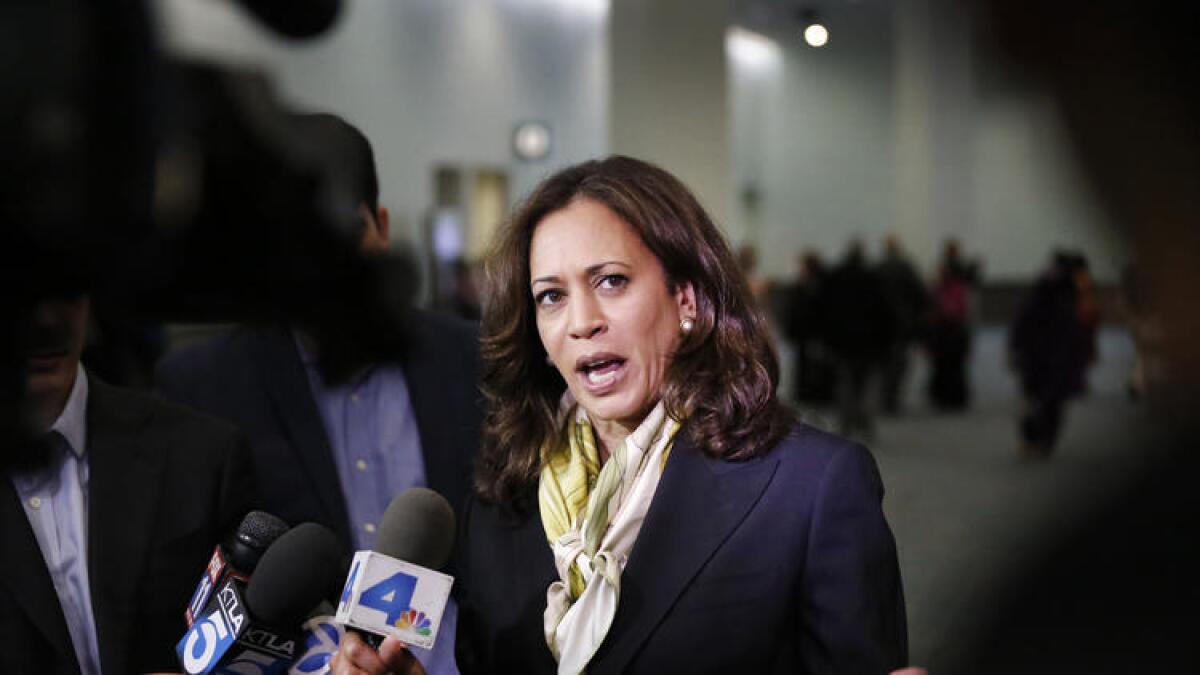
Despite swirling speculation, California‚Äôs U.S. Sen. Kamala Harris said she‚Äôs not giving ‚Äúany consideration‚ÄĚ to running for president in 2020.
Harris was appearing at the annual Code Conference hosted by the tech news site Recode in Rancho Palos Verdes on Wednesday night when site co-founder Kara Swisher asked if she had eyes on the White House.
‚ÄúI‚Äôm not giving that any consideration. I‚Äôve got to stay focused,‚ÄĚ said Harris, a Democrat who was elected to the Senate in November after serving as California‚Äôs attorney general. After she won the seat vacated by former Sen. Barbara Boxer, Harris quickly gained a reputation as a potential presidential candidate in 2020.
Harris took questions from Swisher alongside Laurene Powell Jobs, a philanthropist and the widow of Apple founder Steve Jobs.
Though she brushed off the presidential rumors, Harris urged Democrats to try harder to make convincing arguments on issues such as climate change instead of just criticizing those who disagree with them.
She told the audience at the posh Terranea Resort where the conference is being held that it would be a mistake to dismiss the concerns of Americans who supported Trump in the November election. She said the issues that concern them ‚ÄĒ good jobs and the future of their families ‚ÄĒ are the concerns of all working-class Americans.
‚ÄúThere is a healthy number of people in our country who are feeling displaced, rightly,‚ÄĚ Harris said. ‚ÄúI think we have to deal with that.‚ÄĚ
Still, Harris dished out plenty of jabs at the Trump administration. She criticized Atty. Gen. Jeff Sessions for ‚Äúresuscitating the war on drugs‚ÄĚ and told him to ‚Äúleave Grandma‚Äôs medical marijuana alone.‚ÄĚ Harris also criticized the Trump administration‚Äôs more hard-line immigration policies, and said she was concerned about allegations of collusion between Trump‚Äôs campaign and the Russian government.
‚ÄúThese are serious times. These are not issues we can just sit around with a glass of Chardonnay debating and philosophizing about,‚ÄĚ Harris said. ‚ÄúThe decisions that are being made right now are impacting real human beings.‚ÄĚ
Watch the entire interview:
Trump wouldn’t release his tax returns, so lawmakers move to make it mandatory for California’s primary
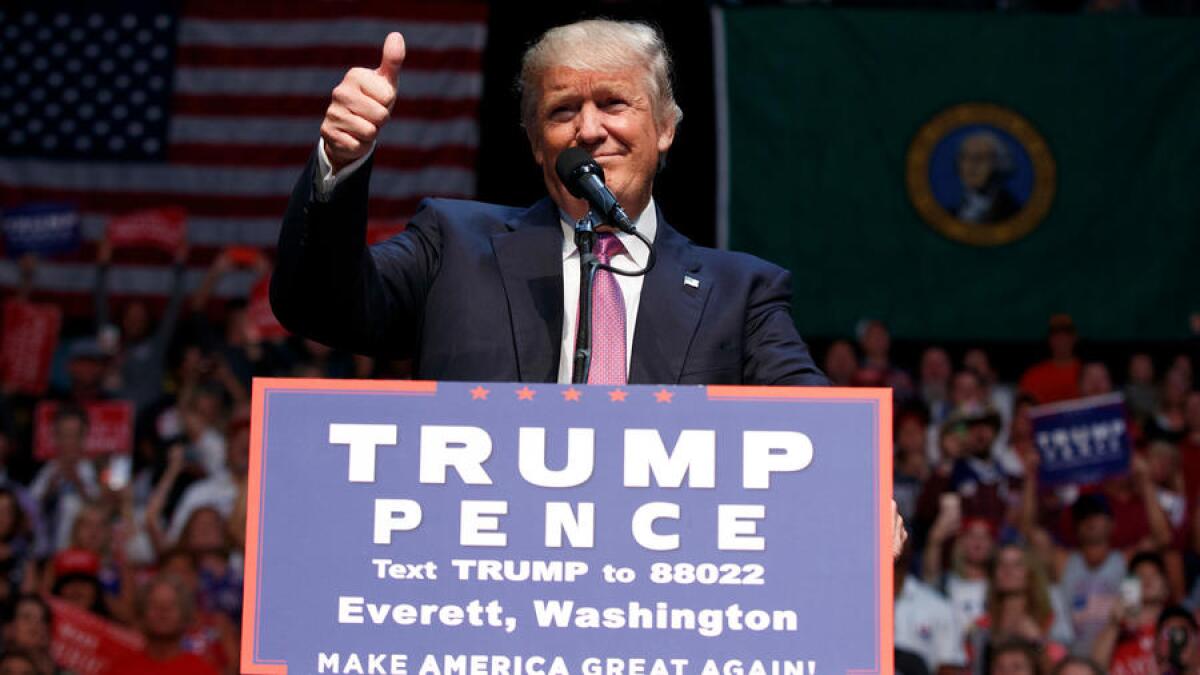
Legislation to require presidential candidates to disclose their tax returns in order to gain a spot on California’s presidential primary ballot won passage in the state Senate on Wednesday, but only after a tense debate that largely centered on President Trump.
Senate Bill 149 was approved on a strict party-line vote, 27-13. The bill now moves to the state Assembly, and was one of the last bills debated during a marathon session at the state Capitol to consider bills before a Friday deadline for action.
The bill would require presidential candidates to file copies of their income tax returns with state elections officials for the five most recent taxable years. Failure to do so would mean their name wouldn’t appear on California’s presidential primary ballot. The legislation was introduced in December, in the wake of Trump’s refusal to disclose his tax returns during the 2016 campaign. The president has continued to reject calls for the information.
‚ÄúHe‚Äôs shaping international policy which could enrich himself, and the American public has no way to know,‚ÄĚ state Sen. Mike McGuire (D-Healdsburg) said of Trump during Wednesday night‚Äôs floor debate. ‚ÄúThis legislation will help make transparency great again.‚ÄĚ
Republicans denounced the bill as another in a long line of efforts by Democrats in the Legislature to lash out at the election of Trump and the defeat of Hillary Clinton.
‚ÄúI get it that some people hate Trump,‚ÄĚ state Sen. Joel Anderson (R-Alpine) said. ‚ÄúWe‚Äôve got to move ahead. We‚Äôve got to get over it.‚ÄĚ
Tensions flared after Anderson tried to amend the bill on the floor ‚ÄĒ first, to require statewide and legislative candidates to also release their tax returns, and then to require a birth certificate from candidates who want access to the state‚Äôs primary ballot. Both were rejected by Democrats.
A legislative analysis of SB 149 said some legal scholars believe the plan, which would be the first of its kind in the nation, would pass muster with the U.S. Constitution. Nonetheless, the analysis concluded that it would probably be challenged in court if signed into law.
California Senate moves forward with bill that would overhaul Los Angeles County MTA
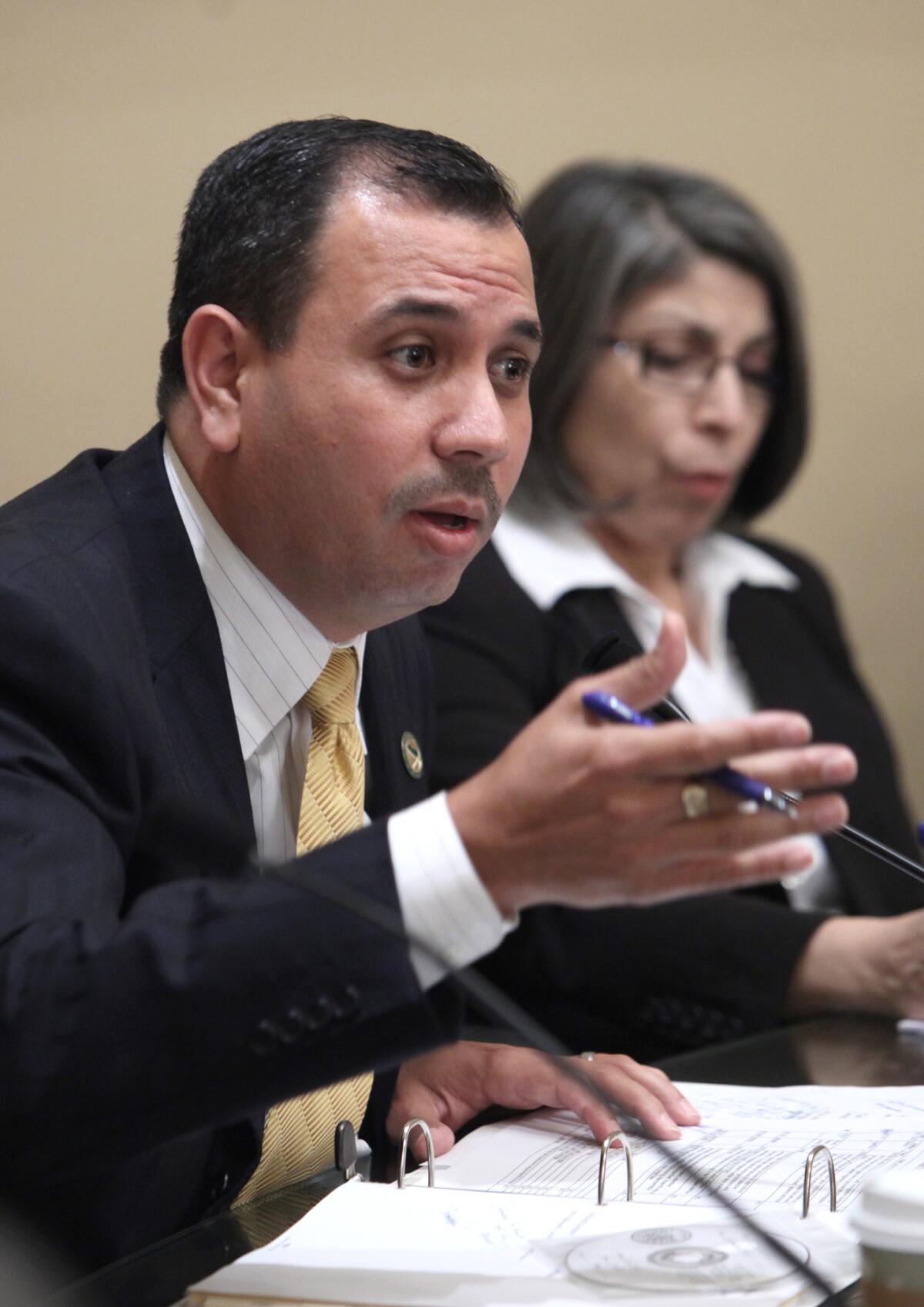
The state Senate on Wednesday approved a bill that would expand and reshape the agency that oversees mass transit in Los Angeles County.
Opponents of the measure include Los Angeles Mayor Eric Garcetti, the city and county of Los Angeles and the Los Angeles Area Chamber of Commerce.
The bill by Sen. Tony Mendoza (D-Artesia) was sent to the Assembly for consideration after squeaking by with a 22-11 vote in the Senate.
The measure would expand the Los Angeles County Metropolitan Transportation Authority board from 12 to 15 members. It would also reduce the number of county supervisors on the board from five to two, remove the appointment of two public members and increase Los Angeles City Council member appointments by the mayor from two to five.
‚ÄúThis will allow for proportional and fair representation,‚ÄĚ Mendoza told his colleagues, adding that the board currently is made up of ‚Äúhaves and have-nots fighting to get their share.‚ÄĚ
Sen. John Moorlach (R-Costa Mesa) opposed the measure because he said he saw it as Sacramento meddling in local policymaking.
But Sen. Scott Wilk (R-Palmdale) supported SB 268.
‚ÄúToo much power is concentrated in too few people,‚ÄĚ he said of the current board.
Single-payer healthcare is popular with Californians ‚ÄĒ unless it raises their taxes
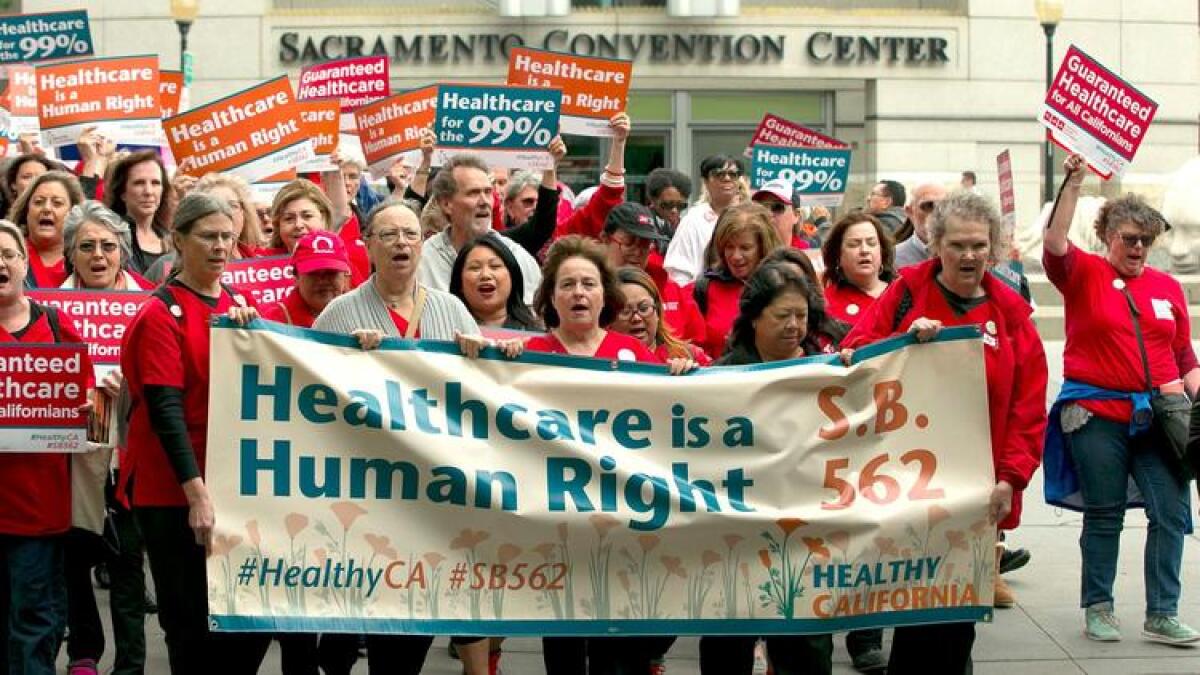
Almost two of every three Californians in a new statewide poll said they like the idea of a single-payer, government healthcare system, but far fewer support the idea if it includes a tax increase.
The poll released Wednesday night by the nonpartisan Public Policy Institute of California found that 65% of adults surveyed support the creation of a single-payer state healthcare program to cover all of the state’s residents, and 56% of likely voters approved of the idea. Opinion was sharply divided between Democrats (75% support) and Republicans (66% oppose) who were surveyed.
The single-payer proposal under consideration in the state Capitol, Senate Bill 562, assumes at least $50 billion in new taxes to fund the healthcare system. Asked about taxes, support drops to 42% of the adults surveyed and 43% of likely voters. While a majority of Democrats in the PPIC poll continued to support the idea if it means more taxes, support drops substantially among unaffiliated ‚Äúindependent‚ÄĚ voters.
The state Senate is expected to consider the single-payer bill before the end of the week. A legislative analysis put the estimated total cost of a new healthcare system that covers all Californians at $400 billion, while an analysis released on Wednesday by supporters provided a $331-billion estimate. The pending legislation by state Sen. Ricardo Lara (D-Bell Gardens) does not identify what taxes would be raised but makes the enactment of the plan contingent on a full funding proposal.
Knowingly exposing others to HIV should no longer be a felony, state Senate says

The state Senate on Wednesday voted to no longer make it a felony for someone infected with HIV to knowingly expose others to the disease by having unprotected sex without telling his or her partner about the infection.
The crime would be downgraded to a misdemeanor, and the bill would also apply to people who donate blood or semen without telling the blood or semen bank that they have acquired immunodeficiency syndrome, or AIDS, or have tested positive for human immunodeficiency virus, or HIV, the precursor to AIDS.
The measure, which next goes to the Assembly for consideration, was introduced by Sen. Scott Wiener (D-San Francisco), who said it is unfair to make HIV/AIDS the only communicable disease given such harsh treatment by prosecutors.
‚ÄúThese laws are irrational and discriminatory,‚ÄĚ Wiener told the Senate, adding that the current felony status is ‚Äúcreating an incentive not to be tested, because if you don‚Äôt know your status you can‚Äôt be guilty of a felony.‚ÄĚ
The measure was widely opposed by Republican lawmakers including Sen. Joel Anderson of San Diego. ‚ÄúIf you intentionally transmit something that is fundamentally life-threatening to the victim, you should be charged and go to jail,‚ÄĚ he said.
Sen. Jeff Stone (R-Murrieta) said, ‚ÄúMy friends, it‚Äôs not a gay issue. It‚Äôs a public health issue. We shouldn‚Äôt allow someone to play Russian roulette with other people‚Äôs lives.‚ÄĚ
Sen. Richard Pan (D-Sacramento), a physician, voted for the bill and argued that it undermines public health to imprison those with HIV under the current law.
Hillary Clinton: ‚ÄėI was the victim of a very broad assumption I was going to win‚Äô
Hillary Clinton said on Wednesday that she has no plans to run for office again, but she plans to remain involved in civic life, particularly helping the Democrats’ efforts to regain control of the House in 2018.
‚ÄúI‚Äôm not going anywhere,‚ÄĚ Clinton said at the annual Code Conference in Rancho Palos Verdes. ‚ÄúI have a big stake in what happens in this country. I am very unbowed and unbroken about what happened because I don‚Äôt want it to happen to anybody else. I don‚Äôt want it to happen to the values and the institutions I care about in America.
‚ÄúAnd I think we‚Äôre at a really pivotal point,‚ÄĚ she said. ‚ÄúAnd therefore I‚Äôm going to keep writing and keep talking and keep supporting people who are on the front lines of the resistance.‚ÄĚ
The 2016 Democratic presidential nominee said she woke up on election day expecting to win. Clinton told the gathering that she was responsible for every decision the campaign made, though she did not believe they caused her surprise loss. She attributed that to several things, including alleged Russian interference in the election and ‚Äúweaponizing‚ÄĚ stolen information and fake news. She also pointed a finger at the Democrats for falling behind the GOP in using technology and data to target voters, the media for covering her e-mail controversy ‚Äúlike it was Pearl Harbor,‚ÄĚ misogyny and the high expectations many had for her candidacy.
‚ÄúI was the victim of a very broad assumption I was going to win,‚ÄĚ she said, adding that she always expected the race to be close.
Trump responded on Twitter, saying that Clinton still refused to accept that she lost because she was a ‚Äúterrible candidate.‚ÄĚ
Clinton, who has increasingly jabbed President Trump, including at last week‚Äôs commencement address at Wellesley College, blasted his reported plan to pull out of the Paris climate accord as ‚Äúreally stupid‚ÄĚ because of the economic implications. She described his personality as ‚Äúimpulsive‚ÄĚ and ‚Äúreactive.‚ÄĚ
And she joked about his peculiar overnight tweet about ‚Äúconstant negative press covfefe,‚ÄĚ saying she thought it was ‚Äúa hidden message to the Russians‚ÄĚ to laughter from the audience.
Going forward, Clinton said that she believes that it was ‚Äúrealistic‚ÄĚ for Democrats to retake the House in 2018, notably by focusing on Republican congressional districts she won ‚ÄĒ including seven in California. She sounded less optimistic about the Senate.
Updated at 6:06 p.m.: This post was updated to add President Trump’s response to Clinton’s remarks.
This post was first published at 5:41 p.m.
California lawmakers take aim again at establishing statewide rules for drones
A state senator from Santa Barbara is taking another shot at establishing statewide regulations for the use of drones after the budding industry thwarted her efforts to pass similar legislation last year.
Senate Bill 347, introduced by Democratic Sen. Hannah-Beth Jackson, would limit disruptive drone use near private property and prohibit the weaponization and reckless operation of the unmanned aerial vehicles. It also would require pilots to obtain insurance and to license, register and mark the aircrafts per federal regulations.
The bill moved out of the Senate on Wednesday with a 26-13 vote. It heads to the Assembly for consideration.
Speaking on the Senate floor, Jackson urged support for what she called comprehensive drone legislation, saying California needs ‚Äúcommon-sense rules that provide certainty for everyone and keep the public safe.‚ÄĚ
‚ÄúWashington is not going to be acting on this issue very soon,‚ÄĚ she said, citing a federal appeals court decision that this month found the Federal Aviation Administration doesn‚Äôt have the authority to regulate the use of drones by hobbyists.
Debate has raged in recent years over just where federal authority begins and ends. And Jackson’s attempts at drone legislation last year were blocked amid opposition from lobbyists who argued against creating a patchwork of laws that varied by state.
Under Jackson’s new proposal, violations would be punishable by a fine of up to $250 or a misdemeanor, and the California Department of Transportation would be tasked with developing liability insurance requirements.
It has the support of the California State Assn. of Counties, the League of California Cities and the Los Angeles County Professional Peace Officers Assn, but it once again faces tough industry opposition.
School districts would be prohibited from ‚Äėshaming‚Äô students whose parents haven‚Äôt paid for school lunches

Students whose parents have not kept their school lunch bills current would no longer go through ‚Äúshaming‚ÄĚ that includes marking their hand so they cannot be served, under legislation approved Wednesday by the state Senate.
The measure by Sen. Bob Hertzberg (D-Van Nuys) would require school districts to ensure that any student whose parent has unpaid school meal fees is not treated differently, or delayed or denied a nutritiously adequate meal.
Hertzberg introduced the legislation after hearing of school districts taking lunch trays from students whose accounts were not current and throwing the food in the trash, embarrassing the students in front of their friends.
‚ÄúNo more shaming,‚ÄĚ Herzberg told his colleagues. ‚ÄúDon‚Äôt visit the failures of the parents on their kids.‚ÄĚ
The measure passed on a 39-0 vote and was sent to the Assembly for consideration.
Emilio Huerta, undaunted by 2016 loss, is back to challenge Rep. David Valadao
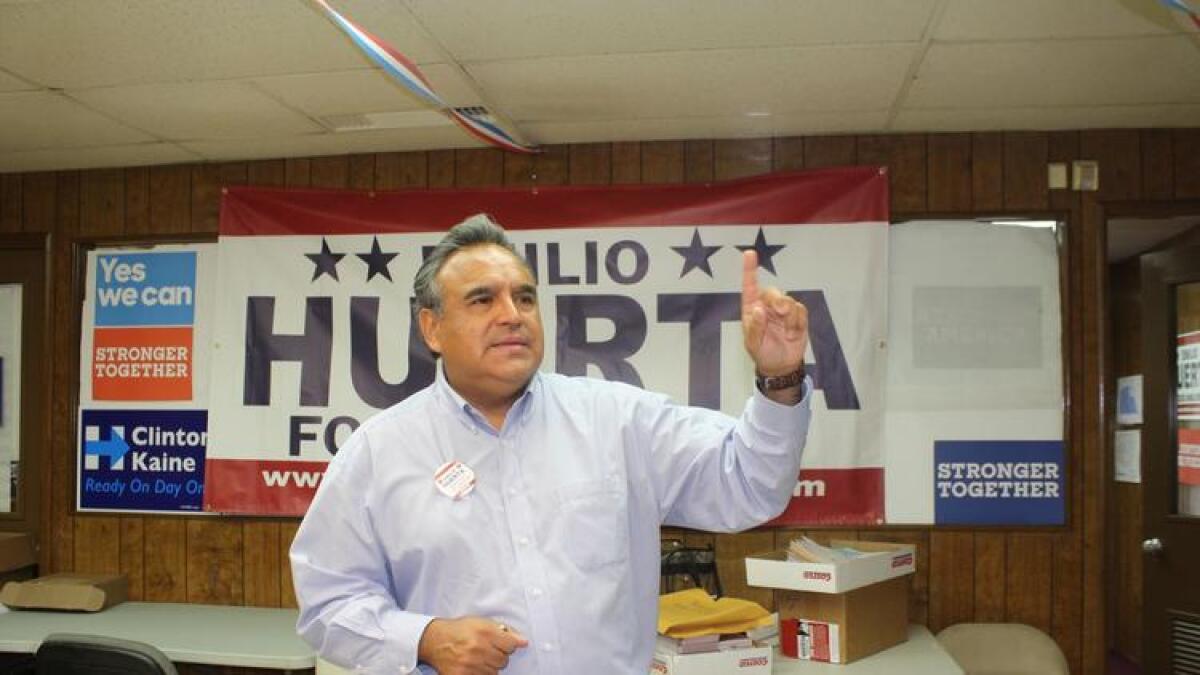
Bakersfield lawyer Emilio Huerta came more than 13 percentage points short of winning California’s 21st Congressional District seat in 2016, but he plans to try again in 2018.
Huerta, 59, blames his loss to Rep. David Valadao (R-Hanford) on inexperience and a rash of negative ads at the end of the campaign.
‚ÄúWe learned a lot in the last campaign. As a first-time candidate there was certainly a lot to learn and I think we did a good job,‚ÄĚ Huerta said Wednesday.
The son of labor icon Dolores Huerta, he has worked for the United Farm Workers union ‚ÄĒ which his mother co-founded ‚ÄĒ throughout the Central Valley district.
Huerta said Valadao‚Äôs vote for the Republican healthcare plan shows he‚Äôs ‚Äúignoring Valley residents‚ÄĚ needs because it would end the expansion of the MediCal program, which many of the district‚Äôs residents use for healthcare.
‚ÄúIt‚Äôs going to be a pretty significant issue,‚ÄĚ he said.
He is the first Democrat to announce a bid for the seat.
Democrats are heartened by the fact that, while Valadao won the seat with 56.74% of the vote, the district has continued to trend Democratic in voter registration and chose Hillary Clinton for president with 54.72% of the vote.
‚ÄúThat tells me that there were die-hard Democrats, committed Democrats that vote, Democrats that were not convinced that my campaign should be supported and I think a lot of that has to do with me being a first-time candidate,‚ÄĚ Huerta said.
The Democratic Congressional Campaign Committee has made the seat a target for 2018.
The majority-Latino district includes parts of Fresno, Kern, Kings and Tulare counties.
Gov. Jerry Brown and Democrats say Trump is going ‚Äėbackwards‚Äô if he pulls out of Paris climate pact
Gov. Jerry Brown warned Wednesday that a decision by President Trump to withdraw the United States from a 2015 global climate change agreement could be ‚Äútragic,‚ÄĚ and vowed to keep California‚Äôs ambitious efforts in place and on track.
‚ÄúHere we are, in 2017, going backwards,‚ÄĚ Brown said in an interview with the Los Angeles Times. ‚ÄúIt cannot stand, it‚Äôs not right and California will do everything it can to not only stay the course, but to build more support ‚ÄĒ in other states, in other provinces, in other countries.‚ÄĚ
The governor also criticized efforts to the president to dismantle climate change initiatives launched by former President Barack Obama.
‚ÄúTrump is going against science. He‚Äôs going against reality,‚ÄĚ the governor said. ‚ÄúWe can‚Äôt stand by and give aid and comfort to that.‚ÄĚ
News that the president had either made the decision to pull the country out of the Paris Accord on climate change or was on the verge of doing so drew swift condemnation from California leaders. Brown and other top lawmakers attended the talks in late 2015 that resulted in the international agreement, and insisted on Wednesday that it would not hurt the state’s own efforts to sharply curtail greenhouse gas emissions.
‚ÄúAs with so many other matters, from human rights to healthcare, the Trump administration has continued to surrender our nation‚Äôs longstanding role as a global leader,‚ÄĚ Senate President Pro Tem Kevin de Le√≥n (D-Los Angeles) said.
Others pointed out that a decision to remove the United States from the agreement would leave it in rare company among other nations. Lt. Gov. Gavin Newsom tweeted that such a decision by Trump would be more than just ‚Äúdumb + destructive.‚ÄĚ
Brown, who leaves Friday for a weeklong visit to China to encourage more climate-change cooperation, predicted any decision to step away would suggest the country’s priorities aren’t clear.
‚ÄúIt sends a very muddled message,‚ÄĚ the governor said during an interview in his state Capitol office. ‚ÄúIs the message [that] we like dirty cars and gas guzzlers? And we‚Äôre going to have a coal future? That can‚Äôt happen.‚ÄĚ
And Brown again suggested that California’s experience on the issue offers a road map for others.
‚ÄúIf we want to retain and enhance manufacturing, we have to do what California is doing, in clean energy and clean technology,‚ÄĚ he said. ‚ÄúThat‚Äôs the future of jobs, the future of sustainability. And we better get on board. And California will be right there with the best of them.‚ÄĚ
Antonio Villaraigosa questions whether a state single-payer healthcare system is affordable in California
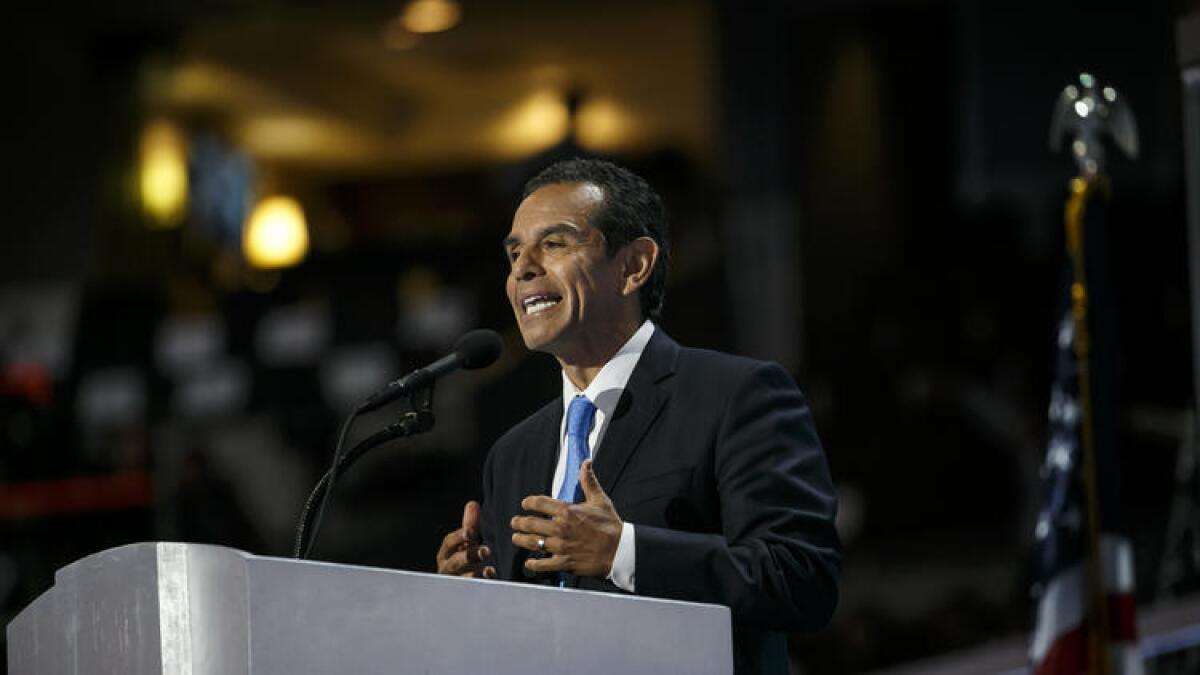
Democratic gubernatorial candidate Antonio Villaraigosa said he supports universal healthcare but advocates for a state-sponsored single-payer system may be ‚Äúcreating false expectations‚ÄĚ given the enormous costs involved.
The former Los Angeles mayor, speaking on KPPC‚Äôs ‚ÄúAirTalk‚ÄĚ with Larry Mantle on Wednesday morning, said California‚Äôs top priority should be to replace the estimated $20 billion in federal money the state may lose for healthcare programs if the Affordable Care Act is repealed.
The comment came after Mantle asked Villaraigosa if he supported a bill in the California Legislature that would create a single-payer health system for California. According to a legislative analysis, the cost of the proposed healthcare system would be $400 billion annually.
Villaraigosa said he supports the ideal of single-payer health care but was skeptical about California being able to afford a state-run program. Supporters first have to explain how the state can pay for it, he said.
To afford the program, California also would need waivers from the federal government so it can use Medicare and Medi-Cal funds, which is not likely given the state’s hostile relationship with the Trump administration, he said.
Villaraigosa also chided Lt. Gov. Gavin Newsom, a Democratic rival in the 2018 governor’s race, for voicing his support for a state single-payer system.
‚ÄúLet‚Äôs not sell snake oil,‚ÄĚ Villaraigosa said.
In March, Newsom said he plans to propose a universal healthcare system for the state modeled on a city program he supported while he was mayor of San Francisco.
This Orange County congressman’s immigration town hall turned chaotic and led to three arrests
The majority of calls into Rep. Lou Correa’s Orange County congressional office are about immigration worries and what the Trump administration’s enforcement policies mean for Correa’s many Latino constituents.
‚ÄúThere‚Äôs a lot of fear in my district,‚ÄĚ he said.
So the freshman Democrat has held seven town halls, all focused on immigration and explaining immigrants’ rights. They’ve been peaceful, with representatives from groups such as the Coalition for Humane Immigrant Rights of Los Angeles and the Mexican Consulate invited to help Correa answer questions.
But as the crowd of about 100 people gathered at Santa Ana’s Delhi Center on Tuesday evening, Correa knew this time would be different.
‚ÄúWe had some people there, probably a dozen of them, that immediately had signs that were not complimentary to yours truly,‚ÄĚ he said.
Two women arguing about immigration issues had already gotten into an altercation outside the town hall. They were cited for assault and battery, and barred by police from going inside.
Correa told the crowd inside he would give a short presentation about immigration policy coming out of Washington and then have a question-and-answer session.
About a dozen people were having none of it. Some of the most tense moments came when Correa started talking about green card holders who served in the U.S. military and have since been deported.
‚ÄúMa‚Äôam, I‚Äôm trying to be courteous here,‚ÄĚ he said as a woman kept speaking over him.
‚ÄúAs soon as I started speaking, it became very clear they were not going to let me speak,‚ÄĚ Correa said Wednesday. ‚ÄúThey just got louder and louder.‚ÄĚ
Video of the town hall posted on social media shows people in the crowd yelling ‚ÄúAmericans first‚ÄĚ and ‚ÄúIllegals have no rights.‚ÄĚ
Correa repeatedly asks them to let him speak. ‚ÄúAre you guys going to cooperate, or am I going to have to ask you to leave?‚ÄĚ he said.
About 15 minutes in, as some in the crowd continued to shout and their attention turned to berating a group of counter-protesters, Correa declared the meeting over.
A handful of people circled around Correa as he tried to leave, yelling ‚ÄúShame, shame‚ÄĚ and ‚ÄúYou guys all want welfare.‚ÄĚ One woman‚Äôs voice can be heard repeatedly yelling ‚ÄúCoward!‚ÄĚ
Police emptied the room amid chants of ‚ÄúUSA.‚ÄĚ The crowd streamed into the parking lot, where confrontations quickly started between supporters of President Trump and others who appeared to be focused on Native American rights.
Videos posted on social media show men shouting at one another, their faces so close their noses are practically touching. Police officers kept trying to separate the groups.
(Warning: The video below includes language that some readers might find offensive.)
Santa Ana Police Department spokesman Anthony Bertagna said a man struck a Trump supporter on the head with a pole bearing an anti-fascism flag. He was arrested on suspicion of assault with a deadly weapon, Bertagna said.
The man was brought to police headquarters, and a group of about 10 people followed along to protest, he said.
Shortly after, the town hall peacefully resumed in a different room with a much smaller crowd, Correa said.
Several California members of Congress have held similar immigration-specific town halls or workshops in the last few months as questions swirl about changes to federal immigration policies and enforcement.
The purpose of the town halls is to ‚Äúlet people know how to follow the law, let them know their legal rights and responsibilities,‚ÄĚ Correa said. Protesters have characterized it as teaching people who are in the country illegally how to avoid deportation and get federal benefits.
California plan for 100% renewable energy by 2045 clears key hurdle
California will receive all of its power from renewable energy, such as solar and wind power, by 2045 under legislation that passed the state Senate on Wednesday.
Senate President Pro Tem Kevin de León (D-Los Angeles) touted his bill, Senate Bill 100, as the most ambitious program in the world.
‚ÄúClean energy is the future,‚ÄĚ De Le√≥n said. ‚ÄúSB 100 ensures that California leads into the future.‚ÄĚ
The measure would also speed up the state’s goal of reaching 50% renewable energy, changing the deadline from 2030 to 2026.
SB 100 passed over objections from Republican senators. Sen. Jeff Stone (R-Temecula) criticized the measure as government getting ahead of technological capacity.
‚ÄúWhat if we can‚Äôt make that mandate that we‚Äôre putting into law today?‚ÄĚ Stone said. ‚ÄúWhat it‚Äôs going to do is drive up electricity bills for our businesses.‚ÄĚ
De León’s bill now moves to the Assembly.
A new proposal on California’s cap-and-trade program emerges as vote is delayed
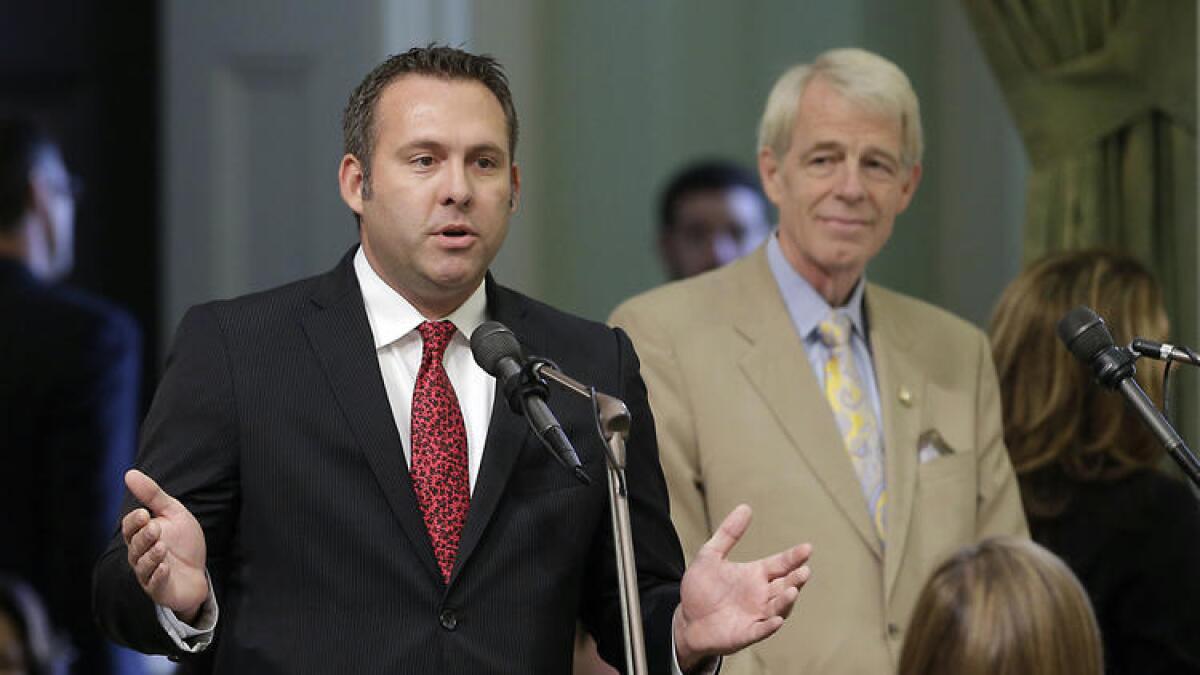
A coalition of business-friendly Democrats is detailing their own ideas for cap and trade, a centerpiece of California’s fight against global warming, the latest bid in a crowded field of efforts to extend the program.
Cap and trade requires polluting companies to buy permits to release greenhouse gas emissions, and lawmakers have been considering a push from Gov. Jerry Brown to extend the program beyond 2020.
The new plan would force the program to sunset in 2025, earlier than previous proposals from other lawmakers. It would also direct revenue from the program toward improving air quality and helping agricultural and trucking companies lower their emissions by replacing aging equipment.
The plan is also aimed at keeping costs down for industries regulated by cap and trade, allowing them to support green projects known as offsets instead of reducing their own emissions.
‚ÄúCalifornia must continue to lead the world by implementing a strong climate policy that ensures both a healthy environment for future Californians and growth in all sectors of our economy,‚ÄĚ Assemblyman Adam Gray (D-Merced) said in a statement.
The pro-business Democrats’ plan is the fourth such effort announced by various factions within the state’s ruling Democratic Party this year with two others emerging from the Assembly and one from the Senate. The plans offer varying degrees of changes to the existing program, either to prioritize pollution reductions in disadvantaged communities or eliminate offsets. Republican lawmakers also have said they want to be part of the cap-and-trade debate.
Brown has pushed for a two-thirds supermajority vote of the Legislature to extend the program by the state budget deadline next month. But Senate President Pro Tem Kevin de León (D-Los Angeles) said at a Wednesday news conference that that wasn’t going to happen.
‚ÄúCap-and-trade is a very complex issue,‚ÄĚ De Le√≥n said. ‚ÄúIt‚Äôs very arcane. We want to make sure we get it right.‚ÄĚ
De León said he hoped for a deal by the end of the year.
Richard Riordan endorses Robert Lee Ahn against Jimmy Gomez in L.A. congressional race
Estimated cost for single-payer healthcare in California reduced by billions in analysis sponsored by supporters
With a state Senate vote possibly imminent on a single-payer health system for California, supporters Wednesday released a study estimating it would cut spending on healthcare in the state by 18% and cost tens of billions of dollars less than the state’s estimate for the plan.
Extra costs could be covered by tax increases, according to the analysis sponsored by the California Nurses Assn./National Nurses United, the leading supporter of legislation.
A legislative analysis had estimated the cost of the proposed system to be $400 billion annually, but a study released by the nurses Wednesday estimates the yearly cost would be $331 billion as of 2017.
The estimate was made by the Political Economy Research Institute at the University of Massachusetts Amherst, in a study partly financed by the nurses association.
State Sen. Ricardo Lara (D-Bell Gardens) authored a bill that would provide a Medicare-for-all-type system and said the study shows the plan can guarantee health coverage for all Californians without the out of pocket costs that leave a third of all state residents underinsured.
‚ÄúThe good news is that California can get a lot more for our money,‚ÄĚ Lara said at a Capitol news conference. ‚ÄúFamilies will pay less for healthcare.‚ÄĚ
The study estimated the amount spent on healthcare will drop up to 9% for middle-class voters who are currently insured, and 5% for low-income residents.
Senate Bill 562 is eligible for a vote by the state Senate this week, although Lara said he planned to meet with supporters on how to incorporate the findings of the new financial report into the proposal. The financial review proposes to cover part of the cost of the single-payer system with a 2.3% increase in both the state sales tax and its gross receipt tax applied to California businesses.
The new plan could use public healthcare revenue sources that are currently covering some 71% of all healthcare funding in the state, including Medicare, MediCal and tax subsidies for healthcare, said Robert Pollin, the institute’s director.
Polon was an economic advisor to Gov. Jerry Brown’s campaign for president and Lara said he hoped his involvement would convince Brown to support the legislation.
If the state can obtain waivers in all of the present areas of public health funding, it will provide $225 billion of the cost of a single-payer program.
‚ÄúThat means that the remaining $106 billion to fund Healthy California will need to be provided by new revenue sources in the state,‚ÄĚ the study says.
The rosy picture was disputed by Rick Coburn, president of the California Association of Health Underwriters, who said abolishing the use of options delivered by private insurance companies would increase unemployment.
‚ÄúSenate Bill 562 proponents assume federal funding will cover 70 percent of the annual $400 billion cost estimate,‚ÄĚ Coburn said. ‚ÄúCalifornia has no authority over federal programs and cannot assume the federal government will grant the necessary waivers.‚ÄĚ
The proposal is also opposed by Charles Bacchi, president and CEO of the California Association of Health Plans.
‚ÄúThis new analysis doesn‚Äôt change the fact that a single payer health care system is unaffordable and would be incredibly disruptive to the ninety percent of California‚Äôs residents who currently have health insurance,‚ÄĚ Bacchi said in a statement.
To ease the tax burden, the proposal would exempt the first $2 million in receipts for all businesses, meaning companies that average up to nine employees will have no gross receipts tax obligation. The sales tax would exempt spending on housing, utilities and food at home.
‚ÄúWhat this new study proves is that we can finally achieve the dream of guaranteeing healthcare for all Californians, without the punishment of crippling out-of-pocket costs,‚ÄĚ said RoseAnn DeMoro, executive director of the California Nurses Assn.
Meanwhile, the nurses association released a poll it sponsored that says 70% of Californians support the legislation and 58% remain supportive after hearing opposition arguments. The poll was conducted by the Tulchin Research firm, and involved the survey of 600 likely California voters.
Updated at 5:30 p.m. This post was updated with a statement by Charles Bacchi, president and CEO of the California Association of Health Plans.
This post was originally published at 11:35 a.m.
Senate fails to back bill to delay the Aliso Canyon reopening, but lawmaker will try again
California state Senate advances bill to ban smoking and use of e-cigarettes in government housing
Californians would no longer be able to use tobacco products, including electronic cigarettes, in public housing and within 25 of those buildings under a measure approved Tuesday by the state Assembly.
Assemblyman Jim Wood (D-Healdsburg) said the measure builds on a smoking ban approved last year for federal public housing projects by the U.S. Department of Housing and Urban Development.
In addition to applying the smoking ban to state housing, expansion to include e-cigarettes makes sure the law cover new technology in tobacco use. The bill takes effect by July 30, 2018. Wood said tobacco-related diseases cost taxpayers significant funds each year.
‚ÄúThis bill will save money but will more importantly save lives,‚ÄĚ Wood told his colleagues before the vote.
The measure is opposed by the Western Center on Law and Poverty, which worries it will lead to more evictions.
Californians would not be able to buy more than one rifle a month under bill approved by state senators

Californians would be prohibited from buying more than one firearm in any 30-day period under a measure approved Tuesday by the Senate to reduce straw purchasing and circumvention of gun laws.
California already bars people from buying more than one handgun a month. The bill by Sen. Anthony Portantino (D-La Ca√Īada Flintridge) expands the limit to also cover long guns, including rifles and shotguns.
The measure, which next goes to the Assembly for consideration, seeks to address concerns that some people buy large quantities of guns and then sell them on the underground market to criminals and others not eligible to own guns.
‚ÄúThere is no need or reason why a person would need to purchase more than one gun a month,‚ÄĚ Portantino said during the floor debate.
Republicans, including Jeff Stone of Murrieta, opposed the legislation.
‚ÄúThis is yet another example of the government trying to infringe on the 2nd Amendment rights of law-abiding citizens,‚ÄĚ Stone said.
Sen. Jim Nielsen (R-Chico) said he has seen no proof that past gun-control measures approved by the state have made the state safer.
‚ÄėIt‚Äôs more of the same that will not decrease violent crime,‚ÄĚ Nielsen said.
California state senators want to stop the public from smoking at California beaches and parks
Californians would be barred from smoking or using electronic cigarettes in state parks and at beaches under a bill approved Tuesday by the state Senate.
Sen. Steve Glazer (D-Concord) said his bill would address the health problems caused by smoking but also the harm done to the environment by discarded cigarette butts and the fire danger posed by the practice.
‚ÄúCigarette butts contain more than 150 toxic chemicals and although small in size, have a huge negative impact on the environment and the animals that live in them,‚ÄĚ Glazer told his colleagues.
A legislative analysis said the bill does not address the concerns raised by Gov. Jerry Brown when he vetoed a similar bill last year.
The veto message read, in part, ‚ÄúThe complete prohibition in all parks and beaches is too broad. A more measured ‚ÄĒ and less punitive ‚ÄĒ approach might be warranted.‚ÄĚ
School day wouldn’t begin before 8:30 a.m. in California under bill that clears the state Senate

California teenagers wouldn’t be required to start their school day before 8:30 am under a bill approved Tuesday by the state Senate.
The legislation by Sen. Anthony Portantino (D-La Ca√Īada Flintridge) would not fully take effect until 2020, and sparked a lively floor debate over the science on the sleep patterns of middle and high school students, and whether they simply need to go to bed earlier.
‚ÄúI expect this would only dispose them to stay up later,‚ÄĚ said state Sen. Jim Nielsen (R-Gerber). Another Republican lawmaker, Sen. Jean Fuller (R-Bakersfield), said students need to learn what it‚Äôs like in the workforce.
‚ÄúJob preparation is what schooling is all about,‚ÄĚ Fuller said. ‚ÄúUnless you‚Äôre a musician or someone who works nights, you probably did not start in the later morning.‚ÄĚ
Opponents also said the later start time could affect collective bargaining agreements with teachers and other school employees.
Supporters, however, pointed to a recommendation for later start times from the American Academy of Pediatrics. A University of Minnesota study linked school start times to sleep deprivation and the rate of car crashes among teenage drivers.
‚ÄúThe morning sleep time is the most valuable for student health,‚ÄĚ said Portantino. ‚ÄúTheir test scores go up, their attendance goes up, their graduation rates go up.‚ÄĚ
The bill would allow rural school districts to obtain a waiver if they couldn’t make the change.
Senate President Pro Tem Kevin de León (D-Los Angeles) ended the debate with a simple request of the senators on behalf of teenage students.
‚ÄĚLet‚Äôs just let them sleep in a little bit,‚ÄĚ he said with a smile.
More transparency proposed for prescription drug price increases under bill passed by California Senate

Alarmed by skyrocketing prices for some prescription drugs, the California Senate on Tuesday approved a measure aimed at increasing pressure to hold down costs to consumers by requiring more public reporting of price hikes.
The lawmakers approved a bill that would require drug manufacturers to notify health plans and state purchasers such as the prison department of increases in the wholesale cost of drugs in writing at least 90 days before the new costs were to take effect.
The measure also requires that health plans and insurers notify state regulators of pricing information for the most costly drugs.
‚ÄúWe‚Äôre not saying that they can‚Äôt raise the price. We‚Äôre just saying notify us,‚ÄĚ Hernandez said during the floor debate. ‚ÄúAnd if [the price] goes up a significant amount, we should be able to question why.‚ÄĚ
The measure passed by a 26-10 vote with some Republicans, including Sen. Ted Gaines of El Dorado Hills, opposed.
Gaines said the pharmaceutical industry‚Äôs pricing of drugs helps it pay for development of new medications. ‚ÄúIt funds their research,‚ÄĚ Gaines said during the debate.
The measure next goes to the Assembly, where a similar bill last year failed to win passage.
Hernandez said more opponents are talking to him this year about possible compromises, although the bill is opposed by the Pharmaceutical Research and Manufacturers of America.
Hernandez said the bill is needed, adding that current regulations allow pharmaceutical companies to reap ‚Äúobscene profits at the expense of the entire healthcare system.‚ÄĚ
California Senate advances bill to make pot use in cars an infraction
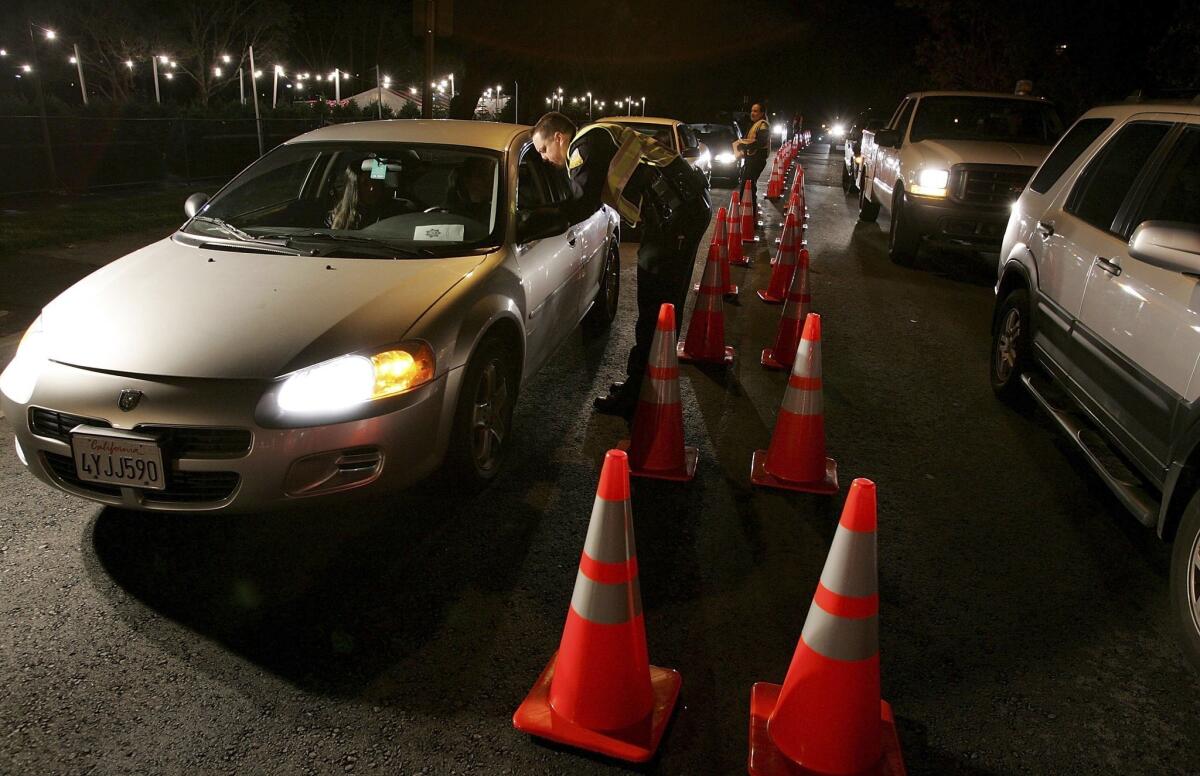
Just months after state voters legalized the recreational use of marijuana, the state Senate on Tuesday voted to prohibit its use in automobiles because of concerns over drugged driving.
A bill by Sen. Jerry Hill (D-San Mateo) makes it an infraction for drivers and passengers to use marijuana in motor vehicles. Stiffer penalties already exist for motorists found to be driving while impaired by drugs.
California voters legalized recreational use of marijuana in November although the state does not plan to begin issuing licenses for its legal sale until January.
In Washington state, which previously legalized pot, the AAA Foundation for Traffic Safety found that the number of drivers who had recently used marijuana before fatal accidents doubled from 2013 to 2014, Hill told his colleagues.
‚ÄúWashington serves as an eye-opening case study for what other states may experience with road safety after legalizing the drug,‚ÄĚ Hill told his colleagues before the unanimous vote to approve the measure and send it to the Assembly for consideration.
California lawmakers want to give parents at smaller companies 12 weeks of protected family leave
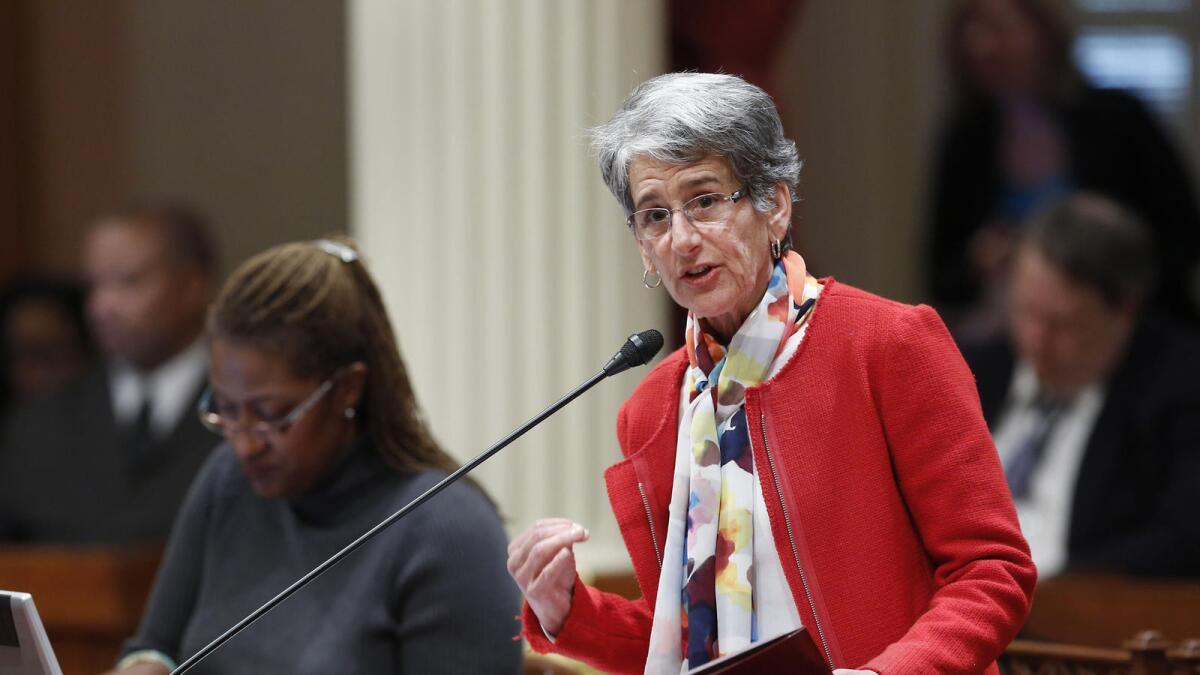
California lawmakers are once again seeking to expand the state’s paid family leave program to smaller businesses after Gov. Jerry Brown vetoed a similar measure last year.
SB 63, authored by Sen. Hannah-Beth Jackson (D-Santa Barbara), on Tuesday moved out of the state Senate with a 25-13 vote. It now heads to the Assembly for consideration.
The legislation, a priority bill for the California Legislative Women‚Äôs Caucus, would allow parents at companies with 20 to 49 employees to take 12 weeks of leave to care for a newborn or newly adopted child ‚ÄĒ without fear of losing their jobs. Under the current state law, only workers at businesses with 50 or more workers can take advantage of program.
On the Senate floor Tuesday, the debate on the issue echoed that of last year. Republican lawmakers argued the bill would kill jobs and hurt small businesses already struggling in California. Those in favor argued progressive family leave policies attracted a strong and healthy workforce.
Jackson said her bill would impact only 6.3% of California companies, while helping 16% of its workforce, a population of 2.7 million residents across the state.
‚ÄúWith so many women in the workforce than ever before, and with so many struggling, two-income families, this is a critical moment in time,‚ÄĚ she said.
Kimberly Ellis files formal challenge over result of state Democratic Party chairperson election
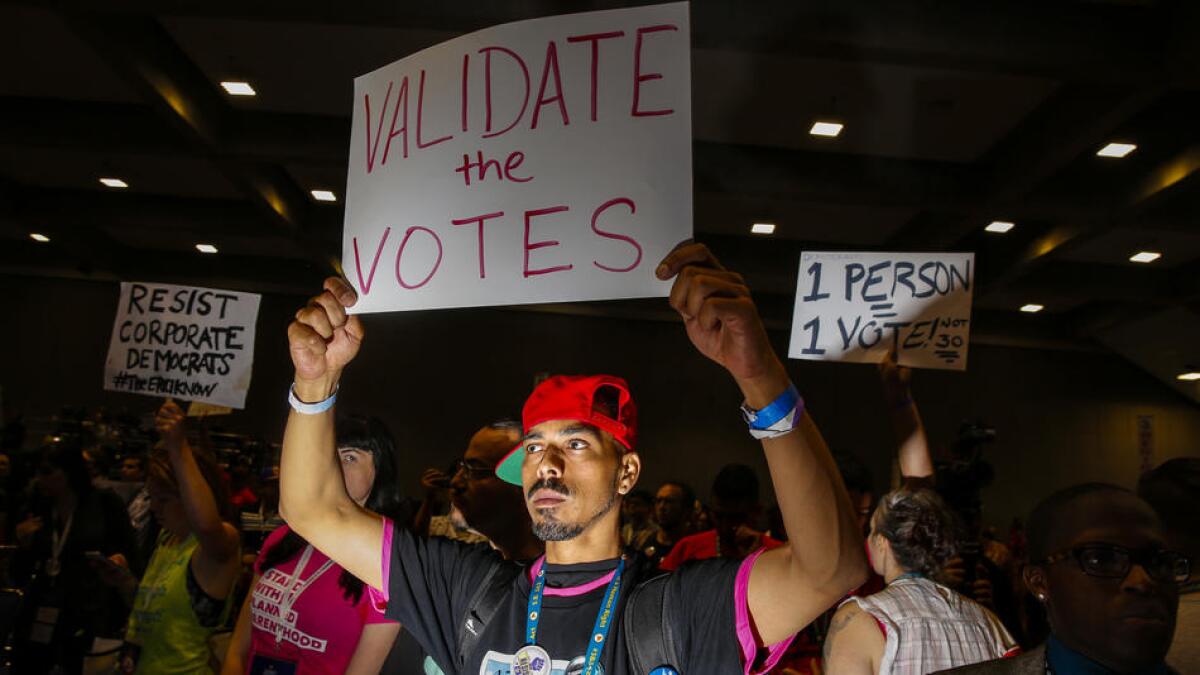
The candidate who narrowly lost the race to be the next leader of the California Democratic Party on Tuesday filed a formal challenge of the election result.
Kimberly Ellis’ campaign, which was already in the process of reviewing the ballots cast during the state party’s convention two weekends ago, said they were filing the challenge to meet a requirement in the party bylaws that such an action must be taken within seven days of the contested act.
‚ÄúOur review process is ongoing. It‚Äôs critical that all formal processes outlined by the CDP‚Äôs bylaws are followed at this time so that there can be no concern about raising issues in the manner prescribed by our party,‚ÄĚ said Hilary Crosby, immediate past controller for the state party and an Ellis supporter.
Ellis’ campaign said challenges were also being filed in races for a vice chair, secretary and multiple regional directors.
Chris Masami Myers, state party executive director, acknowledged receiving the challenges and said in a statement that they would be reviewed ‚Äúin accordance with the standard practices described in the bylaws.‚ÄĚ
The party’s compliance review commission, made up of six members who were appointed during former Chairman John Burton’s tenure, will review the evidence and take oral or written testimony before issuing a ruling in mid- to late June.
The state party chair race was the most heated and contentious. Longtime party leader Eric Bauman entered the race with advantages, but Ellis made the contest competitive.
In the election, held this month at the state party convention in Sacramento, Bauman beat Ellis by just over 60 votes. But amid allegations levied by her supporters of ballot-box stuffing and ripped-up ballots, she refused to concede the race. Her campaign has been reviewing individual ballots for a week.
Bauman did not immediately respond to requests for comment.
Updated at 4:57 p.m.: This post was updated to add additional information about how the review will be conducted.
Updated at 3:35 p.m.: This post was updated to add a comment from a state party official.
This post was originally published at 2:37 p.m.
Darrell Issa gets on his office roof to take a picture of protesters. A mild hubbub ensues
It began when one of Rep. Darrell Issa’s 2018 opponents, Mike Levin, posted an image on Twitter, saying the Vista congressman was hiding on his office roof from hundreds of protesters on the street below.
The photo of Issa standing on the roof ricocheted around Twitter, with many comparing it to a scene from the popular television show ‚ÄúThe Office,‚ÄĚ and left-leaning media outlets quickly publishing headlines like ‚ÄúDarrell Issa Appears to Flee to Building Roof to Avoid Protesters.‚ÄĚ
Like most things, what happened at Issa’s office appears to have been a bit more nuanced.
Issa soon tweeted that he had ‚Äúspent the morning talking with constituents gathered outside the office today, then popped upstairs to take a quick pic!.‚ÄĚ Multiple images, including one from Levin‚Äôs account and from Issa‚Äôs account, show the congressman on the street with protesters.
The protests occur weekly outside Issa’s Vista district office, and the congressman has come out to speak with the group at least twice since President Trump’s inauguration. Issa narrowly won reelection in 2016 over a novice opponent, and Democrats are targeting his seat in 2018.
Issa’s staff said he tried to speak with all the protesters using their sound system, but was rebuffed. Rally organizer Ellen Montanari said she decided not to hand over the protesters’ microphone so Issa could take questions from the crowd because he refused to shake her hand before the protest began.
‚ÄúHe refused to do that, and he said, ‚ÄėStep away, you are a protester.‚Äô And I said ‚ÄėI am a constituent,‚Äô ‚ÄĚ Montanari said. She said he also made ‚Äúdisparaging remarks‚ÄĚ about the protesters and the signs they carry.
Issa‚Äôs spokesman, Calvin Moore, said Montanari ‚Äúcan‚Äôt simultaneously organize people to stand outside our office with ‚ÄėWhere is Darrell?‚Äô signs and feign outrage how he won‚Äôt answer her questions ‚ÄĒ and then deny him the ability to answer his constituents‚Äô questions,‚ÄĚ he said.
State Senate Democrats pass bills designed to protect against Trump’s possible changes
Rep. Adam Schiff says alleged Russian meddling in election was an effort to destroy American democracy
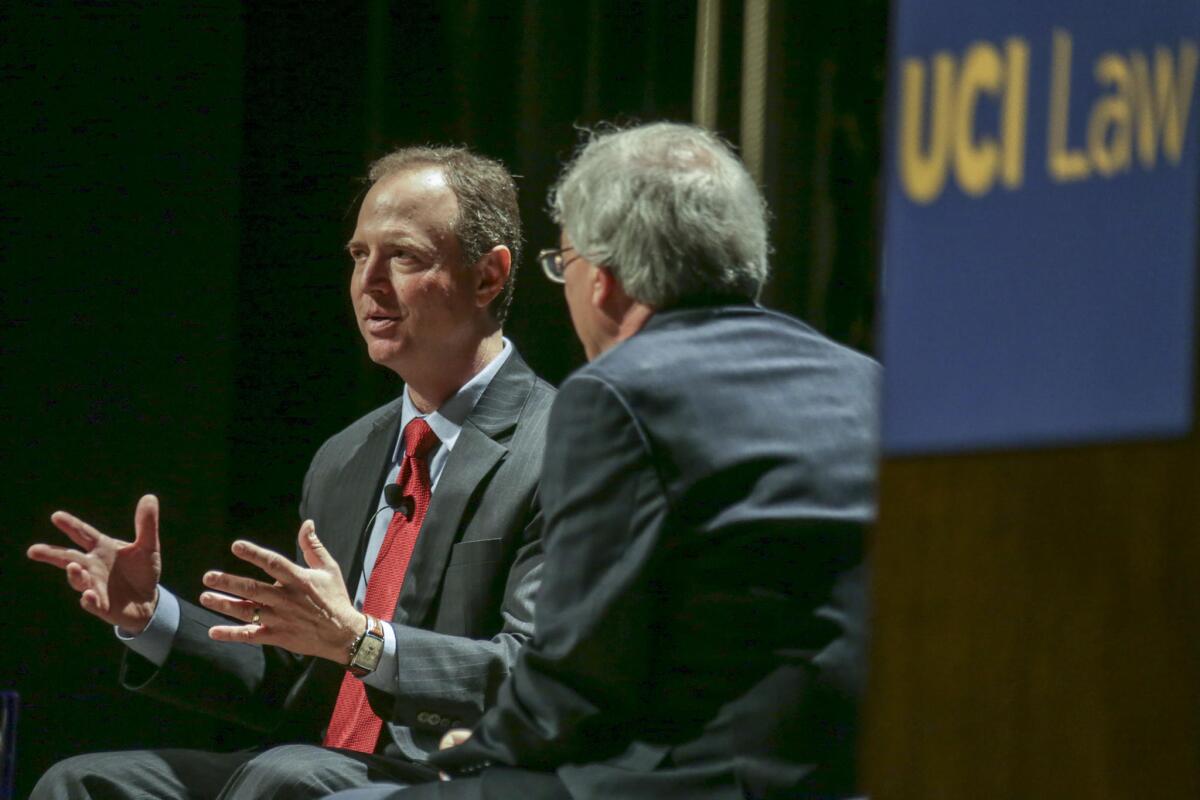
Rep. Adam Schiff (D-Burbank) said Tuesday that the alleged Russian meddling in last year’s presidential election was about far more than favoring one candidate over another. He said it was an effort to undermine the foundation of American democracy in order to prop up an authoritarian regime in Moscow.
‚ÄúNow if you look at this as just a one-off intervention, you might be inclined to dismiss the greater significance of it, or if you listen to the president, you might be inclined to dismiss this as simply efforts to relitigate a lost election,‚ÄĚ Schiff told several hundred people at UC Irvine. ‚ÄúBut the significance is really far greater. Quite separate and apart from the desire of the Russians to help Donald Trump and hurt Hillary Clinton was a more fundamental objective, and that was really to tear down at our democracy.‚ÄĚ
Schiff is the ranking Democrat on the House Intelligence Committee, which is investigating allegations of Russian intervention in the presidential election, including the leaking of hacked Democratic emails and contacts between Trump associates and Russians.
Trump has declared the investigation the ‚Äúsingle greatest witch hunt of a politician in American history‚ÄĚ on Twitter. Rep. Devin Nunes (R-Tulare), the former chairman of the committee, recently told hundreds of Republicans at a fundraiser that the investigation is about nothing more than Democrats trying to justify Clinton‚Äôs loss. Nunes stepped down from his position after allegations arose that he mishandled classified information.
Schiff said Russian President Vladimir Putin would have reasons for wanting to see Clinton fail and Trump succeed ‚Äď he believed that the CIA and Clinton were secretly behind mass demonstrations in Russia in 2011, and because Trump‚Äôs positions on issues such as the North Atlantic Treaty Organization were more favorable to Russia than Clinton‚Äôs.
But Schiff argued the larger point was sowing discord in the U.S., so Putin could argue that American democracy is no better than his government. Talk of rigged elections and surveillance, questioning the independence of the judiciary and freedom of the press ‚ÄĒ as Trump has done ‚ÄĒ boost Putin‚Äôs message, Schiff said. And the efforts are not limited to the United States, he added, pointing to allegations that the Russians made an effort to interfere in France‚Äôs recent election.
‚ÄúThe reality is there is new ideological struggle. It‚Äôs not communism versus capitalism anymore. It is authoritarian versus democracy,‚ÄĚ he said. ‚ÄúThis is the broader challenge we are facing.‚ÄĚ
Schiff also warned that there is no way to prevent Russian cyber-spying and that future attempts to interfere with American elections will only be more sophisticated, so voters must be educated.
‚ÄúOne of the most important conclusions the intelligence agencies have reached is the Russians will do this again,‚ÄĚ he said. ‚ÄúThe only real defense is to inoculate ourselves, to educate ourselves about what the Russians have done, why they are doing [it and] what they may do in the future and somehow we have to develop a consensus regardless of which party it helps and which party it hurts ‚ÄĒ that we will reject it.‚ÄĚ
Rep. Devin Nunes: Democrats are using Russia investigation to justify Clinton’s loss
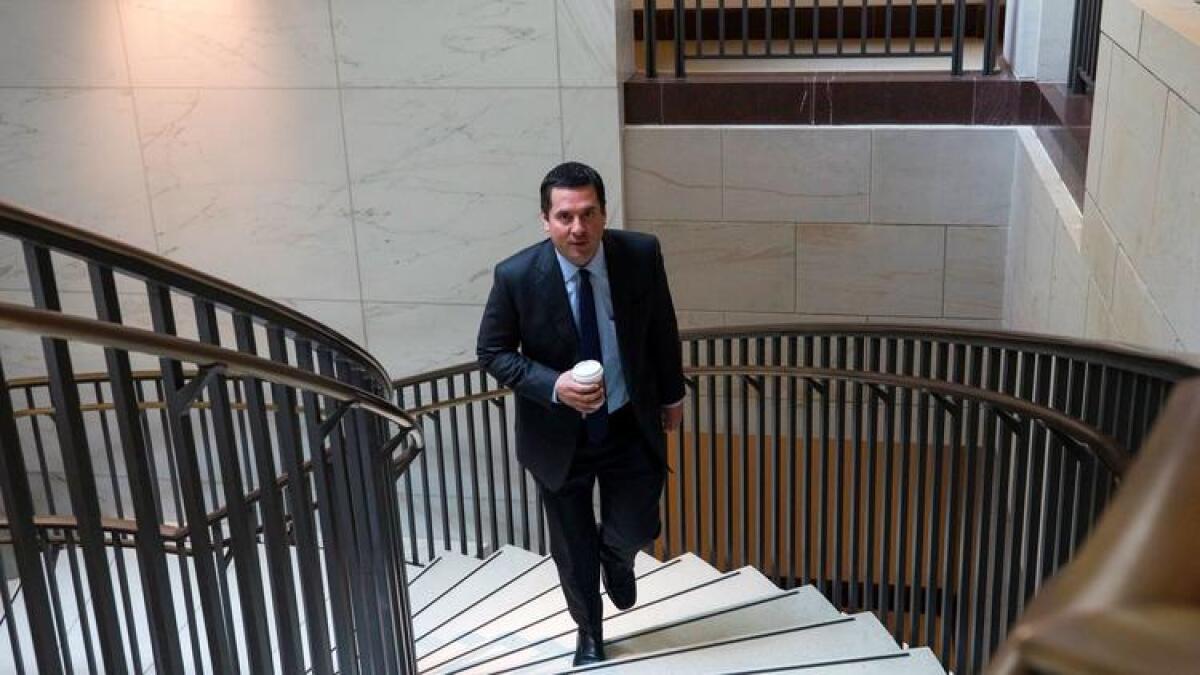
House Select Intelligence Committee Chairman Devin Nunes told hundreds of local Republicans at a recent private fundraiser that congressional investigations into Russia’s interference in the 2016 election are about Democrats trying to justify Hillary Clinton’s loss.
‚ÄúThe Democrats don‚Äôt want an investigation on Russia. They want an independent commission. Why do they want an independent commission? Because they want to continue the narrative that Vladimir Putin and Donald Trump are best friends, and that‚Äôs the reason that he won, because Hillary Clinton would have never lost on her own; it had to be someone else‚Äôs fault,‚ÄĚ Nunes told Republicans the day after he stepped away from leading the House investigation.
His remarks were recorded on video and provided to The Times.
California’s embattled tax board would lose power over staff and funding under lawmaker’s plan
Following months of accusations about mistakes and improper use of power by its elected members, the state Board of Equalization could lose substantial power and gain an independent overseer under legislation introduced in the state Assembly.
The bill by Assemblyman Sebastian Ridley-Thomas (D-Los Angeles) would shift much of the power over staff and spending authority away from the independent tax board and create a new inspector general to watch over its actions.
‚ÄúWhat we‚Äôre trying to do is make sure that the reform is transparent,‚ÄĚ Ridley-Thomas said. ‚ÄúThat‚Äôs what I think the moment demands.‚ÄĚ
The plan, introduced as an amended bill just before the Memorial Day holiday, comes in the wake of audits alleging the tax agency made multimillion dollar miscalculations on revenue allocations and that some of its elected members improperly used staff members who were supposed to be focused on tax collection. Earlier this month, Gov. Jerry Brown called the situation a ‚Äúmess‚ÄĚ and in April asked for an investigation by the state Department of Justice.
Four members of the Board of Equalization are directly elected by voters. The fifth, state Controller Betty Yee, serves in an ex officio capacity.
The Assembly bill would transfer significant staff decisions to the agency’s executive director and would require the Board of Equalization’s members to have their operations funded in detailed line items included in the state budget. It would also create an inspector general office and would require the board’s members to disclose all ex parte communications with those seeking action by the agency.
‚ÄúI think that these issues can be addressed if we keep them in the sunlight,‚ÄĚ said Ridley-Thomas.
New advertising campaign targets lawmakers over votes for climate change policies
A coalition of California businesses launched a new advertising campaign on Saturday to pressure lawmakers against enacting tighter policies on climate change and air pollution.
The campaign includes online videos and television advertising that warn of higher costs for business and residents. It arrives as Gov. Jerry Brown and lawmakers are debating whether to extend the cap-and-trade program, which requires companies to buy permits to release greenhouse gases, and how restrictive the system should be.
The first lawmaker being targeted is Assemblyman Ken Cooley (D-Rancho Cordova), accusing him of allowing ‚Äúunelected state employees‚ÄĚ to raise ‚Äúhidden taxes‚ÄĚ on gasoline and electricity because he voted last year for a tougher target to reduce emissions by 2030. Other lawmakers could face similar advertisements.
‚ÄúWe‚Äôre locked, loaded and ready to go statewide,‚ÄĚ said Rob Lapsley, president of the California Business Roundtable, which is funding the campaign through an advocacy group called Californians for Affordable and Reliable Energy.
The roundtable represents the state’s largest corporations, including oil refineries and manufacturers who have been critical of climate policies.
A dollar figure was not disclosed for the advertising campaign, which will represent a balancing act for the roundtable. It supports the cap-and-trade program as an alternative to more restrictive regulations, but it opposes some of the current proposals to extend it.
One measure would tie the program to air quality, targeting a wider range of pollutants than just greenhouse gases, and another would make it function more like a tax and charge higher prices for emission permits.
‚ÄúWe‚Äôre at a tipping point here,‚ÄĚ Lapsley said. ‚ÄúWe need to get this information out into the public in order to try and create balanced policies.‚ÄĚ
Although polls show broad support for fighting global warming in California, concerns about higher costs for constituents could be influential with some lawmakers who recently passed legislation to raise gas taxes to fund road repairs. Sen. Josh Newman (D-Fullerton) is facing a recall campaign over his vote.
Nonpartisan legislative analysts have said cap and trade could boost the price of gasoline by 24 cents to 73 cents by 2030. Environmentalists have said it’s inaccurate to tie any single policy to fluctuations in gas prices.
California Politics Podcast: The debate among Democrats didn’t end at their convention
The official gathering of California Democrats lasted only three days, but the lingering debate and simmering tensions could keep going well into next year’s elections.
On this week’s California Politics Podcast episode, we look back at the line in the sand drawn at last week’s California Democratic Party convention by some of the party’s most passionate progressive activists -- including the blunt speech delivered by an influential labor union leader last weekend.
We also discuss big new developments this week on the topic that energized those Democratic activists: a single-payer healthcare system for California. On Monday, a fiscal analysis put a large price tag on legislation to enact that sweeping healthcare change.
I’m joined this week by Times staff writer Melanie Mason.
California lawmakers quietly refuse to stop unlimited cash flowing from political parties to their campaigns
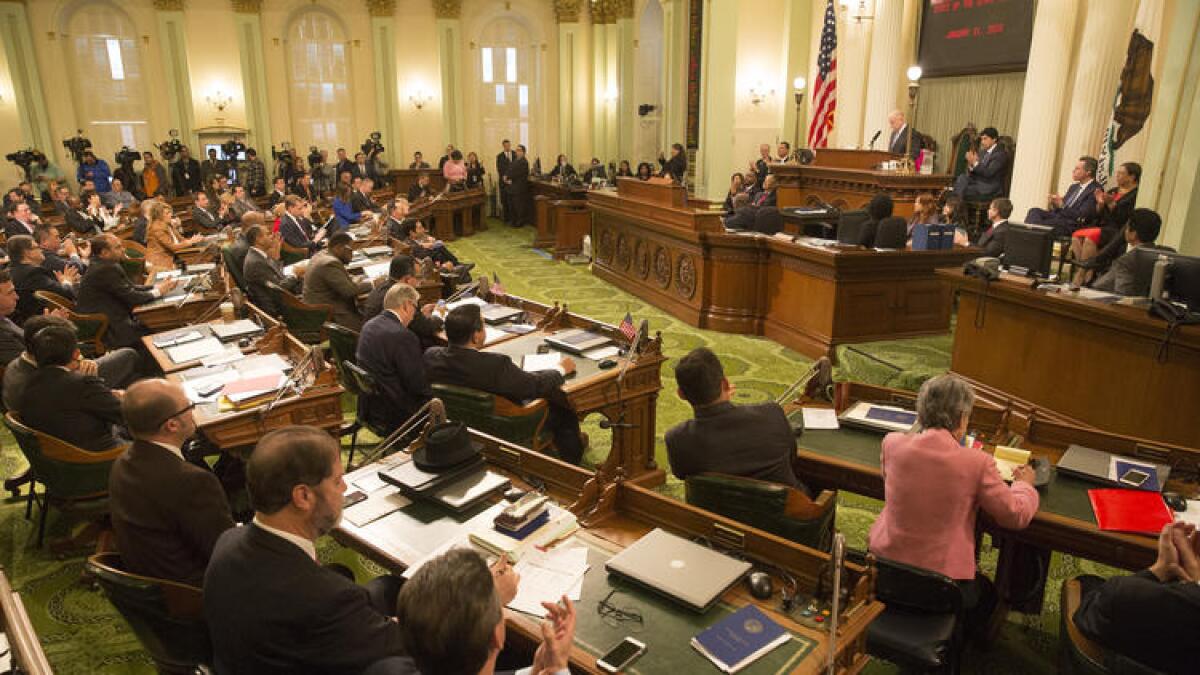
An ambitious effort to close a widely used loophole that allows large donations from political parties to be funneled into California races was rejected on Friday.
The bill by Assemblyman Marc Levine (D-San Rafael) would have made political party money donated to statewide and legislative candidates subject to the same contribution limits as individuals. Under the language of a voter-approved initiative, Proposition 34, money from political parties is exempt from those existing limits.
‚ÄúIt‚Äôs a money-laundering scheme that has completely duped voters,‚ÄĚ Levine said last fall when he first promised to introduce the bill.
The proposal was quietly killed, without a formal vote, by the Assembly Appropriations Committee during its biannual session to act on bills placed on the so-called suspense file due to their estimated costs. Committee staff estimated that Levine’s AB 1234 would have six-figure costs both for enforcement and for placing the issue before voters in 2018.
Veteran Democratic operative criticizes Kimberly Ellis for refusing to concede party chair race
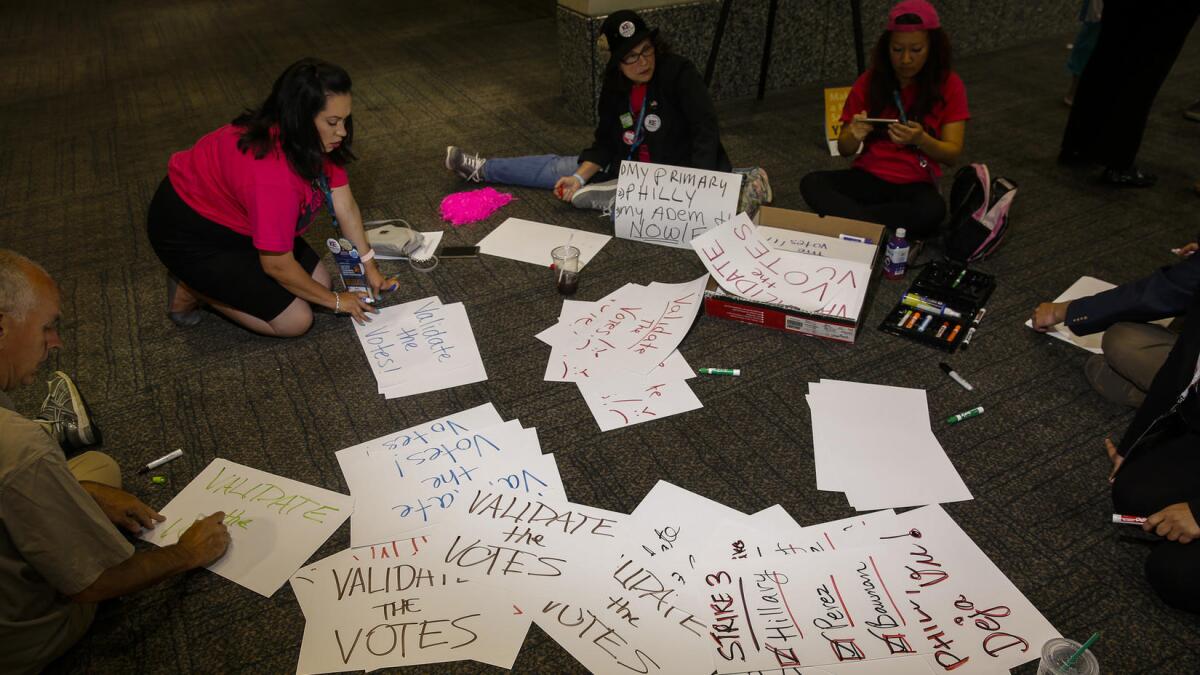
Veteran Democratic operative Bob Mulholland slammed infighting among California Democrats, and urged Kimberly Ellis, who came up short in a nasty party chair election, to work to unify the party.
‚ÄúI ‚Ķ and others did not understand some of your supporters‚Äô ‚Ķ attacks on those of us who have spent decades or years building the Democrats in California as the most successful political Party in the country,‚ÄĚ he wrote in an open letter to Ellis on Thursday.
He sent the email in the aftermath of the party’s rancorous convention last weekend that featured a bitter leadership battle between Ellis, a favorite of newer members including the backers of Bernie Sanders’ failed presidential bid, and longtime party leader Eric Bauman.
After Bauman was declared the winner by a razor-thin margin of just over 60 votes, Ellis refused to concede and demanded an audit of the vote as some of her backers floated rumors of ballot-box stuffing and discarded ballots.
Ellis demurred when asked about Mulholland’s scathing letter.
‚ÄúWhile our review continues, we are refraining from making any statement that might cause further division,‚ÄĚ Ellis said. ‚ÄúIf we hope to truly unify this party, it will require patience by all.‚ÄĚ
Officials with the Ellis campaign have been reviewing ballots this week. A spokesman said they had looked at about two-thirds by the end of Friday and hope to be done by the middle of next week.
Joe Macaluso, Ellis’ strategist, declined to discuss the results and said her team needed to review additional documentation beyond the ballots.
‚ÄúWe‚Äôre trying to stay true to our process and not release anything, but we‚Äôre in it,‚ÄĚ he said. ‚ÄúIt‚Äôs an extensive process.‚ÄĚ
Mulholland argued in his public letter that the convention should have showcased the party’s message, not intraparty spats.
‚ÄúOur annual Conventions should take care of internal business (Platforms, election of Officers, Resolutions, etc.), but more importantly a communication to voters, especially moderate Democrats and Independents about their concerns and issues,‚ÄĚ Mulholland wrote. ‚ÄúIf such busy people had a minute to read some news about our Convention, they saw Democrats yelling and arguing about ballots being stuffed, sounding like a Trump event. This Convention failed them.‚ÄĚ
Mulholland listed the party’s successes in the state, including Democrats’ lopsided voter registration edge, its nearly three-decade record of supporting Democratic presidential candidates, its election of female senators since 1992 and its hold of every statewide office, supermajorities in both chambers of the Legislature and nearly three-quarters of the congressional delegation.
‚ÄúOver the last 29 years, that‚Äôs a [1.000] batting record,‚ÄĚ he wrote.
Mulholland called on Ellis to hold a news conference with Bauman once she is satisfied with her audit of the vote. Then, he wrote, ‚Äúlet‚Äôs move on.‚ÄĚ
California lawmakers block proposals meant to make it easier to track and report hate crimes
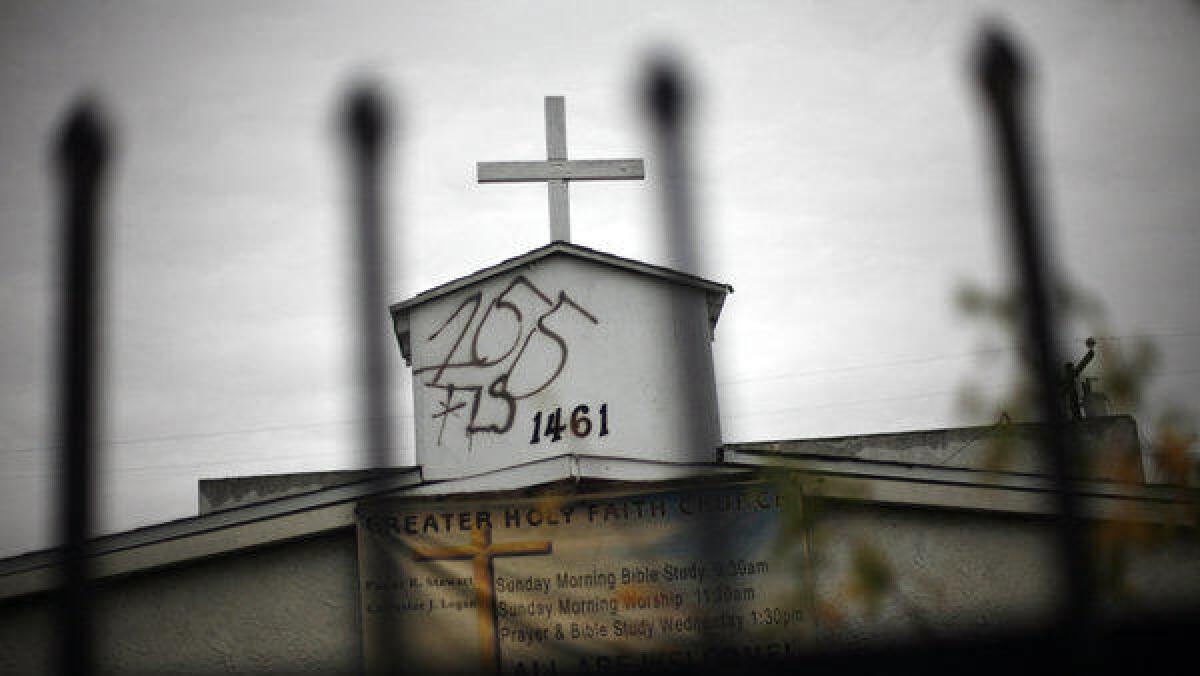
California lawmakers Friday stalled measures meant to help report and track hate crimes across the state, proposals filed amid a wave of incidents reported after the 2016 presidential election.
The state Assembly Appropriations Committee shelved bills that would have created new hate-crime reporting requirements for police and a hotline under the attorney general’s office for victims wishing to report an attack.
Of those bills, a proposal filed by Assemblyman Raul Bocanegra (D-Pacoima) initially sought to develop a state government database with the names of felons convicted of hate crimes related to race, religion and sexual orientation.
That proposal was amended to instead require every law enforcement agency to forward a summary of a reported hate crime, upon conclusion of an investigation, to the human relations commission within its jurisdiction. But a committee analysis found it could cost the state more than $150,000 to help agencies redact personal information from their records.
The committee also shut down bills that would have required police to update policies to address hate crimes and include a checkbox on the front pages of reports that would prominently provide an option to indicate whether a crime was bias-related.
Local law enforcement officials have reported a recent rise in reported hate crime incidents. Existing state laws require local and state law enforcement officials to compile hate crime information. California jurisdictions reported a 10.4% statewide increase in those incidents last year.
Obama staffer Buffy Wicks running for California Assembly
Here were the top six moments from last night’s L.A. congressional race debate
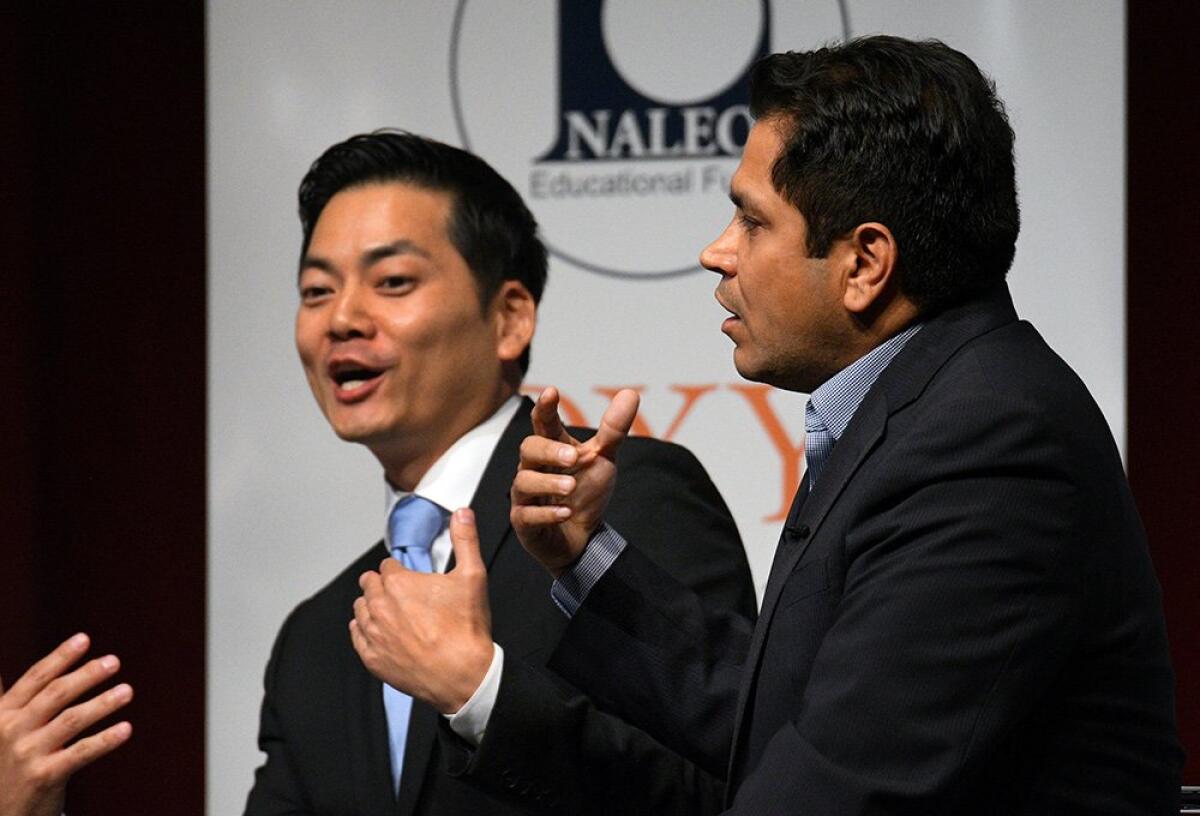
Attorney Robert Lee Ahn and Assemblyman Jimmy Gomez sparred Thursday night at the first and only debate in the runoff race for the 34th Congressional District seat.
The candidates, both Democrats, offered little in the way of policy differences. Both agreed President Trump has ‚Äúracist tendencies,‚ÄĚ that keeping the Affordable Care Act is a top priority, and that they would fight to protect immigrants‚Äô rights.
Ahn came out swinging, repeatedly calling Gomez an ‚Äúinsider‚ÄĚ who‚Äôs ‚Äúsponsored by special interests,‚ÄĚ while Gomez pointed to his work supporting progressive policies in the Legislature and endorsements he‚Äôs received from left-leaning groups.
Here are the top six exchanges:
- The numbers problem: Gomez again criticized Ahn for a response he gave in an L.A. Times questionnaire that suggested he would negotiate with Republicans to protect parts of Obamacare. Gomez said Democrats need to take a ‚Äúhard line‚ÄĚ and that Ahn was too soft on support for Medicaid. ‚ÄúIn case you haven‚Äôt noticed, we have a numbers problem in Congress,‚ÄĚ Ahn shot back. ‚ÄúUntil we‚Äôre able to take back the House, we‚Äôre going to have to talk to the other side.‚ÄĚ
- Gomez fact-checks Ahn‚Äôs name-check: Ahn made the case that voters should send an attorney to Congress to help in the legal battles against the Trump presidency. ‚ÄúI will join fellow attorneys and Congress members Ted Lieu and Adam Schiff in the fight,‚ÄĚ Ahn said to the crowd. Gomez, who spent much of the evening bringing up his legislative experience and vast array of endorsements, responded: ‚ÄúI hate to mention it, but, you know, Adam Schiff and Ted Lieu have endorsed me.‚ÄĚ
- Getting more personal: In discussions about immigration and healthcare, Gomez and Ahn delved a little deeper into their backgrounds. Gomez talked about his young nephew who feared that his mother, a permanent resident, might be deported after Trump was elected. Ahn told the story of how his parents came to the United States with $700 each and cobbled together enough money to open a hamburger stand, eventually building their ‚Äúpiece of the American Dream.‚ÄĚ
- Ahn on the attack: Ahn repeatedly criticized Gomez for taking money from corporate interests. ‚ÄúSpecial interests, big pharma, big bankers. ... It‚Äôs all payback time [for Gomez donors] on Day One,‚ÄĚ Ahn said. ‚ÄúOn Day One, I owe the people of the 34th District and that‚Äôs it.‚ÄĚ Ahn pitched himself as an outsider who understands the district and whose small-business experience will help him relate to the problems facing everyday residents.
- ‚ÄėA litmus test‚Äô: Gomez fought back against the idea that he‚Äôs a ‚Äúcorporate Democrat,‚ÄĚ primarily by pointing to several endorsements he‚Äôs received from left-leaning groups. ‚ÄúIf I was so establishment, I don‚Äôt think Our Revolution ... would actually endorse me,‚ÄĚ Gomez said of the Bernie Sanders-affiliated group. ‚ÄúIf you want a litmus test, that‚Äôs a litmus test if you‚Äôre a progressive ... if you‚Äôre actually able to take on the status quo.‚ÄĚ
- Gomez gets skewered on gas tax: As part of his argument that he has fought for the ‚Äúlittle guy,‚ÄĚ Ahn expressed outrage that California‚Äôs gas taxes will increase July 1, saying there‚Äôs ‚Äúnothing progressive‚ÄĚ about the gas tax hike Gomez voted for. ‚ÄúWe already paid 38 cents per gallon. Where is that money going?‚ÄĚ Ahn said, echoing a line many legislative Republicans have used. ‚ÄúSacramento politicians, this is what they do, they take our money and they spend it and there‚Äôs no accountability.‚ÄĚ Gomez responded by saying public safety was at stake and that fixing roads was the ‚Äúresponsible‚ÄĚ thing to do.
If you missed it, you can watch the entire thing here.
The election is set for June 6.
Rob Reiner, Hollywood bigwigs and Netflix co-founder team up to give Villaraigosa’s campaign a major cash boost
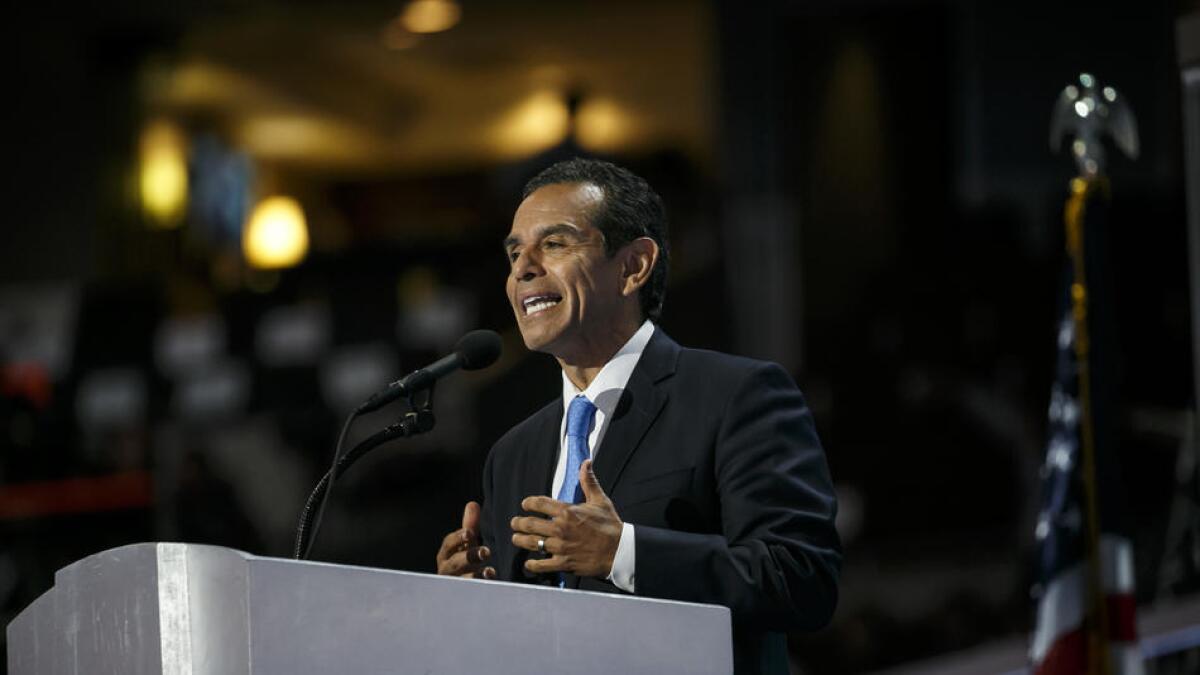
Hollywood heavyweights are set to host a major fundraiser for Antonio Villaraigosa’s gubernatorial campaign on June 15, ensuring an infusion of large contributions shortly before a key fundraising deadline.
Donors are being asked to contribute up to $29,200 to attend a ‚Äúsummer reception‚ÄĚ at the home of media executive Peter Chernin and his wife Megan, the site of a celebrity-studded fundraiser for President Obama in 2013.
Co-hosts include Paramount Pictures chief Jim Gianopulos, Netflix co-founder Reed Hastings, video game honcho Robert Kotick, comedian George Lopez, Sony chief Michael Lynton, NBCUniversal vice chairman Ron Meyer, producer Rob Reiner, super-agent Rick Rosen, producer Orly Adelson, former U.S. Ambassador to Spain James Costos, former White House decorator Michael Smith and attorney Michael Tuchin.
Villaraigosa, the former mayor of Los Angeles, entered the governor’s race in November. Through the end of 2016, he raised $2.7 million, a respectable haul in a short time period when Democratic donors were reeling from the presidential election and distracted by the holidays.
But his fundraising lags behind that of his top rivals, Lt. Gov. Gavin Newsom and state Treasurer John Chiang. So political observers will be scrutinizing his next financial disclosure report, which will cover the first six months of 2017. The fundraiser occurs 15 days before the fundraising period closes on June 30.
A delay on cap-and-trade vote would be a victory for Donald Trump, Gov. Jerry Brown’s office says
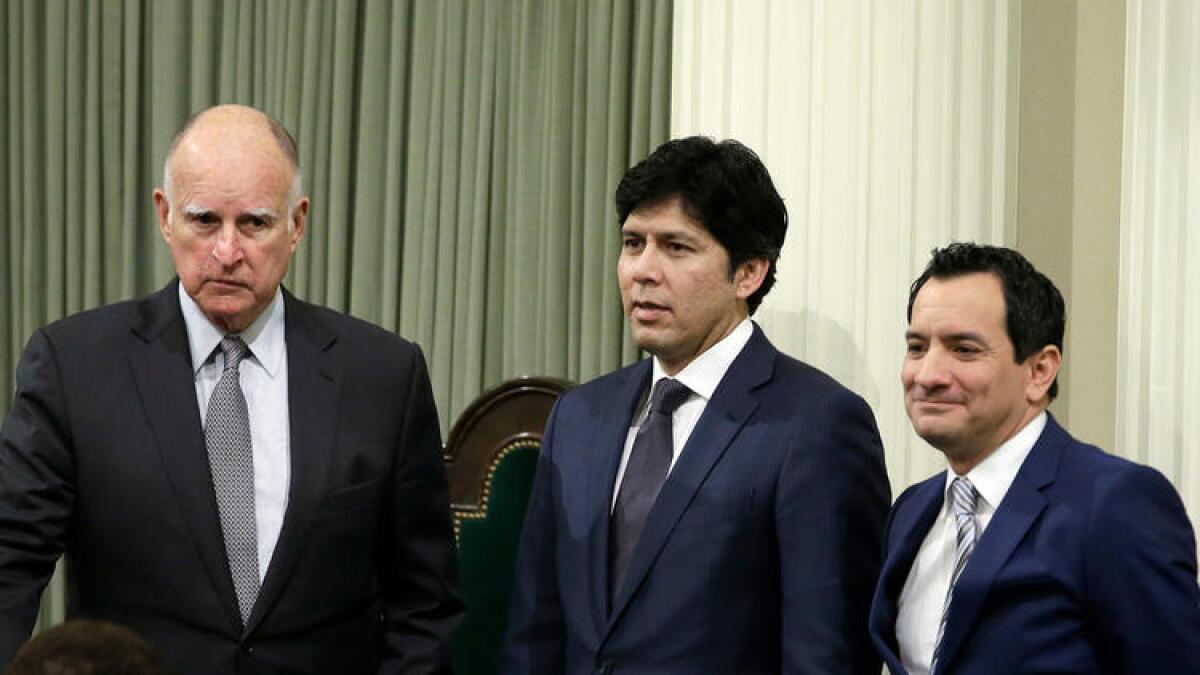
Despite hesitance and resistance from state lawmakers, Gov. Jerry Brown is refusing to budge from his goal of reaching a deal next month to extend California’s cap-and-trade program.
The latest tug-of-war on the issue came this week in an email exchange circulated among Capitol staff members and advocates working on climate change policies.
Kip Lipper, an environmental advisor for Senate leadership, wrote in a Thursday email that there were ‚Äúno plans to take up a cap and trade reauthorization bill anytime soon.‚ÄĚ
Echoing concerns that have percolated among lawmakers, Lipper said senators were ‚Äúgas tax weary‚ÄĚ about the possibility of another difficult vote after deciding to raise gas taxes to pay for road repairs earlier this year.
The cap-and-trade program, which is a cornerstone of California’s fight against global warming, requires companies to buy permits to release greenhouse gas emissions and could boost the price of gasoline.
With votes hard to come by, Lipper wrote, the issue ‚Äúshould not be rushed.‚ÄĚ
Camille Wagner, Brown’s legislative secretary, responded on Friday saying there was no reason to delay.
‚ÄúWe‚Äôve all been meeting for months on this issue,‚ÄĚ she wrote. ‚ÄúWe know the areas of agreement and disagreement ‚Äď now is the time to work through those.‚ÄĚ
She added that ‚ÄúNOTHING is more important‚ÄĚ than getting a deal as soon as possible.
‚ÄúThis is not a time for retreat or a time to give aid and comfort to Donald Trump by undermining a pillar of California‚Äôs bold program to arrest climate change,‚ÄĚ Wagner wrote. ‚ÄúIf California‚Äôs Cap and Trade falls because we fail to act, climate denial wins.‚ÄĚ
Brown had already faced resistance to his push to reach a deal on cap and trade in June, when the state budget is due. Assembly Speaker Anthony Rendon (D-Paramount) previously said ‚Äúwe don‚Äôt have to extend it this year.‚ÄĚ
The disagreement over the timeline for reaching a deal is only one of the disputes surrounding cap and trade.
Assembly leaders have raised the possibility of pushing legislation with only a majority vote, an idea the governor’s office rejected. Brown wants a two-thirds vote to insulate cap and trade from legal challenges.
There are also varied ideas about how the program should function in the future. Assembly legislation would modify cap and trade so it also targets local pollution, rather than just greenhouse gases. Senate legislation would make the program function more like a carbon tax.
California lawmakers shelve bills that would have broadened the state‚Äôs legal definition of a ‚Äėviolent crime‚Äô
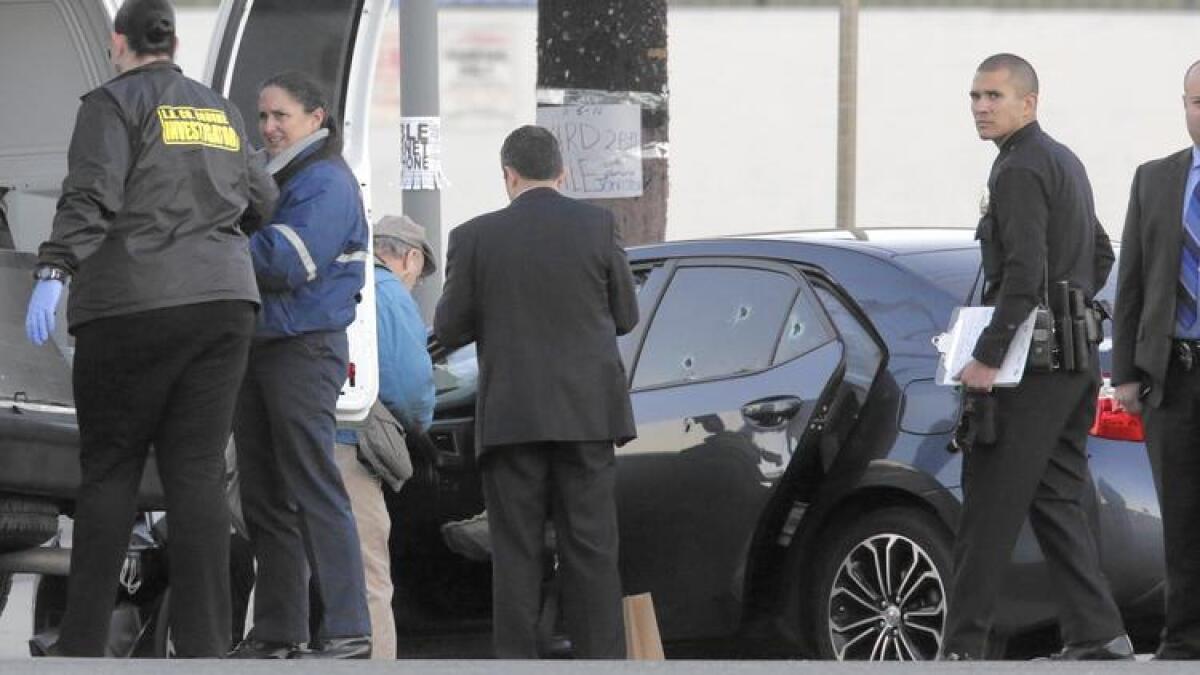
California won’t be expanding its legal definition of a violent crime soon.
The Assembly Appropriations Committee on Friday shelved the last of several bills that sought to broaden the number of violent-felony offenses under the California penal code. The legislation would have added to the list additional forms of rape, sodomy and human trafficking. It carried a heavy price tag.
A bipartisan proposal filed by the committee’s chair, Lorena Gonzalez (D-San Diego), and Assemblywoman Melissa Melendez (R-Lake Elsinore), would have cost the state more than $1 million in corrections expenses. It would have increased the length of incarceration for more than 100 prisoners.
Another bill by Assemblyman Freddie Rodriguez (D-Pomona) was estimated to add annual costs in the millions for increasing the sentences of more than 200 inmates. They joined two other legislative proposals shelved in the Assembly Public Safety Committee this year.
The bills sought to change the legal definition of a violent crime as California undergoes a massive overhaul of its parole system.
Gov. Jerry Brown‚Äôs Proposition 57, which voters overwhelmingly approved in November, will expand good behavior credits and give new power to the state parole board to consider the early release of prisoners who have served the full term of their primary sentences, and whose crimes are not designated as ‚Äúviolent‚ÄĚ under the California penal code.
But opponents have argued that list is both short and porous.
The effort to make tampons tax free in California has been delayed until 2018

Legislation to eliminate California sales taxes on the purchase of tampons was delayed Friday by the Assembly’s fiscal committee until 2018, a blow to advocates who say the tax is an unfair burden on low-income women and families.
The delay imposed on AB 9 is the second setback this month for efforts to eliminate taxes on products for women and children. A separate bill that included a tax-free provision for diapers was killed in a legislative committee on May 8.
The bill that was held back on Friday, written by Assemblywoman Cristina Garcia (D-Bell Gardens), would have excluded tampons, sanitary napkins and other menstrual products from sales taxes. A legislative committee analysis estimated the proposal would reduce state general fund revenues by $10.5 million a year.
Dozens of other bills with a cost to state government were killed by the Assembly Appropriations Committee, while AB 9 was instead reclassified as a ‚Äútwo-year bill,‚ÄĚ meaning it is eligible to be heard again in the second year of the legislative session.
Gov. Jerry Brown last year rejected a similar measure that sought to make tampons tax-free, writing in his veto message that ‚Äútax breaks are the same as new spending ‚Äď they both cost the general fund money.‚ÄĚ
Outside money spills into L.A. congressional race as election day nears
Spending by outside groups hoping to influence Los Angeles’ congressional race is picking up, with less than two weeks to go before the runoff for the 34th Congressional District.
Assemblyman Jimmy Gomez and attorney Robert Lee Ahn, both Democrats, are competing to fill the former seat of Xavier Becerra in the June 6 election. Becerra stepped down months ago to become the state’s attorney general.
Spending separate from the candidates’ campaigns is reaching into the six-figure range, with most of the outside money going to support Gomez, the heavy favorite of establishment Democrats.
One group funded primarily by an Ahn donor, Citizens for a Better Government, has spent $40,264 on data, printing and postage for mailers, and $8,000 on treasury services to support Ahn’s bid.
The Latino Victory Fund, which has endorsed Gomez, recently spent $29,640 on direct mail and $30,000 on phone banking and voter canvassing for the candidate. Billboard company Outfront Media LLC has spent $1,973 on billboards for him.
Also backing Gomez is a group called Middle Class Values PAC. The group spent $19,653 on mailers supporting Gomez despite not having reported receiving any major contributions so far this year.
The group’s biggest donors last year were a handful of Nevada casino owners and developers, but most of that money appears to have been spent on Democrats running for Congress in Pennsylvania and Nevada.
Outside spending in the 34th Congressional District race has been dwarfed by candidate spending. As of March 31, Gomez had spent $446,455 and Ahn had dropped about $767,315 on his run.
New campaign finance figures from both candidates are due at midnight Friday.
Gov. Jerry Brown’s budget team drops its hotly debated plans to redefine the state’s spending limit
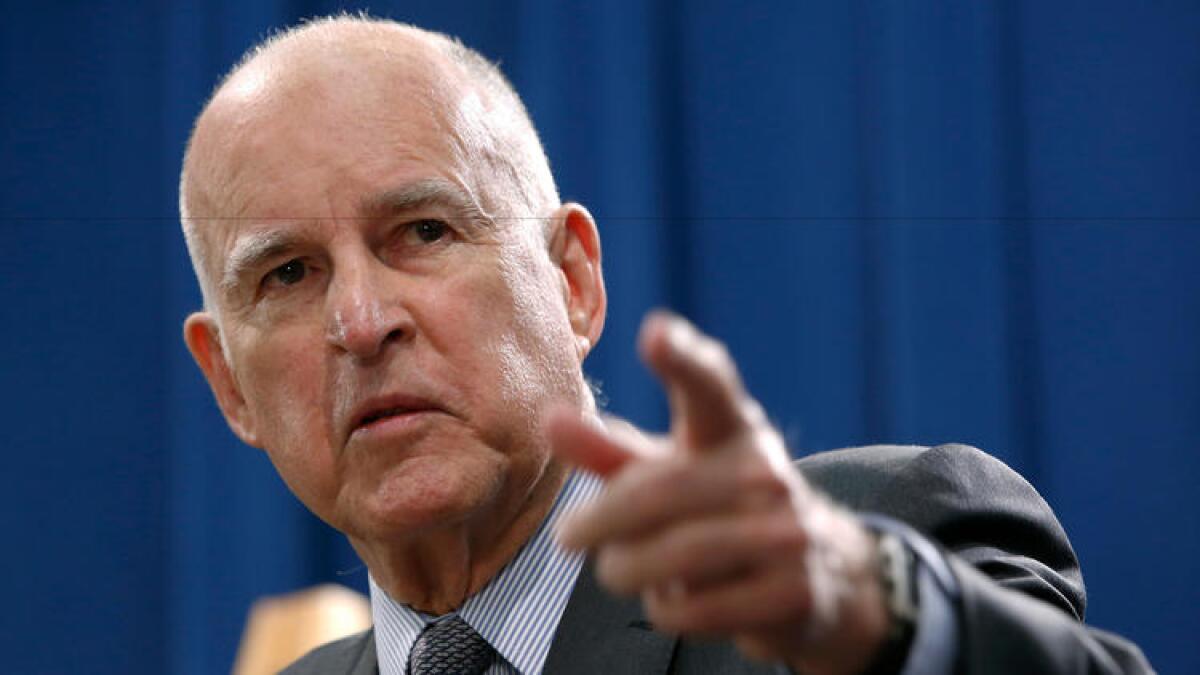
With questions mounting about the legal justification for omitting some $22 billion in expenses from California’s long-standing spending cap, Gov. Jerry Brown’s administration dropped the plan Thursday while promising to work on the issue again later this year.
Brown‚Äôs advisors told the Assembly Budget Committee that this could include some changes in state law to clarify the rules surrounding what‚Äôs known as the ‚ÄúGann limit,‚ÄĚ a cap on state spending growth imposed by voters in 1979. The cap has rarely come into play in state budgeting in recent years, as it was loosened by a subsequent ballot measure in 1990. The governor‚Äôs administration said it continues to worry about how the law interacts with other mandates related to school funding.
‚ÄúSchool financing has changed significantly since the limit was first established in 1979,‚ÄĚ said H.D. Palmer, Brown‚Äôs budget spokesman. ‚ÄúBecause of that, we continue to believe we need statutory clarifications related to these school funding changes.‚ÄĚ
Legislative analysts warned lawmakers in April that the governor may have been overestimating how much room for spending was left under the cap, a dispute that continued for weeks while lawmakers began drafting plans for formal budget negotiations next month.
Earlier this week, state senators again raised concerns about the complex estimates used to determine how much spending the Gann law would allow in the budget year that begins July 1. And they provided an analysis by the Legislature’s lawyers that suggested Brown’s proposal could be unconstitutional.
The spending limit is enforced over two fiscal years, which means Brown and lawmakers have time to reconcile different estimates. But absent changes similar to those advocated by the governor, a portion of future tax revenues would have to be split between schools and rebates to taxpayers.
California Senate, Assembly advance their own plans on how to spend tobacco tax revenue

Perhaps the biggest budget skirmish that remains unsolved this year is how California should spend revenue from the tobacco tax voters approved last fall.
Gov. Jerry Brown wants to put that money to expand overall spending on Medi-Cal, which provides subsidized healthcare for the poor. But the some of initiative’s backers, namely doctor and dental groups, have cried foul, arguing that money is meant to go to increasing payments for providers.
Now, the Senate and Assembly are weighing in. In plans approved in their respective budget committees this week, both houses stray from Brown’s proposal to put the money toward general Medi-Cal costs and lay out their own ideas on how to divvy up the revenue.
But while both houses reject Brown’s approach, there are key differences between their proposals. Most significantly, the Assembly would allocate all $1.1 billion in projected tax revenue in the next budget year. The Senate, meanwhile, would spend just under $350 million next year, gradually ramping up spending to $1.1 billion by fiscal year 2020-21.
Both houses also would increase provider payments, but in different ways. The Assembly would put around $857 million toward once-yearly ‚Äúincentive payments‚ÄĚ to physicians and dentists that would be tied to their Medi-Cal and Denti-Cal caseloads.
The Senate proposed putting $150 million next year to physician rate increases that would be targeted for those working in high-need areas and specialties. That number would increase in successive years, topping out at $700 million by 2020. The Senate also would put $130 million toward higher rates for dentists.
The California Medical Assn., which has been pushing for higher reimbursement rates, praised both houses for including the higher rates, but group spokeswoman Joanne Adams noted that ‚Äúthe current Legislature cannot tie the hands of a future governor or Legislature,‚ÄĚ indicating a preference toward the Assembly approach.
Each house would allocate $50 million for reimbursement rates for family planning providers, a priority of Planned Parenthood.
And both houses put money toward expanding Medi-Cal to cover young adults up to age 26 who are in the country illegally. The proposal builds on California’s policy of making children without legal status younger than 19 eligible for Medi-Cal, which went into effect last year.
Anthony Wright, of the advocacy group Health Access, noted that by expanding coverage for those up to age 26, it would align with Obamacare’s policy of letting children stay on their parent’s health insurance until that age.
‚ÄúThis is a concrete and tangible way to show we are actually taking steps forward‚ÄĚ in expanding coverage, Wright said.
The Brown administration estimates that around 130,000 people would be eligible for Medi-Cal under such a proposal, and such an expansion would cost the state just under $230 million.
The Senate proposal would put around $63 million toward that expansion in the upcoming budget year and around $85 million in subsequent years. The Assembly would put $54 million toward the plan.
The Brown administration did not take a position on the Medi-Cal expansion proposal, but H.D. Palmer, spokesman for Brown’s Department of Finance, noted that the Senate was using higher revenue projections than Brown’s plan, which allows legislators to propose more funding.
Palmer said the administration was sticking with its original proposal to use tobacco tax dollars for general Medi-Cal spending.
‚ÄúThe budget‚Äôs proposal for Prop. 56 will provide increased funding for healthcare programs and services in a way that‚Äôs consistent with the measure that voters approved last fall,‚ÄĚ Palmer said.
------------
FOR THE RECORD
May 25, 2017, 4:58 p.m.: A previous version of this article reported that both houses were using higher revenue projections than Gov. Brown’s budget proposal. The Senate is using higher projections; the Assembly is using the same estimates as the Brown administration.
California chief justice says she stands by her decision to speak out against Trump’s immigration actions
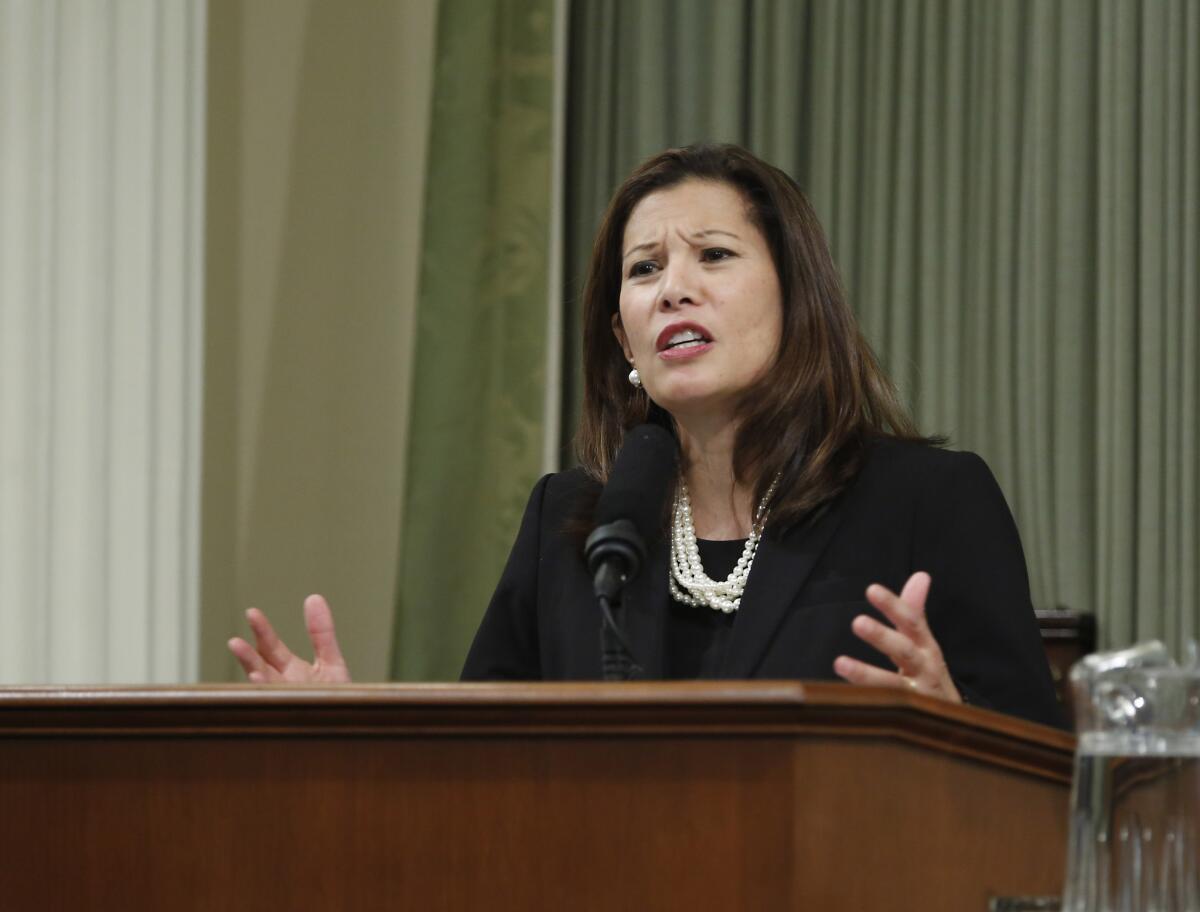
California Supreme Court Chief Justice Tani Cantil-Sakauye on Thursday said she stands by her position that courthouses should be areas where immigration arrests should not occur.
Cantil-Sakauye, a former prosecutor who rose through the judicial ranks as an appointee of Republican governors, drew national attention in March after she blasted the federal government‚Äôs expanded immigration actions, among which she said included ‚Äústalking‚ÄĚ immigrants at courthouses.
Speaking at a Sacramento Press Club luncheon on Thursday, she said the Supreme Court chambers fielded an outpouring of calls and letters after her comments. Some were ‚Äúprofane‚ÄĚ and angry, from residents living outside the state. Others came from supporters.
Many said that as a judge, she should not wade into politics. U.S. Atty. Gen. Jeff Sessions and Homeland Security Secretary John F. Kelly admonished her in a letter, spurring California state leaders to respond in defense of state policies.
On Thursday, Cantil-Sakauye stood by her decision to denounce the actions, saying, ‚ÄúIf I couldn‚Äôt speak out as chief justice, I don‚Äôt know who could.‚ÄĚ
Courthouses in California have numerous programs to encourage people to come forward and ask questions, seek services and mediate issues, Cantil-Sakauye said.
‚ÄúIf we have a segment [of the population] that is afraid to come, then we are looking at no access to justice, [and] potentially public safety issues, which is antithetical to what the justice system exists for,‚ÄĚ she said. ‚ÄúTo me, it is a safe zone, and I ask that courthouses be placed on par with school districts and hospitals and churches.‚ÄĚ
Rep. Darrell Issa says the federal employee insurance program should be expanded to all Americans
Though it wasn’t included in the House Republicans’ healthcare bill, Rep. Darrell Issa (R-Vista) still believes Americans should have access to the same insurance plans federal employees pick from, and he’s hoping the Senate will embrace the idea.
In a letter Thursday, Issa asked the Senate Health Care Working Group to consider opening the Federal Employee Health Benefits Program to more, or all, Americans. It’s a national insurance idea that’s persisted since the program began in 1960, and a proposal Issa has pitched before.
The program allows more than 8 million current and retired federal employees across the country to shop among hundreds of health insurance plans and then apply their employer contribution to whatever plan they choose.
Private insurance companies have pulled out of several state insurance marketplaces, where people whose employers don’t offer insurance can purchase insurance using a federal subsidy. That leaves people with fewer health insurance choices, a common complaint cited by Republicans as a reason to repeal the Affordable Care Act.
‚ÄúIt‚Äôs choice. If the government can maximize choice to you and then subsidize where appropriate based on need, then we‚Äôve met the two bases for government involvement,‚ÄĚ Issa said.
Issa voted for the American Health Care Act, the GOP bill to roll back much of Obamacare that passed May 4 without Democratic support, but he stresses that he did so just to keep momentum.
‚ÄúOne of the reasons I voted for this in the House was to keep the process alive so we could do reform,‚ÄĚ Issa said. ‚ÄúLeveraging business models that work is the goal that somebody like me wants to do. Find out what works and invest in it, find out what doesn‚Äôt work and fix it or abandon it.‚ÄĚ
On Thursday, the Congressional Budget Office said the bill as passed by the House would cause 23 million fewer people to have health insurance by 2026. The budget office, which Congress relies on to analyze the complex legislation, projected that many additional consumers would see skimpier health coverage and higher deductibles.
The Senate has essentially said it will write its own version of the bill.
Issa’s letter to his Senate colleagues also urges members to protect people with preexisting conditions, safeguard coverage for people with mental illnesses and protect people near retirement age from a spike in their premiums.
‚ÄúThere‚Äôs still more to be done. This bill is going to be about compromise, and a down payment on change,‚ÄĚ Issa said.
Senate President Kevin de L√©on is busy raising campaign funds ‚ÄĒ but for what office?
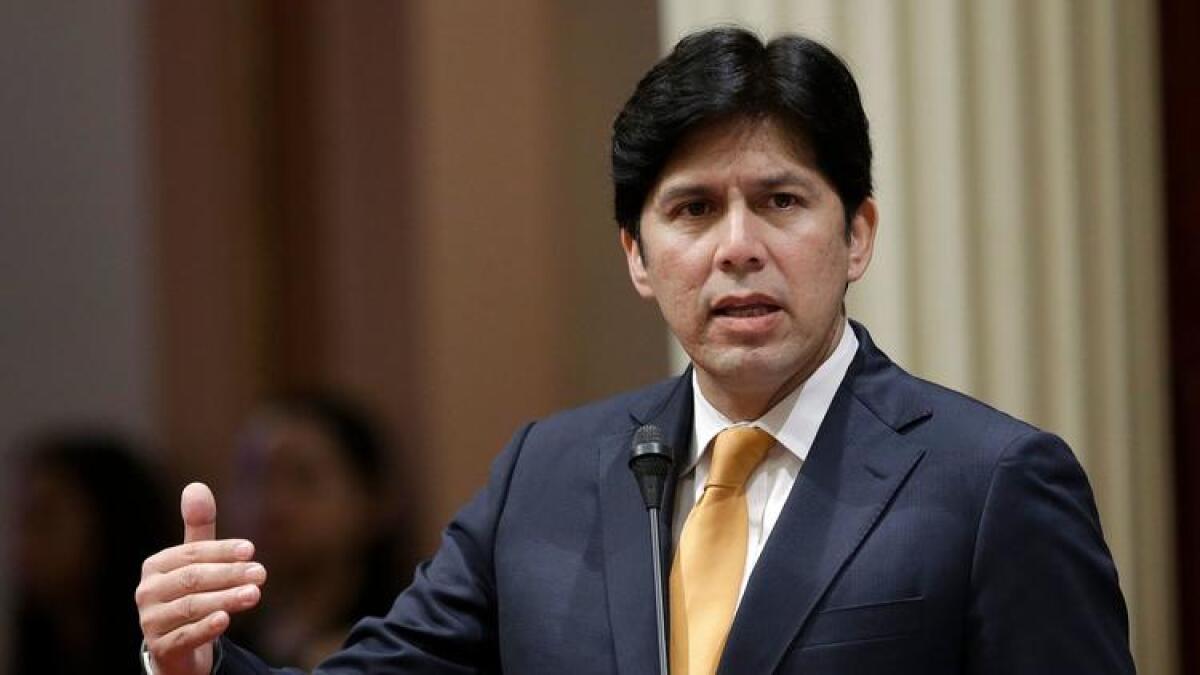
California Senate President Pro Tem Kevin de Léon (D-Los Angeles) stirred up speculation about a possible run for governor or U.S. Senate when he released a slickly produced video just before the California Democratic Party’s convention last weekend, but he has remained coy about his future political plans.
That doesn’t mean he isn’t padding his campaign war chest, though. De León has two fundraisers lined up in Los Angeles in June, presumably for his 2018 campaign for California lieutenant governor.
The question is whether De León actually will run for lieutenant governor. In the past, he has said he hasn’t made a decision. He has also given his supporters the go-ahead to endorse state Sen. Ed Hernandez (D-Azusa), a longtime political ally, in the race.
De Léon’s campaign account for lieutenant governor had $1.7 million in the bank at the end of last year. He raised close to a half-million this year, according to state political financial disclosure reports.
The first fundraiser in June is being hosted by veteran Hollywood executive Peter Guber and his wife, Tara, in Bel Air on June 8, with suggested contributions ranging from $500 to $2,500.
The second is in late June at the Palm in Los Angeles. The fundraiser is hosted by Craig Darian, CEO of the Occidental Entertainment Group, and his wife, Kimberly, as well as Albert Sweet, the founder of the company. The suggested donations are the same as for the earlier fundraiser.
De León made history in 2014 when he was selected by his colleagues as the first Latino to lead the California Senate. The tenure has been marked by significant action on climate change, immigration and gun control.
Volkswagen’s clean car plan falls short in low-income neighborhoods, California regulators say

State regulators have asked Volkswagen to revise its plan to invest in zero emission technology in California, a victory for critics who said the automaker wasn’t doing enough in disadvantaged communities.
The investment plan, which will total $800 million over 10 years, is part of Volkswagen’s obligation under a multi-billion settlement for evading pollution rules.
California, which is struggling to get enough zero emission vehicles on the road to meet its goals, is ‚Äúeager to move forward,‚ÄĚ wrote Air Resources Board Executive Officer Richard Corey in a Wednesday letter to Electrify America, a Volkswagen subsidiary.
However, Corey wrote, ‚Äúwe need more information‚ÄĚ on how the company will meet its target of spending 35% of its investment in disadvantaged communities, a target set by state regulators in hopes of broadening the adoption of electric vehicles.
Corey also asked Electrify America to consider supporting hydrogen fueling stations, rather than just electric chargers.
Once the company submits an updated version of its plan, state regulators will consider whether to approve it.
Electrify America said it is reviewing the letter.
Dean Florez, a member of the Air Resources Board, said the original investment plan had ‚Äúsignificant holes‚ÄĚ and ‚Äúincluded no real investment in disadvantaged communities.‚ÄĚ
He praised the decision to request revisions and said the board should ‚Äúhold VW‚Äôs feet to the fire.‚ÄĚ
This story has been updated with additional comments.
Lawmakers scrap effort to make it easier to pass local transportation taxes
An effort to boost the chances of local ballot measures raising taxes for transportation needs was quietly killed Thursday in the state Capitol.
The proposal, which would have ultimately required changing the California Constitution through a statewide vote, was in response to the high hurdle set decades ago for local taxes earmarked for specific projects.
Those kinds of taxes in cities and counties require two-thirds of the vote. The constitutional amendment by state Sen. Scott Wiener (D-San Francisco) would have lowered the vote threshold to 55% of ballots cast for any transportation proposal.
Wiener argued the long list of local transportation projects lacking funds won‚Äôt completely be erased by the $52-billion transportation plan signed into law last month. And he pointed specifically to examples like a transportation tax plan in the Bay Area last year that garnered 62% of the vote ‚ÄĒ still slightly shy of the two-thirds mandate.
While the effort can be brought back before lawmakers adjourn the current session in the summer of 2018, Thursday’s action represented a major setback for transportation groups and labor unions that supported it. The measure was opposed by business and anti-tax advocates.
Wiener said he intends to re-introduce the measure in the coming weeks. ‚ÄúWe must improve and expand transportation throughout our state, which has suffered from decades of underfunding,‚ÄĚ he said in a written statement.
Update 1:29 p.m. This story was modified with additional information regarding constitutional amendments and the legislative process.
Update 4:10 p.m. This story was updated with comment from Sen. Wiener.
Sex offenders will not be banned without exception from school grounds after state bill is shelved
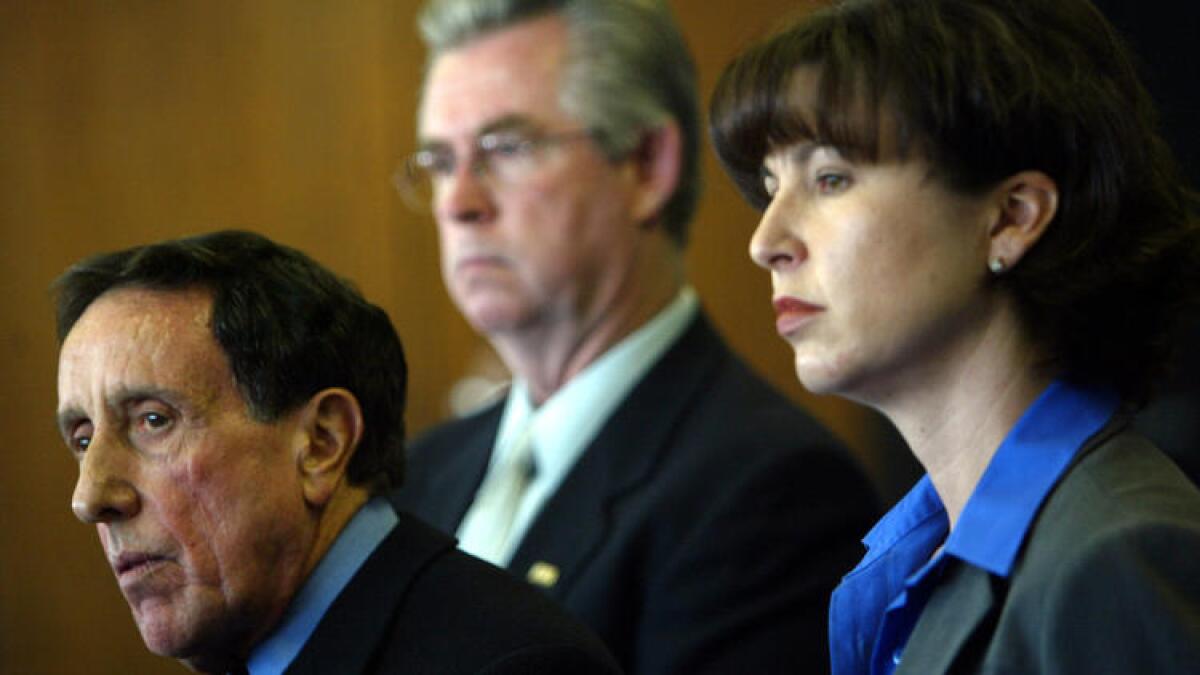
The state Senate Appropriations Committee on Thursday shelved a bill that would have banned all registered sex offenders from school campuses without exception.
Senate Bill 26 by Sen. Connie M. Leyva (D-Chino) would have made it a misdemeanor for a registered sex offender to enter any school building or grounds without lawful business.
State laws keep registered sex offenders from living near schools. But those who have not been convicted of having sex with a minor under age 16 can visit or volunteer with groups or organizations that work with children if they give proper notice, and are granted permission. They cannot work directly with children.
The committee advanced another bill by Leyva that would extend benefits under the Safe at Home initiative to former victims of forced prostitution or labor.
Senate Bill 597, introduced with Secretary of State Alex Padilla, passed with a unanimous 7-0 vote.
Measure to help California students refinance private loans is shelved
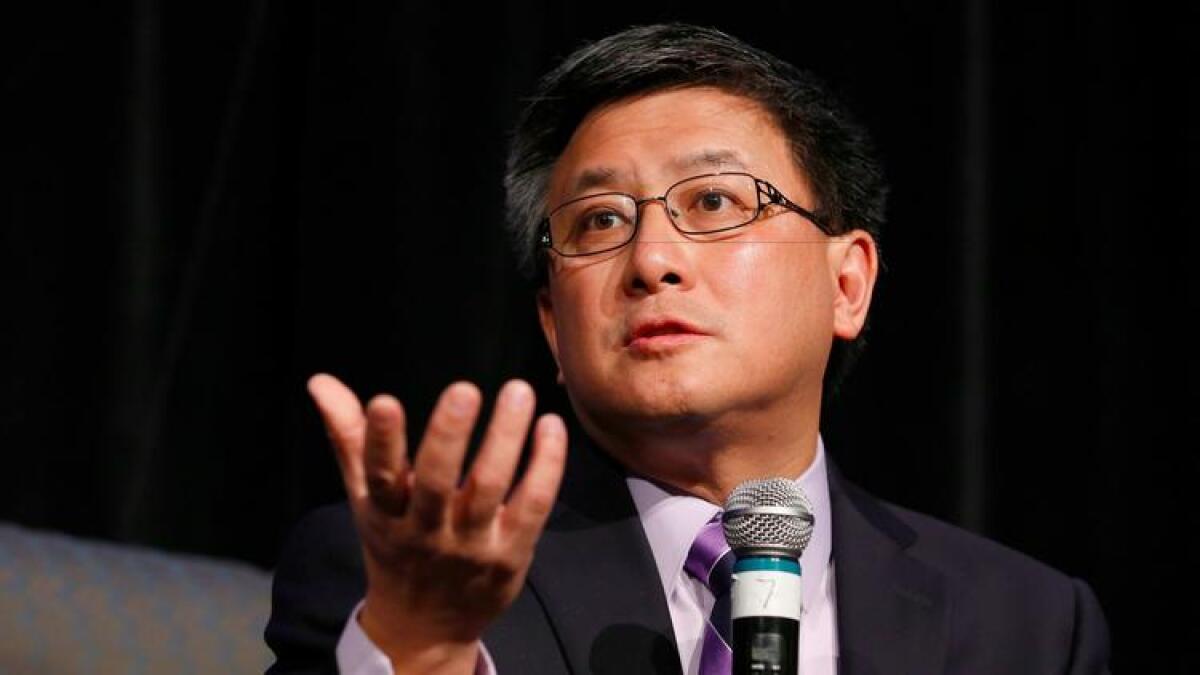
A measure to help Californians saddled with student debt refinance their student loans was shelved in a key fiscal committee on Thursday.
The measure by state Sen. Benjamin Allen (D-Santa Monica) was touted as a way for the state to coax private lenders to offer more favorable interest. The proposal would have carried a $25-million price tag.
‚ÄúWe will continue to push for sensible solutions to the student loan crisis that provide real relief to the millions of Californians saddled with too much debt,‚ÄĚ Allen said in a statement.
State Treasurer John Chiang, a 2018 gubernatorial candidate, had championed the bill, SB 674, as a way to ‚Äútry to get [Californians] out of debt as quickly as possible.‚ÄĚ
‚ÄúCollege graduation is supposed to be synonymous with opportunity and prosperity and not a detour into a modern-day debtor‚Äôs prison,‚ÄĚ Chiang said in a statement.
‚ÄúAlthough I am disappointed SB 674 will not be moving forward, I will continue to use my position as the state‚Äôs banker to invest in California‚Äôs young people and its future with innovative solutions that will make it more financially feasible to obtain a higher education,‚ÄĚ he added.
3:58 p.m.: This article was updated to add comments from Sen. Benjamin Allen and Treasurer John Chiang.
This article was originally published at 11:17 a.m.
State bill to train motel employees to spot signs of human trafficking held in suspense
Where bills go to die: Lawmakers begin clearing the ‚Äėsuspense file‚Äô with hundreds of measures in limbo
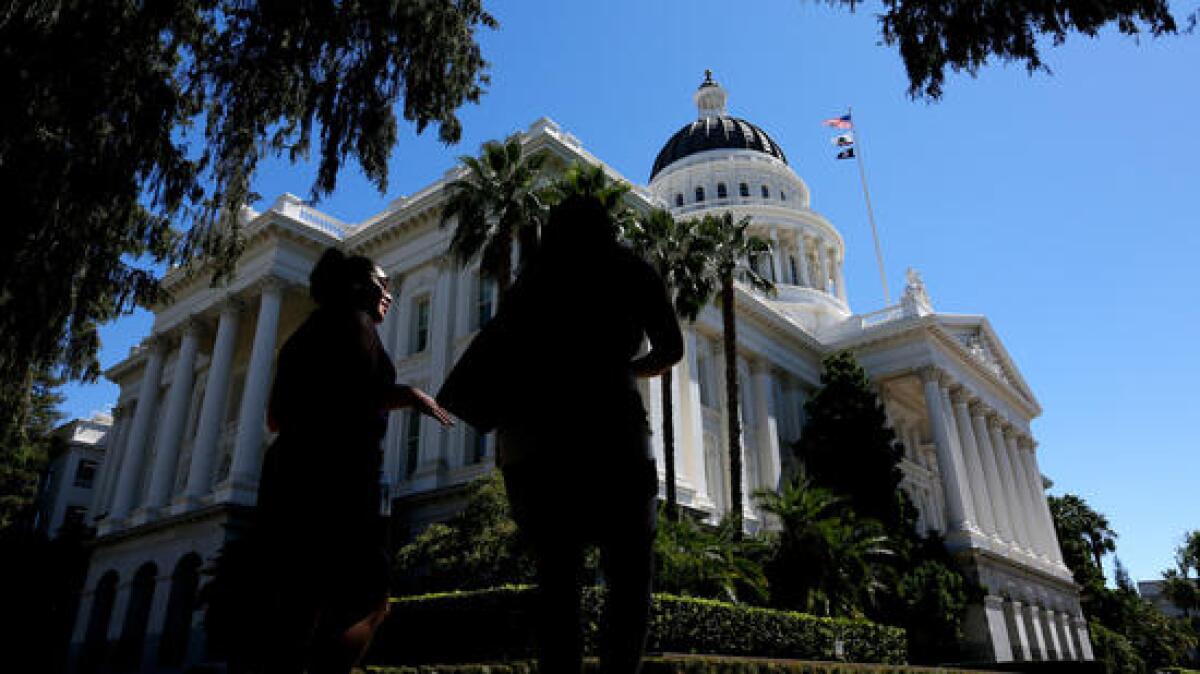
From a sales tax exemption on tampons to healthcare rules and marijuana regulation, a massive stack of proposed laws faces a major deadline Friday morning at the state Capitol.
To survive, they must clear what‚Äôs known as the ‚Äúsuspense file‚ÄĚ -- the place where bills that would cost taxpayers money are held in legislative limbo.
By law, bills with a fiscal impact must be sent to the floor of the Assembly and Senate by the close of business on Friday. That means it’s decision time for more than 800 pieces of legislation.
The Senate’s fiscal committee will decide the fate of bills on Thursday; the Assembly will do so on Friday.
Bills are generally sent to the ‚Äúsuspense file‚ÄĚ if their projected cost to the state is $150,000 or more. The procedural move was widely used during California‚Äôs deficit years as a way for lawmakers to weigh the pros and cons of proposals in light of limited resources.
But government watchdog groups have long pointed out that the clearing of the ‚Äúsuspense file‚ÄĚ ends up hiding some of the legislative sausage-making from public view.
That’s because bills that don’t clear Friday’s hurdle are essentially killed without a recorded vote.
And neither chamber offers any explanation for why those bills were killed. Decisions on the fate of the ‚Äúsuspense file‚ÄĚ are made in private, hours or days before the public hearing.
In the Assembly, the appropriations committee chairperson will simply tell the public that a decision has been made to ‚Äúhold‚ÄĚ the bill. In the Senate committee, killed legislation won‚Äôt even be mentioned during Thursday‚Äôs hearing.
That means that no one will know for sure whether a bill is really killed because of its price tag or its politics.
Rep. Duncan Hunter says Gianforte‚Äôs alleged assault was wrong, unless ‚Äėunless the reporter deserved it‚Äô
California Rep. Duncan Hunter (R-Alpine) had an interesting take on the alleged assault on a Guardian reporter by the Republican front-runner in Montana’s special election, Greg Gianforte.
Hunter told reporters Thursday, ‚ÄúIt‚Äôs not appropriate behavior. Unless the reporter deserved it,‚ÄĚ according to a tweet posted by the Associated Press‚Äô Mary Clare Jalonick.
Gianforte has been charged with misdemeanor assault after a reporter said he slammed him to the ground for asking a question. The special election is today.
The FBI is currently investigating Hunter for possible campaign finance violations. The Democratic Congressional Campaign Committee recently added Hunter’s San Diego congressional district to its list of 2018 targets.
Hunter wasn’t the only California member commenting on the assault charge Thursday morning.
Formal apology sought after U.S. Rep. Maxine Waters was cut off during state convention speech

In my 20 years as a Democratic Party leader, I have never experienced such the type of behavior as I did at the Sacramento Convention hall on Saturday evening.
— Darren Parker, longtime chairman of the African American Caucus
The California Democratic Party African American Caucus is asking the state party for a formal apology to U.S. Rep. Maxine Waters and its members for what it called disrespect by a private subcontractor at its weekend state convention.
Waters, a Los Angeles Democrat known for her comments on President Trump, had been speaking at a caucus meeting during the event Saturday night when the sound to her microphone was cut off.
California sees a rebound in cap-and-trade auction, bolstering key climate change program
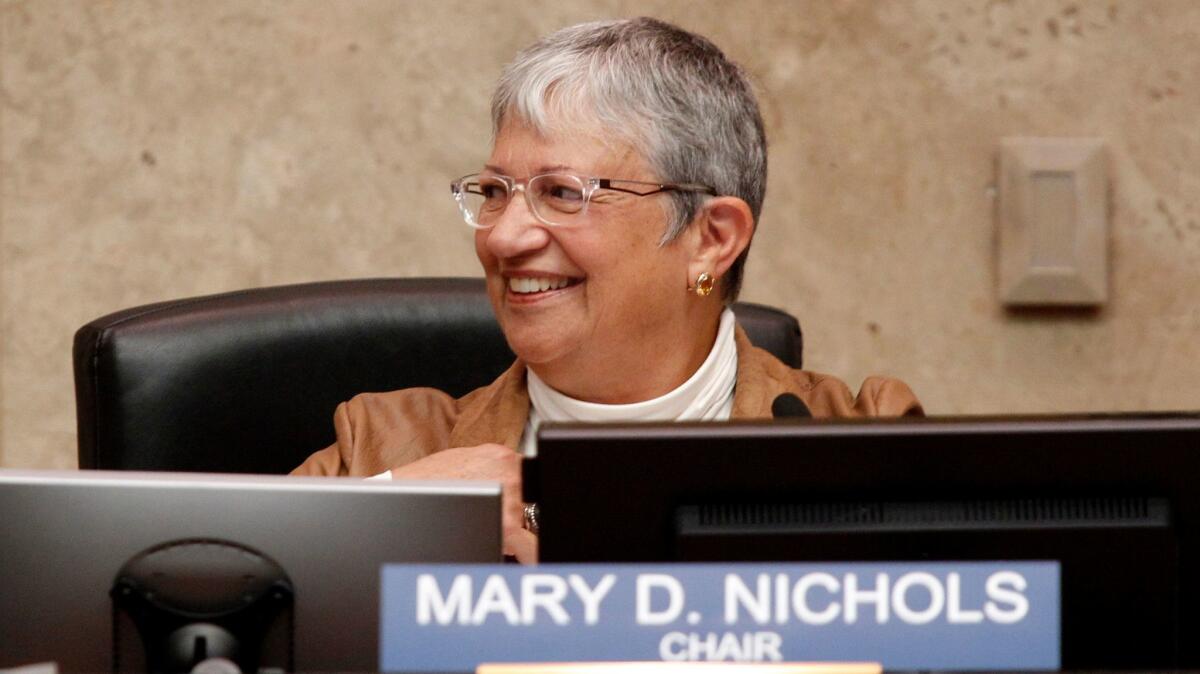
State regulators announced strong results from California’s cap-and-trade program on Wednesday, spurring analysts and supporters to say the system remains solid despite questions about its political future.
The program requires oil refineries, food processors, power plants and other facilities to buy permits to release greenhouse gas emissions. Nearly all of the permits offered by the state in its latest auction were purchased, generating an estimated $500 million in revenue.
That’s a shift from other recent auctions, where most of the permits went unsold, reducing revenue that state leaders have counted on for environmental and infrastructure projects.
But rules governing how the market for permits operates are helping to stabilize the system, said Chris Busch, research director at Energy Innovation. He called it ‚Äúa triumph of policy design.‚ÄĚ
Previous auction results also had been weakened by legal and political troubles involving cap and trade. The state received some relief from the legal problem when an appeals court in Sacramento rejected arguments from business groups that the program functions as an unconstitutional tax.
However, lawmakers are still debating whether to extend the program past 2020. One of the proposals, SB 775, would dramatically overhaul cap and trade, an idea the Environmental Defense Fund opposes.
‚ÄúCalifornia has a strong carbon market design that can weather legal challenges and the inevitable bumps of the political process,‚ÄĚ said Erica Morehouse, a senior attorney at the organization.
Foster kids spend the day shadowing California members of Congress
Leonardo Jimenez, 21, of Los Angeles said after a lifetime in foster care, he never expected to have his congresswoman speak his name on the House floor, or to become a part of the historical record of the United States.
On Wednesday, Rep. Karen Bass (D-Los Angeles) spoke about Jimenez and the more than 100 other young people participating in the Congressional Foster Youth Shadow Program in a speech on the House floor.
‚ÄúWe have someone that is advocating for us that hasn‚Äôt been in our shoes, but is willing to take off her shoes and put herself in our shoes to know our needs, our wants and she‚Äôs very involved in our future,‚ÄĚ Jimenez said. ‚ÄúShe‚Äôs given me a voice.‚ÄĚ
Bass started the Congressional Foster Youth Shadow Program six years ago, during her first term in Congress. The program has grown and now the National Foster Youth Institute runs the all-expenses-paid program along with several foster support groups.
Nearly 100 members of Congress from more than 30 states participated this year, Bass said. That includes 19 California members of Congress.
‚ÄúThe hope is that they build a long-term relationship with their member of Congress, so they can be the foster care expert, to keep that issue in their ear,‚ÄĚ Bass said.
Jimenez said his goal for the trip was to talk with members about life as an LGBTQ foster youth. He graduates soon from West Los Angeles College in Culver City and just found out he’s been accepted to New York University, where he wants to study communications. After that, he wants to open an LGBTQ group home.
The conversation earned him a surprise hug from Rep. John Lewis (D-Ga.), who was the keynote speaker at the foster youth lunch.
Members of Congress who participate are expected to let the young people shadow them for the day, not just leave them with staff or send them on a tour of the Capitol. That means taking them along to vote, attend committee meetings or chat with constituents.
For Rep. Adam Schiff’s two shadows, Demontea Thompson, 23, and Johna Rivers, 24, both of Los Angeles, that included listening to the Burbank Democrat as he was peppered by reporters’ questions at a breakfast hosted by the Christian Science Monitor. Afterward, they hopped in the back seat of his Audi for a ride back to the Capitol.
Jordynn Franklin, 20, of Modesto took over the social media accounts of Rep. Jeff Denham (R-Turlock) as they moved around the Capitol, going to a Transportation and Infrastructure Committee meeting, and sitting down with a few interest groups. She even got a chance to meet Denham’s French bulldog, Lily.
‚ÄúWe ran around like a crazy person all day,‚ÄĚ she said.
Franklin asked Denham about creating a federal program where former foster youth help train new foster parents.
‚ÄúWe‚Äôve already decided, we‚Äôre going to work together on putting some legislation together,‚ÄĚ Denham said.
L.A. Daily News endorses Robert Lee Ahn in 34th Congressional District race
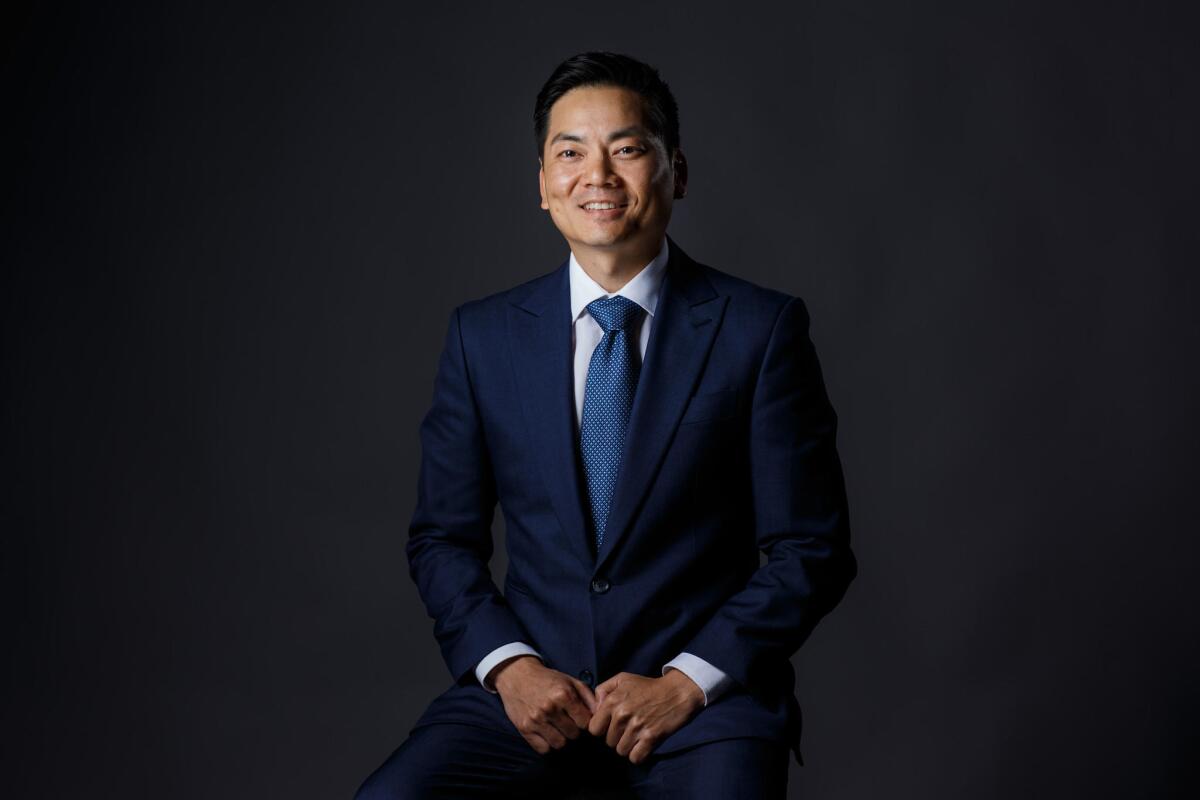
The Los Angeles Daily News has endorsed Robert Lee Ahn in the race to replace Xavier Becerra in Congress. With two Democrats vying for the seat, the newspaper‚Äôs editorial board said the race ‚Äúwon‚Äôt change much nationally.‚ÄĚ
But Ahn, the Daily News says, is ‚Äúnot an assembly-line product of party politics.‚ÄĚ
The editorial board wrote that while Ahn and Gomez have similar policy positions, Ahn‚Äôs experience in business and as a former L.A. city planning commissioner will ‚Äúbring something different‚ÄĚ to L.A.‚Äôs delegation.
Ahn is also backed by Pastor J. Edgar Boyd of First AME Church, L.A. City Councilman David Ryu and retired NBA player Jason Collins.
The Los Angeles Times editorial board endorsed Jimmy Gomez last week.
Becerra stepped down from his House seat to become California’s attorney general.
Legislative lawyers suggest Gov. Jerry Brown’s interpretation of a long-standing state spending limit is wrong
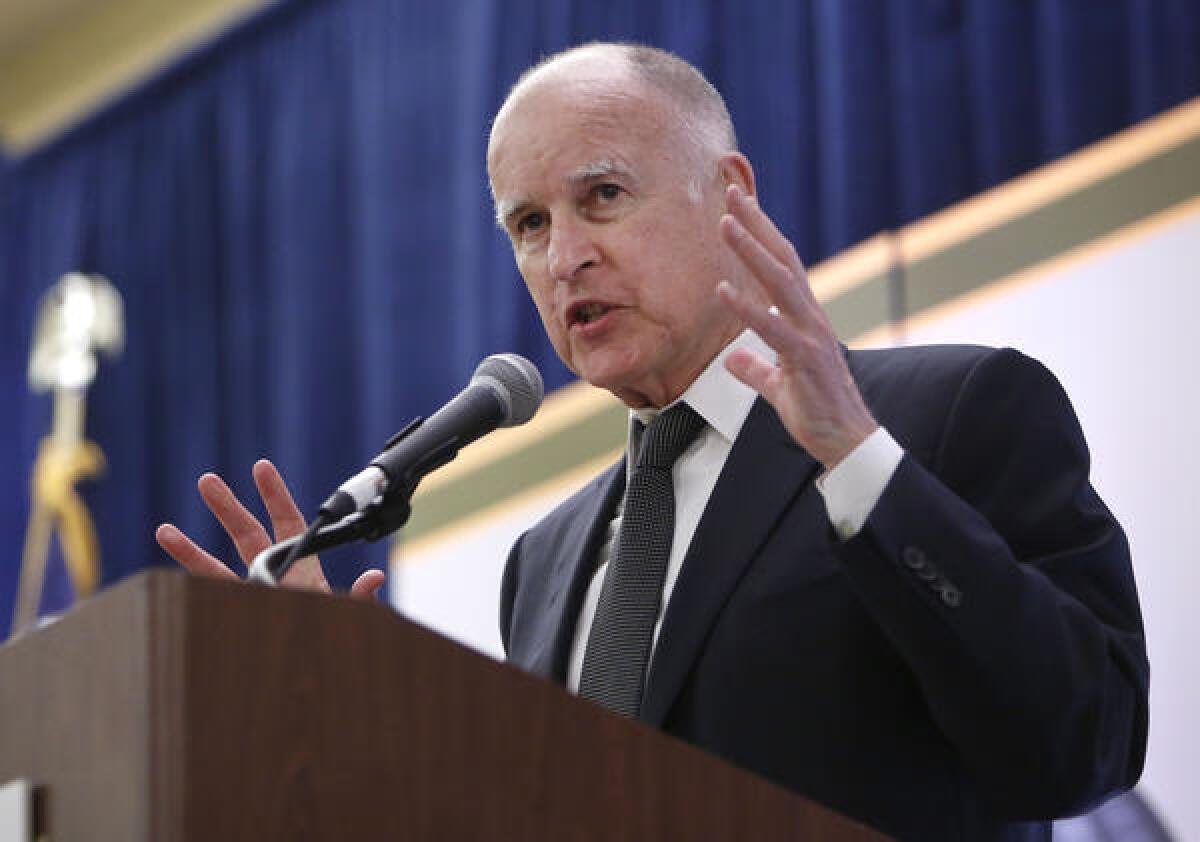
Lawmakers from both sides of the aisle raised concerns Tuesday that Gov. Jerry Brown’s state budget plan relies on a faulty calculation of a spending limit imposed by voters in 1979.
‚ÄúThis is really a big deal,‚ÄĚ state Sen. Jim Nielsen (R-Gerber) said during a meeting of the Senate‚Äôs budget committee.
At issue is how to interpret a 38-year-old state appropriations limit that, if breached, would require excess revenues to go to schools or be paid to taxpayers as rebates.
An April 28 opinion from the legislative counsel of California, released publicly Tuesday, said that certain appropriations that Brown‚Äôs budget looks to exclude from the spending limit ‚Äúmust be included‚ÄĚ per the language that voters placed in the California Constitution.
That opinion aligns with a March report by the independent Legislative Analyst’s Office, which criticized Brown’s plan to exclude $22 billion in state spending from counting under what’s known in Sacramento as the Gann limit, named in honor of its author, the late anti-tax activist Paul Gann.
Advisors to Brown told state senators during the budget hearing that they believed the spending limit had been misinterpreted in the past and were simply trying to realign it with the law.
The otherwise arcane issue is of importance because the interpretation by the Legislature‚Äôs analysts could force some $1.8 billion in lower spending ‚ÄĒ which could then trigger unexpected cuts in a variety of programs even as tax revenues are generally outpacing projections.
The committee ultimately went along with Brown’s framework, though the topic may come up again before a final spending plan is ratified next month.
‚ÄúI have to say I‚Äôm concerned,‚ÄĚ said state Sen. Richard Roth (D-Riverside) after asking a series of detailed questions about the impact to the state‚Äôs finances if the legal spending limit is breached.
Whether lawmakers ultimately agree to Brown’s interpretation may not be the last word on the issue, as the law makes clear that California courts could impose a final interpretation.
Examination of ballots cast in race for California Democratic Party leader begins in Sacramento
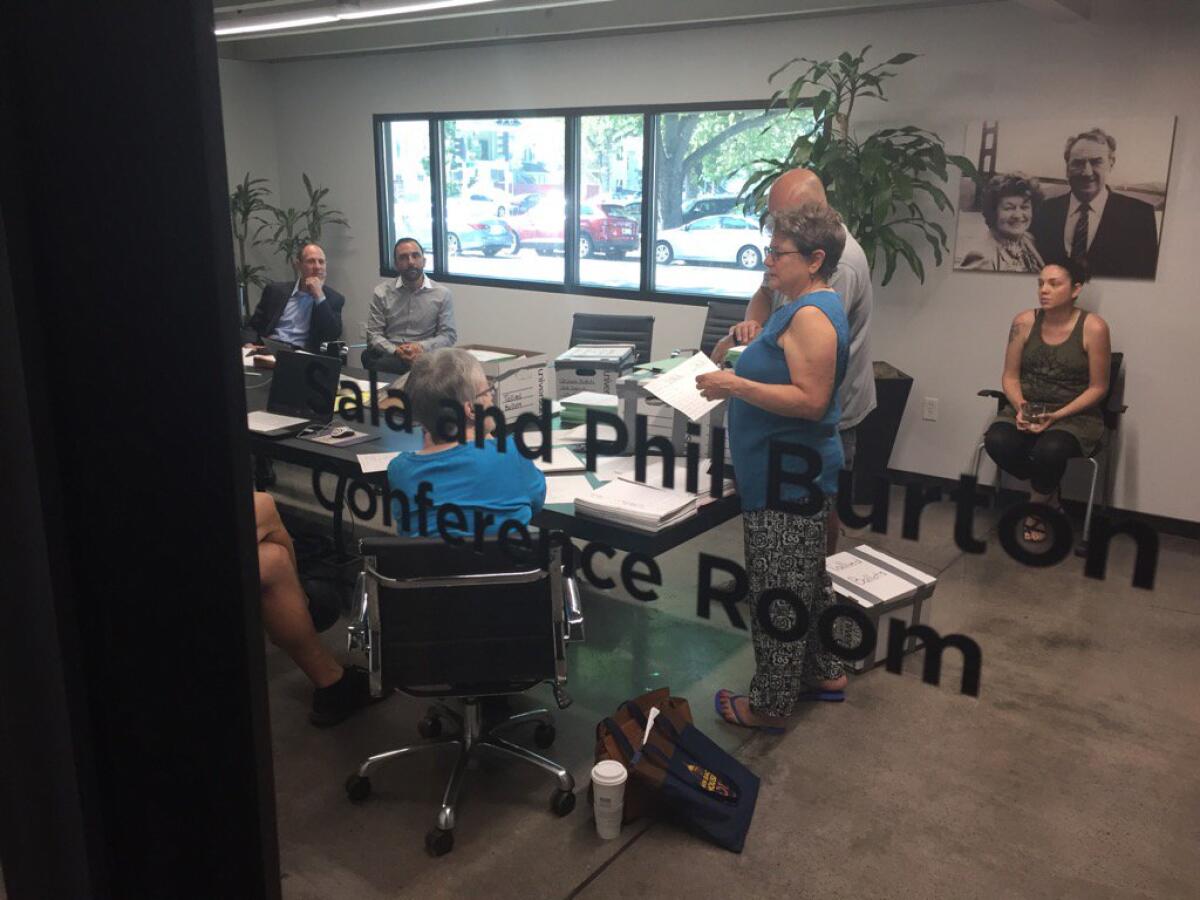
Supporters of Kimberly Ellis, who lost her bid to lead the California Democratic Party by a razor-thin margin last weekend, started sifting through boxes of ballots at the state party headquarters in Sacramento on Tuesday to see if there were any voting irregularities.
Los Angeles County Democratic Party Chairman Eric Bauman was elected Saturday by party delegates to be the new state party chairman, beating Ellis by just more than 60 votes.
After the election, Ellis called for an audit of the ballots. Some of her supporters questioned whether all the votes came from credentialed party delegates.
On Tuesday morning, representatives from the Ellis and Bauman campaigns started reviewing the ballots, delegate credentialing records and other documents from the election. State party staff members also are in the room to monitor the process.
Neither side is allowed to copy or photograph the ballots, or remove any of the material from the room, said state party spokesman Steve Maviglio.
A spokesman for the Ellis campaign said it may take three or four days to examine all the records.
Ellis said Sunday that she will make a final statement after she has reviewed all the election material. She has not conceded.
She was the director of Emerge California, a Bay Area nonprofit organization that trains Democratic women to run for office.
Bauman officially took over as chairperson on Sunday and met on Monday with staff of outgoing chair John Burton to plan the transition.
‚ÄúOur new California Democratic Party team is dedicated to empowering the grassroots and making our Party even stronger,‚ÄĚ Bauman said in a statement released Monday. ‚ÄúThat begins with organizational structure, staff and financial decisions to make this goal a reality. We are rolling up our sleeves on day one and getting right to work to ensure a smooth transition after eight years of outstanding service from Chairman Burton and his team.‚ÄĚ
Gov. Brown on President Trump‚Äôs budget proposal: ‚ÄėIt‚Äôs unconscionable and un-American‚Äô
This budget proposal is based on utterly bogus economic assumptions. It gives a massive tax break to the wealthiest, while imposing painful and debilitating burdens on tens of millions of decent and hard-working people. It’s unconscionable and un-American.
— Gov. Jerry Brown
Conservative group runs ads thanking California GOP for health care vote
A conservative advocacy group will run television ads thanking six California Republicans for voting for the GOP bill to roll back the Affordable Care Act.
All 14 Republicans in California’s congressional delegation voted for the bill, called the Affordable Health Care Act, when it passed the House without Democratic support last month. Democrats have pledged to make it a campaign issue.
Starting today, and running for two weeks, the ads produced by the nonprofit American Action Network target constituents of Reps. Jeff Denham of Turlock, David Valadao of Hanford, Steve Knight of Palmdale, Ed Royce of Fullerton, Darrell Issa of Vista and House Majority Leader Kevin McCarthy of Bakersfield.
All but McCarthy represent districts that voted for Hillary Clinton in 2016 and are targets of the national Democratic Party as it tries to reclaim control of the House in 2018. American Action Network members also run the Congressional Leadership Fund Super PAC, which is focused on preserving Republicans’ majority.
The ad features Elizabeth Jacinto, a mother of four from Issa’s district who lost her health insurance and had to switch doctors under the Affordable Care Act, often called Obamacare. Similar ads are running in 15 other congressional districts across the country as part of a $2-million ad buy.
California Assembly Democrats launch progressive caucus
Riding a wave of activism in state politics, nearly two dozen Assembly Democrats have formed a progressive caucus to prop up the party’s left flank in the Legislature.
The formation of the group, which held a private audience with hip-hop star Common during last weekend’s California Democratic Party convention, speaks to the ideological fissures that exist within the Democratic supermajority in the Capitol.
Assemblyman Reggie Jones-Sawyer (D-Los Angeles), who chairs the group, said several members have contemplated a formal caucus for years.
‚ÄúWe all have the same ideology, which is basically that we value people more than money,‚ÄĚ Jones-Sawyer said. ‚ÄúWe noticed our voting patterns were very, very similar, but we had never met.‚ÄĚ
‚ÄúIt‚Äôs good for us to know where everyone is, and hopefully we can help each other push a more progressive agenda,‚ÄĚ he added.
The caucus hopes to be a counterweight to the informal group of centrist, business-aligned Democrats that has been a pivotal bloc of votes on bills on taxes and environmental regulation.
But unlike the so-called Mod caucus ‚ÄĒ for moderate Democrats ‚ÄĒ the progressive group has made its membership public. Twenty-two Assembly Democrats have signed on to the group‚Äôs roster.
Jones-Sawyer said taking on mass incarceration, climate change, women’s and civil rights, and immigration issues are among the group’s top priorities.
With a newly energized cadre of progressive activists turning their attention to state politics, Jones-Sawyer said the caucus’ existence would help identify which legislators are allied with that grass-roots movement.
‚ÄúWe‚Äôve done quite a bit of progressive legislation, but some people don‚Äôt believe we‚Äôre progressive,‚ÄĚ Jones-Sawyer said. ‚ÄúIn fact, a lot of times people have called us ‚Äėestablishment,‚Äô and we‚Äôre wondering, ‚ÄėHave you seen my voting record?‚Äô‚ÄĚ
The caucus has not yet decided if it will designate priority legislation or other trappings of traditional caucuses, such as the women’s or Latino caucuses. But the members are planning to band together in one key way to boost their influence: fundraising as a group.
Transportation Department releases Caltrain electrification project funding
Transportation Secretary Elaine Chao signed off on the funding agreement for the Caltrain electrification project Monday, and will release $100 million for the San Francisco-area project.
In a recent spending bill, Congress directed the administration to fully fund the Caltrain Peninsula Corridor Electrification Project, but it dragged its feet on releasing the funds, saying the president might not ask for funding to complete the project in future years. Chao’s move Monday also commits the Department of Transportation to prioritizing an additional $408 million in appropriations for the project in the future.
In February, President Trump delayed making a final decision on the project after the 14 Republicans in the California congressional delegation asked him to, a move that frustrated the governor’s office and local leaders.
Democrats in the California delegation pressured Chao to release the money, with Sen. Dianne Feinstein (D-Calif.) pledging to oppose all Transportation Department nominees, and Sen. Kamala Harris (D-Calif.) pushing Chao on the issue during public hearings on Capitol Hill.
‚ÄúSecretary Chao has done the right thing and committed the federal government to fulfill its obligation to see this project through completion,‚ÄĚ Harris said in a statement Monday.
Caltrain CEO Jim Hartnett said in a statement that signing the funding agreement leads the way to starting the electrification project after years of work.
‚ÄúOver the last few years, more than $1.3 billion was secured from local, regional and state commitments, and contracts were awarded to design, and eventually construct the project. This agreement commits the final funding needed to start construction of a project that will transform and improve the way people travel along one of the region‚Äôs most congested corridors,‚ÄĚ he said.
Electrification would allow Caltrain to replace its diesel locomotives with electric trains and is a crucial step for the future of the bullet train, which several Republicans in the delegation oppose.
‚ÄúThis is like moving from a Model T to a Tesla. Each is beloved on its own terms, but only one can do the modern job of moving America forward,‚ÄĚ Rep. Jackie Speier (D-Hillsborough) said in a statement. ‚ÄúMore commuters are going to love faster and more frequent service at Caltrain stations, almost no pollution and quieter rides.‚ÄĚ
Rep. Jeff Denham (R-Turlock) is among the California members who oppose the project. He called it a ‚Äúbait and switch‚ÄĚ in a statement Monday.
‚ÄúCaltrain is not, nor will it ever be, ‚Äėhigh speed‚Äô and should not be funded with high-speed rail dollars, especially when that project has yet to prove its own financial viability. California‚Äôs ‚ÄĒ and America‚Äôs ‚ÄĒ taxpayers have a right to know where their money is going,‚ÄĚ he said.
------------
UPDATES
3:11 p.m.: This article was updated with a statement from Rep. Jeff Denham (R-Turlock).
This article was originally published at 2:30 p.m.
------------
Gov. Jerry Brown’s budget chief temporarily steps aside because of health problems
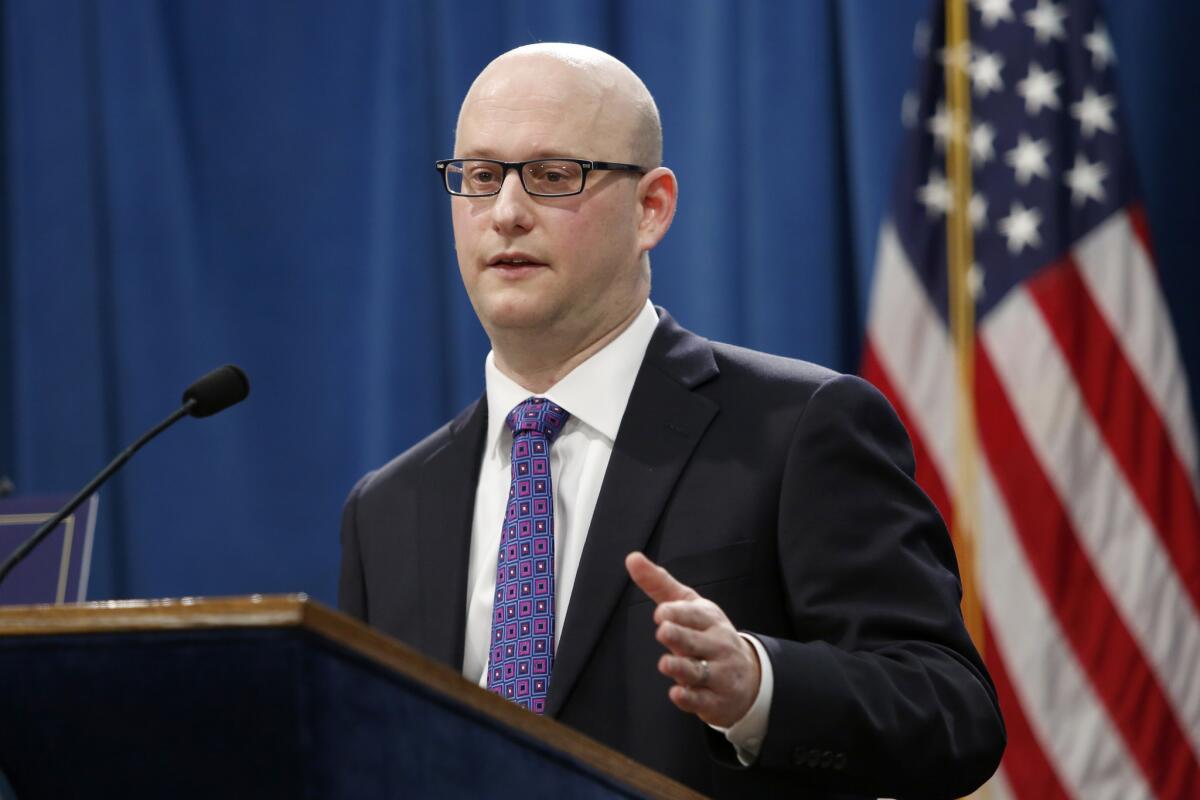
Gov. Jerry Brown‚Äôs budget director has left his duties after what was described as a ‚Äúunexpected hospitalization‚ÄĚ less than a month before lawmakers are scheduled to finalize a new state spending plan.
A memo distributed to staff on Monday said that Michael Cohen would be taking ‚Äúan extended leave of absence following a serious health issue that led to his unexpected hospitalization late last week.‚ÄĚ
The governor’s office declined to comment beyond the memo, which did not offer a timeline for Cohen’s return.
Cohen, 44, was appointed director of the California Department of Finance in fall 2013. He had previously served as Brown’s deputy director, and he served for 13 years prior to that with the independent Legislative Analyst’s Office.
‚ÄúMichael is receiving excellent medical care, his condition is stable and he‚Äôs recovering well,‚ÄĚ said the memo, signed by Brown‚Äôs top advisor, Nancy McFadden, and his cabinet secretary, Keely Bosler.
National Democrats name California GOP Reps. Devin Nunes and Duncan Hunter targets in 2018 election
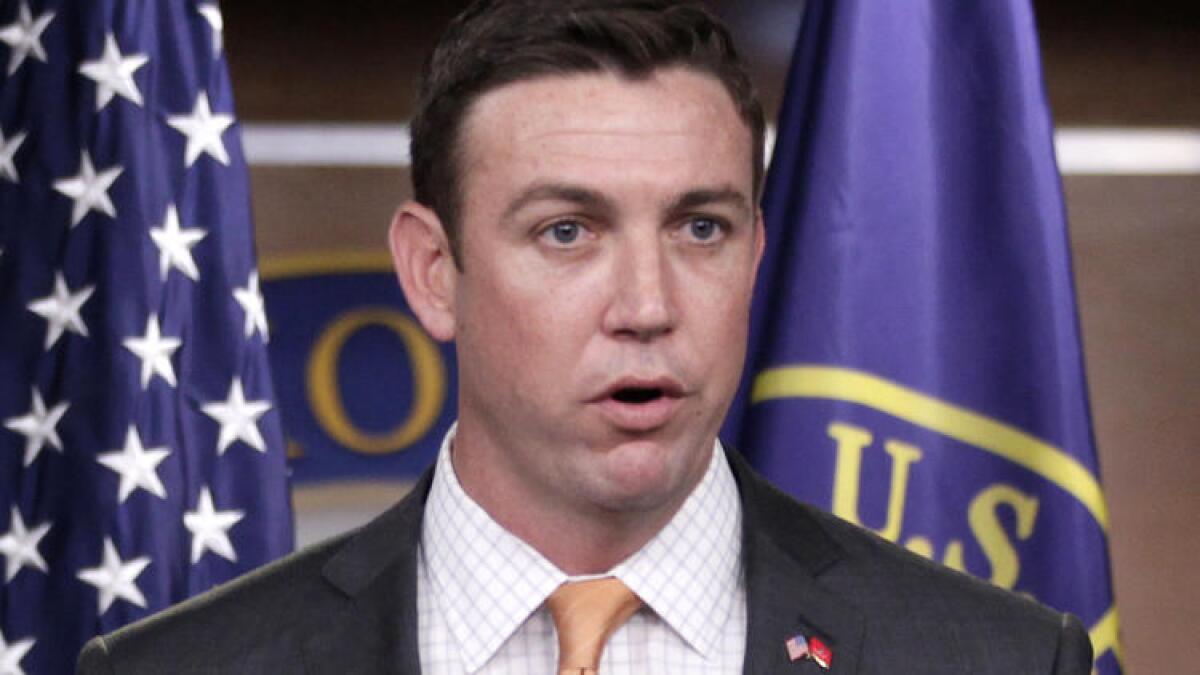
The Democratic Congressional Campaign Committee added congressional districts held by Reps. Devin Nunes (R-Tulare) and Duncan Hunter (R-Alpine) to their list of 2018 targets on Monday.
Both represent traditionally strong Republican districts and have consistently won reelection by large margins, but Hunter and Nunes are facing ethics questions.
Five Democrats have announced challenges to Hunter: Pierre Beauregard, Josh Butner, Ammar Campa-Najjar, Gloria Chadwick and Patrick Malloy. Hunter was elected in 2008 to replace his father in the San Diego-area district and has won reelection with at least 60% of the vote each election since. He beat Malloy in 2016 with 63.5% of the vote.
Hunter has reimbursed more than $60,000 in mistaken, personal or undocumented expenditures to his campaign since the Federal Election Commission and the San Diego Union-Tribune began questioning his expenses a year ago.
Recently the House Ethics Committee announced it would halt an inquiry into Hunter’s spending in deference to a federal criminal investigation.
On Friday, the nonpartisan analytics website Inside Elections changed the ranking of Hunter‚Äôs district, noting it would likely stay in Republican hands. Nunes‚Äô district remains rated ‚Äúsolid Republican.‚ÄĚ
Just one Democrat has announced a bid against Nunes, Democratic Fresno County Deputy Dist. Atty. Andrew Janz. Nunes has gotten more than two-thirds of the vote in all but one of his eight congressional elections in the Central Valley district. In 2016, he beat Democrat Louie Campos with 68.2% of the vote.
Nunes is chairman of the House Select Intelligence Committee but stepped aside from leading the House investigation into Russian interference in the 2016 election over questions about whether he mishandled classified information.
With the added districts, the party plans to focus time and money on nine of 14, or nearly two-thirds of seats Republicans hold in the California delegation. Nationally, Democrats are targeting 79 Republican-held districts. They need to win 24 seats to regain control of the House.
The seven other Republican-held California districts Democrats have focused on all backed Hillary Clinton for president in 2016. They are:
- CA-10: Jeff Denham (R-Turlock)
- CA-21: David Valadao (R-Hanford)
- CA-25: Steve Knight (R-Palmdale)
- CA-39: Ed Royce (R-Fullerton)
- CA-45: Mimi Walters (R-Irvine)
- CA-48: Dana Rohrabacher (R-Costa Mesa)
- CA-49: Darrell Issa (R-Vista)
Democratic Congressional Campaign Committee spokeswoman Meredith Kelly said in a statement that ‚ÄúHouse Republicans started the 2018 cycle in a defensive crouch as part of the President‚Äôs party in his first midterm. But what has transpired since is much more disturbing and damaging. Through self-inflicted wounds, chaos, ethical issues and a trail of betrayals and broken promises to voters, House Republicans and President Trump have made their long 2018 slog even more difficult.‚ÄĚ
National Republican Congressional Committee spokesman Jack Pandol said in a statement that Democrats are overreaching by going after solidly Republican districts.
‚ÄúDevin Nunes and Duncan Hunter are well-known and respected as trusted fighters for California families. We have no doubt Congressmen Nunes and Hunter will continue to enjoy the confidence of voters who have consistently sent them to fight on their behalf,‚ÄĚ he said.
2:25 p.m. This article has been updated with comment from the national political parties.
It was originally published at 12:07 p.m.
Single-payer healthcare could cost $400 billion to implement in California

A single-payer healthcare system in California ‚ÄĒ a galvanizing cause among the state‚Äôs progressive flank ‚ÄĒ would cost $400 billion annually, according to a legislative analysis released on Monday.
The analysis, released in advance of the proposal’s hearing in a key fiscal committee, fills in what has so far been the biggest unanswered question concerning the plan to dramatically overhaul California’s healthcare coverage.
The analysis found that the proposal would require:
- A total cost of $400 billion per year to cover all healthcare and administrative costs.
- Of that, $200 billion of existing federal, state and local funds could be repurposed to go toward the single-payer system.
- The additional $200 billion would need to be raised from new taxes.
The analysis proposes one scenario in which a new payroll tax on employers ‚ÄĒ with a rate of 15% of earned income ‚ÄĒ could supply the new revenue. But the measure itself does not contain a specific tax proposal, and therefore would not, at this point, need a two-thirds vote to approve a new tax.
The write-up also notes that a universal healthcare proposal would likely reduce spending by employers and employees statewide, which currently ranges between $100 billion and $150 billion annually. Therefore, the total new spending under the bill would be between $50 billion and $100 billion each year.
Under the bill, the state would cover medical care for every resident in California, including those without legal immigration status. Enrollees would not have to pay premiums, co-payments or deductibles.
The analysis cautions that the single-payer bill, SB 562 by Sens. Ricardo Lara (D-Bell Gardens) and Toni Atkins (D-San Diego), would required ‚Äúunprecedented changes to a mature healthcare system.‚ÄĚ
‚ÄúTherefore, there is tremendous uncertainty in how such a system would be developed, how the transition to the new system would occur, and how participants in the new system would behave,‚ÄĚ it notes.
African American Caucus leaders want to know why U.S. Rep. Maxine Waters was cut off during state convention speech

Rep. Maxine Waters was in the middle of a rousing speech at the California Democratic Party state convention when she was interrupted and then had her mic cut off.
The head of the California Democratic Party African American Caucus said Monday he was working with state party officials to determine who was responsible for cutting off the sound to U.S. Rep. Maxine Waters’ microphone as she spoke to the group at the party’s convention on Saturday.
‚ÄúThis is a very unusual situation, and we are collectively trying to figure out a path forward to address what happened and make sure these things do not happen in the future,‚ÄĚ Caucus Chairman Darren Parker said.
Waters, a Los Angeles Democrat whose acerbic comments on President Trump have brought her national attention in her 14th term, was in the middle of a rousing speech against Trump on Saturday night when she was approached by a man who appeared to work for the convention center.
‚ÄúHey, leave her alone,‚ÄĚ audience members shouted as he interrupted to speak to her privately, prompting Parker to show the man away.
‚ÄúThat‚Äôs all right, that‚Äôs OK ‚ÄĒ they try to shut me up all the time,‚ÄĚ Waters quipped to loud cheers as she continued to speak.
But the sound from her microphone was cut off shortly thereafter, sending the room of about 300 people into confusion. That didn’t stop Waters. As a few voices shouted in anger, she got down from the podium, telling the audience they could still have a conversation.
She finished her speech from the floor, as the crowd chanted ‚ÄúImpeach 45.‚ÄĚ
A manager for the Sacramento Convention Center told The Times on Monday that the contractors who pulled the plug on the event were not center employees. Parker said the caucus had initially believed the man to be a convention staff or city employee. But after working with a Sacramento City Council member over the weekend, caucus leaders determined the audio was provided by an outside firm hired by the state Democratic Party.
The audio company has not been identified, he said, and a look into what happened is ongoing. Parker called the incident unusual and disrespectful.
The caucus meeting ran late. When an event has run over its time slot in the past, Parker said, the caucus has been billed for the extra expenses.
‚ÄúWe are working directly with statewide officers to make sure that these outside contractors are properly instructed on how to act and how to treat our guests,‚ÄĚ he said.
Kimberly Ellis calls for an audit of the election for California Democratic Party leader

Democratic organizer Kimberly Ellis, who lost her bid to lead the California Democratic by a razor-thin margin, on Sunday questioned the validity of the election and called for an audit of the vote.
Los Angeles County Democratic Party chairman Eric Bauman eked out a victory Saturday to be the next state party chairman, beating Ellis by just more than 60 votes, according to the state party.
Close to 3,000 party delegates voted in the election on Saturday at the party’s annual convention in Sacramento
‚ÄúI will not concede this race until we have validated the results,‚ÄĚ Ellis said.
A crowd of a couple hundred Ellis supporters gathered at Cesar Chavez Plaza in downtown Sacramento after the convention ended Sunday afternoon to hear Ellis speak. She climbed up to the stage, forgoing a bullhorn, and thanked everyone for their support.
Ellis said she met with California Democratic Party staff and executives and ‚Äúshared with them some concerns‚ÄĚ with some of the voters that were cast. Ellis supporters are questioning whether all the votes came from credentialed party delegates.
‚ÄúOne of the things that party cannot be is a party that‚Äôs just like Trump and the Republicans,‚ÄĚ Ellis told the crowd. ‚ÄúA party that operates in closed rooms, smoked-filled rooms, behind curtains, in secrecy and shadow. It is time for this party to be a transparent party.‚ÄĚ
Ellis, who lives in Richmond, said she and her advisors plan to stay in Sacramento for the next few days to review each and every ballot cast. They will compare them to them delegate registration forms to see if they match. All ballots and other election documents are being kept at the state party’s Sacramento headquarters.
Ellis said she will make a final statement after she has reviewed all the election material.
‚ÄúThis fight is not over,‚ÄĚ she said. ‚ÄúWhen I say this fight, I mean this movement we have created together. It is growing stronger, and louder and more powerful each and every day.‚ÄĚ
Ellis was the director of Emerge California, a Bay Area nonprofit organization that trains Democratic women to run for office.
Election of new California Democratic Party leader may face legal challenge

Lawyers are now involved in the California Democratic Party’s election of a new chairperson.
Los Angeles County Democratic Party Chairman Eric Bauman won a razor-thin victory Saturday to be elected the party’s next chairman, beating rival Kimberly Ellis by just more than 60 votes, according to the state party.
Ellis has yet to concede, and a campaign spokesman said they are reviewing their legal options. Some of her supporters are questioning the integrity of the votes cast by nearly 3,000 delegates at the state party’s convention in Sacramento.
‚ÄúWe‚Äôre going to have Eric Bauman‚Äôs lawyer meet with the Democratic Party lawyer and Kimberly‚Äôs lawyer and let them figure it out,‚ÄĚ the outgoing party chairman, John Burton, said Sunday morning. ‚ÄúThey could be meeting as we speak.‚ÄĚ
Burton said some Ellis supporters alleged that delegate ballots may have been counted twice. But no evidence of that has been presented to him, he said.
Some Ellis supporters are demanding a recount, but the party bylaws do not have any provisions for a recount in officer elections, Burton said. On Saturday night, the ballots were counted two separate times.
‚ÄúI don‚Äôt know what the complaint is except that she lost,‚ÄĚ Burton said. ‚ÄúI told one of her people to show me some evidence that people were double voting or whatever it was.‚ÄĚ
Anger, protests erupt over results of the California Democratic Party’s election of a new leader
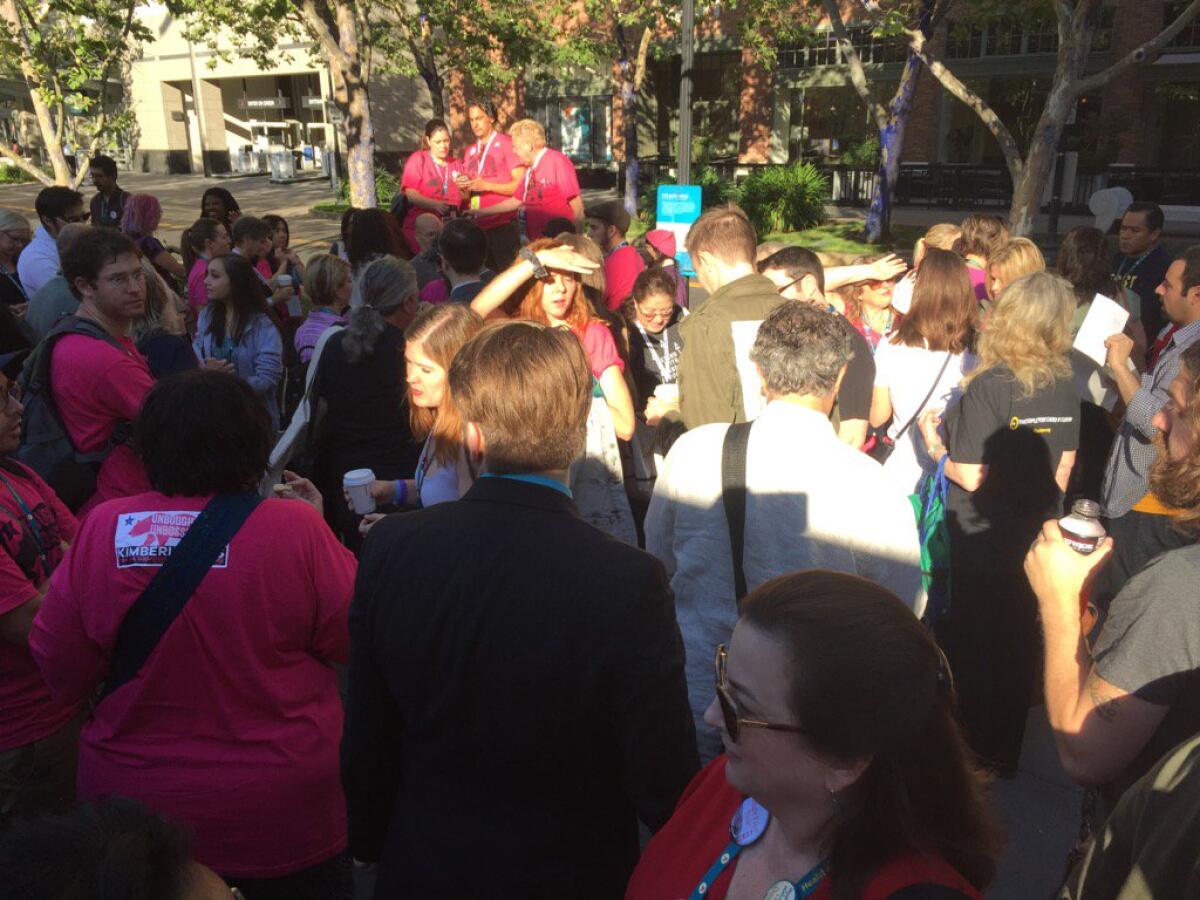
Supporters of the losing candidate in the California Democratic Party’s race for chairperson were out en masse early Sunday morning at the state convention in Sacramento, many calling for an investigation of the party’s voting process.
Longtime Democratic leader Eric Bauman eked out a victory Saturday to be the party’s next chairman, beating rival Kimberly Ellis by just more than 60 votes, according to the state party.
A spokesman for the Ellis campaign on Sunday said they are consulting with legal counsel to determine their options. Ellis has not conceded.
The race, between a party insider and a progressive organizer, was a heated battle between divergent forces that are racking the Democratic Party nationwide. Bauman was a favorite of the party establishment, while Ellis drew the backing of liberals who supported Sen. Bernie Sanders in last year’s presidential primary.
Party delegates are scheduled to meet Sunday morning at the convention, a meeting expected to grow testy.
Ellis supporters were gathering outside the Sacramento Convention Center just after 7 a.m., many expressing outrage about the outcome and demanding a recount.
‚ÄúWe got shafted,‚ÄĚ said Alexis Edelstein, founder of Berniecrats of California.
Mani Kang, 41, a Democratic delegate from Orange and another Bernie Sanders supporter, said the result was too similar to the presidential race. Sanders supporters blamed the leadership of the Democratic Party, including former party chair Debbie Wasserman Schultz, of undercutting the Sanders campaign in favor of Hillary Clinton.
Kang said the Democratic Party establishment did the same to Rep. Keith Ellison of Minnesota, a favorite of Bernie supporters who ran for Democratic National Committee chair but lost to former Obama administration Labor Secretary Tom Perez.
‚ÄúFirst it happened to Bernie in Philadelphia. Then it happened to Ellison. Now this is the third attempt,‚ÄĚ Kang said. ‚ÄúKimberly had all the momentum in the last few weeks. This is a big deal. We need more transparency in the process.‚ÄĚ
A few Ellis supporters complained that Democratic Party officials did not check identification when delegates were voting.
Ellis was the director of Emerge California, a Bay Area nonprofit organization that trains Democratic women to run for office.
Rep. Maxine Waters was cut off while speaking at the California Democratic Party convention. Her audience wasn’t happy
Eric Bauman named new chairman of the California Democratic Party ‚ÄĒ but his rival refuses to concede
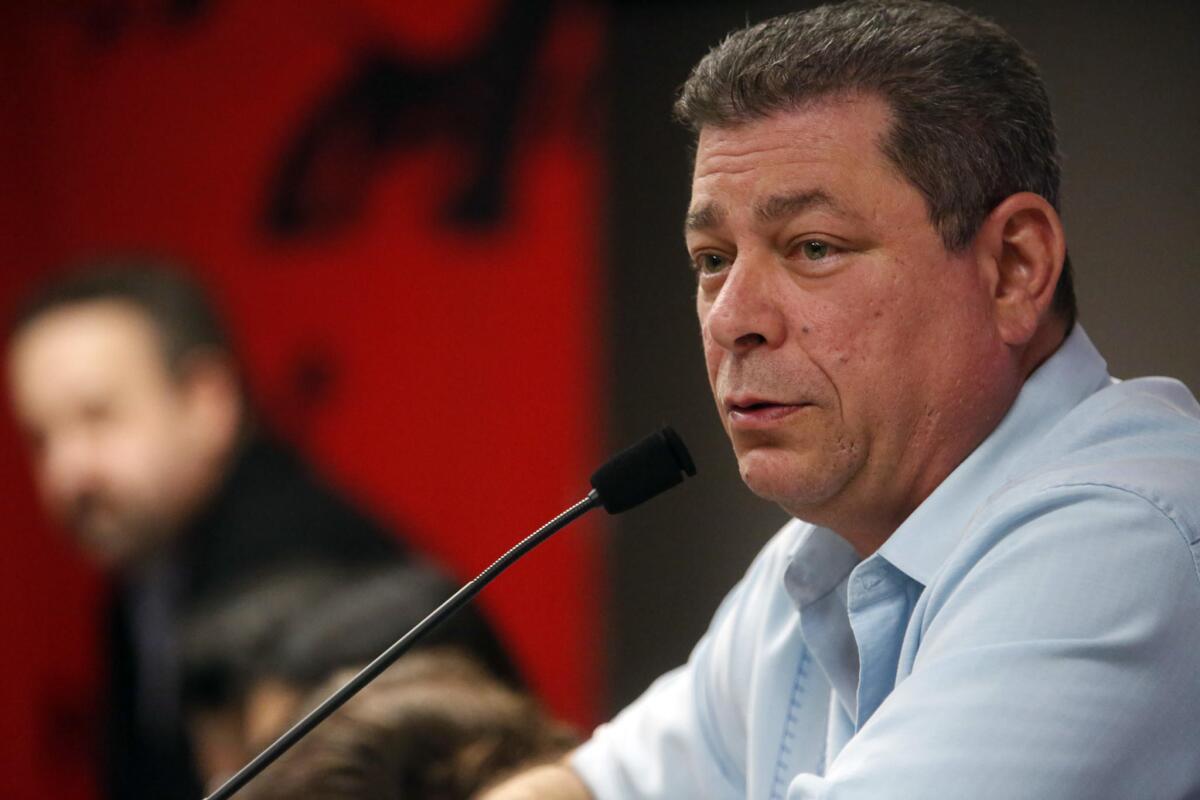
Longtime Democratic leader Eric Bauman won a razor’s-edge victory Saturday to be elected chairman of the California Democratic Party, beating rival Kimberly Ellis by just more than 60 votes, according to the state party.
But Ellis did not concede, saying late Saturday night that she had been in touch with attorneys.
‚ÄúThis race is not done,‚ÄĚ she told hundreds of chanting supporters who were calling for a recount in the hallway of the convention center where the state party convention was being held. ‚ÄúWe will see you all in the morning.‚ÄĚ
Bauman, a long-time party leader, said he was humbled by the win. He reached out to Ellis supporters in his victory message.
‚ÄúThere is no denying that there is a problem when so many of our hardworking activists feel that they are not welcome within our Party and that they have been slighted and shut out of the process,‚ÄĚ he said in statement. ‚ÄúWe cannot win the vital elections in 2018 and beyond without the energy, commitment and participation of every part of our Democratic family.‚ÄĚ
The race, between a party insider and a progressive organizer, was a heated battle between divergent forces that are racking the Democratic Party nationwide. Bauman was a favorite of the party establishment, while Ellis drew the backing of liberals who supported Sen. Bernie Sanders in last year’s presidential primary. She has worked to train Democratic women to run for office.
Earlier in the night, Ellis supporters had gathered in a meeting hall of the convention center as rumors of victory circulated, drawing cheers and hugs and victorious speeches. As it became clear that Ellis had not won, a woman led the crowd in singing, ‚ÄúWe shall not be moved.‚ÄĚ
RoseAnn DeMoro, the executive director of the California Nurses Assn., which backed Ellis, told the crowd that she doubted a recount would change the outcome.
‚ÄúIt is what it is. I‚Äôm sorry to tell you that. But you know what? It has very little to do with what you do out in the field, with what we do as an organization out in the field,‚ÄĚ DeMoro said. ‚ÄúSo let‚Äôs talk about this where do you go from here. You don‚Äôt give up. You double down.‚ÄĚ
Bauman, who has led the L.A. County party since 2000 and been a state party vice chairman since 2009, was initially expected to cruise to an easy victory in the chairperson’s race. But Ellis was a surprisingly strong rival, her candidacy driven by her dynamism on the stump and by the support of liberal activists who were tired of a party establishment that they believed failed them in the 2016 presidential campaign.
10:31 p.m.: This article has been updated to note that Kimberly Ellis has not conceded the race.
This article was originally published at 9:59 p.m.
Rep. Adam Schiff calls for Democratic unity in speech that suggests an ambitious future for himself
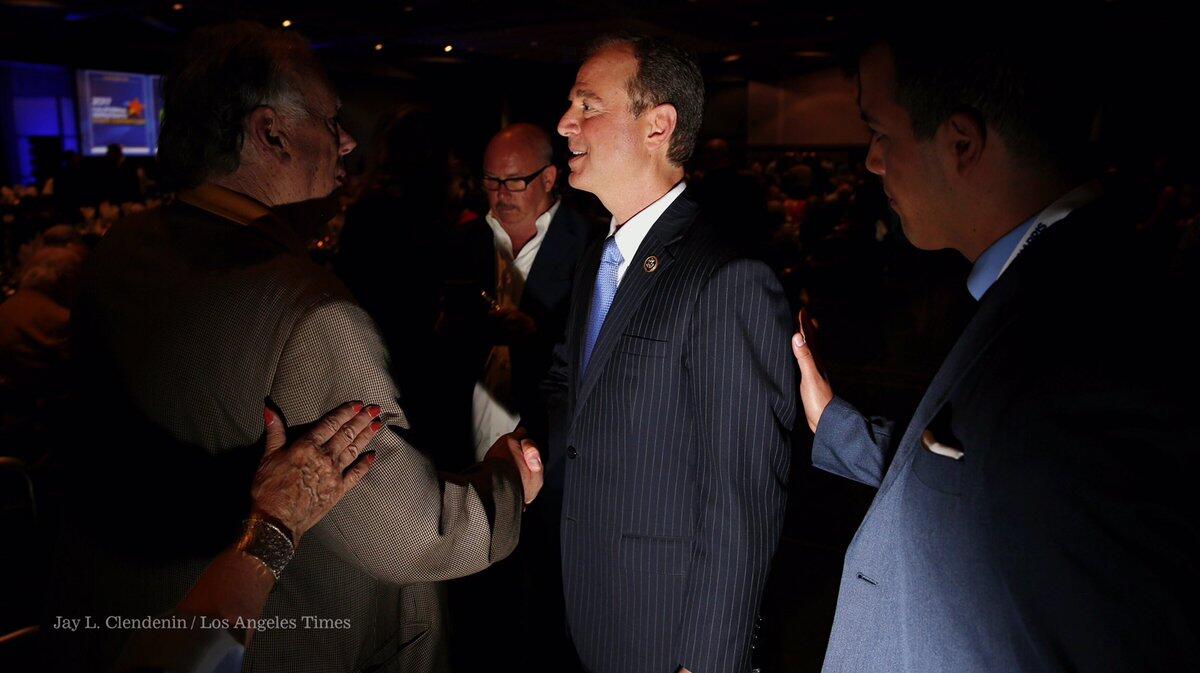
Rep. Adam B. Schiff has been one of President Trump’s most able tormenters in Washington as the ranking Democrat on the House committee looking into the involvement of Russia in the 2016 presidential election.
In the process, the congressman from Burbank has also vaulted himself into the top ranks of California Democrats. On Saturday night he delivered to party members at their state convention a speech that spoke of ambitions for them ‚ÄĒ and, none too subtly, himself.
Schiff was blistering in his condemnation of Trump, asserting that he’d violated American norms and a sense of decency that had previously defined even the most unsuccessful politicians.
‚ÄúOver the last 120 days we have come to see what an acute threat to our democracy can come from a president who lacks that central quality and who is instead profoundly indecent,‚ÄĚ he said of Trump.
Schiff defended the House investigation and the FBI director recently fired by Trump, an action that ultimately caused the Department of Justice to name a special counsel to examine whether the Trump campaign in any way cooperated with the Russian effort to deny the presidency to Hillary Clinton.
‚ÄúThis is not about re-litigating the election as the president claims; it is not ‚Äėfake news,‚Äô‚ÄĚ Schiff said.
He alluded to criticism of former FBI Director James B. Comey that Trump was reported to have uttered to Russian diplomats during an Oval Office meeting the day after the firing.
‚ÄúJim Comey was many things,‚ÄĚ Schiff said, ‚Äúbut he was not a ‚Äėnut job.‚Äô‚ÄĚ
Beyond his castigation of the president, however, the speech was notable for its ambitious pitch.
Schiff has been high on the list of Democrats considered interested in a run for the U.S. Senate if incumbent Democrat Dianne Feinstein were to announce that she will not seek another term in 2018. (So far, she has said she’s running.)
Schiff’s nationally televised interrogations of Russian investigation figures and his frequent appearances on cable news shows have helped him gain followers in parts of California where he was previously unknown. It has also shot his national image from something close to anonymity to wider prominence, an assist in whatever race he might run in the future.
His options appeared open. Not by accident did he refer to men and women in coal country and steel manufacturing areas and other rural Americans ‚ÄĒ zones in the country where traditionally Democratic voters went for Trump. (He also lauded Bernie Sanders and Hillary Clinton, the two combatants in last year‚Äôs Democratic primaries, and Howard Dean, who in 2004 sparked an earlier Sanders-style infusion of enthusiasm in the party.)
‚ÄúWe love you,‚ÄĚ a fan in the crowd shouted as he began to speak Saturday night.
‚ÄúAnd I love you too,‚ÄĚ he said, a call-and-response heard more often in presidential campaigns.
Schiff detailed several freedoms ‚ÄĒ a rhetorical flourish that updated President Franklin D. Roosevelt‚Äôs ‚ÄúFour Freedoms‚ÄĚ ‚ÄĒ that he said form the American canon. Among them: freedom from want, from fear, of liberty and of faith.
‚ÄúWe are for the liberty to live as we choose as long as we do not hurt others,‚ÄĚ he said, to ‚Äúwalk as we will, talk as we will, and yes, within reason, even smoke what we will.‚ÄĚ
‚ÄúWell, at least you can,‚ÄĚ the congressman joked.
At a convention that has been riven by sniping between liberal and even-more-liberal Democrats, Schiff took no side on some of the dicier issues.
He said he backed ‚Äúuniversal‚ÄĚ healthcare, for instance, but did not offer an opinion on a state Senate measure proposing Medicare-style healthcare for all in California. That measure has been a hot-button issue throughout the weekend convention.
Instead, he called for Democratic unity, regardless of differing views on some issues.
‚ÄúWe cannot afford division when the fate of the republic is at stake,‚ÄĚ he said. ‚ÄúOur people are stronger united, our party is stronger together.‚ÄĚ
Activists intent on flushing oil money out of Democrats’ campaigns stage a rally outside governor’s mansion
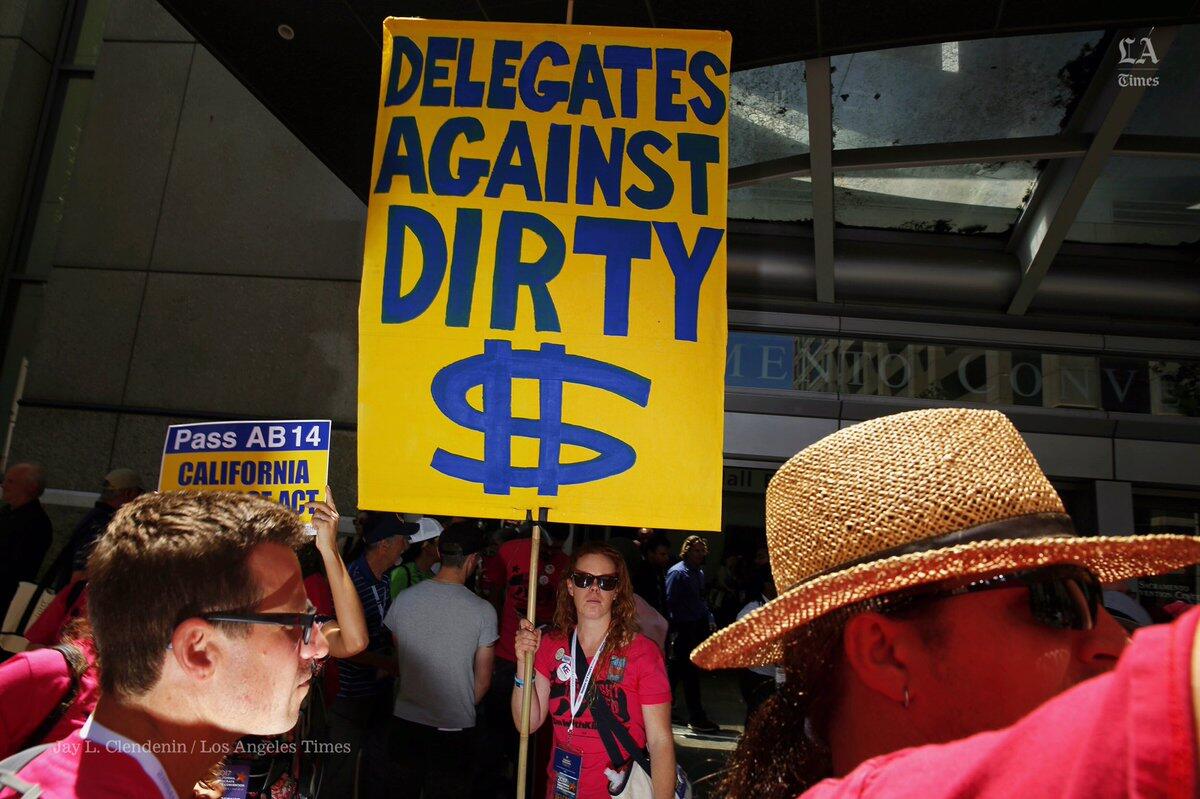
A few dozen protesters, many of them state Democratic Party delegates, marched to Gov. Jerry Brown’s downtown Sacramento mansion Saturday to demand that politicians stop taking campaign money from oil companies.
The protest, called the Delegates Against Dirty Money march, came on the second day of the California Democratic Party convention. Many of the progressives who have led protests, chants and demonstrations at the event are newcomers to the internal politics of the party.
This weekend some state party delegates are trying to pass a resolution that would ‚Äúpublicly condemn corporations and lobbyists that finance political campaigns‚ÄĚ and pressure candidates and officials to sign a pledge that they won‚Äôt take contributions of more than $200 from oil companies.
‚ÄúJust because you are a Democrat is not good enough for me,‚ÄĚ one protester said into a bullhorn, as others held signs that read ‚ÄúOil Money Out.‚ÄĚ ‚ÄúThose big Democrats in there that are putting money first, they‚Äôre fighting against us...and we‚Äôre going to hold them accountable.‚ÄĚ
Protest leaders criticized Brown for taking nearly $10 million in campaign contributions from oil companies in the last several years, a point that was publicized in a report by a consumer group last year.
‚ÄúThis is the guy that was the Bernie Sanders of the ‚Äė90s,‚ÄĚ said activist David Braun, referring to Brown‚Äôs run for president against Bill Clinton, when he vowed not to take contributions of more than $100. ‚ÄúThat guy‚Äôs long gone, but we need him back. Jerry Brown, we need you!‚ÄĚ
Brown was not home, spending the weekend instead at a family reunion on his Northern California ranch.
Los Angeles Mayor Eric Garcetti vows to fight President Trump‚Äôs policies: ‚ÄėThe California bear don‚Äôt scare‚Äô
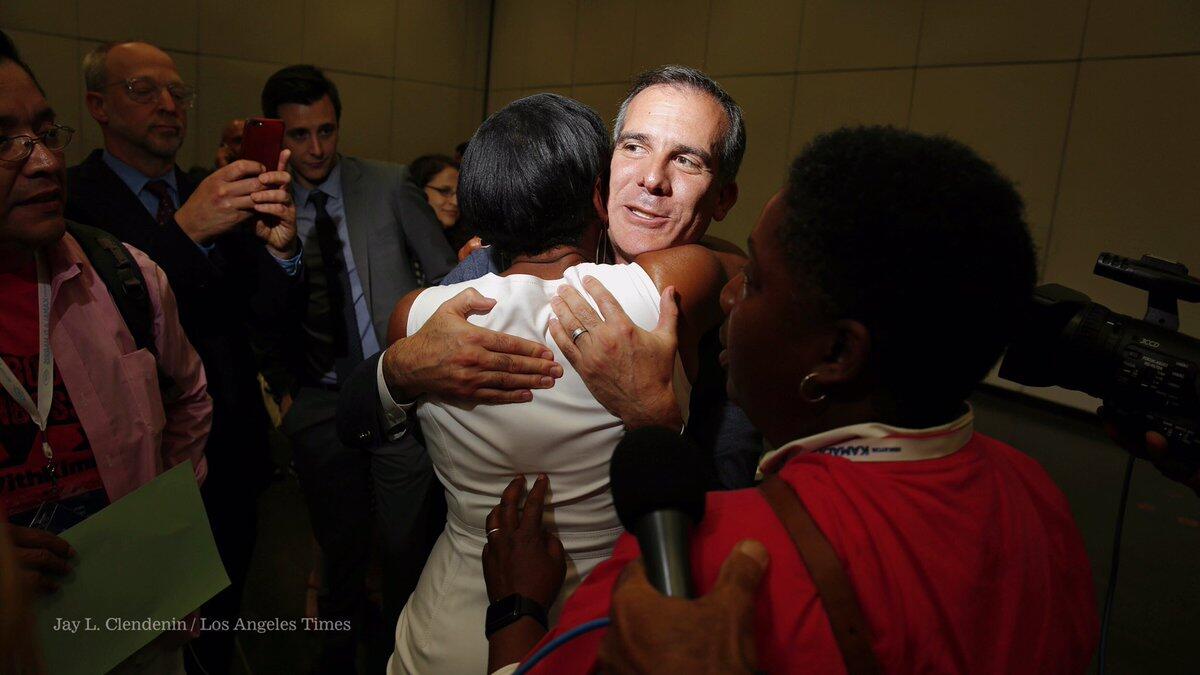
Los Angeles Mayor Eric Garcetti was the final scheduled speaker Saturday at the California Democratic Party convention after more than two dozen others addressed a marathon session. The crowd awaiting Garcetti, mayor of the nation‚Äôs second largest city, was thin ‚ÄĒ shortly before he took the stage, delegates rushed the exits as voting opened in the hotly contested chairperson‚Äôs race.
Still, he was good-natured as he stepped up and surveyed the largely empty convention center hall, saying that he was reminded of a quote by Winston Churchill.
‚ÄúEverything that needs to be said has been said, but it hasn‚Äôt been said by everybody,‚ÄĚ Garcetti said. ‚ÄúSo here I am.‚ÄĚ
Since being handily reelected mayor in March, rumors have been swirling about Garcetti possibly launching a gubernatorial bid. He did not mention his political future during his remarks on Saturday. Two days earlier he sidestepped questions about a possible run for governor ‚ÄĒ or any other higher political office ‚ÄĒ but didn‚Äôt totally dismiss the idea.
Like many of the speakers who came before him at the state party convention, Garcetti railed against President Trump and vowed to fight his policies including healthcare, immigration, the environment and education that he said ran counter to California’s values.
‚ÄúThe California bear don‚Äôt scare,‚ÄĚ Garcetti said. ‚ÄúYou can‚Äôt take away our optimism, you can‚Äôt take away our rights. You won‚Äôt take away our progress.‚ÄĚ
Garcetti touted progress made in Los Angeles, such as working to end the city utility’s reliance on coal, and passing a $120-billion county infrastructure measure. And he said both the city and the state could continue to fight Trump’s efforts to override their policies.
‚ÄúWe will take to the streets and we will win. We will take to the courts and we will win. And we will continue moving an American agenda forward,‚ÄĚ Garcetti said.
Delaine Eastin says she has the ‚Äėbrass backbone‚Äô required to govern California
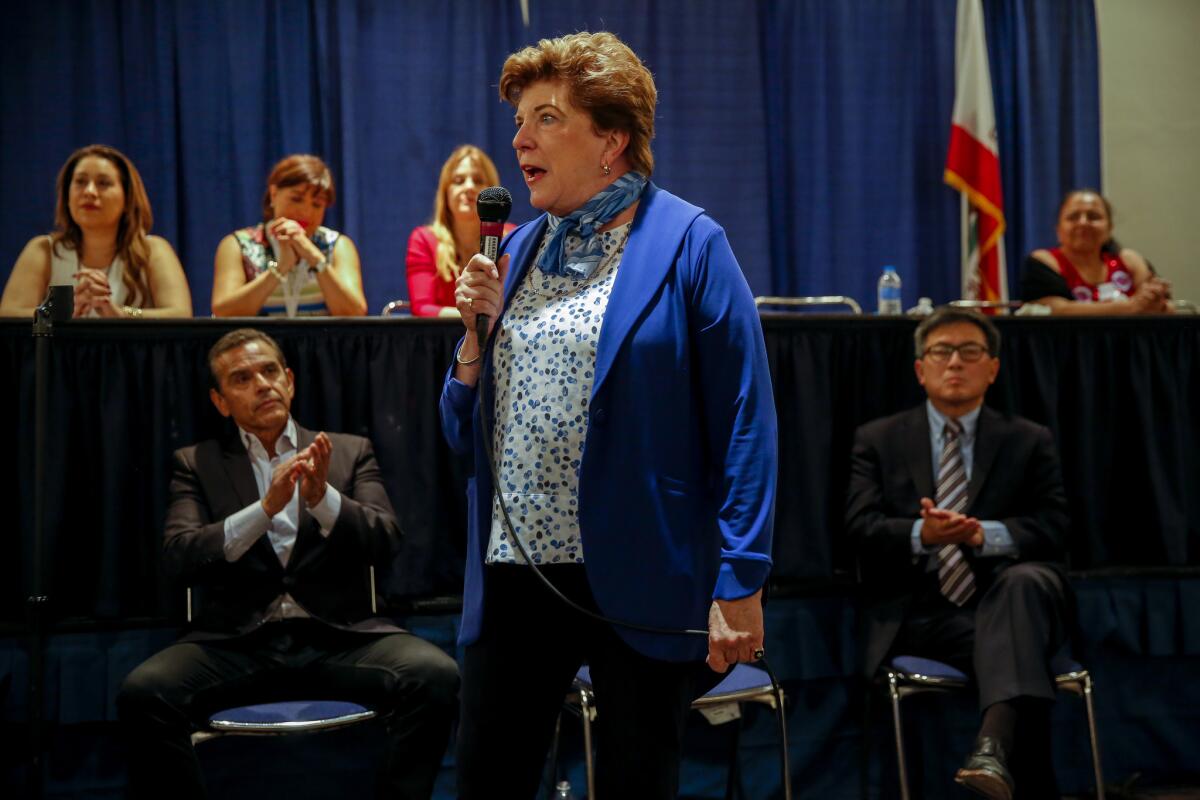
Former state schools chief Delaine Eastin said Saturday that her gubernatorial bid is founded on righting California’s priorities so that the economy serves all the state’s residents, regardless of class.
‚ÄúCalifornia needs a governor with a brass backbone, and that is why I am running, because I know a budget is a statement of values, and I want ours to reflect the priorities of the people I see here today,‚ÄĚ Eastin told delegates at the California Democratic Party‚Äôs annual convention.
Eastin, who also served in the state Legislature but has not held elected office for 14 years, outlined her agenda, which includes making college tuition free, enacting universal healthcare, banning fracking and increasing housing affordability.
But she also warned about a broader concern ‚Äď the state of the nation‚Äôs democracy.
‚ÄúThank you for lending your voice and your time to fight the thug in the White House and stand up for Democratic values,‚ÄĚ Eastin said. ‚ÄúI don‚Äôt have to tell you our democracy is in trouble. This isn‚Äôt just Trump threatening us. It is a lack of participation in our civil society and a lack of faith in government.‚ÄĚ
Eastin said the key to holding the democracy together was for people such as the convention attendees to band together.
Villaraigosa tells Democrats to focus less on people who drive Teslas and more on Californians who ride the bus
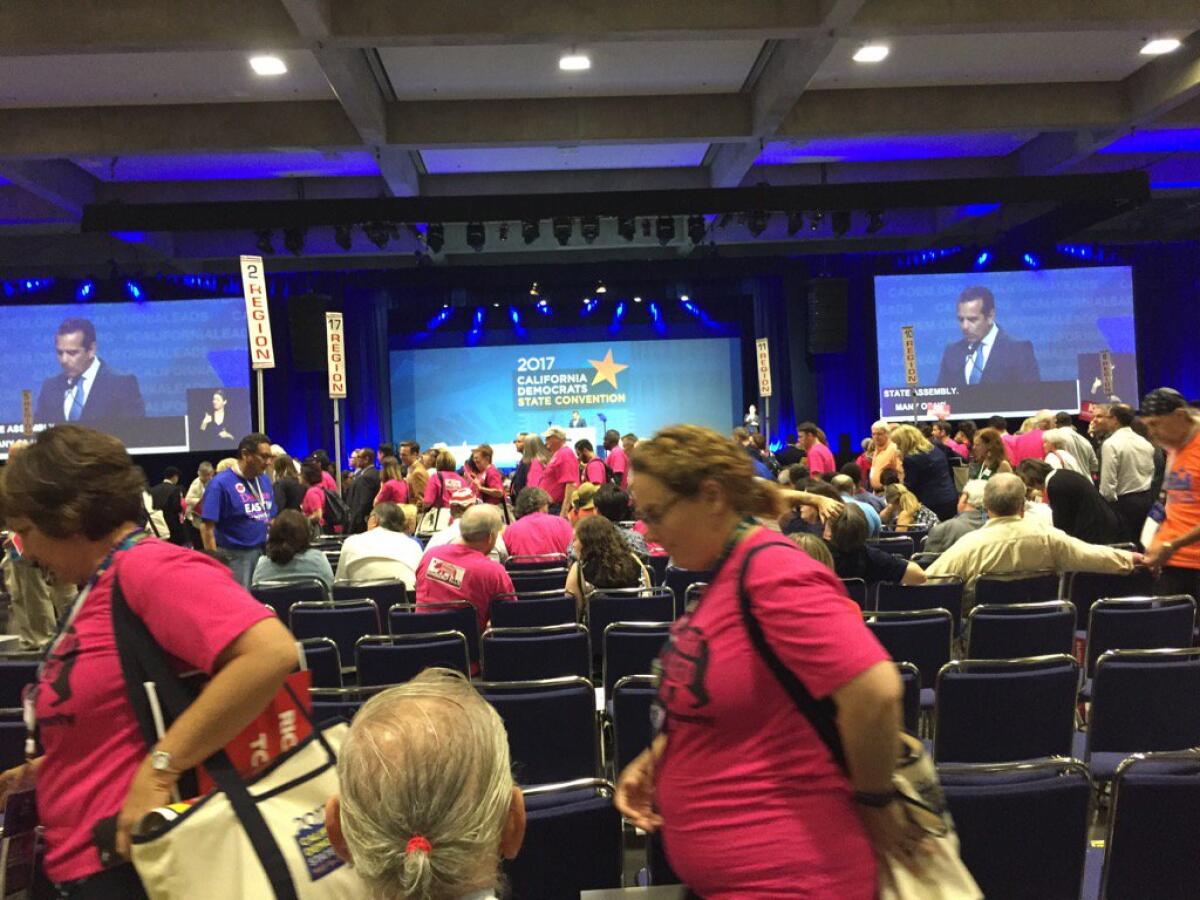
Former Los Angeles Mayor Antonio Villaraigosa told California Democrats at their convention Saturday that too many people in the state have been left behind in the economic recovery, saying the party needs to ‚Äúlook in the mirror‚ÄĚ and bring a renewed effort to creating jobs and improving public schools.
Villaraigosa, a 2018 candidate for governor, called on California to lead the resistance against President Trump and the Republican Congress, saying the nation was looking to the state to lead the way to protect immigrants, religious freedoms and civil rights.
‚ÄúWe‚Äôre here today to fight for the soul of our party and our most cherished values,‚ÄĚ Villaraigosa told party delegates gathered inside the cavernous Sacramento Convention Center. ‚ÄúStanding up to Trump takes more than talk and tweets. It takes action.‚ÄĚ
Villaraigosa, who launched his campaign in November, hewed toward the central themes of his campaign, economic opportunity and education, saying both are pivotal if California hopes to help those parts of the state still in financial despair.
He also chided party members, saying it needed to focus less on people who drive Teslas and more on Californians who take the bus.
Villaraigosa had the misfortune of speaking just after candidates in the hotly contested race for state party chairperson delivered their speeches. Hundreds of delegates started heading for the exits during Villaraigosa’s speech, creating a clamor that made it difficult to hear.
‚ÄúMy time is up,‚ÄĚ he said at the end of his remarks, ‚Äúbut I ask you to support a candidate who has been in the trenches his whole life, fighting for working people.‚ÄĚ
Ahead of showdown over who will lead California Democrats, ‚ÄėBerniecrats‚Äô have a message: ‚ÄėWe don‚Äôt have to behave‚Äô
Voting will soon be underway in the contentious race to decide who will be the next chair of the California Democratic Party.
The race, between progressive-backed Kimberly Ellis and Los Angeles County Democratic Party Chairman Eric Bauman, who is seen as the establishment-backed candidate, is being framed as an old-school-versus-new-school battle.
Voting is scheduled to begin at 4 p.m. Saturday.
Many of the ‚ÄúBerniecrats‚ÄĚ convened at a dinner Friday night that served as a reunion of sorts for Bernie Sanders delegates who‚Äôd met at last year‚Äôs Democratic National Convention.
‚ÄúTomorrow, when we‚Äôre in that hall ... they‚Äôre going to be telling you how bad Trump is and how we should all be OK with them because Trump‚Äôs so bad,‚ÄĚ said RoseAnn DeMoro, executive director of the California Nurses Assn./National Nurses United, and a prominent Sanders backer. ‚ÄúTomorrow, you guys are going to want to boo. There‚Äôs a lot of good people to boo.‚ÄĚ
Nina Turner, a former state senator from Ohio who has frequently warmed up crowds at Sanders rallies, said, ‚ÄúThe way we show the corporate [Democrats] that we are not playing games with them, starting right here in California, is to make sure that we get Kimberly Ellis elected as chair!‚ÄĚ
Turner went on to skewer Democrats for remaining hyper-focused on the controversy surrounding the investigation into White House ties with Russia and not on issues such as criminal justice reform and income inequality.
Adding that she believed that there is no longer any difference between the nation’s two major parties, Turner urged delegates to turn out to protest and vote in the party’s elections.
‚ÄúYou can‚Äôt be absent. We‚Äôve all got to be in pocket tomorrow,‚ÄĚ Turner said. ‚ÄúThey‚Äôre going to get the memo tomorrow.‚ÄĚ
Lt. Gov. Gavin Newsom: ‚ÄėUsually I‚Äôm scooping Jerry Brown‚Äôs ice cream‚Äô
Gubernatorial candidate Gavin Newsom mused about his duties as lieutenant governor as he courted Democratic delegates by scooping ice cream for them on a blazing hot Saturday.
‚ÄúPeople ask what does a lieutenant governor do. What do they do? This is it,‚ÄĚ he said in an exchange with a man in the crowd surrounding his ice cream tent outside the California Democratic Party convention. ‚ÄúSee, know your job. Usually I‚Äôm scooping Jerry Brown‚Äôs ice cream.‚ÄĚ
After delivering a lengthy speech painting California as the resistance to Trump, Newsom wooed delegates, took selfies and donned a plastic red nose to raise awareness about childhood poverty.
As he passed out ice creamm, Newsom was approached by Harmesh Kumar, a Democrat who has also filed to run for governor.
‚ÄúLet‚Äôs have our first debate,‚ÄĚ Newsom said to Kumar. ‚ÄúRocky road or chocolate chip, which one? This is big moment. People want to know, they have a right to know.‚ÄĚ
Newsom handed Kumar an ice cream cone before adding, ‚ÄúThis is called sucking up to your opposition.‚ÄĚ
Single-payer healthcare backers disrupt California Assembly Speaker Anthony Rendon’s convention speech
Assembly Speaker Anthony Rendon (D-Paramount) introduced himself to convention-goers as a ‚Äúslacker turned professor‚ÄĚ now representing a southeast Los Angeles district in need of ‚Äúenvironmental justice... social justice... economic justice‚ÄĚ from progressive Democrats.
But his address was soon drowned out by chanters calling for single-payer healthcare, an emerging litmus test for the left that has inspired a number of outbursts at the Democratic gathering this weekend.
As single-payer cries grew, Democratic Party Chair John Burton interrupted to chastise the chanters with an expletive-laced plea to show respect.
With exasperation, he derided the interrupters for acting ‚Äúlike single-payer is controversial among Democrats.‚ÄĚ
In fact, although most Democratic legislators like to express their support for the concept of single-payer healthcare, many, including Rendon, have expressed concern about how such an overhaul would be financed.
Senate leader Kevin de Léon, as promised, stays mum on his 2018 plans
After a week of heightened speculation about his future plans, California Senate President pro Tem Kevin de Léon offered no hints on a potential run for governor during his Saturday afternoon convention speech, instead returning to familiar themes of jabbing at President Trump and touting California’s economy.
Still, the slick campaign-style video preceding his speech and ‚ÄúRun Kevin Run‚ÄĚ signs distributed in the hall ensured that the 2018 guessing game is not going away any time soon.
De Léon laced into Trump, his perpetual foil, throughout the speech.
‚ÄúIn our state, we celebrate diversity. We don‚Äôt deport it,‚ÄĚ de L√©on said ‚ÄúWe don‚Äôt ban it. And we sure as hell don‚Äôt wall it off.‚ÄĚ
Portraying California as the counterweight to GOP-led Washington, de L√©on boasted, ‚ÄúOur Democratic-led Senate and Assembly have earned their highest approval ratings in three decades, while Republicans in Congress follow Trump over a cliff. They have lower ratings than the taco bowls at Trump Tower.‚ÄĚ
Sen. Kevin de L√©on swipes at Trump‚Äôs infamous Cinco de Mayo ‚Äėtaco bowl‚Äô tweet
California‚Äôs top elections officer calls Trump voter fraud allegations a ‚Äėsmokescreen‚Äô to distract from Russia charges
California’s secretary of state told delegates to the state Democratic Party’s convention that President Trump’s allegations of voter fraud last year are an effort to divert attention away from questions about his own presidential campaign.
‚ÄúIt‚Äôs been a smokescreen to distract from the investigation into Trump‚Äôs ties to Russia,‚ÄĚ said Secretary of State Alex Padilla in his convention speech Saturday.
Padilla has been a persistent critic of Trump’s assertion, first made last November, that he lost the popular vote because millions of illegal votes were cast in the presidential race. And the president singled out California and two other states, even though no evidence exists of widespread illegal voting.
‚ÄúThe only mass fraud against the people of the United States of America are the lies being perpetrated by the president of the United States of America,‚ÄĚ Padilla said.
The state‚Äôs chief elections officer urged Democrats to focus on voting rights as a key issue in 2018. And he pointed to a handful of new California laws ‚ÄĒ including expanded automated voter registration at the DMV and a sweeping law that will replace polling places with more absentee voting ‚ÄĒ as steps in the right direction.
‚ÄúMake defense of voting rights essential to who we are as a party,‚ÄĚ he urged delegates. ‚ÄúVoter participation is the oxygen to our democracy.‚ÄĚ
Lt. Gov. Gavin Newsom calls on California Democrats to be the ‚Äėresistance‚Äô to Trump
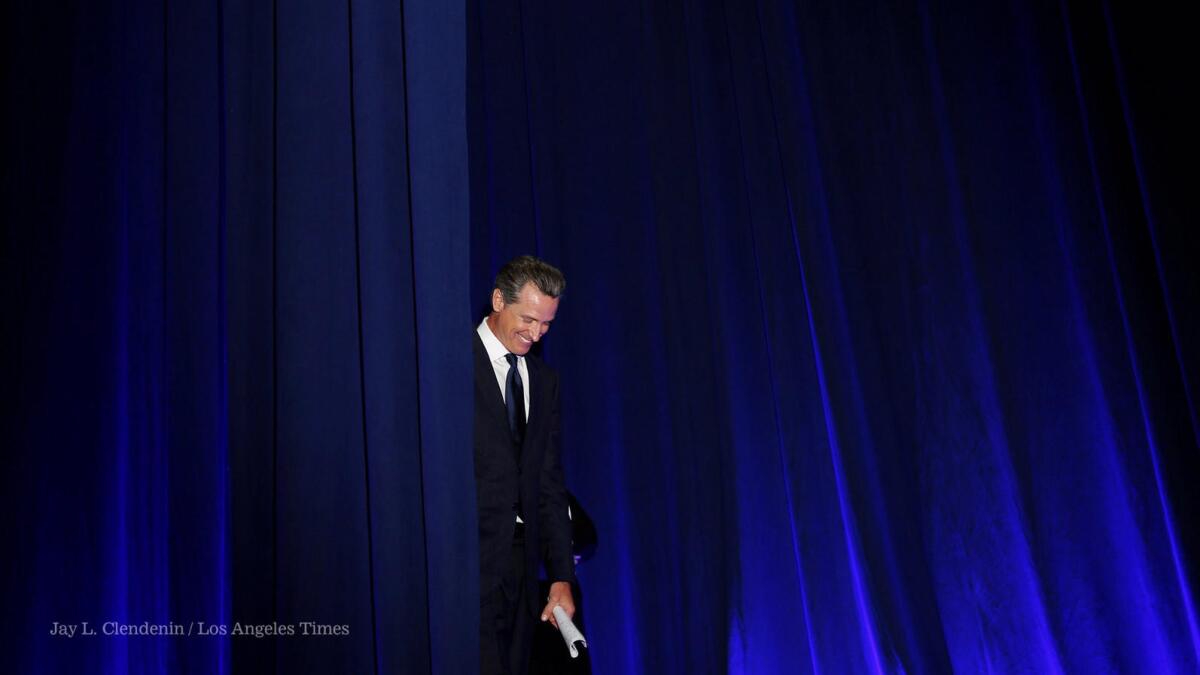
Lt. Gov. Gavin Newsom told California Democrats on Saturday that they must be the resistance to President Trump and offer an alternative vision for the rest of the world.
‚ÄúWe are all Californians. Wear it with pride. This is our moment,‚ÄĚ the gubernatorial candidate said to thousands of delegates and activists gathered at the state party‚Äôs annual convention in Sacramento. ‚ÄúCalifornia Democrats: Let‚Äôs show the world that Donald Trump is the last vestige of a darker, obsolete past and offer a bold, new vision for a progressive and prosperous future.‚ÄĚ
Newsom laid out an agenda that he said he would adopt if elected governor next year. He said ending childhood poverty in the state would be his ‚Äúnorth star.‚ÄĚ He also called for the expansion of early-childhood education, creating full-service community schools, making community college free for all of the state‚Äôs students, creating 500,000 apprenticeships by 2027, implementing universal healthcare and reforming the state‚Äôs justice system, including repealing the death penalty.
He said Trump’s policies were at odds with California on issues such as immigration, the environment, healthcare and the treatment of the LGBTQ community.
‚ÄúIt‚Äôs time to reject timidity, set ambitious sights and take real chances,‚ÄĚ he said, pointing to his fight with President George W. Bush‚Äôs administration when he issued same-sex marriage licenses when he was mayor of San Francisco.
The move was controversial even among some Democrats at the time, but it is among the reasons Newsom is popular with party activists today.
‚ÄúI believed then, as I do now, that it‚Äôs never the wrong time to do the right thing, and it‚Äôs always better to change the polls than to chase them,‚ÄĚ Newsom said.
State Treasurer John Chiang says California will take ‚Äėa different road‚Äô than the Trump administration
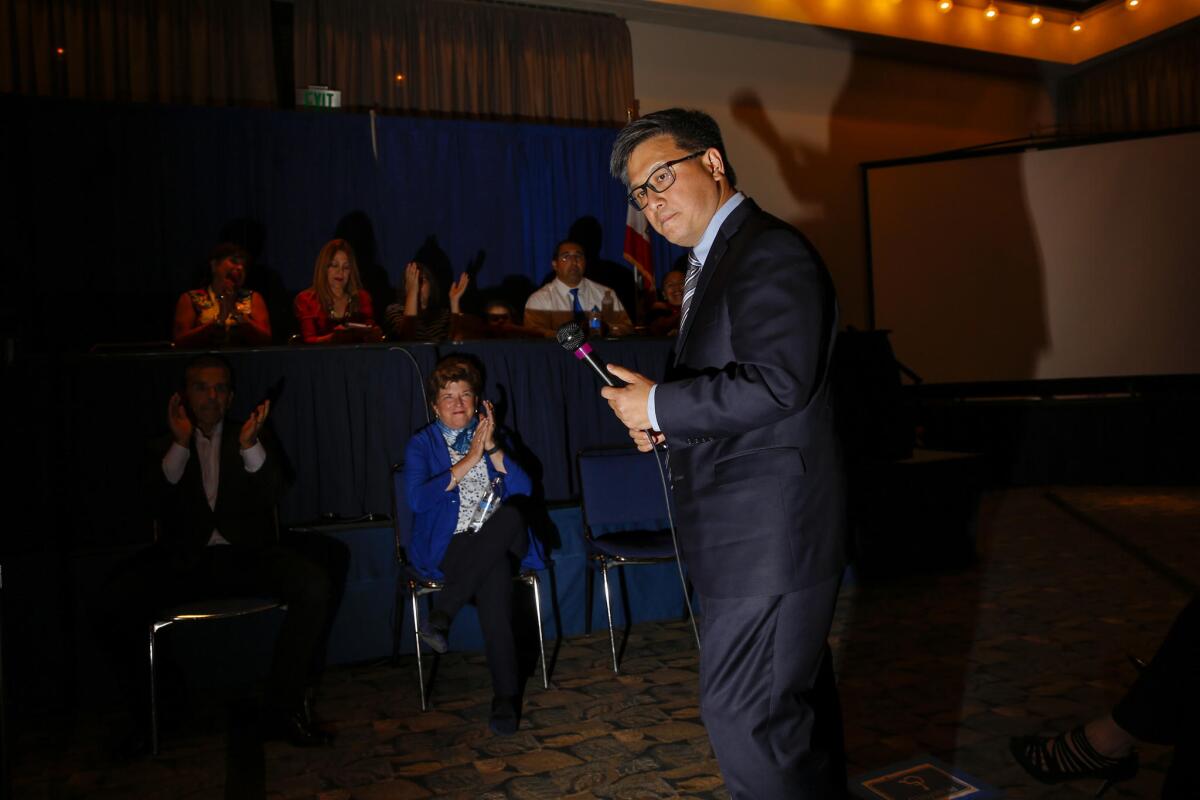
State Treasurer John Chiang told California Democrats on Saturday that the state is charting its own course, different from the one taken by President Trump and Republicans in Washington.
‚ÄúTogether we will propose a different road for California,‚ÄĚ Chiang said to applause from the delegates attending the California Democratic Party convention.
Chiang, who announced his candidacy for governor last spring, said the state must take an active role in opposing Trump on a range of issues, including immigration crackdowns and a rollback of existing climate change policies.
‚ÄúEvery hour since Donald Trump took office, I find myself saying ‚ÄėNot on our watch,‚Äô ‚ÄĚ Chiang said.
The 54-year-old Democrat from Los Angeles served eight years as the state’s controller before being elected treasurer in 2014. He reminded the convention crowd of his fights with former Gov. Arnold Schwarzenegger during the state’s economic crisis, including a 2008 showdown over whether Chiang should issue paychecks to hundreds of thousands of state workers.
‚ÄúI know the ins and outs of how to run this state responsibly,‚ÄĚ he said. ‚ÄúI have a track record of getting the job done.‚ÄĚ
California Democrats say farewell to party leader John Burton. To no one’s surprise, he responded with profanity
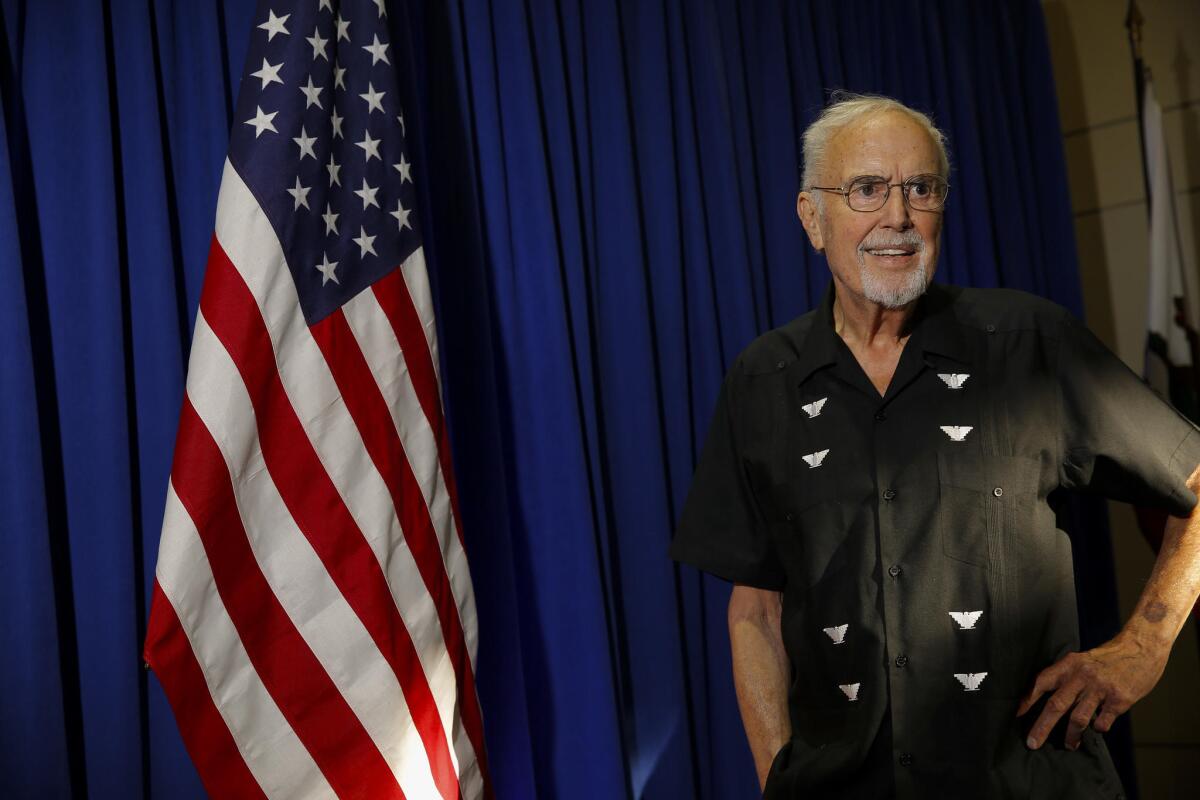
California Democrats said farewell to chairman John Burton on Saturday, and John Burton said farewell to Democrats, in his usual fashion.
Most of it cannot be printed.
Burton, a fixture in state Democratic politics for half a century even before he took the party’s top position eight years ago, offered up an expletive-speckled thank you to party members that was characteristic of his tenure. After a crowd of Democrats, one after another, lauded him in speeches and a video shown to delegates in Sacramento’s convention center, Burton came to the microphone.
‚ÄúHoly ... ,‚ÄĚ he said.
It has been a rocky convention for Burton so far. On Friday night, his welcoming remarks to delegates were interrupted by shouts and chants from protesters demanding that party members back a state measure that would provide healthcare for all. (Not surprisingly, Burton, 84, gave back with vigor.)
Burton opened the general session Saturday with what seemed to be an effort to tamp down dissent, leading delegates in a chant supporting universal healthcare. He said he hoped that would forestall protests against others this weekend.
Many of those who jeered Burton were born well after he helped drive protests against the Vietnam War and for farm workers in the Central Valley, and spent decades seeking aid for the homeless and other needy Californians. The farewell that came shortly after the session’s opening provided something of a reminder of Burton’s legacy and his inimitable, if profane, style. It was a word even friends used to describe him in their remarks.
‚ÄúHe should walk around with a T-shirt with a warning label on it,‚ÄĚ Lt. Gov. Gavin Newsom said in the video, which featured nearly every prominent California Democrat for the last several decades.
But they also spoke of his years of work on behalf of liberal policies. Onstage with Burton on Saturday were officeholders he’s plucked from anonymity and helped propel into office, and politicians who had benefited from his protection in the 35 years he served in the House, state Assembly and state Senate.
Former state Sen. Martha Escutia broke into tears as Burton stood behind her.
‚ÄúJohn was the safety net I never had growing up,‚ÄĚ she said, then broke into a song of affection in Spanish.
Burton, never at a loss for words, seemed to have almost reached that point when it was his turn.
‚ÄúI‚Äôm the man who made Martha Escutia cry,‚ÄĚ he said with visible surprise. ‚ÄúShe‚Äôs one of the toughest people I‚Äôve ever known in my life.‚ÄĚ
Burton seemed near tears himself as he recounted walking as a child in his native San Francisco with his father, who doled out whatever money he had to the poor.
When young John asked why, Burton recalled, “He put his finger in my face and told me he never every wanted me to walk past some guy in bad circumstances without leaving something in the cup.
‚ÄúThat‚Äôs what Democrats do. ‚ĶThere‚Äôs a lot of people out there that if we don‚Äôt fight for them, nobody‚Äôs going to fight for them because they don‚Äôt have any power,‚ÄĚ he said.
Burton regained his typically cantankerous posture when he closed his farewell by addressing President Trump ‚ÄĒ bluntly, directly and defiantly.
‚ÄúNow, all together,‚ÄĚ he told the delegates, preparing to hurl an F-bomb. ‚Äú[Expletive] Donald Trump.‚ÄĚ
He raised both middle fingers toward the crowd.
For a moment, protests were forgotten, and the audience roared.
Sen. Kamala Harris on Republicans who voted to repeal Obamacare: ‚ÄėYou need to lose your job‚Äô
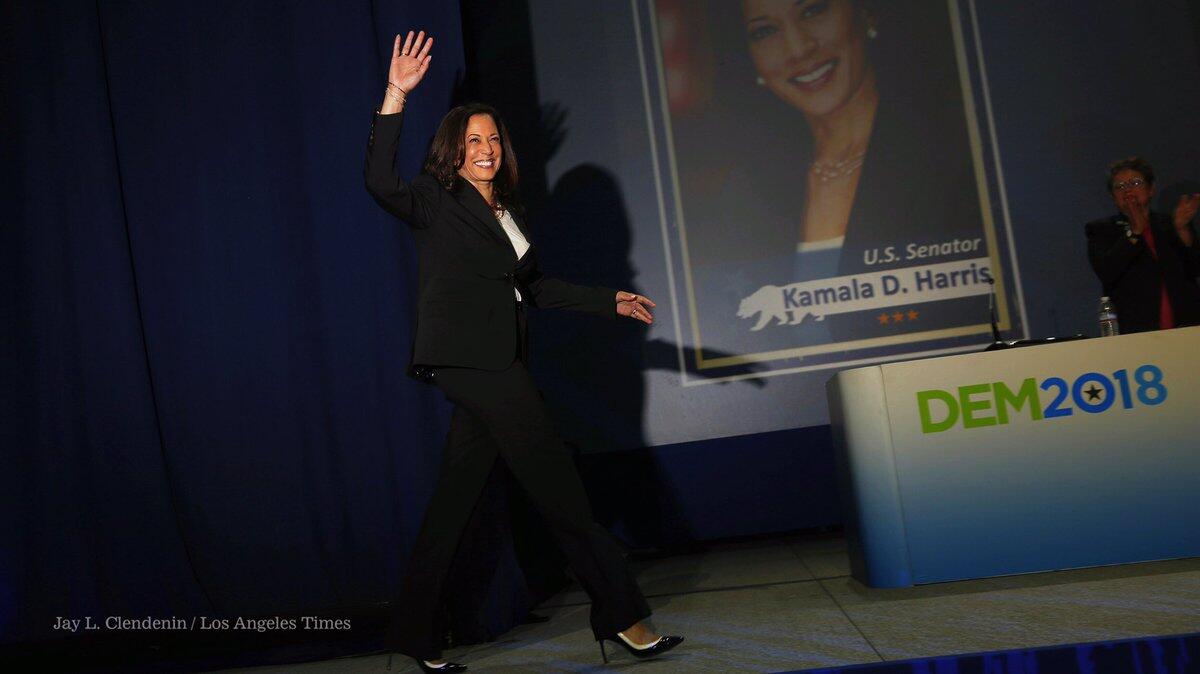
California’s junior U.S. senator told California Democrats on Saturday that they should focus on defeating Republicans in the state’s congressional delegation who voted to repeal the Affordable Care Act.
‚ÄúLet‚Äôs go to San Diego and Orange County and the Central Valley,‚ÄĚ said Sen. Kamala Harris of the districts represented by some of those Republicans. ‚ÄúIf you vote for people to lose their healthcare, then you need to lose your job.‚ÄĚ
Harris‚Äô speech to the California Democratic Party convention was a broadside critique of most of the agenda promoted by Republican leaders in Congress and President Trump. She called the president‚Äôs Cabinet a ‚Äúbillionaire boys‚Äô club‚ÄĚ and said he had put a ‚Äútarget on California‚Äôs back‚ÄĚ on issues ranging from immigration to the environment.
But she encouraged rank-and-file Democrats to use their relative strength in California politics to defeat Republican House members who represent some of the state’s swing districts. Seven Republicans represent congressional districts where Democrat Hillary Clinton beat Trump on election day last November.
‚ÄúWe win when we fight for the value that healthcare is a fundamental human right,‚ÄĚ Harris said. ‚ÄúLet‚Äôs hold these Republicans accountable in their districts.‚ÄĚ
Pelosi tells Democrats that GOP is ‚Äėstonewalling‚Äô on the investigation into Russia and Trump
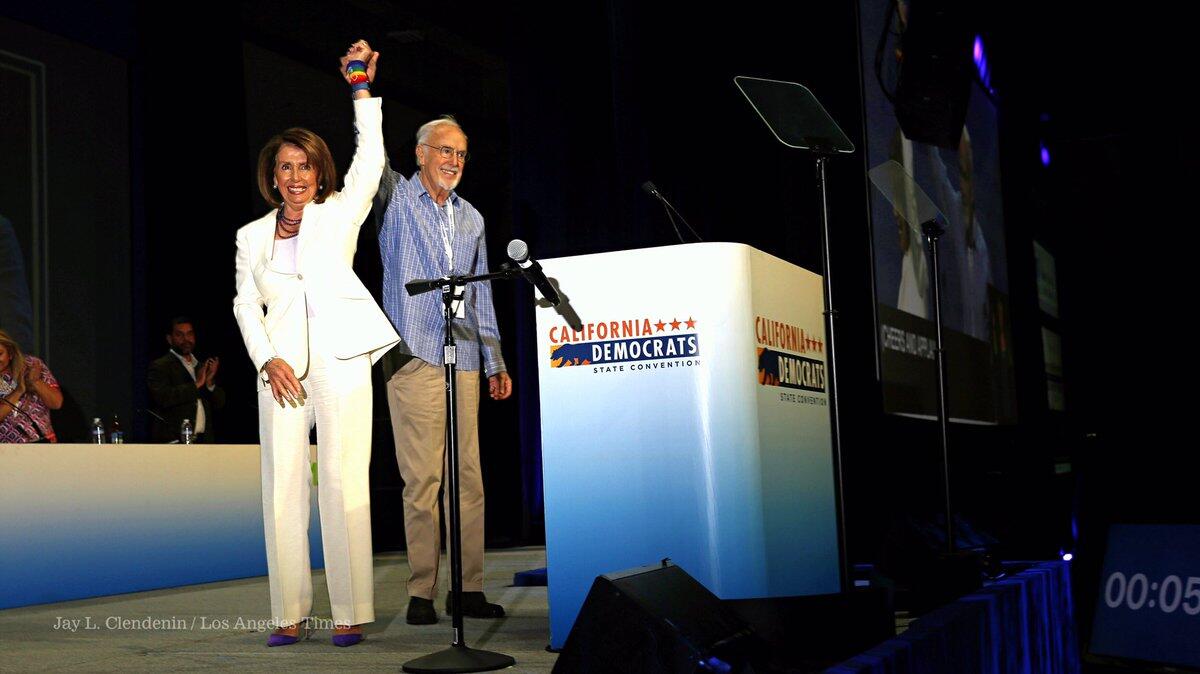
House Minority Leader Nancy Pelosi said on Saturday that Republicans in Washington are blocking efforts to investigate allegations of Russian influence in the election of President Trump.
‚ÄúTrump and the Republicans in Congress must stop stonewalling our quest for the facts,‚ÄĚ Pelosi told delegates to the California Democratic Party convention in Sacramento.
On Wednesday, a special counsel was appointed to investigate Russian meddling in the 2016 election and possible collusion between Russian agents and associates of President Trump. The president later called the effort a ‚Äúwitch hunt‚ÄĚ and said there was no collusion between his campaign and Russian officials.
Pelosi told delegates to the convention that the selection of Robert S. Mueller III as special prosecutor isn’t enough to determine exactly what happened.
‚ÄúWe must continue to press for an independent outside commission to get the truth for the American people,‚ÄĚ Pelosi said to applause.
The San Francisco Democrat also took jabs at what she called the ‚Äúcruel agenda‚ÄĚ of Trump and congressional Republicans, singling out efforts to repeal the Affordable Care Act.
‚ÄúCalifornia Democrats confront the Trump agenda with a party that is strong, dynamic and growing,‚ÄĚ she said.
Rallies, F-bombs and a raucous start to the California Democratic Party convention
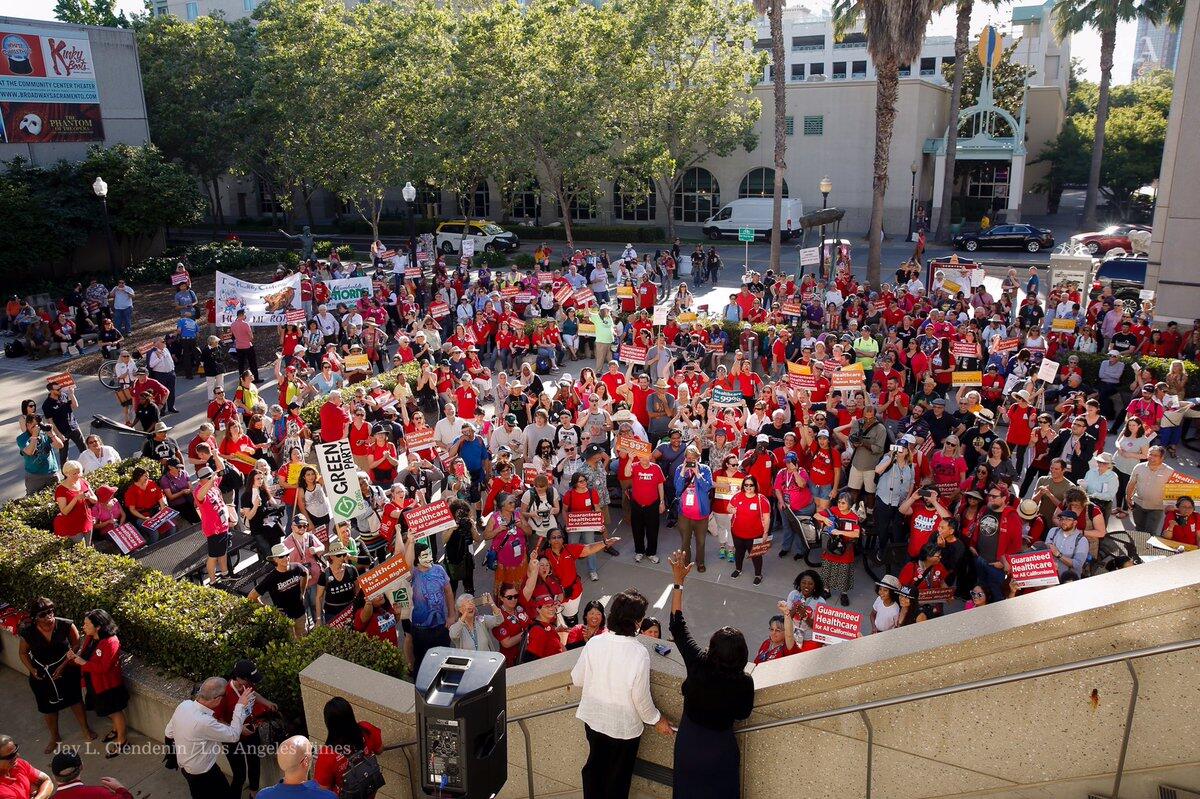
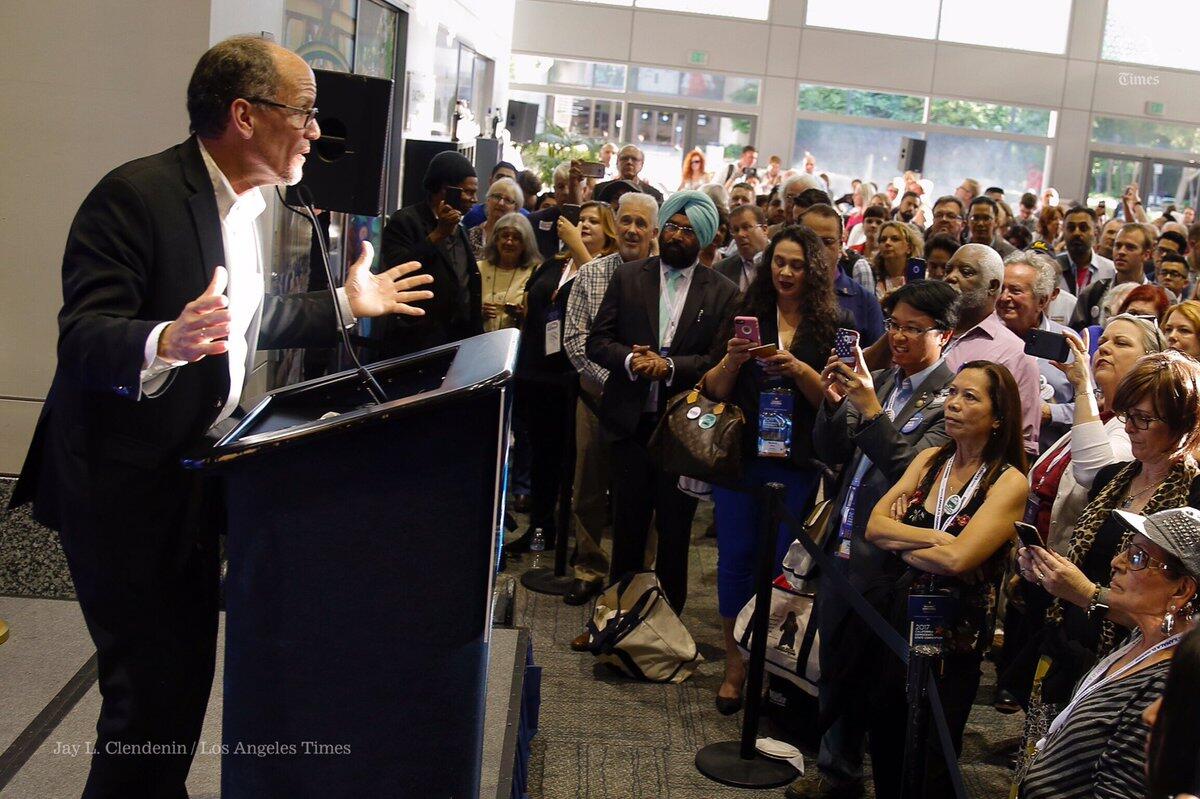
The California Democratic Party convention started with a bang Friday night, with protesters disrupting speeches at the official kickoff and state party Chairman John Burton unleashing a series of F-bombs aimed at the demonstrators.
The chanting began when Sacramento Mayor Darrell Steinberg and Burton stepped up to the podium in a cavernous hall at the state capital’s convention center, with protesters shouting demands that the party reject corporate donations and work to implement a single-payer healthcare system.
Burton, known for his salty language, lashed out quickly. He told protesters that the Democratic Party had been fighting for single-payer healthcare ‚Äúsince before you were born.‚ÄĚ
‚ÄúHey, shut the ... up or go outside,‚ÄĚ Burton said.
‚ÄúParade all you want, but unless we put it on the ballot or elect new Democrats you can walk up and down the street and people still aren‚Äôt going to have decent healthcare. So let‚Äôs get with it.‚ÄĚ
Democratic National Committee Chairman Tom Perez headlined the kickoff event and, seemingly accustomed to such a reception, delivered his speech in almost a thunderous shout ‚ÄĒ loud enough to drown out the chants.
Perez compared the atmosphere to holiday dinner with his extended family and told the hundreds of Democratic delegates in the crowd that, just like family, now was the time for all of them to come together.
‚ÄúWe have a raucous Thanksgiving dinner. We talk about politics. I‚Äôm Dominican. So we talk about the other thing, which is baseball,‚ÄĚ Perez said. ‚ÄúAnd then at the end of the day, we get together and talk about our shared values.‚ÄĚ
Most of his speech was a pointed rebuke of President Trump, ridiculing the Republican president for his ‚Äúbromance‚ÄĚ with Russian President Vladimir Putin and his push to repeal the Affordable Care Act
‚ÄúHere‚Äôs one big thing we agree on. Donald Trump is an anathema to our values. Donald Trump is the most dangerous president in American history,‚ÄĚ said Perez, who served as Labor secretary in the Obama administration. ‚ÄúDonald Trump has to go. And that is why we must work together as Democrats.‚ÄĚ
Perez took over as chairman of the Democratic National Committee in February in the wake of the November election, which gave the GOP the White House, both houses of Congress and most of the nation’s governorships and state legislative chambers.
Perez was considered the establishment liberal in his hotly contested race with Rep. Keith Ellison of Minnesota, the choice of the Bernie Sanders wing of the party.
Rick Deutsch, a business professor at the College of the Desert in Palm Desert, was among the protesters shouting loudest. He says Democratic Party leaders haven’t done enough to make single-payer healthcare a reality, even when it had the opportunity. He had no love for Perez.
‚ÄúWhen the Democrats had full control of the House and Senate and presidency, we still ended up with a Republican healthcare plan,‚ÄĚ Deutsch said. ‚ÄúI don‚Äôt want to hear from Tom Perez. Once again, the only thing we hear from him is platitudes.‚ÄĚ
But Teddy Gray King, a Piedmont councilwoman and Democratic delegate, wasn‚Äôt too happy about the protests ‚ÄĒ especially those aimed at Burton ‚ÄĒ saying there is ‚Äúno greater progressive in California.‚ÄĚ
‚ÄúOur country is hurting right now, and those of us in the Democratic Party believe strongly that our election was stolen from us,‚ÄĚ King said. ‚ÄúWe‚Äôre like a family. We‚Äôre taking it out on each other. It angers me. It saddens me.‚ÄĚ
California Politics Podcast: Here’s what we’re watching at the California Democratic Party convention
Thousands of Democrats are gathering in Sacramento this weekend for a convention full of political questions, perhaps more than at any time in a generation.
On this week’s California Politics Podcast, we take a closer look at some of the biggest items to watch. That includes a fascinating -- and intense -- race for leader of the state party, and how Democratic candidates for governor will be seeking some early support from key constituencies in Sacramento.
I’m joined by Times staff writer Melanie Mason and Marisa Lagos of KQED News.
Tom Steyer says (again) he‚Äôs not running for California governor ‚ÄĒ but he‚Äôs in retail politics mode
Billionaire environmentalist Tom Steyer was one of several declared and potential candidates for governor seen roaming the halls of the Sacramento Convention Center on Friday, the opening day of the California Democrats’ three-day convention.
But, like many others, he remained coy about his plans, saying, ‚ÄúWe are considering our options.‚ÄĚ
He rushed off after answering a couple questions from reporters, but stopped when he was approached by political activist Basil Kimbrew, who asked for Steyer’s help in tackling veteran homelessness.
‚ÄúI‚Äôve been reading a lot about him and what he does and how sincere he is,‚ÄĚ said Kimbrew, 63, of La Puente. ‚ÄúI‚Äôm very impressed that he did take the time.‚ÄĚ
Democratic leaders may be forced to disclose outside political consulting contracts
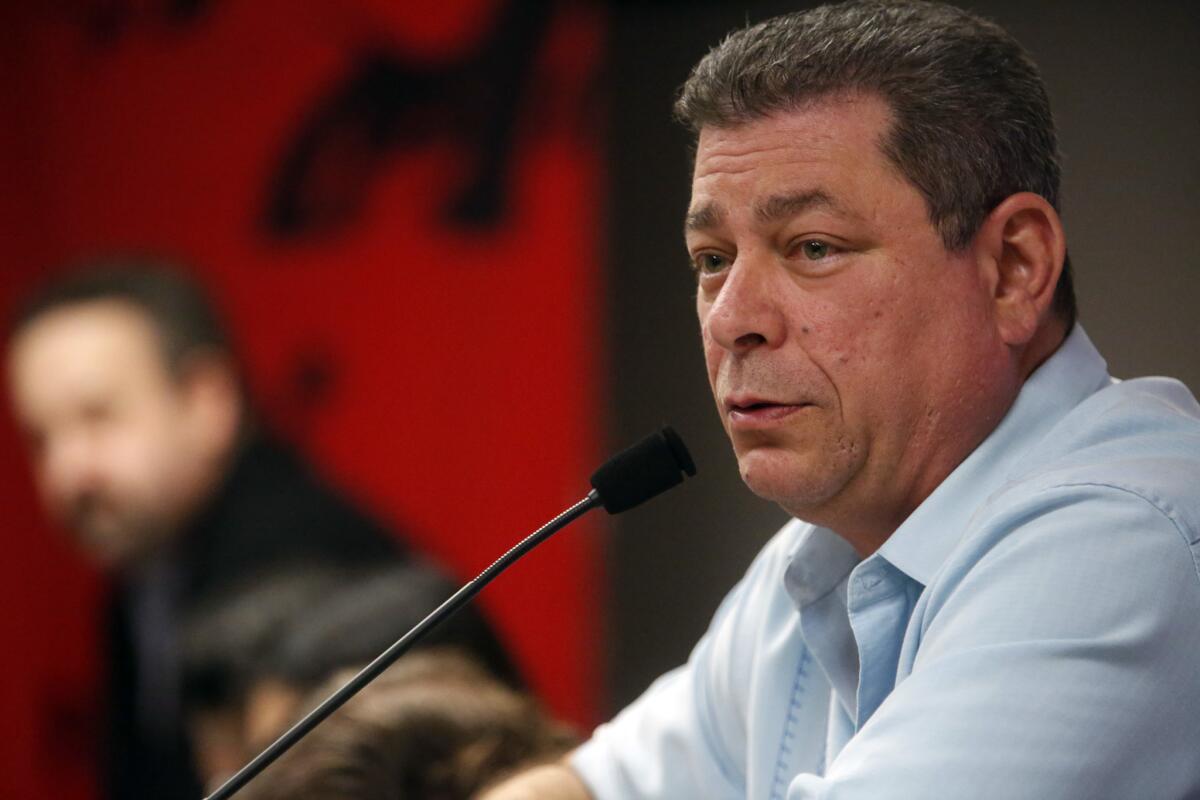
The California Democratic Party on Friday came closer to adopting a new policy that would require party leaders to fully disclose any compensation they receive to advocate for a statewide ballot initiative or candidate for state office.
The push for transparency comes after Eric Bauman, chairman of the Los Angeles County Democratic Party and a candidate for state party chair, faced criticism after his political consulting firm was paid by opponents of Proposition 61, which voters rejected on Nov. 8.
The contract has become a pivotal issue in the party’s contentious race for party chair between Bauman and Kimberly Ellis, a Democratic organizer who has become the favored candidate among many Bernie Sanders supporters.
Democratic delegates are scheduled to vote on a new party chairperson on Saturday.
Democrat Susie Shannon of Los Angeles said the new policy would show that party leaders ‚Äúare not for hire.‚ÄĚ
Bauman’s firm, Victoryland Partners in North Hollywood, received more than $100,000 from the pharmaceutical industry that opposed the statewide ballot measure. The proposition sought to lower prescription drug prices by requiring that state agencies pay no more for medicines than the federal Department of Veterans Affairs.
The measure requiring disclosure came before the rules committee at the California Democratic Party’s annual convention in Sacramento Friday, and could be adopted by party’s executive committee meeting this summer.
‚ÄúWhat is at the core of this party is transparency,‚ÄĚ said Shannon, who proposed the measure. ‚ÄúWe have a right to know when we‚Äôre being lobbied by executive board members.‚ÄĚ
Under the rule, party officers will be required to file quarterly financial disclosures that list compensation they receive working for candidates or ballot measures. All party leaders would be required to disclose those contracts when contacting party officials, including members of county central committees and other delegates.
When the proposal was first introduced at a party meeting in November, Bauman said he was ‚Äú100%‚ÄĚ in favor of the measure.
Delegates gather at the California Democratic Party convention
‚ÄėCalexit‚Äô supporters to take another shot at securing California independence

Supporters of a bid for California independence are again submitting plans for a 2018 statewide ballot measure to potentially leave the United States.
Members of the California Freedom Coalition gathered outside the state Capitol on Friday before turning in their proposed initiative to the state attorney general’s office for review.
Cindy Sheehan, who gained international attention as an anti-war protestor after her son died during the Iraq war in 2004, told the Los Angeles Times at the gathering that the state should stop subsidizing a federal government that she characterized as out of step with California values.
‚ÄúWe don‚Äôt feel like we have a say 3,000 miles away in Washington,‚ÄĚ Sheehan said.
The petition, known informally as Calexit, is the second formal bid that secessionists have made since President Trump’s election in November, though numerous organizations have attempted similar efforts over the years. Backers pulled the first initiative after substantial infighting within groups advocating for independence.
The current initiative wouldn‚Äôt necessarily result in the state exiting the country, but could allow California to be a ‚Äúfully functioning sovereign and autonomous nation‚ÄĚ within the United States.
After receiving the ballot measure, the attorney general’s office will give it a title and summary. Backers will need to collect nearly 600,000 valid voter signatures on petitions to place it on the ballot.
Gov. Jerry Brown is skipping this weekend’s California Democratic Party convention
‚ÄėAm I getting money from Russia? No,‚Äô Rep. Dana Rohrabacher says
Rep. Dana Rohrabacher laughed when a reporter from The Hill newspaper asked Friday whether he is getting paid by Russia.
‚ÄúAm I getting money from Russia? No,‚ÄĚ the Huntington Beach Republican said.
The question stemmed from a Washington Post story this week that disclosed an audio recording from last year in which House Majority Leader Kevin McCarthy (R-Bakersfield) said he thought Rohrabacher and then-candidate Donald Trump were being paid by Russian President Vladimir Putin.
A transcript of the tape notes McCarthy and others in the room were laughing, and McCarthy’s staff has said it was meant as a joke and it landed poorly.
‚ÄúThat was a joke that didn‚Äôt make it,‚ÄĚ Rohrabacher told The Hill, adding that he and McCarthy are friends.
For decades, Rohrabacher’s willingness to work with Russia has made him a bit of an outlier within the Republican Party, and people have questioned his stance repeatedly.
Rohrabacher told The Hill that McCarthy has apologized for the joke and for the attention it has caused. Rohrabacher’s Orange County district is a target for Democrats in the midterms.
And Rohrabacher’s 2018 opponents have jumped on the congressman’s longstanding friendliness toward Russia as a campaign issue, with one, Democrat Harley Rouda, even sending a letter asking the FBI to investigate.
The New York Times reported Friday that the FBI warned Rohrabacher a few years ago that Russian spies were trying to recruit him.
Rohrabacher told the New York Times that he appreciated the warning but didn’t need it.
‚ÄúAny time you meet a Russian member of their Foreign Ministry or the Russian government, you assume those people have something to do with Russian intelligence,‚ÄĚ he said.
Veterans PAC endorses Robert Lee Ahn in 34th Congressional District race
California Rep. Eric Swalwell and wife Brittany welcome a baby boy, Nelson
Rep. Eric Swalwell (D-Dublin) and his wife Brittany announced the birth of their first child Friday, a boy.
The couple named their son Eric Nelson Swalwell and plan to call him Nelson, according to the congressman’s Instagram. He was born in San Ramon, Calif. Swalwell reports that mom and baby are healthy and well.
Swalwell is serving his third term in Congress and is head of the Future Forum, a group of younger House members focused on issues millennials care about, such as student loan debt.
Swalwell is a member of the House Select Intelligence Committee and is a frequent face on cable news discussing the committee’s investigation of Russian attempts to influence the 2016 election.
Lawmakers pass budget bills in Sacramento, but they’re almost completely blank

The official record will show that the state Assembly passed all of the bills related to a new state budget on Thursday, almost a month before the constitutional deadline to do so.
But the record will also show those bills were devoid of any language related to the budget. They were, like ones passed last week by the Senate, empty legislative vessels.
As in, one-page bills with placeholder language: ‚ÄúThis bill would express the intent of the Legislature to enact statutory changes relating to the Budget Act of 2017,‚ÄĚ reads one. ‚ÄúIt is the intent of the Legislature to enact statutory changes relating to the Budget Act of 2017,‚ÄĚ reads another. That‚Äôs all that is in Assembly Bill 137 and 39 other bills that will ultimately carry the contents of a fiscal plan negotiated between Democratic lawmakers and Gov. Jerry Brown.
The process of moving ‚Äúshell‚ÄĚ bills from one house to the other is a familiar one in Sacramento, as a conference committee of both houses ultimately reviews the deal once it‚Äôs struck by leaders. But Republicans, as they have in earlier years, used Thursday‚Äôs formal vote on the empty bills to complain about their lack of a seat at the negotiating table.
‚ÄúThis is not a good thing for transparency,‚ÄĚ said Assemblyman Jay Obernolte (R-Big Bear Lake) during floor debate. He said that even if the language was later changed, the work product of months of legislative budget subcommittees should have been included in the bills.
Assemblyman Phil Ting (D-San Francisco), the chairman of the Assembly’s budget committee, rejected any accusation of keeping budget details away from public view. And he said critics are forgetting that the conference committee will vet all proposals once it convenes in early June.
‚ÄúThey clearly are averse to watching the hundreds of hours that we have‚ÄĚ of testimony, Ting said.
Lawmakers must send a budget to Brown, who offered his revised plans last week, by June 15.
California Democrats are huddling in Sacramento this weekend. Here‚Äôs the lineup for plotters of ‚Äėthe resistance‚Äô

Thousands of California‚Äôs Democratic activists, party leaders and others on the front lines of the ‚Äúresistance‚ÄĚ against President Trump are gathering in Sacramento this weekend for their spring convention.
The annual confab, which runs Friday to Sunday, is expected to help chart the course for one of the nation’s most influential state political parties at a time when California seeks to be a liberal bulwark against the Trump administration.
Top candidates in the 2018 governor’s race are expected to make the rounds during the convention, courting support with free booze and star-studded parties.
Democratic National Committee Chairman Tom Perez is expected to address party faithful Friday evening, while Rep. Adam Schiff is to speak at a dinner Saturday night. House Minority Leader Nancy Pelosi and Sen. Kamala Harris are also scheduled to make appearances.
Delegates are set to vote for their top party leaders, weighing in on the contentious battle between Kimberly Ellis and Eric Bauman for state party chair, a race that’s been characterized as old school versus new school. They’ll also be weighing in on a slate of rules and party resolutions, including one that seeks to curb the amount of corporate money flowing to state party coffers.
The crowd will include a new coalition of left-leaning party activists, many of whom won delegate seats with slates of progressive candidates earlier this year.
You can follow all the latest updates from the convention here.
Controller Betty Yee makes her pick for state Democratic Party chair
Majority vote on cap and trade? No, thank you, governor’s office says
Gov. Jerry Brown’s top advisor says he won’t accept anything less than a two-thirds vote to extend California’s cap-and-trade program for reducing greenhouse gas emissions.
The higher threshold is needed to insulate the program from legal challenges.
The tweet came in response to an earlier story from The Times that discussed how some lawmakers were considering pushing forward with only a majority vote, which could make it easier to reach a deal but would leave the program vulnerable to legal challenges.
Brown wants to solidify cap and trade before leaving office, and he’s been pushing to close the deal in the next month.
NRA files second lawsuit challenging state gun laws, this time targeting ban on high-capacity magazines
A coalition including the National Rifle Assn. on Thursday filed a second lawsuit challenging California’s new gun laws, this time arguing a ban on high-capacity ammunition magazines is unconstitutional.
NRA attorneys representing the California Rifle and Pistol Assn., the group’s state affiliate, filed the lawsuit in federal court in San Diego, maintaining that the law banning possession of magazines holding more than 10 rounds of ammunition violates the due process and takings clauses of the U.S. Constitution.
‚ÄúLegislators in California routinely enact laws that only affect the law-abiding and do nothing to enhance public safety,‚ÄĚ said Chris Cox, executive director of the NRA‚Äôs Institute for Legislative Action. ‚ÄúThis lawsuit, and others that will follow, is an effort to ensure the rights of law-abiding gun owners are respected in California.‚ÄĚ
Last month, the NRA and affiliated groups filed a lawsuit challenging another new law that bans the sale of semiautomatic rifles with bullet buttons that allow, with a tool, the removal and replacement of the magazine.
The new gun laws were approved last year by the Legislature and governor in response to the 2015 San Bernardino mass shooting. Voters in November approved a ban on the magazines when they passed Proposition 63.
The lawsuit cites a section of the Constitution that says the government shall not take private property without just compensation. It also argued that, because the magazines have been purchased legally for years, it is a violation of due process to now take them without the owner having recourse.
‚ÄúBanning magazines over 10 rounds is no more likely to reduce criminal abuse of guns than banning high horsepower engines is likely to reduce criminal abuse of automobiles,‚ÄĚ the lawsuit says.
Lt. Gov. Gavin Newsom, the leading backer of Proposition 63, said the legal challenge would fail.
‚ÄúThe people of California have already spoken loudly and they resoundingly rejected the NRA‚Äôs deceitful agenda. And federal courts have already spoken, in favor of public safety by restricting large capacity magazines,‚ÄĚ Newsom said.
A new question on California’s cap-and-trade program -- how many votes are needed to keep it going?
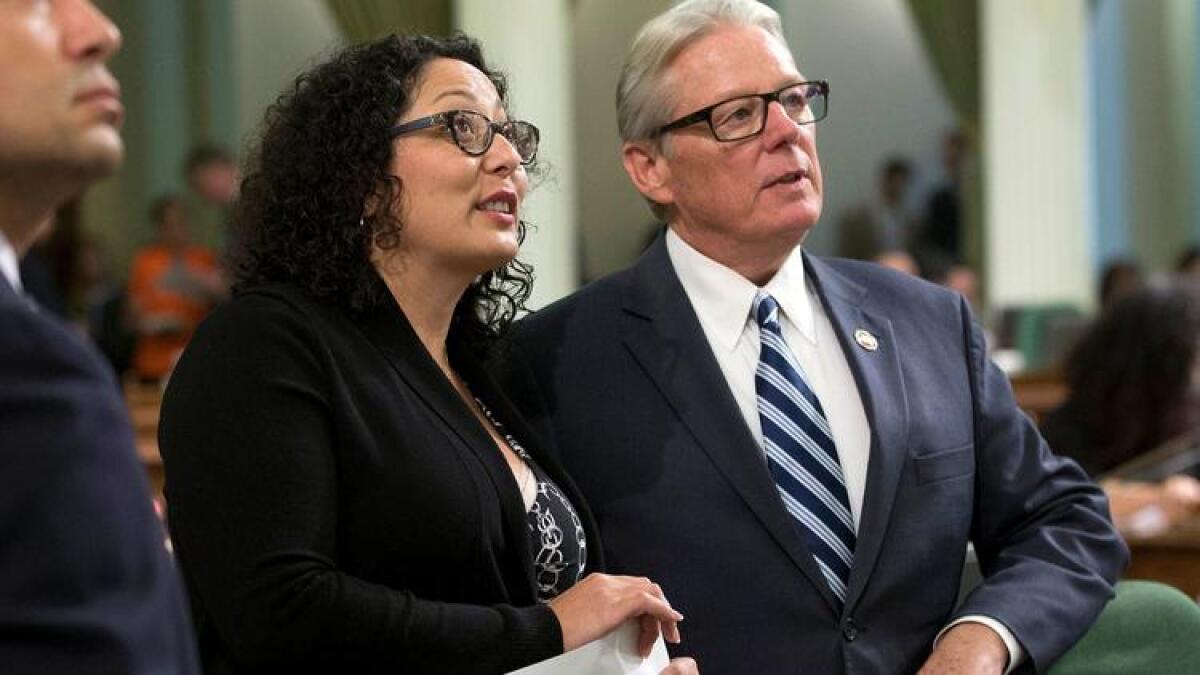
For most of the debate in Sacramento over extending California’s cap-and-trade program, the goal has been reaching a two-thirds vote in both houses of the Legislature to get the job done.
That’s the target set by Gov. Jerry Brown and the threshold that nonpartisan legislative analysts believe would insulate the program from legal challenges.
However, there’s increasing interest among some key lawmakers in requiring only a majority vote. That would lower the political hurdles to reaching an agreement but leave one of the state’s most important efforts on climate change vulnerable to lawsuits.
The issue was raised again this week by Assemblywoman Cristina Garcia (D-Bell Gardens), one of the lawmakers working on the issue. A recent state appeals court decision suggests ‚Äúwe only need 41 votes [in the 80-member Assembly] to continue with cap and trade,‚ÄĚ she said during a Wednesday committee hearing.
It’s a controversial stance shared by Assembly Speaker Anthony Rendon (D-Paramount) but one that concerns Senate leader Kevin de León (D-Los Angeles). The debate over how many votes are needed is a reminder that the future of cap and trade, which requires companies to buy permits to release greenhouse gas emissions, is closely tied to California’s intricate rules on taxes.
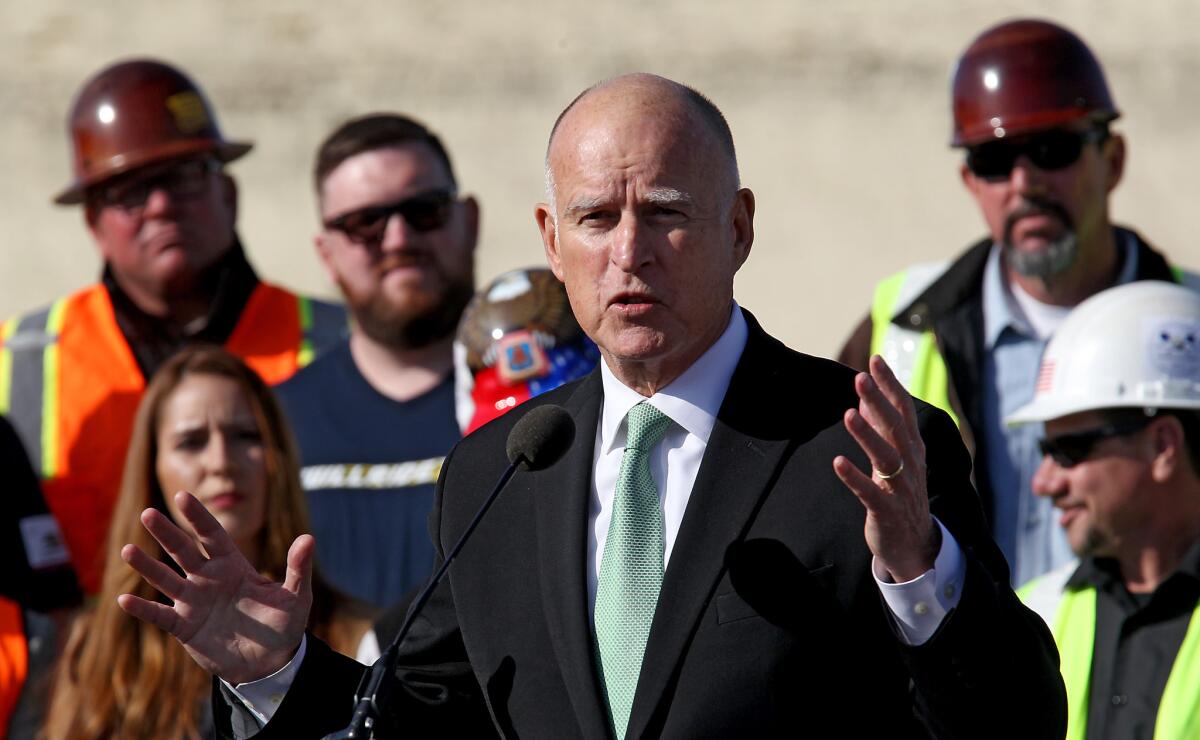
The program wasn’t launched with the two-thirds legislative vote required by Proposition 13 to raise new revenue, and business groups have spent years accusing the state of enacting an unconstitutional tax.
A state appeals court rejected that argument last month. Supporters hope the decision may be broad enough to protect cap and trade from future lawsuits stemming from Proposition 26, a more recent ballot initiative that further tightened tax rules.
An appeal is pending before the California Supreme Court, and some environmental advocates fear years of litigation that could harm the state’s efforts to reduce greenhouse gas emissions.
‚ÄúLegal uncertainty can act as a real barrier if it‚Äôs not resolved,‚ÄĚ said Alex Jackson, a San Francisco-based lawyer for the Natural Resources Defense Council.
Figuring out the next move is a balancing act. Although it’s widely acknowledged that getting a two-thirds vote would be better for cap and trade’s future, it’s more difficult coming so soon after a tight vote to raise gas taxes for road repairs.
That deal was reached only after Brown and legislative leaders cut side deals to win over key lawmakers with nearly $1 billion in funding for projects in their districts.
Deciding whether to push for a two-thirds vote is ‚Äúgoing to be a risk-reward calculation,‚ÄĚ according to a source with knowledge of the deliberations.
California pot czar expects lag time for testing newly legal weed
With businesses expected to get state licenses in January to sell marijuana in California, the top regulator said Thursday that they will be given up to six months to comply with a requirement the pot be thoroughly tested by a licensed laboratory.
State pot czar Lori Ajax said it may take months for enough testing labs to be properly screened and licensed to handle the supply of marijuana expected to be sold in California starting next year. In addition, many existing medical marijuana dispensaries will have untested supplies when licensing begins, she said.
As a result, dispensaries and shops that can’t get testing that complies with state standards will be allowed to continue selling products for up to six months as long as they are labeled untested, Ajax said during a conference on marijuana sponsored by Capitol Weekly in Sacramento.
‚ÄúDay one we are not going to have all the testing labs licensed at once, and they are going to need time to get all their testing procedures in place to test under the very stringent requirements we have in the regulations,‚ÄĚ Ajax said.
In addition, she said some testing labs will have to be issued provisional licenses to operate while they go through an 18-month process of being certified by a joint technical committee of the International Organization for Standardization and the International Electrotechnical Commission.
‚ÄúWe don‚Äôt want everything to come to a screeching halt when we start issuing [sales] licenses,‚ÄĚ Ajax said. ‚ÄúWe want to make sure that supply chain still flows.‚Äô‚Äô
Garcetti dismisses speculation about a run for higher office -- mostly
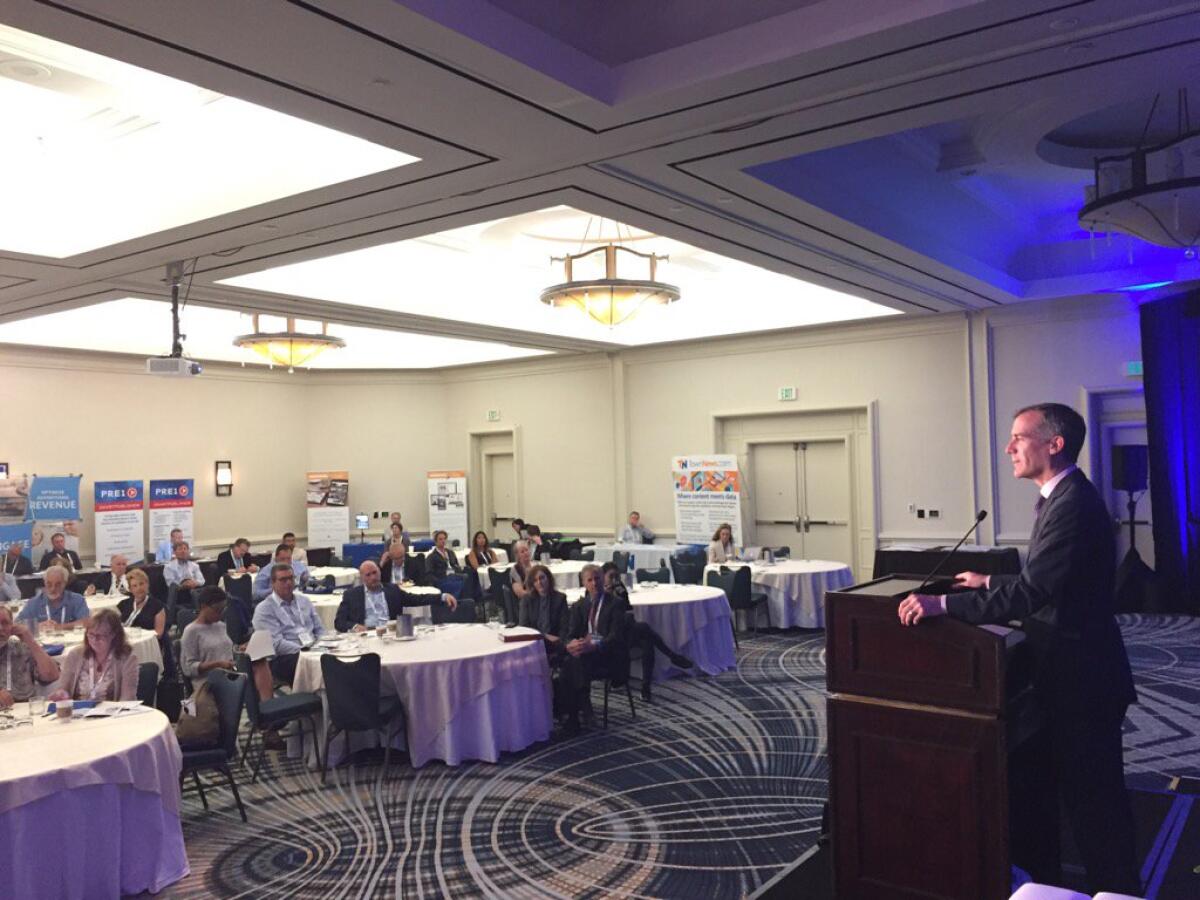
Los Angeles Mayor Eric Garcetti on Thursday sidestepped questions about a possible run for governor ‚ÄĒ or any other higher political office ‚ÄĒ but didn‚Äôt totally dismiss the idea.
Garcetti, speaking to the California Newspaper Publishers Assn. meeting in Santa Monica, said he’s focused on his job at City Hall, and reminded the audience that he has yet to be officially sworn in for his second term as mayor.
The mayor was dismissive of elective officials he dubbed ‚Äúlilypad politician[s]‚ÄĚ ‚ÄĒ always having an eye on a higher political office to jump to. Garcetti described himself as a politician who ‚Äúputs on waders‚ÄĚ and hunkers down.
‚ÄúI have a truly amazing job that I love,‚ÄĚ Garcetti said. Still, he added, he‚Äôs not going to ‚Äúclose anything off.‚ÄĚ
Garcetti praised three of the current Democrats already in the 2018 governor‚Äôs race ‚ÄĒ state Treasurer John Chiang, Lt. Gov. Gavin Newsom and former Los Angeles Mayor Antonio Villaraigosa.
‚ÄúI feel, politically, California is going to be OK,‚ÄĚ Garcetti said. ‚ÄúThey‚Äôre going to do the right things. Their policies are aligned with mine. ... I‚Äôm not worried about California, I‚Äôm worried about the country.‚ÄĚ
Garcetti also appeared to throw cold water on a New York Times story that he‚Äôs been approached by ‚Äúmajor donors‚ÄĚ about a bid for the White House in 2020.
He said that while people may be chattering about it, he‚Äôs never had a ‚Äúserious sit-down conversation with national donors saying, ‚ÄėPlease run.‚Äô‚ÄĚ
On Saturday, Garcetti is scheduled to speak at the California Democratic Party convention in Sacramento.
Democrats eyeing Orange County congressional seats in 2018
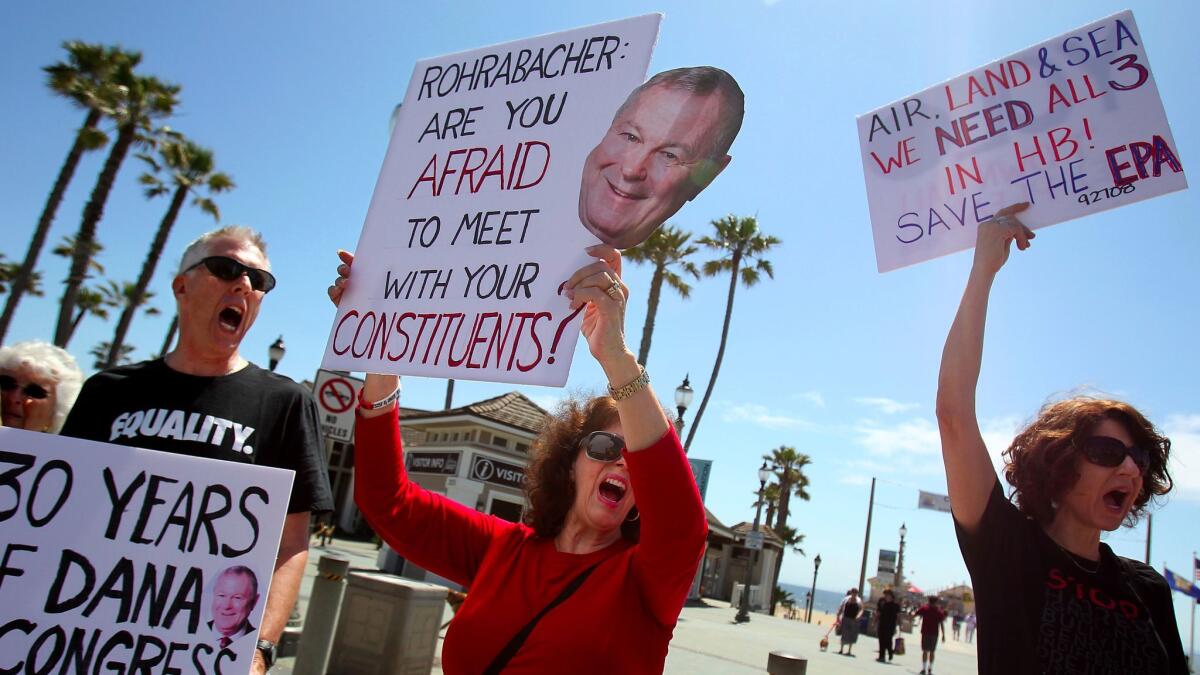
Newly energized residents are giving Democrats hope they can claim at least some of the congressional seats in Orange County that have been red for a generation.
More than a dozen resistance groups have formed in Orange County since the presidential election. They’ve demanded meetings with the four Republican members of Congress, and staged town halls in their name when the members decline. They’ve delivered petitions and Valentines and even protested outside the members’ homes. Most Tuesdays, at least a few dozen people show up with signs outside district offices (some of which they’ve been told they can no longer enter).
Despite the vocal optimism from activists and local dissatisfaction with Trump, it will be an uphill battle for Democrats to flip the four heavily Republican congressional districts in Orange County, all but one of which the incumbent won in 2016 by double digits.
California lawmakers seek to ban marijuana oil processing labs from neighborhoods
Alarmed by several explosions in residential areas caused by drug processing labs, the state Assembly on Thursday voted to ban home manufacturing of marijuana concentrates using volatile solvents.
The action comes ahead of plans by the state to begin issuing licenses in January to firms for the manufacture and sale of marijuana products in California.
‚ÄúAs California comes to terms with newly legalized recreational cannabis, we must continue to protect public safety and keep these potentially explosive extractors out of residential neighborhoods,‚ÄĚ Marc Steinorth (R-Rancho Cucamonga) told his colleagues during the floor discussion.
The concentrate, often referred to as ‚Äúhash oil‚ÄĚ or ‚Äúhoney oil,‚ÄĚ is manufactured through extraction with a solvent. Explosions can occur when butane that extracts the oil from marijuana fails to dissipate, builds up in an enclosed space and is ignited when it comes in contact with a spark.
Steinorth cited a recent explosion at a drug lab in San Bernardino County in a house across the street from a middle school.
The measure, which next goes to the Senate for consideration, would ban the use of the volatile solvents and require those making hash oils and other cannabis concentrates to get a special permit.
Sen. Kevin de Léon of L.A. says no announcement imminent on potential run for higher office
Senate supports loosening sentencing mandate for gun crimes

The state Senate approved a measure Thursday that could loosen sentencing for gun crimes.
Current law says anyone who uses a gun in committing a felony must have their sentence increased by 10 years or more in prison on top of the penalty for the felony. The proposal is to lift that mandate.
Sen. Steven Bradford (D-Gardena) said he introduced the bill after a 17-year-old riding in a car involved in a drive-by shooting was sentenced to 25 years in prison even though he denied shooting the gun.
The judge said his hands were tied and he had to impose the longer sentence, Bradford said, and he wants to give judges the power to decide if cases require an enhanced sentence.
Sen. Holly Mitchell (D-Los Angeles) supported the measure, saying judges ‚Äúwill be empowered to make their decision on a case-by-case basis.‚ÄĚ
It passed 22-14 with all of the support from Democrats. Republicans and a few Democrats opposed the bill or withheld their votes. SB 620 next goes to the Assembly for consideration.
State Sen. Joel Anderson (R-San Diego) said the Legislature would be soft on crime if it passes such a law. ‚ÄúOur constituents deserve better from us than encouraging people to use guns in the commission of a crime,‚ÄĚ he said.
Lawmakers try again to sway Gov. Jerry Brown on more jail visits for families
State lawmakers on Wednesday voted in favor of crafting a budget proposal that would require all but eight California county jails to provide spaces for inmates to visit their families in person.
In a 4-0 bipartisan vote, members of an Assembly subcommittee agreed to make the legislative demand in budget negotiations with Gov. Jerry Brown, even after he vetoed similar efforts in a bipartisan bill last year.
Over the last five years, an increasing number of jails and prisons across California and nationwide have moved to offer Skype-like video visits through phone and computer screens. Some jails have used the video systems to replace on-site meetings that have traditionally occurred face to face through a glass window.
Sheriffs say the move reduces costs, cuts back on contraband trafficking and increases public safety. Prison advocates and lawyers counter there is no evidence that attests to those benefits.
Lawmakers first took up the issue this year in a joint February hearing between public safety committees in the Senate and Assembly.
On Wednesday, the Assembly Subcommittee on Public Safety agreed to create a proposal that would prohibit counties from charging for video visitation and require them to make space for visitations in person. The eight exempted facilities would be required to provide the option within five years of passage of the 2017 budget.
Republicans and Democrats in California’s congressional delegation praise special counsel pick Robert Mueller
Democrats and Republicans in California’s congressional delegation praised former FBI Director Robert S. Mueller III as the right pick to serve as special counsel for the investigation into Russian interference in the 2016 election and what the Trump campaign may have known.
Here is more about who Mueller is, and what the California members of Congress are saying about the pick:
- ‚ÄúRobert Mueller is the right man to lead this investigation. He‚Äôs a strong, independent leader who built an impeccable reputation over decades in law enforcement. And as special counsel, I‚Äôm confident he‚Äôll pursue the facts ‚ÄĒ wherever they may lead,‚ÄĚ House Foreign Affairs Committee Chairman Ed Royce (R-Fullerton) said in a statement.
- Rep. Devin Nunes (R-Tulare), who had to step away from the House investigation, said in a statement that it was the ‚Äúright decision at the right time, and the right man was chosen for the job.‚ÄĚ
- The ranking Democrat on the Intelligence Committee, Rep. Adam B. Schiff (D-Burbank), said Mueller ‚Äúhas a superb reputation as the director of the FBI. He‚Äôs well thought of on both sides of the aisle so I think it was a really solid choice.‚ÄĚ
- Rep. Eric Swalwell (D-Dublin), a member of the Intelligence Committee, said, ‚ÄúWhatever he arrives at, whether it‚Äôs clearing the people that are under investigation or holding them to account, I think it‚Äôll be trusted by the American people.‚ÄĚ
- ‚ÄúIt‚Äôs the first moment of relief, that I feel that our democracy is safe. I was very anguished that we were in a downward spiral that was going to have profound effects on our democracy. Robert Mueller has sterling credentials,‚ÄĚ said Rep. Jackie Speier (D-Hillsborough), who also serves on the Intelligence Committee. ‚ÄúI am deeply relieved.‚ÄĚ
- One of the House‚Äôs most vocal Trump critics, Rep. Maxine Waters (D-Los Angeles), said the appointment of a special counsel brings ‚Äúmovement‚ÄĚ to the ongoing House and Senate investigations. ‚ÄúI want to understand what his role is and whether or not he has any boundaries and what has been the agreement about what he will do and how he will do it,‚ÄĚ she said.
- ‚ÄúIt‚Äôs time to get to the bottom of this,‚ÄĚ said Rep. Darrell Issa (R-Vista), the first Republican to call for a special counsel. ‚ÄúAmericans deserve nothing less than the truth. I have faith that Robert Mueller will provide the independence necessary to be sure this investigation is conducted with the trust and confidence of the American people.‚ÄĚ
House Majority Leader Kevin McCarthy in 2016: ‚ÄėThere‚Äôs two people I think Putin pays: Rohrabacher and Trump‚Äô
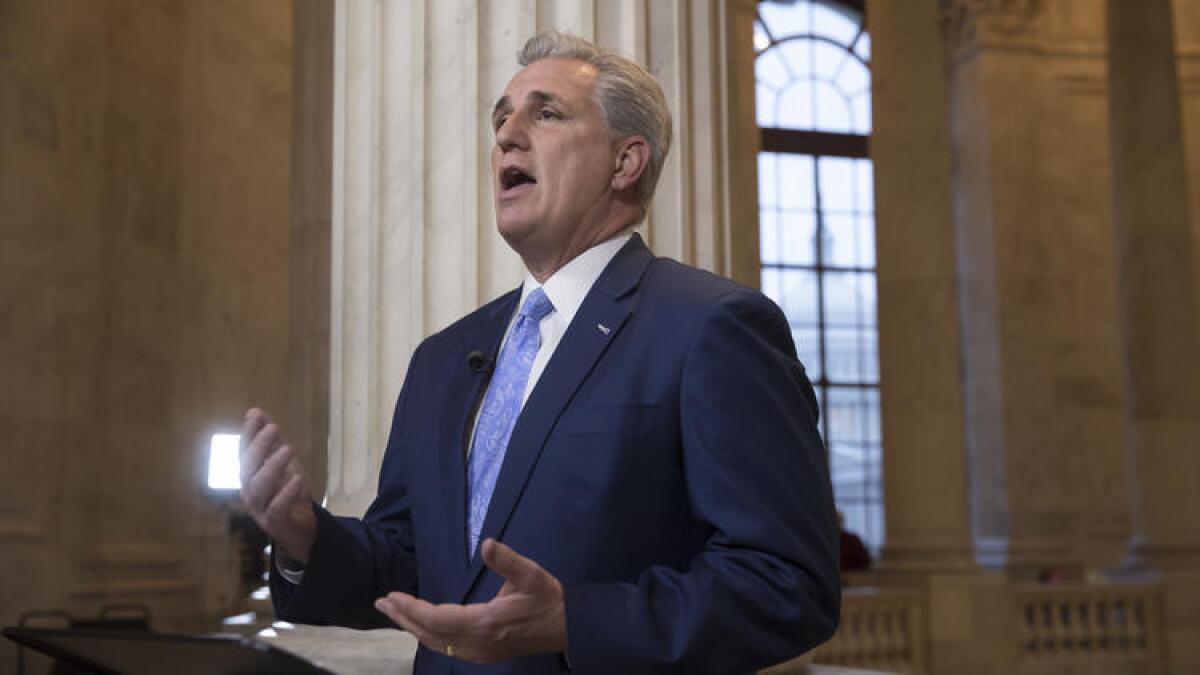
In a private meeting with Republican colleagues last year, House Majority Leader Kevin McCarthy commented that then-presidential candidate Donald Trump and California congressional colleague Rep. Dana Rohrabacher (R-Huntington Beach) were being paid by Russian President Vladimir Putin.
‚ÄúThere‚Äôs two people I think Putin pays: Rohrabacher and Trump,‚ÄĚ McCarthy said in the recording of a June 15 exchange obtained and published by the Washington Post. At that point, House Speaker Paul D. Ryan (R-Wis.) cut off the conversation and swore those present to secrecy.
The Post also provided a full transcript of the tape.
McCarthy’s and Ryan’s offices quickly pushed back on the story, stressing that the premise of the tape was misconstrued in reporters’ questions, and that McCarthy was joking.
The transcript of the tape repeatedly notes laughter, and that McCarthy was laughing.
Rohrabacher’s long-standing friendliness toward Russia has been a source of confusion in Washington for years.
Rohrabacher‚Äôs spokesman Ken Grubbs told the Post that the congressman has been a consistent advocate of ‚Äúworking closer with the Russians to combat radical Islamism. The congressman doesn‚Äôt need to be paid to come to such a necessary conclusion.‚ÄĚ
One of Rohrabacher’s 2018 challengers, Harley Rouda, quickly said that the FBI should investigate what ties the congressman has to Russia. Rouda’s campaign said he would be sending a letter to the Los Angeles field office of the FBI on Thursday as a concerned citizen.
Bill to undo 1950s law that makes membership in Communist Party a fireable offense for state work is shelved
California budget panel seeks new limits on state tax board funding and staffing
Amid concern over management problems at California’s state tax board, a legislative panel recommended Wednesday that next year’s budget scale back an expansion of the agency’s staff and supported limits on the budgets of each of the four board members.
The panel noted the state Board of Equalization has 600 vacant positions, so it recommended to cut in half a proposal for 134 new positions in the budget for the fiscal year beginning July 1. BOE officials agreed to the scaling back of the proposal.
‚ÄúIt would seem from the controversies at the BOE that there are a number of excess positions there,‚ÄĚ said Assemblyman Travis Allen (R-Huntington Beach), a member of the Assembly Budget Subcommittee on State Administration.
Allen noted a recent state Department of Finance audit found the board could not consistently explain why it allocated millions of tax dollars to the wrong state accounts.
‚ÄúClearly there is some incompetency at the BOE,‚ÄĚ Allen said.
The legislative panel also established strict budget line items for the four elected members of the board after an audit found members had improperly supplemented their district staffs by reassigning tax collectors from the headquarters.
Assemblyman David Chiu (D-San Francisco) called the problems found by the audit ‚Äúsignificant lapses‚ÄĚ and said the recommended change is ‚Äúa major step in addressing some of the concerns we have seen.‚ÄĚ
Free booze and celebrity appearances: How candidates for governor will court California Democrats this weekend
Top candidates to replace termed-out Gov. Jerry Brown will gather at the California Democratic Party’s annual convention later this week, giving the most crucial speeches of their campaigns to date, courting activists and wooing donors and powerful party leaders.
Lt. Gov. Gavin Newsom, former Los Angeles Mayor Antonio Villaraigosa, Treasurer John Chiang and former state schools chief Delaine Eastin will each address thousands of delegates and guests on Saturday in Sacramento. Though the candidates are well-known among Democratic insiders, the speeches mark the first time the four of them will address the same influential crowd ‚ÄĒ a critical benchmark in the 2018 gubernatorial race.
They will also court the party faithful with food, drinks and parties. Chiang is co-hosting a ‚ÄúUnited for California‚ÄĚ late-night reception on Saturday. Newsom is headlining a street party featuring rapper Common and DJ Jazzy Jeff the same night, as well as a couple of gatherings earlier in the day.
Political leaders who are potentially eyeing runs for higher office will also be out in full force.
In advance of the three-day meeting, state Senate leader Kevin de León emailed delegates a sharply produced video about the importance of California as a liberal bulwark during President Trump’s tenure.
De Le√≥n, who is termed out next year and has been the focus of widespread speculation that he plans to mount a gubernatorial bid, is also addressing the delegates. He will be honored at a ‚ÄúNasty Women and Bad Hombres‚ÄĚ party that will feature DJ Samantha Ronson Friday night.
Advisors did not rule out a run, but said De León was focused on his current job.
Billionaire environmentalist activist Tom Steyer, also the subject of rumors that he is polling about his prospects in a potential run for governor, will also address the convention. His NextGen Climate group will hand out breakfast burritos to delegates.
A political advisor to Steyer declined to confirm or deny the polling rumors.
‚ÄúIt‚Äôs no secret that Tom Steyer is considering running for office, and he‚Äôll make a decision later this year,‚ÄĚ Rose Kapolczynski said. ‚ÄúWe aren‚Äôt going to discuss our research program in the news media.‚ÄĚ
Other political leaders who have been the focus of speculation, such as Los Angeles Mayor Eric Garcetti and Secretary of State Alex Padilla, also plan to greet delegates.
‚ÄėNow is the time for courage‚Äô: Democratic Rep. Scott Peters makes personal appeal to Republicans
Rep. Scott Peters (D-San Diego) is making a personal plea to every Republican in Congress in the form of a letter asking them join Democrats and create an independent, nonpartisan commission to look at Russia’s attempts to influence the 2016 election.
House Republican leaders have largely said that existing oversight and investigatory committees are sufficient to look at the issue, but ongoing controversy spilling from the White House, including allegations that President Trump asked the FBI to drop the investigation, has made some rank-and-file Republicans leery.
Peters, who is considered one of the most moderate members of Congress, said he’s hoping that a direct invitation can sway those thinking about an independent committee.
‚ÄúIt‚Äôs easy to send tweets, but I think it‚Äôs also important to reach out and try to give someone the consideration I would hope they would give me,‚ÄĚ he said. ‚ÄúI mean it to be a sign of respect toward my Republican colleagues. I think this is a most direct and respectful way to ask for their help and for their alliance.‚ÄĚ
Democrats want a vote on legislation sponsored by Reps. Eric Swalwell (D-Dublin) and Elijah E. Cummings (D-Md.) to create a 12-person panel evenly divided between Republicans and Democrats to investigate attempts by the Russian government, or by people in Russia, to influence the election. The bill is supported by every member of the House Democratic Caucus, but just two Republicans.
Starting today, Democrats are using a procedural maneuver to try to ‚Äúdischarge‚ÄĚ the legislation from the House Foreign Affairs Committee ‚ÄĒ where it has languished since the day it was filed ‚ÄĒ and bring it to the floor for a vote.
To do that, 218 members would have to sign a petition, and because Democrats are in the minority, they can’t get to that number without Republican help. As of Wednesday afternoon, 115 House members had signed the petition. (The roll call of who has signed is posted online here.)
Swalwell has extensively lobbied Republicans to join the effort, including personally speaking with many GOP House members who he said have voiced concerns about what they are learning about Russia.
‚ÄúWe just want a through investigation,‚ÄĚ Swalwell said. ‚ÄúI just hope that their concern moves from tweets and statements to putting their pen to paper and signing this discharge petition, because that‚Äôs ultimately what this is going to take.‚ÄĚ
The House and Senate Intelligence committees are both investigating Russian attempts to influence the election and what, if anything, the Trump campaign knew, and Peters said those investigations should continue. But assembling an independent panel of experts to review what happened and make recommendations would give members of Congress the opportunity to focus on other pressing concerns rather than just reacting to the news of the day. (Here’s how Congress is responding to the news that Trump might have asked former FBI Director James Comey to drop the investigation of Michael Flynn.)
‚ÄúAll this talk of Trump and Russia is getting in the way of us doing our jobs here in terms of tax and infrastructure,‚ÄĚ Peters said. ‚ÄúWe all agree they need attention, let‚Äôs get working on those.‚ÄĚ
California state legislator introduces resolution calling for Trump’s resignation or impeachment
The California Legislature has readily embraced its status as vanguard of the ‚Äúresistance‚ÄĚ against President Trump. Now, a Silicon Valley Democrat is ramping up that opposition with a formal measure calling for Trump‚Äôs removal from office.
Assemblyman Evan Low (D-Campbell) introduced a resolution on Wednesday asking the president to resign from office ‚ÄĒ and if he doesn‚Äôt, calling on Congress to impeach him.
The nonbinding measure would not have the force of law, as only Congress has the authority to undertake impeachment proceedings. Low said he was compelled to introduce the provocative, if symbolic, measure in the wake of a series of controversies facing Trump in the last week, including the firing of James B. Comey as FBI director and recent reports that Comey documented in a memo a request by Trump to halt the investigation into his former national security adviser, Michael Flynn.
‚ÄúWe can‚Äôt wait any longer for the next shoe to drop,‚ÄĚ Low said in an interview.
The resolution, AJR 17, details a laundry list of actions that Trump detractors call inappropriate, from the president’s continued entanglements in his business dealings to allegations that he disclosed highly classified information to Russian officials.
Low initially drafted the bill months ago, but said it was the Comey firing that inspired him to finally submit the measure.
Since Trump‚Äôs election, state legislators have often acted in ways seen as direct knocks to Trump, either through legislation, such as the so-called ‚Äúsanctuary state‚ÄĚ bill meant to blunt the president‚Äôs immigration enforcement, or resolutions. Earlier this week, a resolution by Low to abolish the Electoral College was approved by the Assembly.
The new resolution comes as national Democrats are increasingly speaking openly about impeachment, although that decision lies with the Republicans who control Congress.
California Democrats have been eager to jab at the president, but some have signaled a weariness with constantly talking about Trump.
‚ÄúI don‚Äôt think we should react to everything he does,‚ÄĚ Assembly Speaker Anthony Rendon (D-Paramount) said in an interview last week.
Low acknowledged that tension, saying, ‚ÄúThere are many issues that affect individuals in their daily lives. At the same time, we have an obligation to our country and it‚Äôs important... to call it as we see it.‚ÄĚ
Low said he also grappled with how his measure could worsen California’s already tense relationship with the federal government.
‚ÄúI‚Äôm always concerned about unintended consequences and the negative ramifications that can occur from this, which is why for me this took great pause and thought,‚ÄĚ he said. ‚ÄúBut... this is why it‚Äôs country over politics.‚ÄĚ
UC Board of Regents begins discussion of critical audit during two-day meeting
Republican Rep. Darrell Issa denies he flipped off reporter over Trump question
Capitol Hill reporters commonly snag members of Congress for quotes as they walk into the House or Senate chamber.
But after months of being asked to respond to news coming out of the White House, many Republican lawmakers are losing their patience.
The New York Times reported Tuesday that President Trump asked then-FBI Director James B. Comey in mid-February to end the bureau’s investigation into ousted national security advisor Michael Flynn.
It published the story shortly before the House voted, the first time many lawmakers were approachable after a weeklong recess. Many Republicans ducked or evaded reporters to avoid answering questions. Several had pressing phone calls to keep them from having to acknowledge the crush of correspondents waiting in the hallways.
Longtime Capitol Hill reporter Rachael Bade of Politico was among the throngs and reported this exchange:
Issa quickly took to Twitter to dispute her version of what happened.
Issa, who narrowly won reelection in November over Democrat Doug Applegate and whose district picked Hillary Clinton for president, is considered one of the more vulnerable incumbents in Congress. His announced opponents immediately began trying to raise money off the situation.
‚ÄúIt just didn‚Äôt happen. There must have been some sort of misunderstanding, but I mean, Darrell isn‚Äôt new. This isn‚Äôt something he‚Äôd do,‚ÄĚ his spokesman Calvin Moore told The Times.
L.A. Times editorial board endorses Jimmy Gomez in second round of L.A.’s congressional race
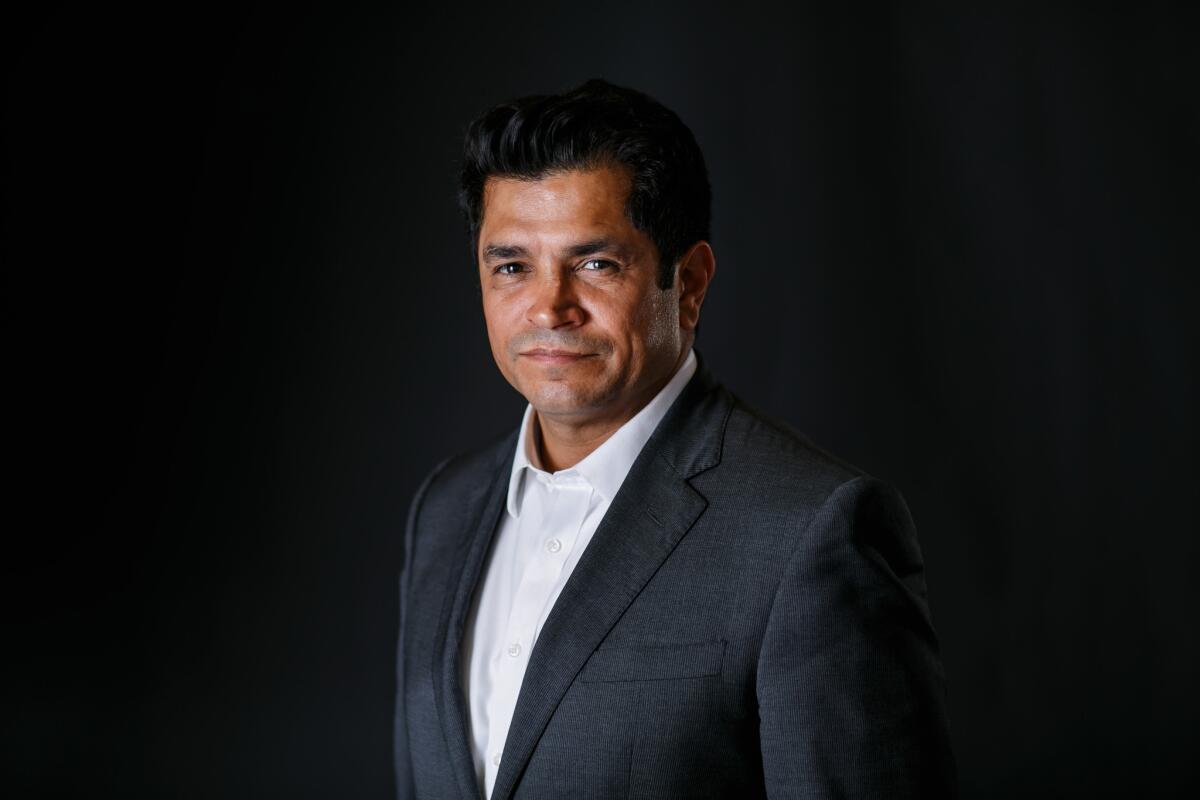
The Los Angeles Times editorial board has endorsed Assemblyman Jimmy Gomez in the June 6 runoff to replace Xavier Becerra in Congress.
The Times’ previous pick, affordable housing advocate Maria Cabildo, came in third during the crowded April primary.
Read the full endorsement here.
What have California’s members of Congress said about reports that Trump asked Comey to end Flynn inquiry?
The New York Times reported Tuesday that President Trump met with then-FBI Director James B. Comey in mid-February and asked him to end the bureau’s investigation into ousted national security advisor Michael Flynn.
The Times is keeping track of how politicians have responded to the news here, where you can see which members of California’s congressional delegation have spoken out about today’s developments.
The page will be updated as lawmakers make statements. Have you seen one that we’ve missed? Send us an email.
Panel delays vote on pay raises for California’s governor and legislators
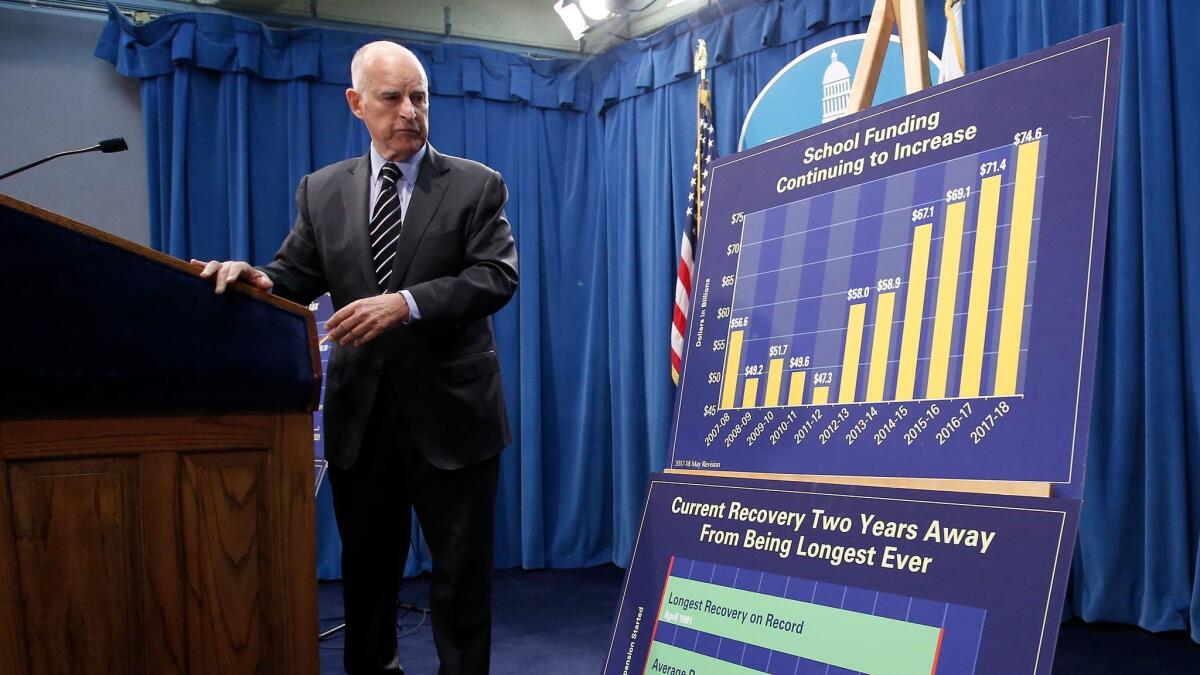
The state panel that gives annual pay raises to the governor and legislators has canceled its meeting set for Wednesday because Gov. Jerry Brown has not filled four of the seven seats on the panel, leaving it without a quorum, officials said.
The governor appoints the members of the California Citizens Compensation Commission, which sets elected officials’ salaries and was created in 1990 through the voters’ passage of Proposition 112.
However, the panel recently lost its chairman and fourth member, labor leader Tom Dalzell, when his term expired, and Brown has not filled any of the vacancies. Joe DeAnda, a spokesman for the panel, said the meeting will be reset during the coming weeks. Aides to Brown declined to comment.
The panel is required to meet by June 30 of each year to decide what changes to make, if any, for the following December.
Assemblywoman asks Atty. Gen. Xavier Becerra to drop electioneering prosecution of 86-year-old activist
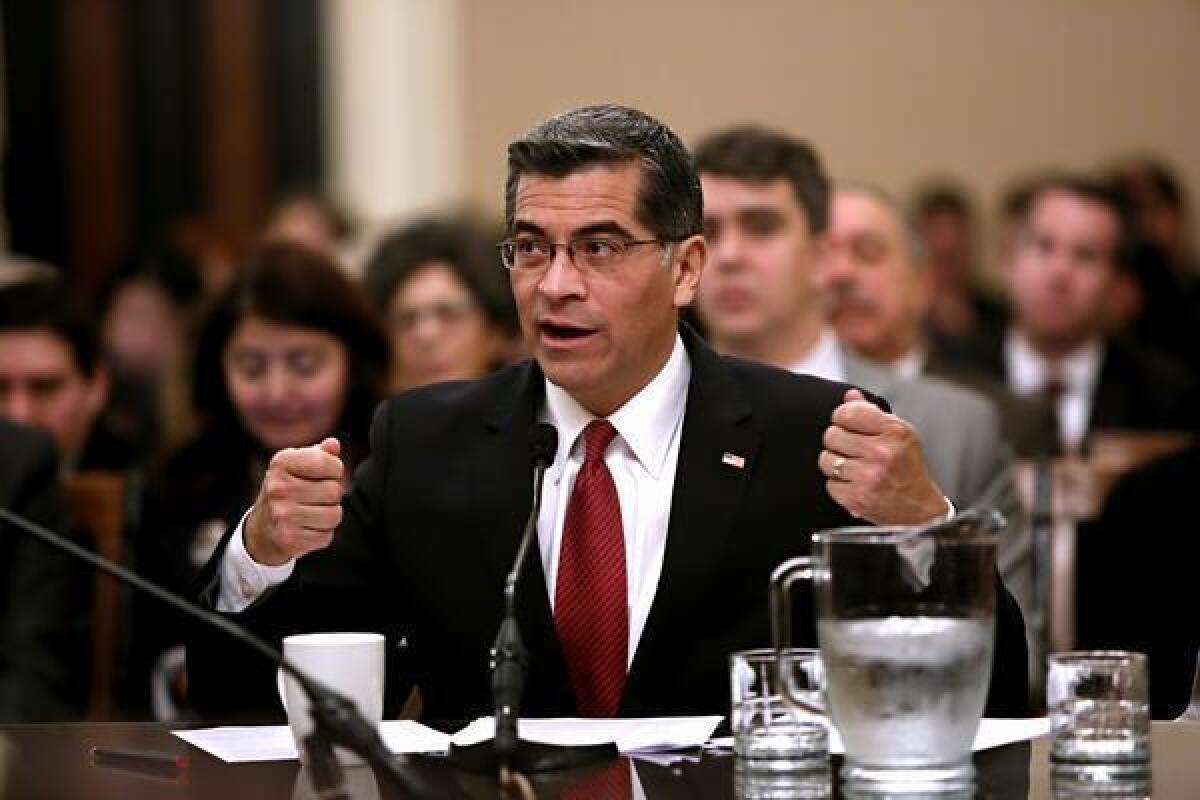
Assemblywoman Melissa Melendez (R-Lake Elsinore) called Tuesday for state Atty. Gen. Xavier Becerra to drop the prosecution of an 86-year-old Republican activist for electioneering after the woman was videotaped allegedly making calls to voters within 100 feet of a polling place.
The attorney general’s office has filed two misdemeanor charges of electioneering against Edith Knight of Atascadero for actions during the June 7 presidential primary election. Knight is a delegate to the California Republican Party.
‚ÄúI urge you, as Attorney General, to focus on issues that will benefit California and its citizens,‚ÄĚ Melendez wrote in a letter to Becerra. ‚ÄúYour office can do good and important things. Prosecuting senior citizens for minor and unintentional infractions, however, does neither. I urge you to forgo the prosecution of Edie Knight in this case and refocus your priorities to protect and serve the people of California.‚ÄĚ
Knight denied that she was electioneering. She said she was calling voters to urge them to vote, but without recommending who to vote for, and she was in the lobby of the building, in a separate room from the polling booths. ‚ÄúI was just poll watching,‚ÄĚ she said.
The case was referred to Becerra’s office by the District Attorney’s Office of San Luis Obispo County, officials said.
Knight’s trial is tentatively set for May 30 in San Luis Obispo County Superior Court.
Melendez also questioned Becerra’s handling of another issue.
‚ÄúIronically, this [Knight] prosecution is taking place at the same time your office has declined to explore malfeasance and possible illegal activity in the University of California Office of the President,‚ÄĚ she wrote in the letter.
Update 11:50 am: Story was updated to include information that referral of case came from San Luis Obispo County District Attorney’s Office.
Lt. Gov. Gavin Newsom has now endorsed two people for one state Democratic Party job
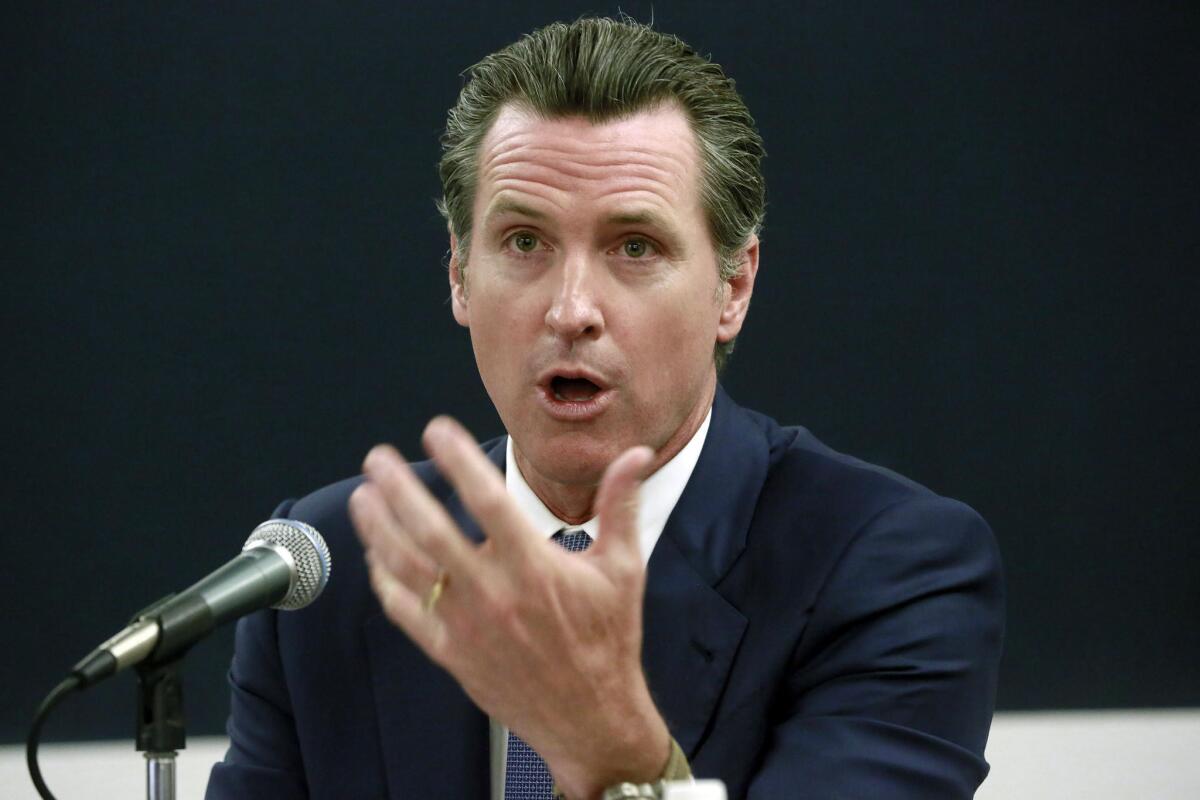
Lt. Gov. Gavin Newsom, who is running for governor, announced Tuesday that he is supporting Kimberly Ellis’ run to become the new chairperson of the California Democratic Party.
Newsom endorsed Ellis’ rival, Eric Bauman, last year and said that he still supports him in an email to state party delegates.
‚ÄúCalifornia Democrats have two strong choices,‚ÄĚ Newsom wrote on Tuesday. ‚Äú‚Ķ I believe both Kimberly and Eric have the vision and experience to lead our party into the future. Let‚Äôs have a civil race, unite our party, and focus on the vital work ahead.‚ÄĚ
Newsom said his newfound support of Ellis was prompted by the activist demonstrating her skills during the campaign to lead the state party, the largest and one of the most influential in the nation.
When Newsom endorsed Bauman, the conventional wisdom was that the race would be a cake walk for the longtime member of the state’s Democratic establishment who currently serves as vice chairman of the state party and leader of the Los Angeles County chapter.
But in the ensuing months, Ellis made the race competitive, in part because of a growing anti-establishment faction in the state party inspired by Bernie Sanders’ unsuccessful presidential run in 2016. Notable backers of Ellis, such as the California Nurses Assn., also back Newsom.
Newsom‚Äôs top rivals in the gubernatorial contest ‚ÄĒ state Treasurer John Chiang and former Los Angeles Mayor Antonio Villaraigosa ‚ÄĒ have backed Bauman.
Trump nominates San Diego’s Doug Manchester for Bahamas ambassador
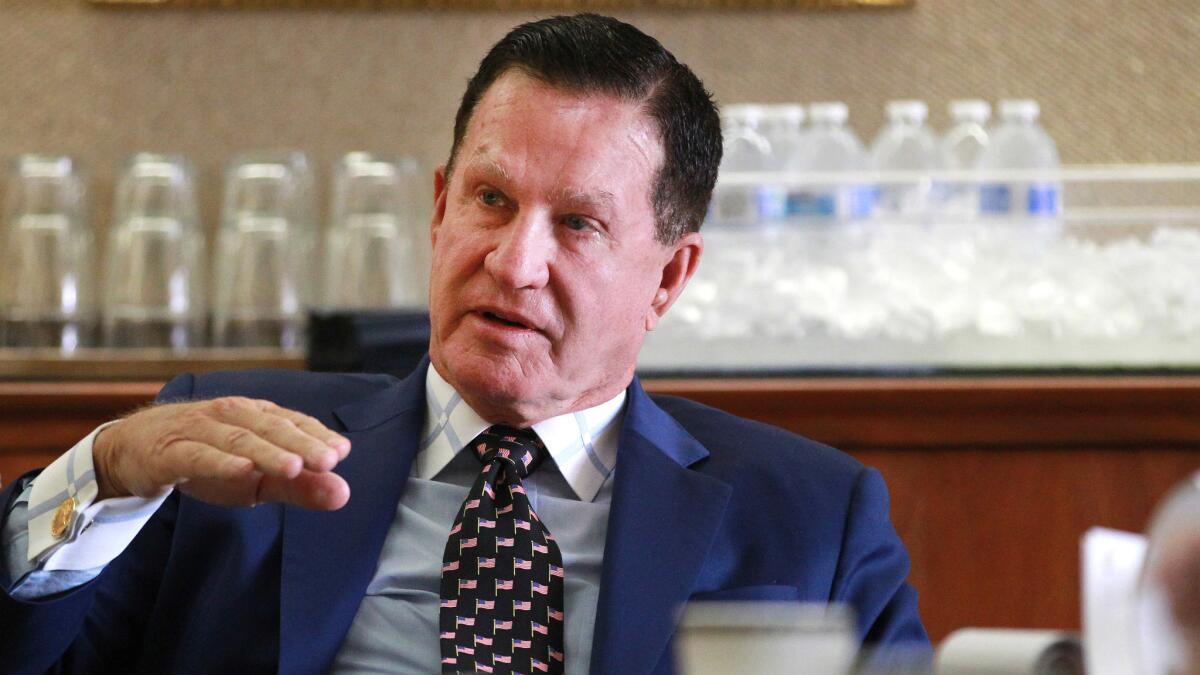
President Trump has nominated San Diego hotelier Doug Manchester to become the next United States ambassador to the Bahamas.
Monday’s announced selection comes after months of rumors that Manchester, a major Trump fundraiser, would be picked for the top diplomatic post to the island-nation.
An administration statement described Manchester, the former publisher of the San Diego Union-Tribune, as a ‚Äúleading industrialist with accomplishments on a national and international scale‚ÄĚ in several industries.
Rep. Duncan Hunter’s campaign spent on trip to Las Vegas amid probe
The latest financial filings from U.S. Rep. Duncan Hunter (R-Alpine) show his campaign continues to incur expenses at places like cigar lounges, where he has said he prefers to hold small-scale fundraising events.
His campaign spent $353 on ‚Äúfood/beverages‚ÄĚ at Alpine Tobacco Co., a smoking lounge. The first-quarter report also shows Hunter‚Äôs campaign paid a $1,042 hotel bill at the Cosmopolitan of Las Vegas and spent $896 at one of the hotel bars, the Chandelier, where patrons can drink inside a huge crystal chandelier.
Hunter has reimbursed more than $60,000 in mistaken, personal or undocumented expenditures to his treasury since the Federal Election Commission and the San Diego Union-Tribune began questioning his expenses a year ago.
Recently the House Ethics Committee announced it would halt an inquiry into Hunter’s spending in deference to a federal criminal investigation. Use of campaign funds for personal benefit is illegal. Hunter and his campaign have denied any wrongdoing.
Sweeping reform of California’s bail system would come with a hefty price tag, says new analysis
A new legislative committee analysis predicts that overhauling the bail system in California could be costly, adding a significant hurdle for Democratic lawmakers seeking to pass sweeping reform in the face of heavy opposition from law enforcement and the bail industry.
Assembly Bill 42, authored by Assemblyman Rob Bonta (D-Oakland), would end the use of money bail schedules, a set of fixed fees judges use to release people from jail while their cases are pending. The bill would instead require counties to establish pretrial services agencies to determine whether defendants should be released and, if so, on what conditions.
An identical version of the plan, authored by state Sen. Bob Hertzberg (D-Van Nuys), is moving through the Senate. And both are now awaiting action in the appropriations committees of the respective chambers.
The analysis released on Monday by the Assembly Appropriations Committee concludes that the state would have to spend ‚Äúhundreds of millions of dollars‚ÄĚ to reimburse counties for establishing and administering the new pretrial services. The state would also face ongoing expenses in the tens to hundreds of millions of dollars to pay court-appointed lawyers for defendants, according to the analysis.
The Assembly committee also noted costs for future oversight of the new bail system and for helping counties develop a ‚Äúrisk assessment‚ÄĚ tool in carrying out the new rules.
AB 42 has not been set for a hearing. But at a Senate Appropriations Committee hearing on Monday, more than a dozen bail agents voiced opposition to the Hertzberg bill, claiming that the actual annual costs to the state would be more than $2 billion. Reform advocates and civil rights lawyers, though, have argued that there could be significant savings realized by keeping fewer people behind bars.
Both bills face a May 26 deadline for moving out of the Legislature’s fiscal committees.
Republican Rep. Steve Knight joins call for special prosecutor to take over FBI’s Russia investigation
Rep. Steve Knight (R-Palmdale) said Tuesday it is time for a special prosecutor to take over the FBI’s investigation into Russian interference in the 2016 election.
‚ÄúIt is time for an investigation of Russia‚Äôs intervention in the U.S. election. There is too much at stake at home and abroad to not take this step. There is so much conflicting information from many sources; Americans deserve the opportunity to learn the truth,‚ÄĚ Knight said in a statement. ‚ÄúAs stated before, I continue to support any efforts done by the House Intelligence Committee and join many of my colleagues in supporting the assignment of a special prosecutor to take over the ongoing FBI investigation.‚ÄĚ
Knight joins two fellow California Republicans -- Reps. Darrell Issa of Vista and Tom McClintock of Elk Grove -- who have previously said that a special prosecutor, rather than the Justice Department, should be in charge of the ongoing investigation into how Russia sought to interfere with the election and what, if anything, the Trump campaign knew about it.
Knight and Issa both represent districts Hillary Clinton won in 2016, and are on the Democrats’ early list of targets in 2018.
Sen. Kamala Harris to Trump administration: Start a war on drug abuse, don’t restart the war on drugs
Sen. Kamala Harris on Tuesday took Atty. Gen. Jeff Sessions to task for ordering federal prosecutors to crack down on drug offenders last week.
Harris (D-Calif.) was speaking at the Center for American Progress Ideas Conference in Washington, one of a host of potential 2020 presidential candidates invited to address progressive thought leaders on what the next priorities should be for the Democratic Party.
Harris started her career in the Alameda County district attorney’s office at the height of the crack epidemic. She said there were so many nonviolent offenders being charged then that prosecutors might have only five minutes to review a case file before appearing in court.
‚ÄúI saw the war on drugs up close, and let me tell you, the war on drugs was an abject failure,‚ÄĚ Harris said. ‚ÄúIt offered taxpayers a bad return on investment, it was bad for public safety, it was bad for budgets and our economy, and it was bad for people of color and those struggling to make ends meet.‚ÄĚ
In a memo last week, Sessions instructed federal prosecutors to ‚Äúcharge and pursue the most serious, readily provable offense‚ÄĚ in drug cases, even when that would trigger mandatory minimum sentencing.
Harris, who was also San Francisco district attorney before being elected California attorney general, said, ‚ÄúThis administration and Jeff Sessions want to take us back to the dark ages.‚ÄĚ
The Justice Department has also indicated that it may aggressively go after marijuana users again, even in states like California that have legalized it. Under the Obama administration, federal officials largely deferred to local policy.
California needs federal help dealing with international criminal organizations and human trafficking, ‚Äúnot going after Grandma‚Äôs medicinal marijuana,‚ÄĚ she said.
Harris said the United States needs to stop treating marijuana use as a crime.
‚ÄúWe need to do the smart thing and the right thing and finally decriminalize marijuana,‚ÄĚ she said.
Afterward, her staff emphasized that Harris wants marijuana to be reclassified as a Schedule II drug by the Drug Enforcement Administration, which opens the door to approval for medical use.
Schedule II drugs have medicinal uses. Schedule I drugs, as marijuana is currently listed, have the highest criminal penalties for use and are considered as having no medical use.
Harris said criminal justice reform should be equitable and U.S. drug policy should treat addiction as a disease rather than as a crime.
‚ÄúThis is not a black and brown issue, this is not an urban and blue state issue. This has always been an American issue,‚ÄĚ Harris said. ‚ÄúWe need this administration to understand that if they care about the opioid crisis in rural America as they say they do, they have also got to care about the drug-addicted young man in Chicago or East L.A.‚ÄĚ
California state Senate advances bill to repeal mandatory sentence enhancements for some drug convictions
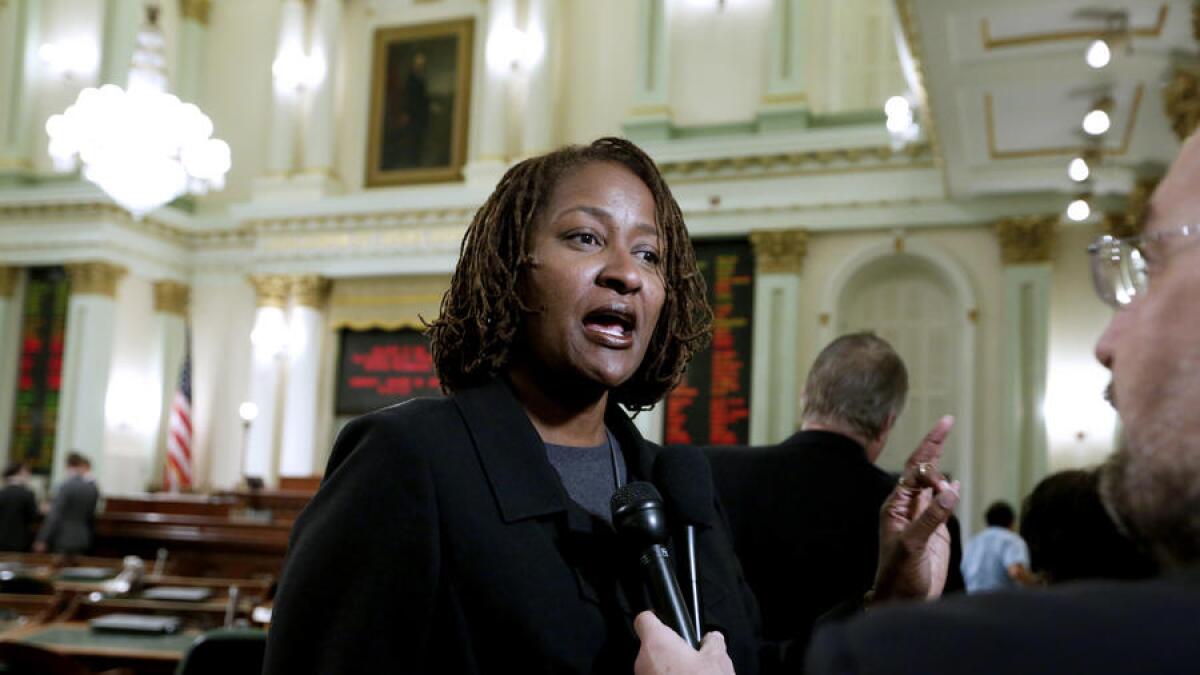
The state Senate on Monday approved a bill that would repeal three-year mandatory sentence enhancements for some prior drug convictions, part of a reform package that lawmakers say would protect juveniles and create parity in the justice system.
Senate Bill 180, co-authored by Sens. Holly Mitchell (D-Los Angeles) and Ricardo Lara (D-Bell Gardens), narrowly moved out of the Senate on a 22-13 vote. It now heads to the Assembly for consideration.
Another bill in the package, Senate Bill 439, passed on a 23-13 vote and would prohibit authorities from incarcerating children 11 and younger.
On the Senate floor, Republican lawmakers urged their Democratic colleagues not to water down state sentencing laws, pointing to the deadly attack on Whittier police officers allegedly carried out by a paroled gang member.
But supporters of the legislation called it a modest reversal of harmful policy under the so-called war on drugs, which they said disproportionately targeted minorities and did not stop the flow of narcotics. And they cited concerns over the direction on drug crimes taken by U.S. Atty. Gen. Jeff Sessions, who last week told federal prosecutors to pursue ‚Äúthe most serious, readily provable offense‚ÄĚ in drug cases.
Under current state law in California, a person convicted for sale or possession for sale of a small amount of drugs can face a sentence of three to five years incarceration, plus an additional three years in jail for each prior conviction for similar drug offenses.
Mitchell said research showed long prison sentences because of such mandatory enhancements tear apart families and do not stop offenders from breaking the law.
‚ÄúEnhancements came around at a time when we didn‚Äôt have the research to show that they aren‚Äôt effective, and [they] were based on fear,‚ÄĚ she told lawmakers. ‚ÄúWhen you know better, you‚Äôre supposed to do better.‚ÄĚ
L.A. Mayor Eric Garcetti to progressives: Don’t make winning the argument more important than progress
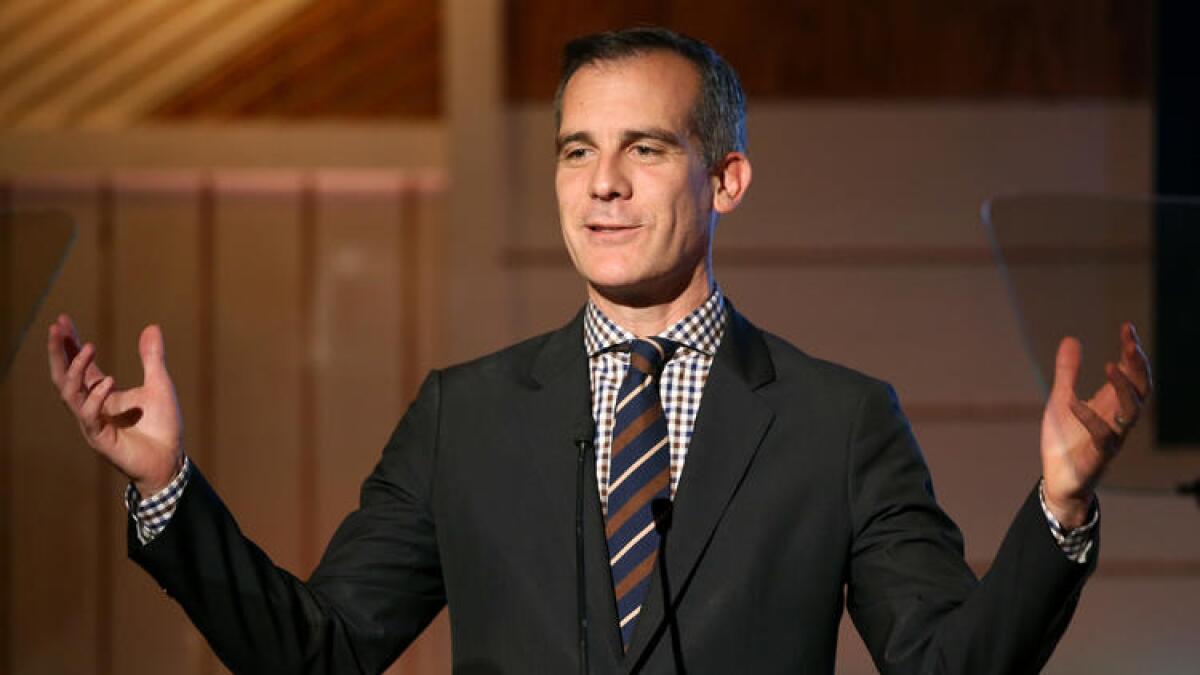
Los Angeles Mayor Eric Garcetti warned a ballroom full of progressive leaders Tuesday not to get bogged down in ‚Äúmaking sure that you win the argument instead of moving progress forward.‚ÄĚ
Garcetti told his listeners he knew they were upset by ‚Äúthe political moment that we are in. But every day we spend playing defense is a day we‚Äôre not making progress. If we define ourselves solely by our opposition to this administration, we will sell ourselves short and more important, we will sell the American people short.‚ÄĚ
Garcetti spoke Tuesday at the Center for American Progress‚Äô Ideas Conference in Washington at a time when many Democrats are trying to determine what‚Äôs next for their party after unexpected electoral losses in November. The conference is seen by many as an early cattle call of potential 2020 presidential candidates. Garcetti, who was just reelected to a second term, and others who‚Äôve been floated as possible candidates are participating in the daylong event ‚ÄĒ including Sens. Kamala Harris (D-Calif.), Amy Klobuchar (D-Minn.), Elizabeth Warren (D-Mass.) and Cory Booker (D-N.J.).
Several other Californians are speaking at the conference, including House Minority Leader Nancy Pelosi (D-San Francisco); Rep. Adam Schiff (D-Burbank), who is the ranking Democrat on the House Select Intelligence Committee; and climate change activist and billionaire Tom Steyer.
Los Angeles has pushed back against multiple Trump administration policies ‚ÄĒ in part by setting aside funding for legal services for immigrants in the country illegally and pledging to adopt the Paris climate accord if the administration decides to pull the United States out of the agreement, both of which could help Garcetti gain statewide or national attention. Throughout his speech, Garcetti, the only mayor invited to speak at the conference, argued that cities will continue to move forward on ideas such as free community college and expanding infrastructure even if Washington remains stuck.
‚ÄúThe future is here, and the American people are waiting for somebody to step up, to lead us with the confidence and courage we need. So don‚Äôt cede the power you have before you exercise it. Don‚Äôt ... fall into the trap of being paralyzed with fear and with anger. Don‚Äôt fight pessimism with more pessimism,‚ÄĚ Garcetti said.
The political group Bernie Sanders helped start weighs in on L.A.’s congressional race

Our Revolution, the political group Vermont Sen. Bernie Sanders launched from the ashes of his presidential campaign, has endorsed Democrat Jimmy Gomez in the race for L.A.’s 34th Congressional District.
In a statement, executive director Shannon Jackson cited Gomez‚Äôs upbringing and said he ‚Äúknows the struggles that too many families face.‚ÄĚ
‚ÄúThrough being raised in a house in which both parents worked multiple jobs to help his family make ends meet, Jimmy understands the importance of access to healthcare, paid family leave, and education,‚ÄĚ Jackson said, citing legislation Gomez, a three-term state assemblyman, helped pass to expand California‚Äôs paid family leave law.
The 34th Congressional District is one of the few in California where Sanders won over Hillary Clinton in last year’s presidential primary, and Our Revolution’s endorsement was highly sought after. The fledgling group, which operates separately from Sanders and aims to propel progressive candidates to office, has been known to raise money for the candidates it endorses.
When multiple Sanders-affiliated candidates jumped into the April primary to replace Rep. Xavier Becerra, the group declined to endorse, citing a split in its base.
Gomez, who faces fellow Democrat Robert Lee Ahn in the June 6 runoff for the seat, has been consolidating support from progressive corners since the primary, with endorsements from the California Nurses Assn. and other prominent Sanders backers, including Our Revolution board member Lucy Flores.
House Minority Leader Nancy Pelosi: Trump was ‚Äėsloppy‚Äô if he disclosed sensitive information to Russians
House Minority Leader Nancy Pelosi on Monday called news that President Trump may have disclosed high-level intelligence information to Russian officials ‚Äúsloppy‚ÄĚ and a ‚Äúmessy approach to intelligence that is very endangering.‚ÄĚ
Pelosi was participating in a town hall hosted by CNN, her second of the year with the network. The Washington Post story that broke the news was posted just hours before the town hall began, and host Chris Cuomo spent the first 20 minutes discussing the news with Pelosi.
The White House has vigorously denied that Trump shared sensitive information with Russian officials.
Pelosi played on the old slogan ‚Äúloose lips sink ships‚ÄĚ that appeared on propaganda posters during World War II.
‚ÄúWe cannot have the president of the United States being casually loose-lipped about confirming something, even if it‚Äôs in the public domain, to an adversarial nation,‚ÄĚ she said.
Her comment mirrored the statement her office sent out soon after the Post story was published, which said that if the story was true, ‚ÄúTrump has compromised a key source of intelligence collection against ISIS and jeopardized the security of the American people.‚ÄĚ
State senators say yes to naming part of the Ventura Freeway after former President Obama
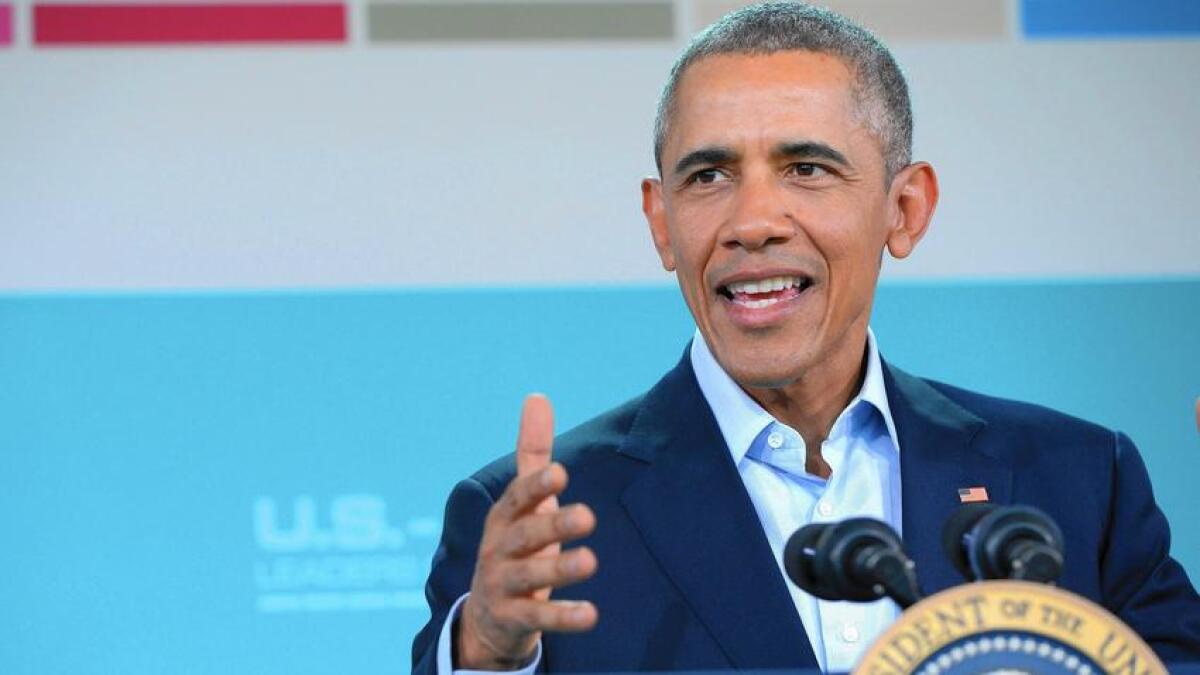
The state Senate voted on Monday to rename a portion of the freeway that runs between Pasadena and Glendale in honor of former President Obama.
The proposal, which passed on a bipartisan vote of 34 to 1, now heads to the state Assembly.
The author of the resolution, Sen. Anthony Portantino (D-La Ca√Īada Flintridge) said that the former president, who attended Occidental College from 1979 to 1981, ‚Äúcredits his time there as helping shape his future as president of the United States.‚ÄĚ
The portion of California 134 that runs between Interstate 210 and California 2 would be renamed the ‚ÄúPresident Barack H. Obama Highway‚ÄĚ under Portantino‚Äôs plan. Freeway signs with Obama‚Äôs name would be erected only after enough money from private donors is gathered.
Lawmakers have occasionally, through the years, designated roads and other landmarks for prominent people. Former President Reagan is honored with a named freeway east of Simi Valley. Last year, the Legislature named a portion of Interstate 210 near Pasadena for baseball legend Jackie Robinson. In 2015, a freeway tunnel in Marin County was named for the late comedian Robin Williams.
California lawmaker proposes making ‚Äėstealthing‚Äô a form of rape under state law
Assemblywoman Cristina Garcia (D-Bell Gardens) on Monday introduced a bill that would make it a form of rape to remove or tamper with a condom during sex without consent.
Garcia said the legislation is necessary because it is unclear whether the practice of ‚Äústealthing‚ÄĚ is illegal under current law. To introduce the bill, she used the ‚Äúgut and amend‚ÄĚ process, stripping the contents of a previously introduced proposal that sought to allow people between ages 18 and 21 to work in gambling businesses, as long they did not perform jobs that involved playing a game.
Toughening repercussions for rape and sex crimes was at the center of legislative debate last year after the notorious sex assault cases of former Stanford swimmer Brock Turner and comedian Bill Cosby. The stealthing bill follows another proposal by Garcia to expand the legal definition of rape that became law this year.
Former head of California’s campaign watchdog agency hit with fines by the agency
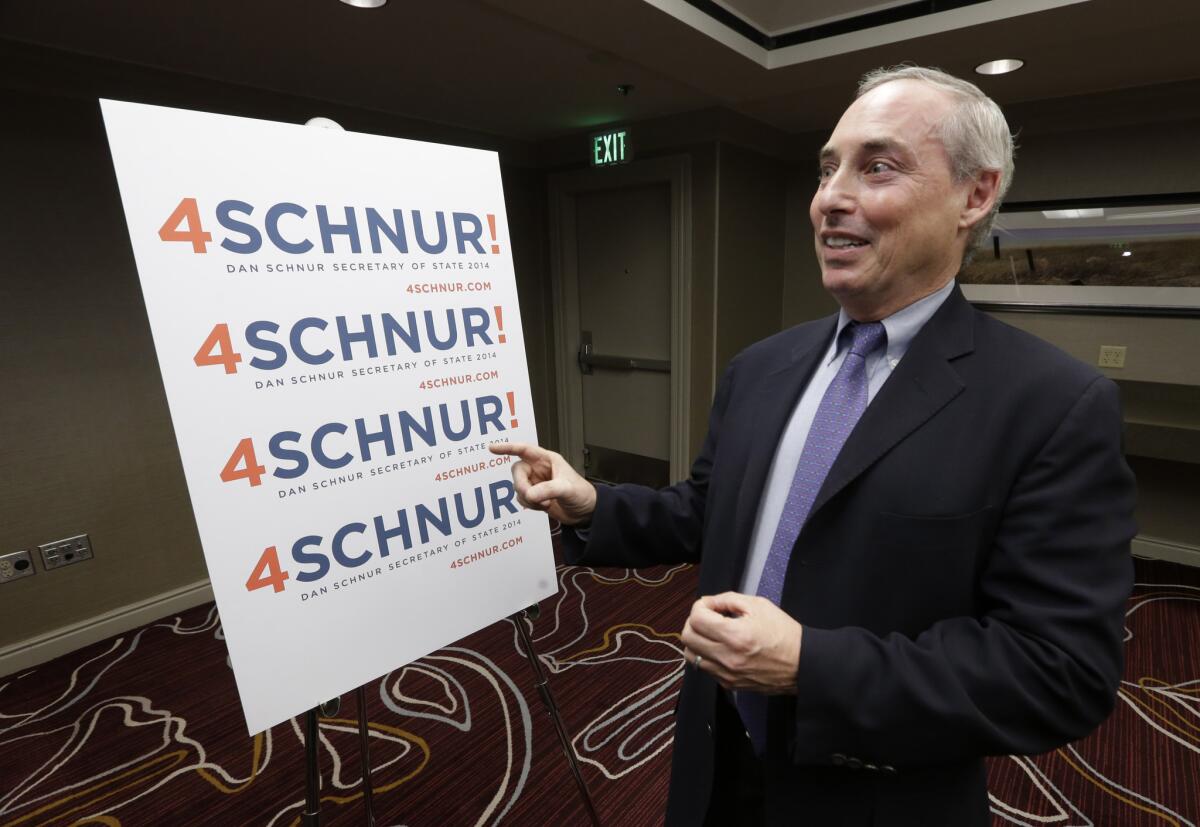
Dan Schnur, the former chairman of the state campaign watchdog agency, has agreed to pay that agency $4,500 in fines for failing to properly disclose and handle some campaign contributions to his unsuccessful 2014 run for secretary of State.
Schnur was chairman of the state Fair Political Practices Commission before he ran for office. In a report released Monday, the FPPC said Schnur failed to disclose within 10 days a contribution he made to his campaign and didn’t process some campaign expenditures through his campaign account.
The latter count involves $12,658 in travel expenses that Schnur paid using personal credit cards though they were disclosed as campaign expenses.
The commission report said an aggravating factor was that Schnur was previously fined $200 for failing to report a 2013 gift of $1,018 in travel expenses from the Northern California Lincoln Club, and that ‚ÄúSchnur is experienced with the [Political Reform] Act, having previously served as the Chair of the Commission.‚ÄĚ
Schnur said: ‚ÄúI was originally disappointed when I saw that the fine for what was essentially a clerical error was so substantial. But I developed tremendous respect for the FPPC staff during my time working with them, so of course I agreed to their proposal without complaint.‚ÄĚ
Sen. Dianne Feinstein pledges to oppose Transportation nominees until Caltrain funding is approved
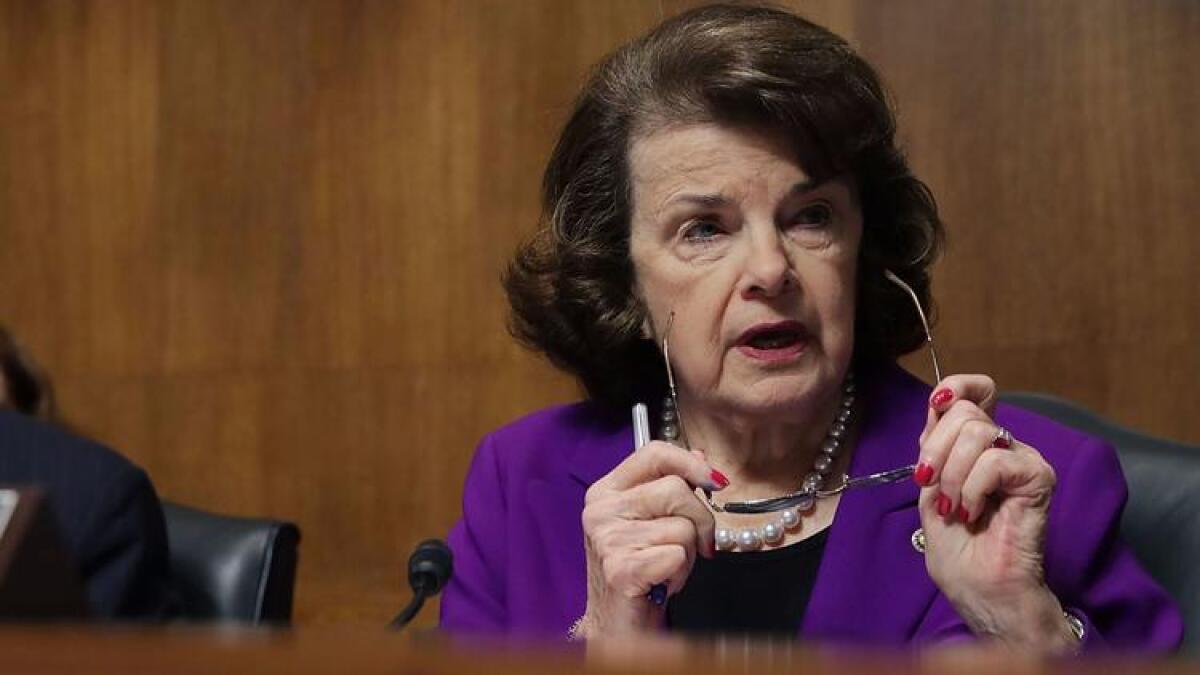
Sen. Dianne Feinstein (D-Calif.) said Monday she will oppose the confirmation of every Transportation Department nominee until the Trump administration funds California’s electric train.
On Monday she said she plans to vote against Jeffrey Rosen’s nomination as deputy secretary of Transportation.
In the recent spending bill, Congress directed the administration to fully fund the Caltrain Peninsula Corridor Electrification Project, but the administration has not yet released the funds. In February, President Trump delayed making a final decision on the project after the 14 Republicans in the California delegation asked him to, a move that caused panic from the governor’s office and local leaders.
‚ÄúDespite approval from Congress, the administration continues to withhold funding without any rational justification ‚ÄĒ wasting almost $1 million a week and jeopardizing 10,000 jobs nationwide. It is long past time for the administration to release the Caltrain corridor funding,‚ÄĚ Feinstein said.
Electrification would allow Caltrain to replace its diesel locomotives with electric trains and is a crucial step for the future of the bullet train, which several Republicans in the delegation oppose. In recent months, Feinstein has repeatedly urged Californians to contact the Republicans in the delegation about the train.
Garcetti asks Trump administration for subway funds to help with Olympics bid
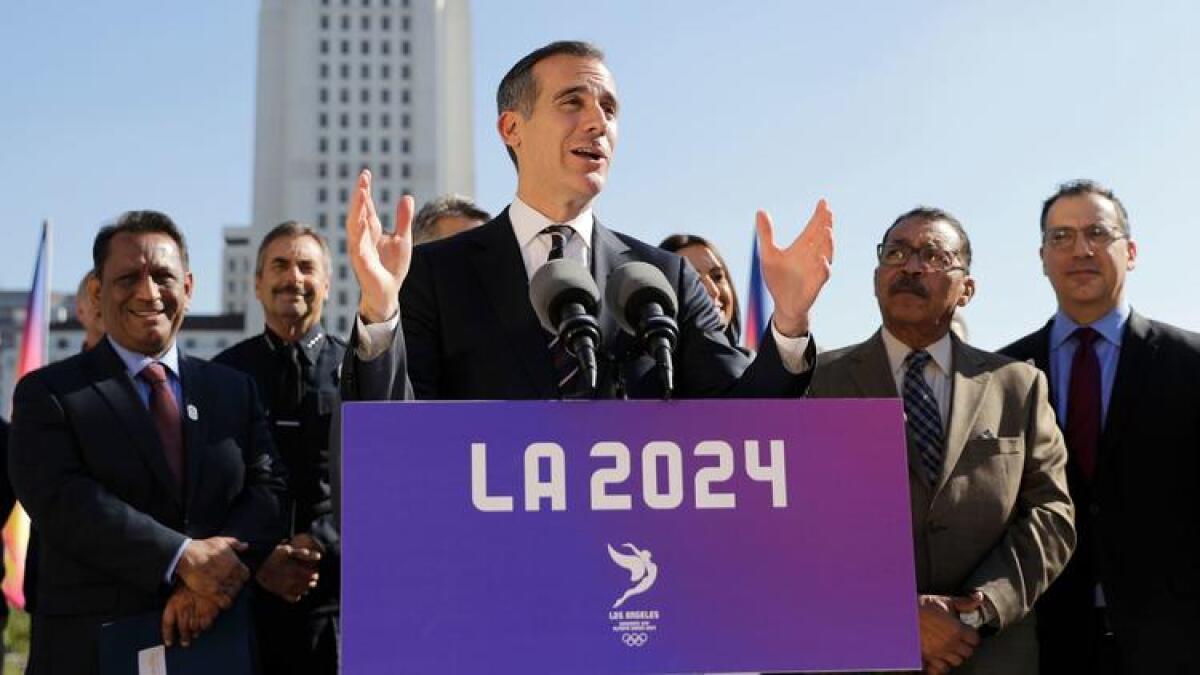
Los Angeles Mayor Eric Garcetti is in Washington on Monday and Tuesday, hoping to sway transportation officials into fast-tracking $1.3 billion for the final stage of the city’s new Metro line to Westwood ahead of a decision on the city’s 2024 Olympic bid.
The International Olympic Committee is scheduled to choose in September whether Los Angeles or Paris will host the 2024 Games, and officials just spent three days in Los Angeles doing a final walk-through. Traffic and congestion have been raised consistently as potential pitfalls of the city’s bid, and Garcetti said in an interview Monday that having the subway funding assured and the project sped up by September could help L.A.’s chances.
Garcetti made the request directly to Transportation Secretary Elaine Chao in a meeting Monday.
The passage of Measure M, the transportation sales tax that county voters approved in November, and the $1 billion in tax money it is expected to raise, has shaved years off the original completion date for the Purple line, but Garcetti said it likely isn’t enough to get the final leg done by 2024 without additional federal funding.
President Trump has signaled that he is excited to have America host the Summer Games for the first time since they were held in Atlanta in 1996.
Garcetti is hoping the administration’s desire to host the Games will be enough to get additional money from the New Starts fund, which helps cities pay for transportation projects that cost over $300 million.
Los Angeles just received $1.6 billion in January to begin the next phase of the Purple line.
Whatever is left of the fund at the end of the fiscal year gets swept back into the Treasury, and Garcetti has his sights on the remainder.
‚ÄúThere‚Äôs almost no other project in America that could use it,‚ÄĚ Garcetti said. ‚ÄúSo from a [Transportation Department] perspective, do you want to spend this money or like go back into the morass of the federal budget? It just goes back to the Treasury.‚ÄĚ
Times reporter Laura J. Nelson contributed to this story.
California‚Äôs attorney general says Trump administration‚Äôs new emphasis on drug prosecutions is ‚Äėcrazy‚Äô
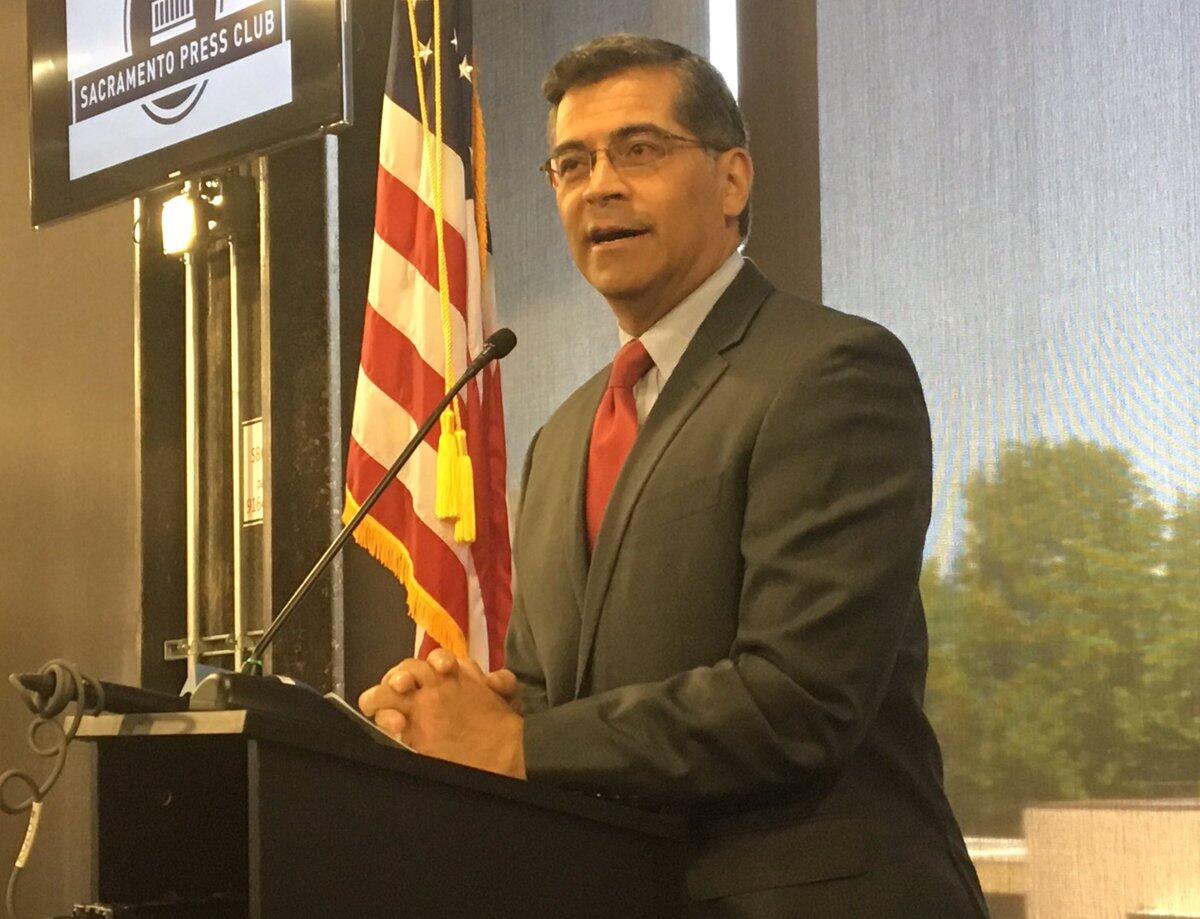
California Atty. Gen. Xavier Becerra on Monday sharply criticized the decision by President Trump’s administration to reinvigorate federal prosecution of drug crimes, saying the decision will have a disproportionate impact on communities of color.
‚ÄúI think it‚Äôs crazy,‚ÄĚ Becerra said during a speech to the Sacramento Press Club. ‚ÄúI don‚Äôt understand it.‚ÄĚ
Last week, U.S. Atty. Gen. Jeff Sessions told federal prosecutors to pursue ‚Äúthe most serious, readily provable offense‚ÄĚ in drug cases. That would include triggering federal drug sentencing laws that the administration of former President Obama had often avoided.
Becerra said that Sessions’ decision would send a dangerous signal to some young men who otherwise may not commit any violent crimes.
‚Äú‚ÄėHey, if you‚Äôre going to be locked up forever and live in misery, live a life while you can and do what you can and, you know, throw everything up in the air and roll the dice,‚Äô‚ÄĚ Becerra said in describing the implicit message of tough drug sentences.
The state attorney general, who took office in January after being appointed by Gov. Jerry Brown, said his office would continue to push back where possible against the president’s actions that could hurt Californians.
‚ÄúWe don‚Äôt need to be the lead on everything,‚ÄĚ he said in describing why he‚Äôs joined more than a dozen legal actions filed by other states. ‚ÄúI just want to be on the field.‚ÄĚ
Becerra, 59, said he has recently moved back to Sacramento, where he grew up before representing Los Angeles in the House of Representatives for a quarter of a century.
The attorney general said that he’d take a look at Sessions’ order on drug crimes, but was unsure if there is anything the state could do about it.
‚ÄúI can‚Äôt stop them from being stupid,‚ÄĚ Becerra said.
Fearing new taxes, California Chamber of Commerce appeals cap-and-trade decision
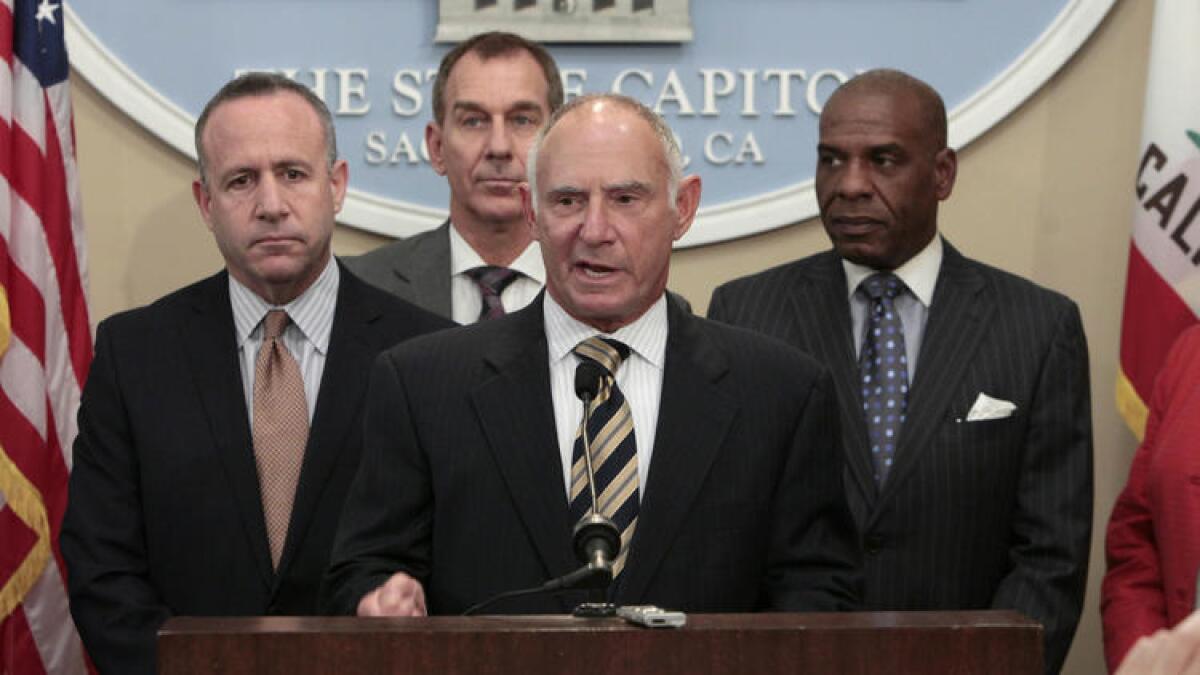
The California Chamber of Commerce is taking its case against the cap-and-trade program to the state’s highest court.
Joining with the conservative Pacific Legal Foundation, the powerful business organization is appealing a recent state appeals court decision upholding cap and trade.
The chamber had argued that the program, which requires companies to buy permits to release greenhouse gas emissions, functions as an unconstitutional tax because it was not approved by a two-thirds vote of the Legislature, the legal threshold for raising new revenue.
The 3rd District Court of Appeal in Sacramento rejected that argument. The decision has caused new consternation at the chamber, which said in its appeal that the court risks ‚Äúputting no limits on what money can be exacted and providing a road map for the evasion of Proposition 13‚Äôs limits‚ÄĚ on increasing taxes.
Denise Davis, a spokeswoman for the chamber, said the organization ‚Äúremains a strong supporter of a cap-and-trade program to reduce greenhouse gases,‚ÄĚ and it is currently pushing lawmakers to extend the program. However, the chamber is concerned that the appeals court decision was too broad and could allow a ‚Äúmajor sea change‚ÄĚ in state law.
Congressional hopeful Robert Lee Ahn is no longer calling himself a ‚Äėlifelong Democrat‚Äô in latest candidate statement
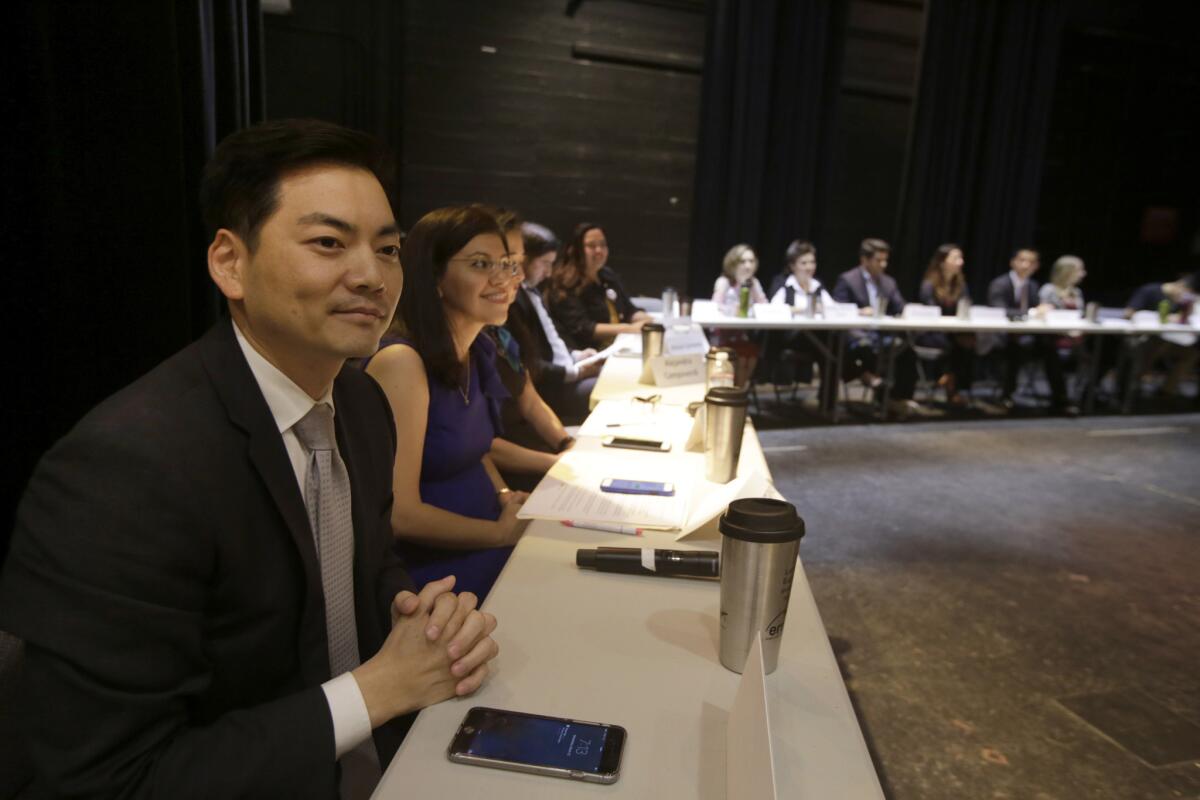
Sample ballots for Los Angeles‚Äô special congressional election have been going out in the 34th District the last couple of weeks, and there‚Äôs one change voters may not have noticed. Unlike in the primary election, candidate Robert Lee Ahn is no longer calling himself a ‚Äúlifelong Democrat‚ÄĚ in his candidate statement.
That’s because it’s not true.
Ahn, who said in an interview that he first registered to vote as a Republican, and later switched his registration to the Democratic Party in 2012.
Ahn caught the mistake before the primary election, spokesman James Lee said, but a staff member sent the incorrect version to the L.A. County registrar’s office for printing.
Lee said Ahn has been ‚Äúconsistent‚ÄĚ about acknowledging his former status as a Republican and that there was no ‚Äúdeliberate attempt‚ÄĚ to mislead voters.
In Ahn‚Äôs latest candidate statement, which Lee said should have run in the primary, a paragraph has been added criticizing ‚Äúprofessional politicians‚ÄĚ and ‚Äúold politics financed by Sacramento special interests.‚ÄĚ
Assemblyman Jimmy Gomez, who uses a significant portion of his candidate statement in June’s sample ballot to tout some of his many endorsements, did not submit a candidate statement in the April primary.
Ahn and Gomez will face off in a June 6 runoff for the seat.
State Senate committee gets new leader after Democrat was ousted as chairman
Gov. Brown’s ballot measure committee agrees to pay $1,500 fine for campaign finance violations
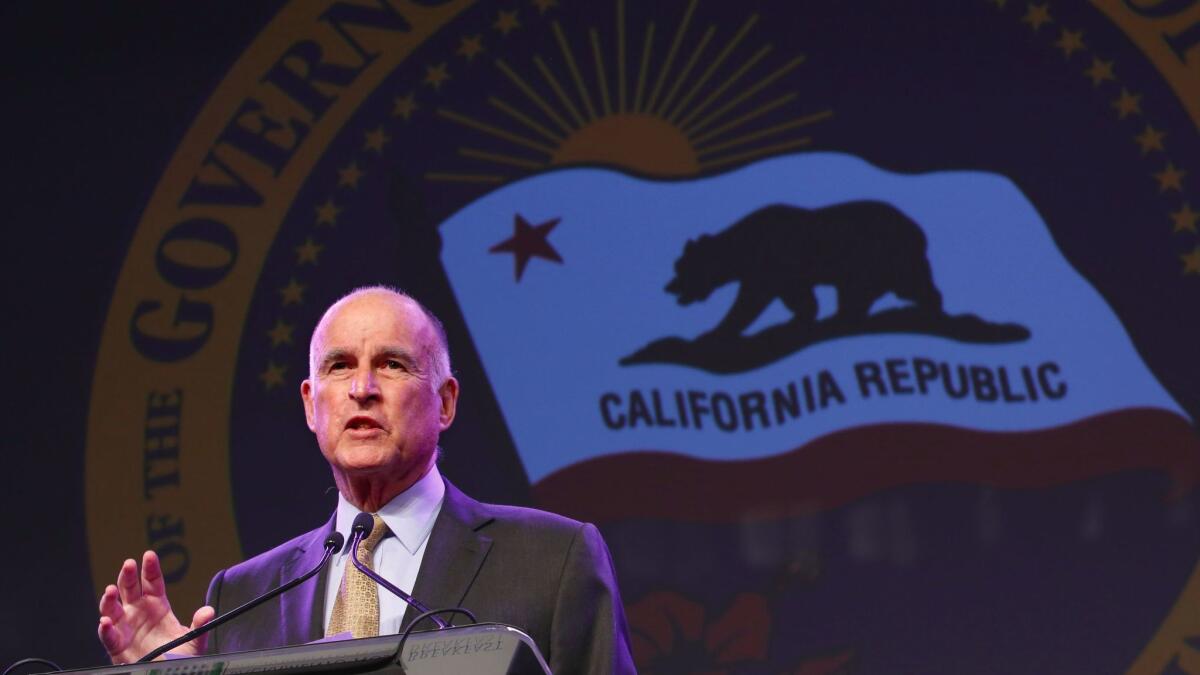
Gov. Jerry Brown’s committee for the 2012 tax measure Proposition 30 has agreed to pay $1,500 in fines to the state’s campaign watchdog commission for not properly reporting all contributions.
The committee, which was controlled by Brown, failed to properly report receiving $5,000 or more within 10 days on two occasions. The missing reports should have reported $1,531,427 received from Californians Working Together to Restore and Protect Public Schools, Universities and Public Safety, and $15,000 from the California State Council of Service Employees Issues Committee.
Proposition 30 was approved by voters and temporarily raised taxes on people earning more than $250,000.
In recommending a fine less than the $5,000 maximum penalty, Enforcement Chief Galena West of the Fair Political Practices Commission said in a report that other than the two violations, an audit ‚Äúfound the Committee substantially complied with the [Political Reform] Act‚Äôs disclosure and recordkeeping provisions.‚ÄĚ
The California FPPC staff has agreed to the $1,500 fine, but it still must be approved by the panel at its May 25 meeting.
California Democratic Party faces $3,500 in state fines for mishandling campaign funds, governor gets warning letter
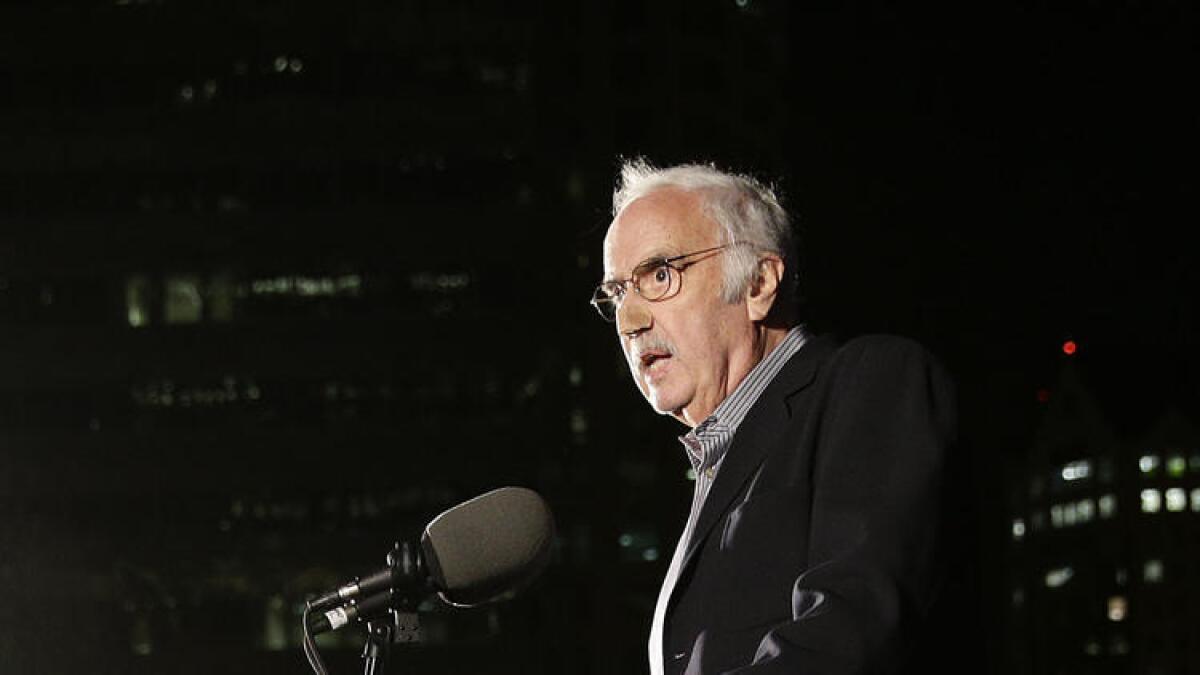
The California Democratic Party has agreed to pay $3,500 in fines for mishandling a pair of six-figure contributions, but state investigators stopped short of accusing party officials of laundering donations from the oil industry to the 2014 reelection effort of Gov. Jerry Brown.
The findings released Monday by the state Fair Political Practices Commission grew out of a complaint by the activist group Consumer Watchdog in September that alleged hundreds of thousands of dollars were given by energy companies to the state party, which shortly afterward made large contributions to the Brown campaign.
The commission’s enforcement chief on Monday issued a warning letter to Brown and his campaign, saying it had failed to deposit $1,318,316 into the designated campaign bank account, and instead deposited the funds into the campaign savings account.
The letter said Brown’s campaign also paid $35,357 in credit card processing fees from the savings account without transferring the funds into the designated campaign bank account first. Investigators also found the campaign accepted $3,700 in non-monetary contributions after the Nov. 4, 2014 general election, despite having no net debt remaining, another violation of the political reform act.
As for the money laundering allegations by Consumer Watchdog: ‚ÄúInsufficient evidence was found to substantiate the other allegations in the complaint regarding this committee,‚ÄĚ wrote Galena West, chief of enforcement, in the warning letter.
West said that despite the violations that were verified, her office ‚Äúdetermined that further enforcement action is not warranted‚ÄĚ because a Franchise Tax Board audit ‚Äúconcluded the Committee substantially complied‚ÄĚ with the Political Reform Act.
Jamie Court, the president of Consumer Watchdog, said he was ‚Äúvery disturbed that there are pretty big loopholes in campaign finance laws that allow you to use the Democratic Party as a sieve and pass through oil industry contributions without it resulting in a penalty unless there is a wiretap.‚ÄĚ
The commission investigation of the Democratic Party found only that the party and its treasurer, Katherine Moret, failed to properly identify a committee bank account, failed to notify a candidate’s campaign of the account’s use and failed to deposit $450,000 in contributions into the correct account.
‚ÄúThe Committee is an extremely sophisticated party who should be held to the highest standards,‚ÄĚ wrote West in a report proposing the fine.
Candidates for governor in the 2014 election could not accept contributions from individuals of more than $34,000.
The Democratic Party was supposed to maintain separate accounts for money it received, with ‚Äúall-purpose‚ÄĚ accounts being those that accept contributions under the $34,000 limit for races and ‚Äúrestricted‚ÄĚ accounts for funds in excess of contribution limits.
Restricted funds cannot be used to make contributions to candidates. They can be used to make contributions to ballot measure committees and for voter registration and administrative costs.
Investigators said that funds received over the contribution limit totaling $450,000 that should have been deposited into a ‚Äúrestricted use‚ÄĚ account were instead deposited in error into the ‚Äúall purpose‚ÄĚ account.
‚ÄúFortunately, this error was caught before the funds were expended and the funds were then transferred into the ‚Äėrestricted use‚Äô account,‚ÄĚ the investigative report said.
West said the deposits ‚Äúwere reversed within 14 days and the error did not result in the Committee using any funds improperly.‚ÄĚ
The fines have been agreed to by the Democratic Party and investigation staff but must be approved by the Commission at its May 25 meeting.
Consumer Watchdog also had alleged that Gov. Brown’s top aide, Nancy McFadden, influenced appointments to the state Public Utilities Commission while she owned stock in Pacific Gas & Electric Co., which was seeking utility-friendly decisions.
In a separate filing Monday, the FPPC investigators said McFadden failed to properly report stock options she owned in Pacific Gas & Electric Co., so she has agreed to pay $300 in fines.
However, the report said investigators ‚Äúfound no evidence of a conflict of interest resulting from this interest‚ÄĚ and ‚Äúno evidence of intent to conceal.‚ÄĚ
McFadden agreed to pay $100 in fines each for the years of 2012, 2013 and 2014 when she did not report full information on the stock options, according to a report by the FPPC.
McFadden initially reported owning the stock options but later failed to fully report information on her sale of options, including the dates on which they were sold.
Evan Westrup, a spokesman for the governor, said the FPPC filing speaks for itself. As for the McFadden fine ‚ÄúInadvertent filing errors were acknowledged and amended Form 700s were voluntarily re-filed with the FPPC to clear this up more than a year ago,‚ÄĚ Westrup said. ‚ÄúContrary to the poppycock some continue to peddle,‚ÄĚ he added, ‚Äúthe FPPC‚Äôs findings make it clear there‚Äôs `no evidence‚Äô‚ÄĚ of any `conflict of interest‚Äô‚ÄĚ or `intent to conceal.‚ÄĚ
Jamie Court said he was upset that the FPPC investigators did not interview witnesses offered by Consumer Watchdog.
‚ÄúI don‚Äôt know how you can investigate the chief deputy to the governor without talking to witnesses,‚ÄĚ Court said. ‚ÄúIn that case a $300 fine is not even a slap on the wrist.‚ÄĚ
He said it appears that the governor’s appointees to the Fair Political Practices Commission may have limited the scope of the probe.
‚ÄúIt suggests to me the governor‚Äôs appointed FPPC clearly brought influence to bear on limiting the scope of this investigation and preventing there from being a different outcome, and that is troubling,:‚ÄĚ Court said.
2:30 pm: This article was updated to include warning letter issued to governor and comments from Jamie Court.
4:00 pm: This article was updated to include comment from governor’s spokesman.
This article was originally published at 2:06 p.m.
With defunding threats less imminent, Planned Parenthood turns its focus to low Medi-Cal payments
A Capitol gathering of Planned Parenthood supporters on Monday had many of the same traits as the January Women’s March and other rallies of the Trump era: pink T-shirts and so-called pussy hats, with frequent jeers for the president and the GOP-majority Congress.
But behind the familiar feel was a subtle shift in lobbying by Planned Parenthood of California. After months of warning of the existential threat of potential federal defunding, the healthcare organization has trained its focus on another threat: low reimbursements from the state for seeing Medi-Cal patients.
‚ÄúThe message today is that Medi-Cal reimbursement rates are so low that they threaten our ability to keep our health centers open,‚ÄĚ said Kathy Kneer, president of Planned Parenthood of California. ‚ÄúIt would be a tragedy if we stopped Trump but allowed low rates to close our health centers one by one by one.‚ÄĚ
Medi-Cal reimbursement rates have been a perennial budget sore spot between healthcare providers and Gov. Jerry Brown’s administration. Planned Parenthood was among the backers of last year’s tobacco tax, with the intention that the extra dollars from the tax could go, in part, to raising provider rates.
But Brown’s administration has resisted putting more money into reimbursement rates. Instead, his budget proposes using much of the tobacco tax money to increase overall spending in the Medi-Cal program.
Nearly 90% of Planned Parenthood’s patients in California are on Medi-Cal. The group is seeking $50 million in this year’s budget for higher reimbursement rates for reproductive healthcare.
‚ÄúWe see so many women and men who don‚Äôt have other choices because so many providers have walked away from Medi-Cal,‚ÄĚ said Sue Dunlap, president of Planned Parenthood‚Äôs Los Angeles affiliate. ‚ÄúIn many of the communities we serve ‚ÄĒ East Los Angeles, South L.A., Antelope Valley ‚ÄĒ we‚Äôre one of the few providers where patients can get in in under a few weeks.‚ÄĚ
The rally, attended by hundreds of Planned Parenthood backers, had no shortage of lawmakers looking to tout their support for the group ‚ÄĒ and bash the goings-on in Washington.
‚ÄúLet me be very clear here: If you believe in a woman‚Äôs right to control her own healthcare, if you believe that healthcare is a human right and not a privilege for those who just can afford it and if you believe that women are entitled to full and unconditional equality before the law, California, our state, will always be your sanctuary,‚ÄĚ said Senate leader Kevin de L√©on (D-Los Angeles) to cheers.
But that support doesn’t necessarily translate to budget victory for the organization.
‚ÄúI‚Äôm here to express my solidarity with the women of Planned Parenthood, but separate from what the budget is and the deliberations and the process we have to go through,‚ÄĚ De L√©on said in an interview after the rally.
Silicon Valley venture capitalist Sam Altman says he’s considering a run for California governor in 2018

Sam Altman, a Silicon Valley venture capitalist, is considering a run for governor.
Altman, 32, is the president of Y Combinator, a start-up technology incubator that has invested in companies such as Airbnb, Dropbox and Stripe. When he was 19, he co-founded a social media app that later sold for $43 million.
‚ÄúAs I‚Äôve said before, I am actively seeking out California governor candidates, because I think we desperately need to address the cost of living, especially housing and broader economic inequality in this state,‚ÄĚ Altman said in a statement. ‚ÄúSome people I‚Äôve talked to have urged me to run. I of course love California, but that would be a huge decision, and one I‚Äôd have to really think about. I really love my current job ‚ÄĒ I honestly think it‚Äôs one of the best jobs in the tech world.‚ÄĚ
The San Francisco resident is a registered Democrat, according to his spokeswoman. Earlier this year, he traveled the country interviewing voters who supported President Trump.
The possible run came to light after former San Francisco Mayor Willie Brown wrote in the San Francisco Chronicle on Saturday that Altman sought his advice on a potential gubernatorial bid.
Although self-funders have not had a great deal of luck in California politics ‚ÄĒ billionaire Meg Whitman launched an unsuccessful 2010 gubernatorial bid, on which she spent $144 million of her own money ‚ÄĒ the entry of a candidate who is able to fund his or her own campaign would immediately jolt the 2018 race.
Lt. Gov. Gavin Newsom, former Los Angeles Mayor Antonio Villaraigosa, state Treasurer John Chiang and former state schools chief Delaine Eastin are the Democrats who are running to replace Gov. Jerry Brown, who is termed out. Rancho Santa Fe venture capitalist John Cox, a Republican, is also running. Other candidates are also eyeing the field.
Lawmaker delays bid to tax candy in California
California state controller seeks additional restrictions on state tax board to prevent conflicts of interest
State Controller Betty T. Yee on Monday proposed new rules aimed at preventing conflicts of interest and other ethical lapses by members of California’s tax board while it awaits the results of investigations by the state Department of Justice and others into allegations of mismanagement.
Gov. Jerry Brown last month stripped the state Board of Equalization of hiring and contracting powers and asked Atty. Gen. Xavier Becerra to investigate allegations that board members improperly transferred and used board employees for political purposes.
In the meantime, Yee, who is an ex officio member of the board, proposed a new board governance policy that set goals requiring the board to act ethically, openly and with accountability.
It addressed complaints that board members have circumvented the executive director to tell staff what to do, reassigning civil servants to improper postings that benefit the board members.
‚ÄúIndividual board members are not to become involved in operational management and should not participate in routine staff meetings or other staff activities unless specifically requested by the executive director,‚ÄĚ the policy says.
The policy to be considered by the board at its meeting this month also prohibits board members from actions posing a conflict of interest, including the acceptance of gifts from special interests.
‚ÄúClearly, a governance policy is urgently needed to create board member oversight, accountability and efficiency,‚ÄĚ Yee said in a statement. ‚ÄúWhile I continue to work with the Legislature and the governor to craft comprehensive BOE reforms, a new governance policy will help guide the board toward more ethical decision-making.‚ÄĚ
Yee had previously called for an overhaul of the board removing many powers that don’t involve hearing tax appeals.
The new policy would allow the board to discipline members who fail to meet standards of conduct.
‚ÄúAny public discipline will be imposed in open session at a duly-noticed meeting of the board, and only upon adoption of a motion by the board,‚ÄĚ the policy says.
Trump presidency eases Gavin Newsom’s path in his second run for California governor

The first time Gavin Newsom ran for governor, he dropped out of the race in deference to a seemingly unbeatable fellow Democrat, Jerry Brown.
‚ÄúHe was the right person at the right time, and I‚Äôm really glad I stepped aside,‚ÄĚ Newsom said on a recent visit to Los Angeles. ‚ÄúWe needed the old sage.‚ÄĚ
Newsom, who once mocked Brown‚Äôs comeback as a ‚Äústroll down memory lane,‚ÄĚ settled for the almost powerless job of lieutenant governor, easily winning two terms.
Now, with Brown, 79, nearing retirement, he is gunning for the governor’s job again. This time, patience, calculation and lucky timing have combined to make him the early favorite in next year’s June primary.
Newsom, 49, has deftly used his office as a platform to call for tighter gun control, legalized marijuana, a ban on new offshore oil drilling and rollbacks of university tuition hikes. Next up: universal healthcare.
His agenda carries broad appeal in a Democratic state that has been drifting leftward for more than two decades. With much of California seething over President Trump, the climate could hardly be better for the unabashed liberal politics of a former San Francisco mayor still best known for his trailblazing 2004 decree legalizing same-sex marriage.
‚ÄúYou want resistance to Donald Trump?‚ÄĚ Newsom asked a crowd of plumbers and steamfitters at a Bay Area union hall in March. ‚ÄúBoy, bring it on, Donald.‚ÄĚ
California Politics Podcast: Here are the battles that lie ahead over Gov. Jerry Brown’s new budget
Lawmakers will dig deep this week into Gov. Jerry Brown’s new state budget and are likely to demand changes before the final version reaches his desk next month.
On this week’s California Politics Podcast, we take a closer look at the governor’s revised budget that was submitted to the Legislature on Thursday -- a $183.4-billion spending plan that makes a few concessions thanks to recalculated tax revenue predictions. Still, Democrats are likely to balk at a few health and human services issues, most notably how to use tobacco tax revenue imposed by voters in fall through Proposition 56.
We also discuss the tough political road ahead for Republicans in the state’s congressional delegation as they come under fire for their recent vote to roll back provisions of the Affordable Care Act. That single event could be the centerpiece of congressional and statewide campaigns in California next year.
I’m joined by Times staff writer Melanie Mason and Anthony York of the Grizzly Bear Project.
Jerry Brown on Donald Trump: ‚ÄėHe doesn‚Äôt have the answer‚Äô
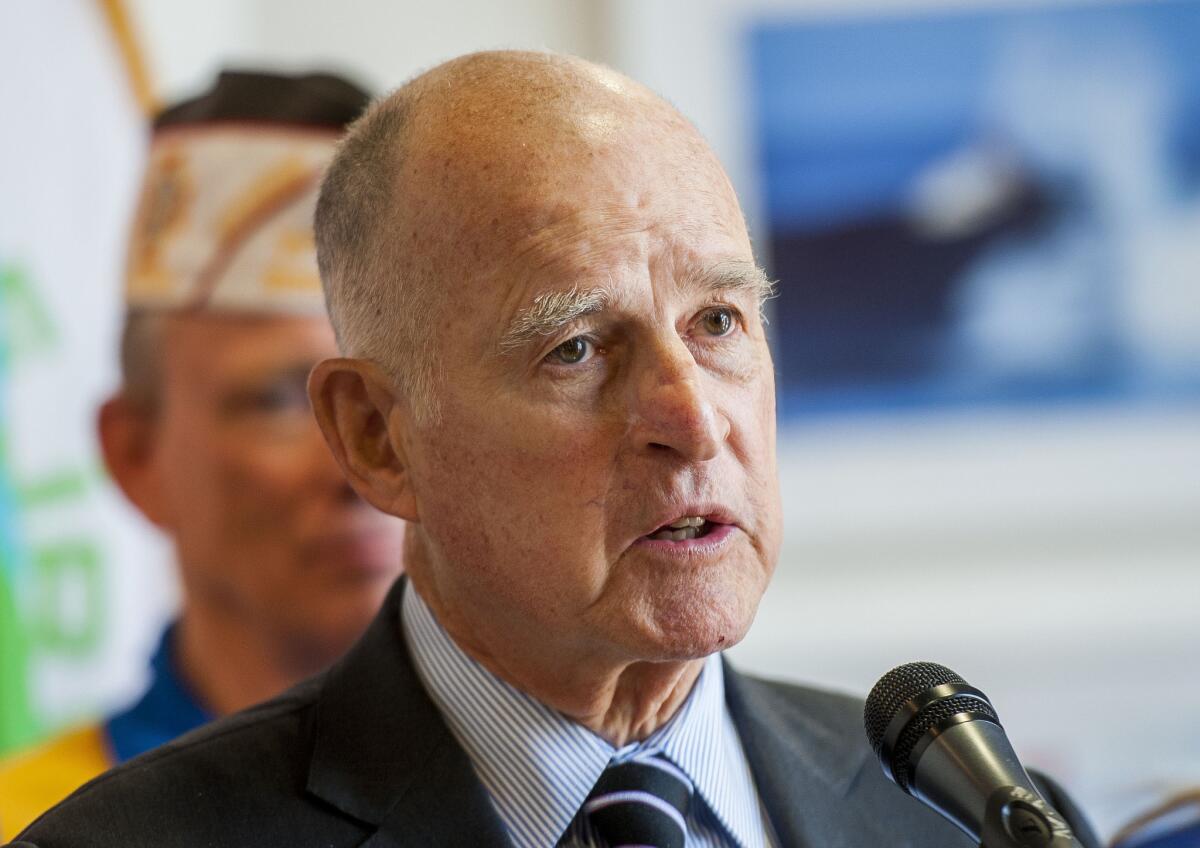
Gov. Jerry Brown said in a national TV interview on Saturday that President Trump was able to tap populist anger on the way to victory last fall, but dismissed his ability to do anything with it after taking office.
‚ÄúHe didn‚Äôt have the answer, and he‚Äôs demonstrated he doesn‚Äôt have the answer,‚ÄĚ Brown said in a CNN interview with political analyst David Axelrod.
The governor said Hillary Clinton faced daunting odds, as voters too easily saw her candidacy as a third term of former President Obama’s policies. And in the wide-ranging conversation, he urged the Democratic Party to embrace the needs of working-class Americans.
Brown said he would have sounded a theme much closer to the one voiced by Vermont Sen. Bernie Sanders, even though Brown endorsed Clinton during the bitter primary contest.
‚ÄúYou‚Äôve got to say, look, Wall Street is ripping us off. The fact is, the growth at the top is getting more and more. The middle and the lower realms of our society are suffering more insecurity,‚ÄĚ he said. ‚ÄúHard to get their kids in college, hard to buy a house, hard to keep a job.‚ÄĚ
Brown admitted that the approach is reminiscent of his failed 1992 presidential campaign, when he ultimately lost the Democratic nomination to former President Clinton. In that campaign, Brown railed against the influence of money in politics. In the CNN interview, he said the problem is back.
‚ÄúI think people are damn tired of it,‚ÄĚ he told Axelrod in the interview taped inside the governor‚Äôs mansion in Sacramento. ‚ÄúAnd whatever a politician can do, I think they have to stay away from this whole association of being under the influence of the powerful.‚ÄĚ
Brown side-stepped direct comment about the current controversy over Trump‚Äôs firing of former FBI Director James Comey, except to say that Comey‚Äôs actions during the campaign in regard to the Clinton email investigation were ‚Äúunprofessional‚ÄĚ and that the timing of Trump‚Äôs firing ‚Äúsmells‚ÄĚ of something other than what‚Äôs been publicly stated.
The governor has approached Trump’s presidency in a more cautious manner than many California Democrats, though he has taken the president to task on the issue of climate change. Brown suggested Trump would do well to pick his battles.
‚ÄúHow many fights can you have? How many enemies can you make?‚ÄĚ Brown said when talking about the president. ‚ÄúAnd the fact is, there‚Äôs a limited quotient before you run out the score.‚ÄĚ
The governor admitted he‚Äôs always been both ‚Äúrepelled and attracted‚ÄĚ by politics. He did say, though, that he particularly enjoys campaigns. And while Brown said that he wouldn‚Äôt have wanted to challenge Clinton in the primaries, the three-time presidential candidate said a general election against Trump would have been different.
‚ÄúThat would have been a pleasure,‚ÄĚ he said.
The governor, fresh off the unveiling of a revised state budget on Thursday, took time to praise his efforts in helping stabilize the state’s finances. And though he’s termed out of office in less than two years, he said he’s not yet ready to think about his long political legacy.
‚ÄúI‚Äôm not in memory yet. I‚Äôm in action,‚ÄĚ Brown said. ‚ÄúAnd I like being in action.‚ÄĚ
Democrat Bryan Caforio looks for a rematch with Rep. Steve Knight in 2018
Democratic attorney Bryan Caforio is gunning for a rematch with North Los Angeles County Rep. Steve Knight in 2018 after losing an expensive and high-profile race against the Republican last year.
Knight and his Antelope Valley seat were seen as vulnerable by political consultants in 2016 as voter registration in the once solidly Republican district tilted in favor of Democrats.
But the GOP incumbent held on to his seat even as $5.2 million in outside spending poured into the race. House Speaker Paul D. Ryan and President Obama both got involved in the race, which was seen as a toss-up going into election day. In the end, Knight beat Caforio, 53%-47%.
Caforio announced his sophomore candidacy Saturday in Palmdale with dozens of supporters packed into a union hall.
He said he intended to double down on Knight‚Äôs support of President Trump. Knight had remained coy about his support of Trump before the election but after his Nov. 8 victory said he made ‚Äúno bones about‚ÄĚ voting for Trump.
‚ÄúHe now owns that,‚ÄĚ Caforio said in an interview. ‚ÄúHe owns the Trump agenda.‚ÄĚ
Two other Democrats are also running for the seat in 2018, geologist Jess Phoenix and Katie Hill, the executive director and deputy CEO of People Assisting the Homeless, a statewide organization that provides homeless services and develops housing.
Knight‚Äôs seat has been deemed a ‚Äútoss-up‚ÄĚ by the nonpartisan Cook Political Report since he voted to roll back the Affordable Care Act.
Though Knight won the district, which stretches from Lancaster and Palmdale in the high desert to Santa Clarita and Simi Valley, Democrats believe that Hillary Clinton’s victory in the district means the party has a chance in 2018.
The district has also been the site of renewed activism, though who knows whether that will translate into votes at the ballot box 18 months from now.
Caforio and his wife, Lisa, moved into the district in 2015 shortly before entering the race. He was attacked by Republicans as ‚Äúnot one of us‚ÄĚ in a television ad that highlighted a Times story that looked at Caforio‚Äôs six-year tenure at Century City law firm where he represented large corporations and multimillionaires.
His outsider status hurt him with some local activists during the primary.
But Darren Parker, a local civil rights activist and chair of the California Democratic Party‚Äôs African American Caucus, said that Caforio was ‚Äúborn by fire‚ÄĚ through that process and is a stronger candidate as 2018 nears.
‚ÄúHe took all the licks and blows that each person in the Antelope Valley could give him,‚ÄĚ he said.
What is the most influential group in California’s housing debate?
California’s housing affordability crisis is driven by a shortage of new home construction.
For the last two years, Gov. Jerry Brown and lawmakers have introduced legislation to make it easier for developers to build. But for even longer than that, the State Building & Construction Trades Council of California, the labor group representing construction workers, has pushed for higher pay in homebuilding. The union also has used its considerable sway at the Capitol to influence a key housing cost study and target state bureaucrats and academics it believes have opposed higher pay standards.
The union’s opposition was one of the main reasons Brown’s housing plan failed last year, and its lack of support for similar pending bills looms over the current housing debate.
Rep. Dana Rohrabacher’s opponent slams him over healthcare vote in new ad
Rep. Dana Rohrabacher’s recent vote to roll back the Affordable Care Act is the centerpiece of a new online ad from one of his 2018 opponents, Laguna Beach real estate businessman and attorney Harley Rouda.
The minute-long ad will run on Facebook for the next few weeks, Rouda’s campaign said.
‚ÄúThis new ad articulates these two sharply contrasting visions for where to take our healthcare system in the months and years ahead,‚ÄĚ Rouda said in a statement.
It’s the second ad from Rouda. Democrats have targeted Rohrabacher and six other Republicans who represent districts that voted for Hillary Clinton in the 2016 presidential election.
Rohrabacher won reelection to his seat by a 16.6% margin in November. Two other Democrats have also announced plans to challenge him in 2018.
$350 hotel nights, limo rides in Europe: UC audit finds more questionable travel expenses
State auditors on Friday provided new details of questionable travel and entertainment expenses approved by the University of California system.
The amounts are small compared to the main finding of the April 25 audit that UC’s Office of the President failed to disclose tens of millions of dollars in reserve funds, but the audit said the questioned expenses represent issues that should be addressed.
‚ÄúOur review of three travel expense claims found an instance in which reimbursements exceeded allowable amounts for federal and state employees,‚ÄĚ the audit said. ‚ÄúSpecifically, one employee spent more than $350 per night on a hotel room, even though this cost exceeded the federal and state allowable limits by $140 per night.‚ÄĚ
That expense was for three nights at the Lord Baltimore Hotel, costing a total of $1,283, including taxes, so that a procurement manager could attend an Institute for Supply Management conference in Baltimore.
UC spokeswoman Dianne Klein said the employee provided details showing all less-expensive hotels in the vicinity were sold out. ‚ÄúThat was why it was approved,‚ÄĚ Klein said, noting that without taxes and fees, the room rate was approximately $348 per night.
‚ÄúIn our review of the three travel reimbursement claims, we identified six instances in which employees claimed over the state‚Äôs maximum meal rate of $46 per day,‚ÄĚ the audit added.
The audit also questioned $45 for tickets to see ‚ÄúHamlet‚ÄĚ at a theater in London, though the employee said it was part of a cultural exchange event.
Some of the questioned expenses occurred during a $20,000 trip UC President Janet Napolitano took from Feb. 17 to 27 last year to Washington, D.C., London, Berlin and Geneva.
Auditors did not question the use of business class airfare. Napolitano was granted an exemption from the rule requiring employees to fly economy class because she had just had surgery.
The questioned expenses were listed in expense reports as ‚Äúlimousine‚ÄĚ services costing $175 and $195 on two days during her time in Berlin to meet with UC researchers and German government officials. Klein said the vehicles were ‚Äústandard‚ÄĚ cars, not limousines, and were justified because of the surgery recovery.
An auditor spokeswoman noted Napolitano one day later had used a $25 taxi, and one concern was that the ‚Äúlimousine‚ÄĚ was hired for the full day when a taxi fare might have been cheaper.
‚ÄúWe would‚Äôve expected to see justification for using the limousine service as opposed to an alternate mode,‚ÄĚ said spokeswoman Margarita Fern√°ndez.
Napolitano faces bigger questions than her mode of ground transportation. Legislators are holding hearings on the audit’s broader findings.
State Auditor Elaine Howle said the amount UC initially reported to auditors for travel, business meetings and entertainment expenses over four years was about $25 million short of the $35 million total auditors found. Howle asked for information from four years, and UC provided auditors with a portion of the data, but for five years.
‚ÄúOur request for this information clearly indicated that we sought all data related to its travel, business meetings and entertainment expenses, yet it only provided us with data relating to $10.4 million in costs ‚ÄĒ incurred over 5 years,‚ÄĚ Howle said. ‚ÄúWe were surprised when we learned that they decided that our request was limited to a subset of the total travel and entertainment costs.‚ÄĚ
The travel data indicates UC officials took other trips for conferences or university business to Paris, Bermuda, Puerto Rico, Tokyo, China, Israel and India.
------------
UPDATES
3:45 p.m.: This article was updated to include additional information from UC spokeswoman Dianne Klein.
------------
Another Democrat who voted against transportation tax hike loses committee chairmanship
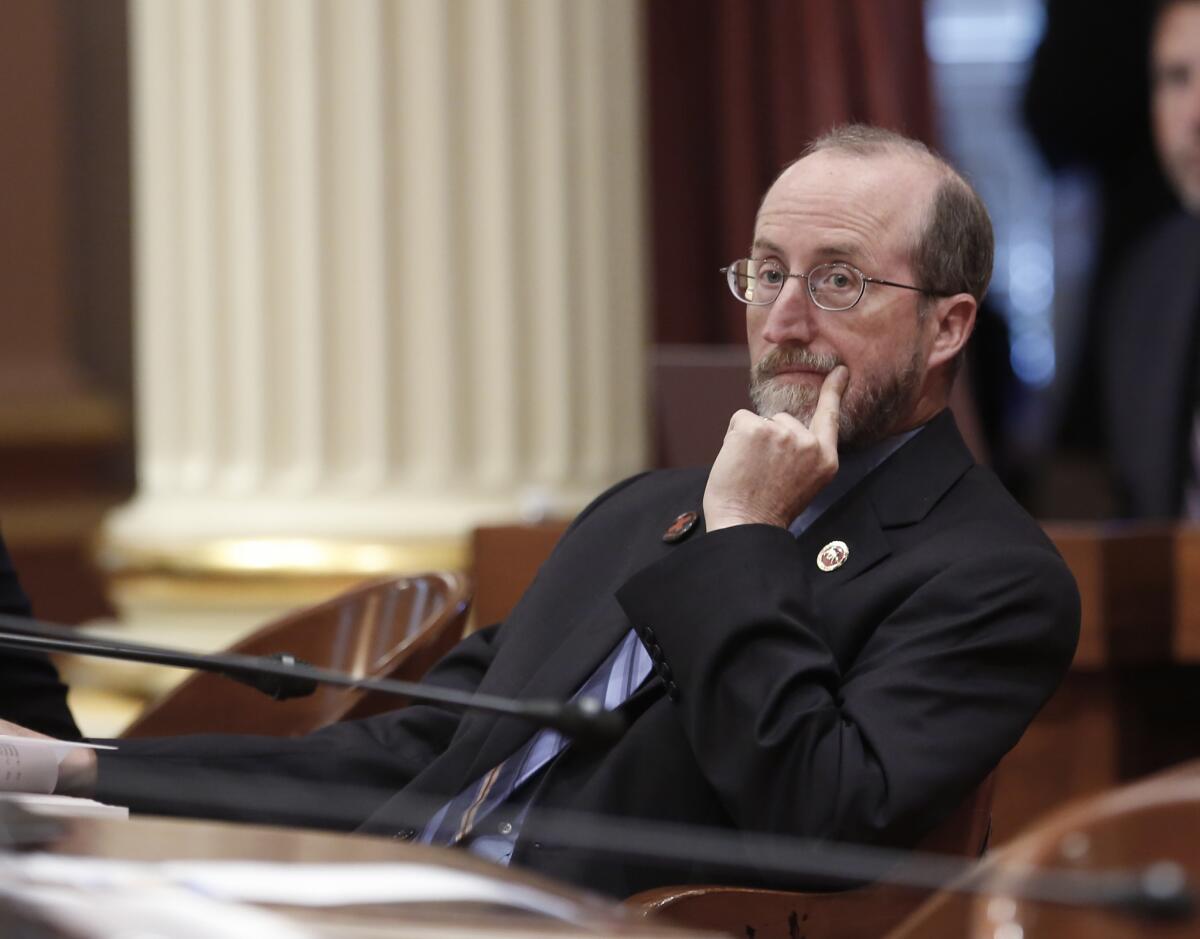
The chairman of a powerful state Senate committee stepped down from his post on Friday, the second Democrat to lose a prominent position after voting against last month’s $52-billion transportation package.
Sen. Steve Glazer (D-Orinda) submitted his resignation as chairman of the Senate Governmental Organization Committee. Glazer was the lone Democrat in the upper house to vote against the plan on April 6 that will raise gas taxes and impose new vehicle registration fees.
Neither Glazer nor Senate President Pro Tem Kevin de León (D-Los Angeles) would say whether the action was specifically prompted by the transportation vote.
‚ÄúHe and I had a private conversation,‚ÄĚ said De Le√≥n in an emailed statement. ‚ÄúHe agreed to resign.‚ÄĚ
Glazer declined any comment beyond a tweet he posted on Friday with a copy of his letter resigning the committee chairmanship.
Last month, Assemblyman Rudy Salas (D-Bakersfield) lost his committee chairmanship in the wake of voting against the transportation bill. Salas and Glazer were the only Democrats in the Legislature who refused to support the plan crafted by legislative leaders and Gov. Jerry Brown.
Brown had gone so far as to campaign for the proposal in Glazer’s district in late March. The two men have a long history, as Glazer ran Brown’s 2010 gubernatorial campaign and was a longtime political advisor before that.
Rep. Ro Khanna joins progressive group that plans to challenge incumbent Democrats
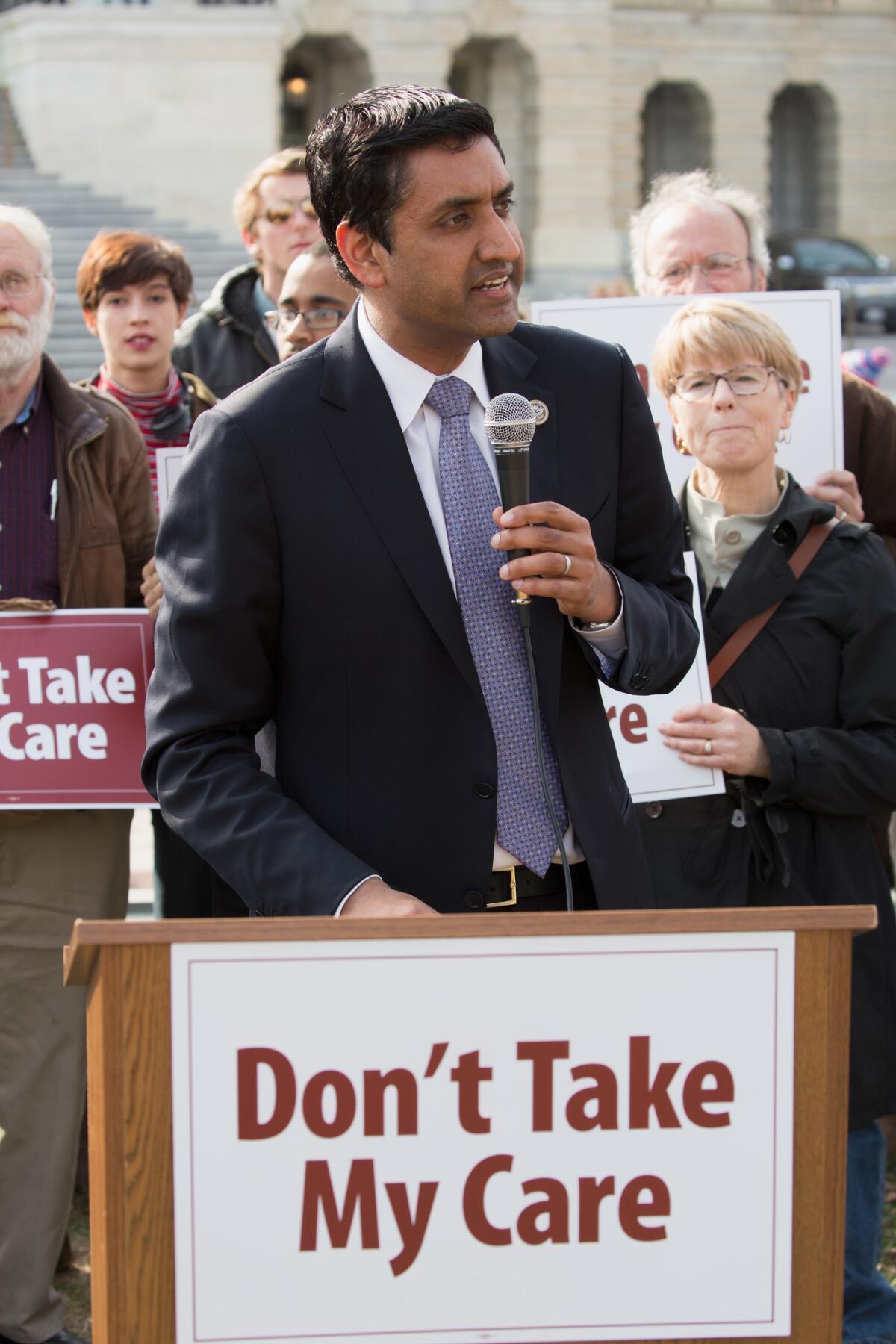
Silicon Valley freshman Rep. Ro Khanna became the first member of Congress to join a progressive group that has pledged to back Democrats who fit its progressive political views, even if it means challenging sitting Democrats to do it.
‚ÄúIt‚Äôs time that the Democrats had a clear, bold progressive vision and that we had spine and willingness to stand up for those bold, progressive ideas,‚ÄĚ the Fremont Democrat said on ‚ÄúThe Young Turks,‚ÄĚ a popular online progressive show.
The group was founded by Cenk Uygur, founder of the Young Turks video network, and several advisors from Vermont Sen. Bernie Sanders’ presidential campaign in January with the goal of expanding the progressive wing of the Democratic Party.
Earlier this week, the group, Justice Democrats, announced that it is endorsing Cori Bush over Rep. Lacy Clay, a Democrat who has represented his St. Louis district for nine terms.
Khanna beat incumbent Democrat Rep. Mike Honda in 2016 to win his seat. He also took on Honda in 2014.
Khanna said Democrats shouldn’t fear primaries. He said is believes that competitive elections will open the door to more diverse candidates and better ideas and, he hopes, help Democrats win back the House.
‚ÄúThis is a democracy. These seats don‚Äôt belong to me, they don‚Äôt belong to anyone. They belong to people and you ought to earn the right to represent folks. Competition makes you better,‚ÄĚ Khanna said on the show. ‚ÄúHow are we going to get more women, more minorities, more progressives elected if you can never primary anyone?‚ÄĚ
Khanna stressed that he isn’t going to back all challengers over incumbents, or even back everyone Justice Democrats endorses. He said he’s gotten some grief for backing House Minority Leader Nancy Pelosi (D-San Francisco) rather than her challenger, Stephen Jaffe.
Khanna’s decision to join Justice Democrats, along with his pledge not to take PAC or lobbyist money, are unexpected establishment-flouting moves for a man who just started his political career and hopes for a long term role in the party.
Khanna said he’s not worried about the ramifications.
‚ÄúI rocked the boat to get to Congress,‚ÄĚ he said. ‚ÄúThis was consistent with what I ran on.‚ÄĚ
He said two of the most popular candidates in 2016, Sanders and Donald Trump, ran on shaking up an entrenched political system.
‚ÄúI think the question is, are you going to be with the institutionalists of the party or with the people?‚ÄĚ he said. ‚ÄúWe‚Äôll see how it plays out.‚ÄĚ
Some Democrats, including Sen. Kamala Harris of California, have urged colleagues not to put policy purity ahead of winning majorities in the House and Senate.
Gov. Jerry Brown heading to China to talk climate change
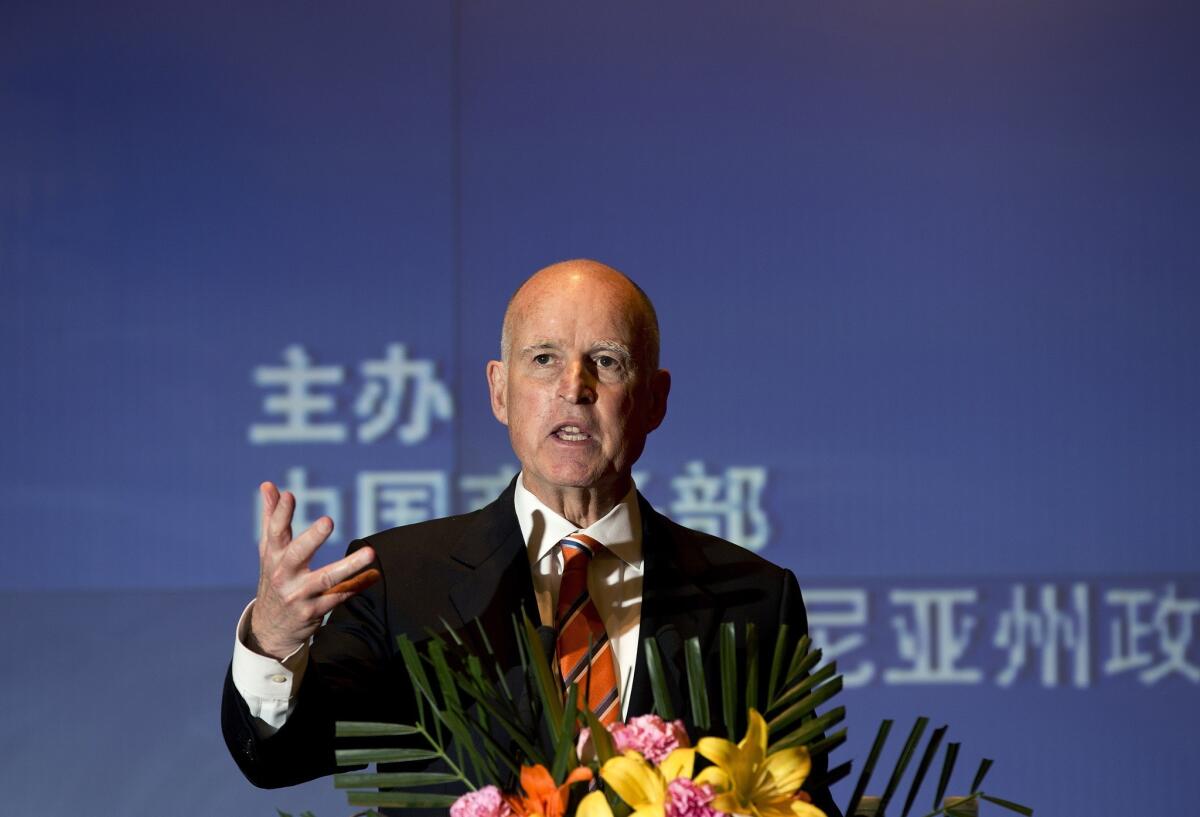
Gov. Jerry Brown is getting ready to go back to China four years after his last trip across the Pacific Ocean.
The first week of June, the governor plans to attend an international summit on clean energy and meet with other members of a coalition dedicated to fighting climate change. The coalition includes cities, states and provinces who have signed an international agreement promoted by Brown to reduce emissions at faster rates than called for under the Paris agreement on global warming.
During the weeklong trip, Brown is stopping in Beijing, Chengdu and Nanjing to talk with regional and national Chinese officials.
Brown has been trying to build closer relationships between California and China despite some saber rattling coming from President Trump in Washington.
Mike Woo, L.A.’s first Asian American city councilman, endorses Robert Lee Ahn for Congress
Some California Republicans are nowhere to be found after healthcare vote as the ‚Äėresistance‚Äô digs in for 2018

In Orange County on Tuesday night, Rep. Mimi Walters was nowhere to be found when more than 800 people showed up at an Irvine high school for an activist-organized ‚Äútown hall.‚ÄĚ
Outside Rep. Darrell Issa‚Äôs Vista office, hundreds of protesters, some dressed in hospital gowns or holding crutches, arrived for a ‚Äúsick in‚ÄĚ protesting his vote while the congressman raised money at a white sand beach resort in Florida. And 80 miles north, the handful of people who showed up to the Simi Valley office of Rep. Steve Knight talked to a single staffer while others were met with a locked door.
All three Republicans were reelected in districts won by Hillary Clinton and have been named as top targets by Democrats. All three, along with the rest of their Republican California colleagues, voted for the GOP plan to dismantle Obamacare last week. None of the three has announced public events in their districts this week, even though the House is out of session.
With the first major policy vote on President Trump‚Äôs agenda complete, members of the so-called ‚Äúresistance‚ÄĚ and the members of Congress who represent them seem to have gone to their corners as they prepare for what Democrats hope will be a competitive 2018 election season. More and more, left-leaning activists in these Republican-held districts are shifting from attempts to engage with their Congress members to promises to defeat them.
California’s tobacco tax is now in the top 10 nationwide

California voters approved a $2-per-pack increase to the cigarette tax in November ‚ÄĒ the first time the tobacco tax had been raised in almost two decades.
The decision has vaulted California into the top 10 highest cigarette taxes in the country, according to a new report from the nonpartisan Tax Foundation.
California’s previous $0.87 tax on a pack of cigarettes was 37th highest in the country. Now, the $2.87 tax ranks 9th.
California secessionists set to take another shot at ‚ÄėCalexit‚Äô ballot initiative
A previous effort to get a ‚ÄúCalexit‚ÄĚ initiative on the ballot ended less than three months after organizers were allowed to start gathering signatures.
Efforts to split California from the rest of the U.S. have been closely watched since the election of President Trump even though it’s not clear such an effort is viable.
Whether voter approval could make secession possible is a source of a debate among constitutional experts, with some saying there is no legal method for a state to do so. The U.S. Constitution only lays out the steps for a state to join the union.
Read more about the ‚ÄúCalexit‚ÄĚ effort and its backers.
California’s attorney general and 19 counterparts call for independent special counsel in Russia probe
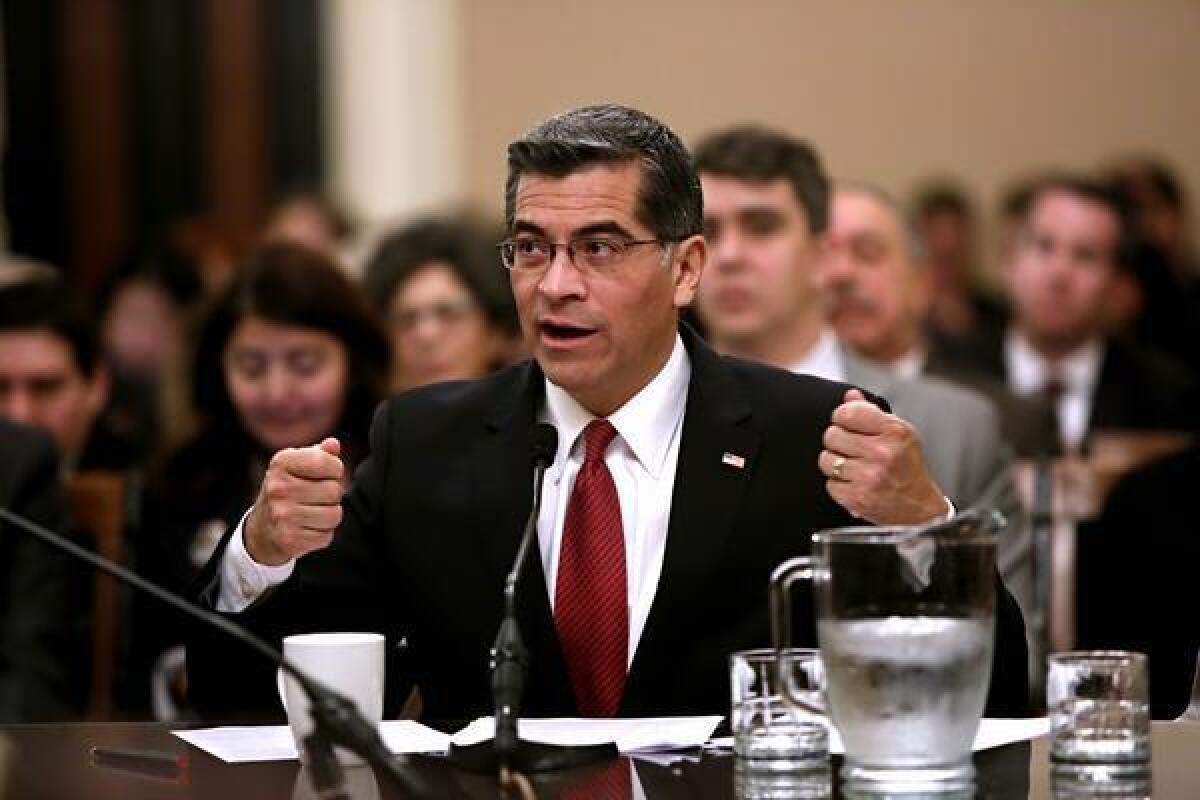
California Atty. Gen. Xavier Becerra on Thursday joined 19 other state attorneys general in calling for the immediate appointment of an independent special counsel to investigate possible Russian interference in the 2016 presidential election.
Two days after President Trump fired FBI Director James B. Comey, Becerra and other top attorneys sent a letter to the U.S. Department of Justice‚Äôs Deputy Atty. Gen. Rod Rosenstein, calling the firing during an active investigation ‚Äúa violation of the public trust.‚ÄĚ
‚ÄúAs prosecutors committed to the rule of law, we urge you to consider the damage to our democratic system of any attempts by the administration to derail and delegitimize the investigation,‚ÄĚ the letter states.
‚ÄúThe residents of our states and the American people deserve a thorough investigation that makes clear the extent of Russian meddling, any collusion by Trump campaign officials, and any cover-up,‚ÄĚ the letter added. ‚ÄúOnly the appointment of an independent special counsel ‚Ķ with full powers and resources, can begin to restore public confidence. We urge you to appoint a special counsel immediately.‚ÄĚ
The attorneys general who also signed the letter are from Massachusetts, Connecticut, Delaware, the District of Columbia, Hawaii, Iowa, Illinois, Maine, Maryland, Minnesota, New Mexico, New York, North Carolina, Oregon, Pennsylvania, Rhode Island, Virginia, Vermont and Washington.
Ahn gets endorsements from First AME church pastor, religious leaders in L.A.’s congressional race
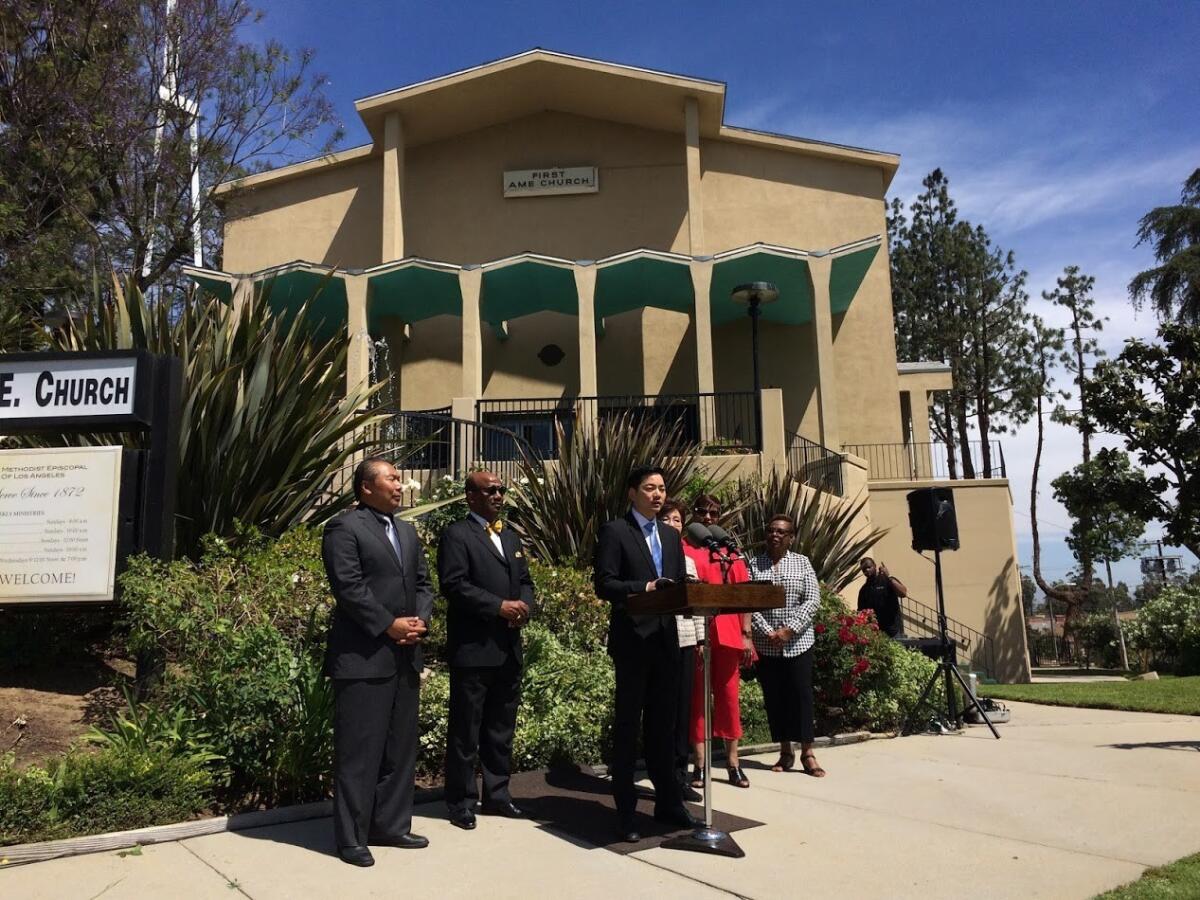
Robert Lee Ahn announced endorsements from three religious leaders Thursday, including the pastor of First African Methodist Episcopal Church in South Los Angeles.
The endorsement comes nearly two weeks after African American and Korean American community leaders commemorated the 25th anniversary of the L.A. riots with a ‚Äúunity‚ÄĚ event on the church‚Äôs grounds.
Ahn has been prominently featured at several events at First AME in recent weeks: He was introduced at a town hall there with California Sen. Dianne Feinstein and gave brief remarks at the April 29 commemoration.
‚ÄúAs a resident in the 34th District, it is my pleasure to offer my personal endorsement of [Ahn],‚ÄĚ said J. Edgar Boyd, the church‚Äôs pastor. Boyd said he‚Äôd spoken with Ahn about affordable housing and economic development and is ‚Äúconfident that he is the person who can do a good job in Washington, D.C.‚ÄĚ
The church is located just outside the district, but has long been seen as an influential force in the African American community. Ahn was also endorsed by Jae Yul Kim, president of the Council of Korean Churches of Southern California, and Jordan Wagner, pastor of Oasis Church in Koreatown.
At a news conference announcing the endorsements, Ahn said the pastors’ support is a symbol of the inclusiveness of his campaign.
‚ÄúThis campaign is for everybody,‚ÄĚ he said. ‚ÄúThe race-based politics, the identity politics of old, that‚Äôs the old paradigm.‚ÄĚ
Meanwhile, much of Ahn’s public campaigning has focused on the fact that he would be the first Korean American Democrat in Congress if elected.
Ahn has rolled out several endorsements this week, the first since the April 4 primary. Earlier this week, his campaign announced the support of Craig Miller, founder of AIDS Walk Los Angeles, and Davin Malasarn of the Gay Freedom Band of Los Angeles.
Assemblyman Jimmy Gomez, in the meantime, has added dozens of names to his list of big-name endorsements since advancing to the runoff.
Ahn and Gomez, both Democrats, will face each other in a June 6 runoff for the 34th Congressional District seat.
Tom Steyer still coy about whether he’ll run for governor
There are no changes to California’s Uber and Lyft oversight in the governor’s new budget
State utility regulators will continue to oversee Uber, Lyft and other ride-hailing companies for the foreseeable future under new plans unveiled by Gov. Jerry Brown on Thursday.
But Brown proposed shifting oversight of smaller transportation options, including intrastate moving companies, charter boats and hot air balloons, from the California Public Utilities Commission to different state and local agencies by mid-2018.
The governor argued the changes would allow the agency to focus on oversight for the ride-hailing, limousine and other industries under its control.
‚ÄúStreamlining the PUC‚Äôs existing functions will improve the program performance for the transportation responsibilities that remain with the PUC,‚ÄĚ Brown‚Äôs May budget revision says.
The PUC also regulates energy and gas companies and has been beset with years of problems in handling major energy crises, including the shutdown of the San Onofre nuclear power plant and the Aliso Canyon gas leak. The PUC’s president, among others, has argued the agency should jettison some authority so it could better oversee the energy sector.
Last year, Brown and lawmakers had reached a deal to move some responsibility over ride-hailing companies out of the agency amid a number of other changes. But major aspects of the plan fell apart at the end of the Legislative session.
The governor remains open to further changes to transportation oversight at the PUC, the May budget revision says.
Brown’s budget offers California counties extra cash to offset higher costs for in-home care
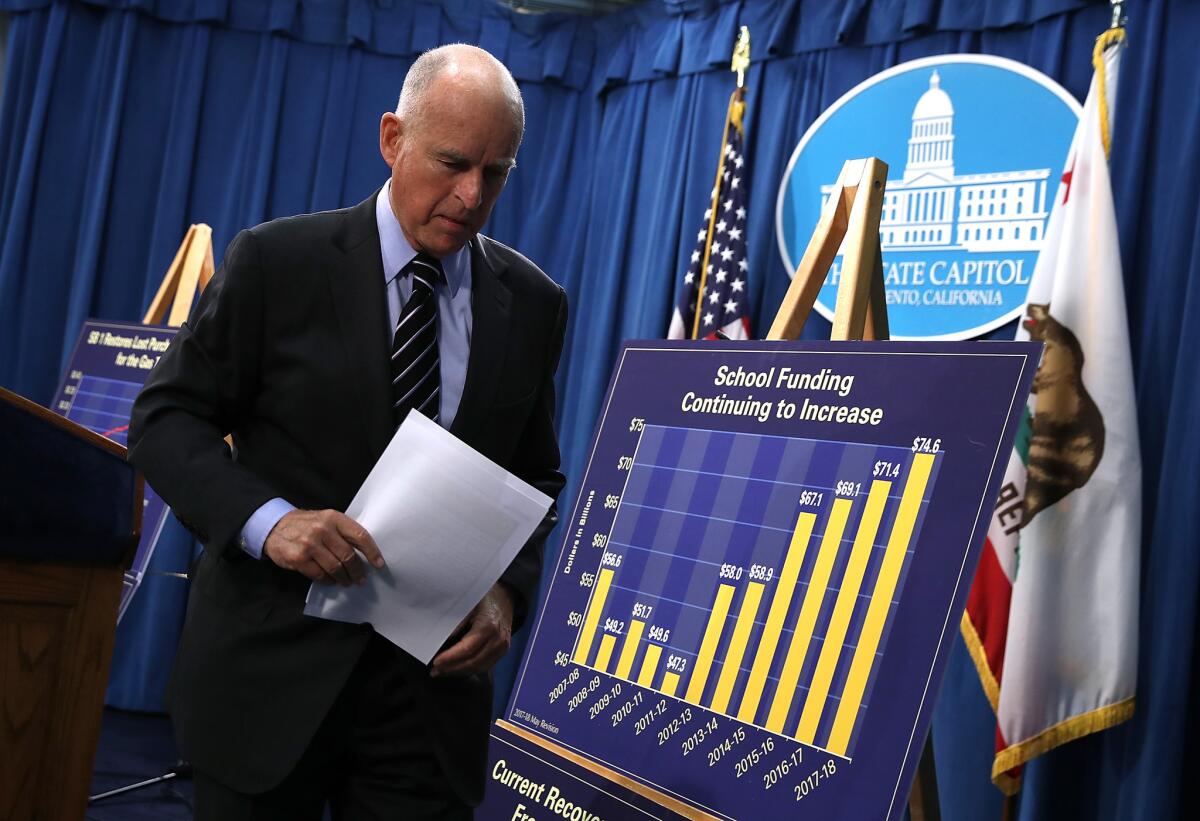
California counties were alarmed when Gov. Jerry Brown proposed in January that they take on $600 million in costs related to the state’s In-Home Supportive Services program. Now, Brown wants to offer the counties some cash to soften the blow.
In his revised budget proposal released Thursday, Brown would provide $400 million to counties in the 2017-18 budget year. That aid would decrease in subsequent years.
The extra money is meant to quell concerns from counties that feared strains on their budgets due to Brown’s proposed revamp of how they shared costs of the in-home care program with the state.
The IHSS program, which provides care to more than 500,000 low-income, elderly and disabled Californians, has been a perpetual source of budget strife. This year, counties were quick to raise alarms of potential cuts they would be forced to make to other services to shoulder the added IHSS costs.
Brown said conversations with the counties were ‚Äúnumerous and they were cordial and they were convincing. That‚Äôs why we put money back in the budget.‚ÄĚ
Matt Cate, executive director of the California State Assn. of Counties, said the added assistance in Brown‚Äôs new plan was ‚Äúreally important to us.‚ÄĚ
‚ÄúWe think we‚Äôll be able to avoid significant cuts to vital county services as a result of the infusion of cash from the May revision,‚ÄĚ Cate said.
While the outlook for counties may be rosier than it was in January, Cate warned that the extra dollars were a short-term fix for a larger problem.
‚ÄúThe costs of the program are going to continue to rise,‚ÄĚ Cate said. ‚ÄúThe state‚Äôs general fund support is going to come down.‚ÄĚ
Without changes, Cate warned, ‚Äúit will be difficult to sustain the underlying costs of the program.‚ÄĚ
Governor is pessimistic on major deal to address California’s housing affordability crisis
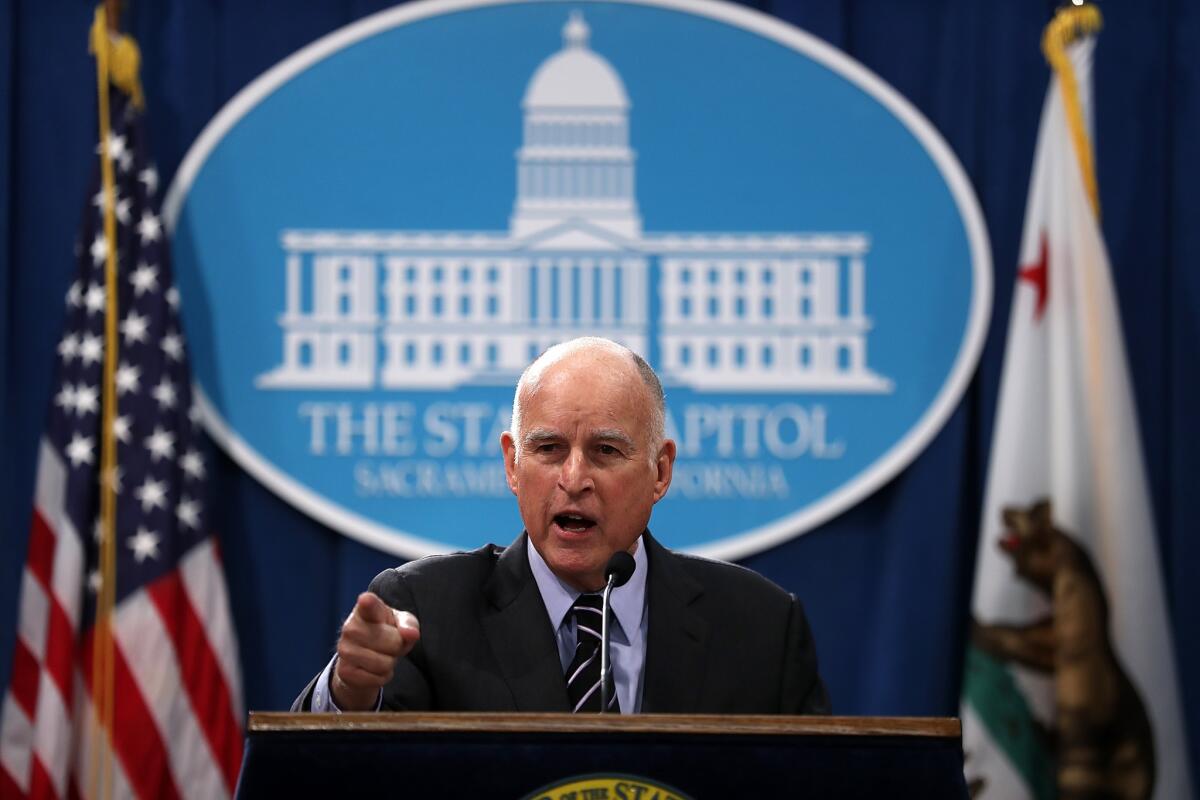
Gov. Jerry Brown proposed no new money or policy changes to address the state’s housing affordability crisis in the May revision to the state budget, saying that the state shouldn’t spend money on low-income housing unless it also makes politically hard decisions to lower building costs.
‚ÄúI don‚Äôt think we should throw money at the housing problem if we don‚Äôt adopt real changes that make housing production more efficient and less costly,‚ÄĚ Brown said at a Thursday morning press conference. ‚ÄúWe‚Äôve got to do that first.‚ÄĚ
In last May’s budget revision, Brown unveiled a plan to limit some local review over developments that included units for low-income families and later agreed to tie $400 million in housing funding to its passage. But lawmakers balked at the governor’s proposal and it went nowhere.
Brown reiterated Thursday that he would only be willing to spend money on housing if legislators also agreed to reforms that lower construction costs. The average cost of building a low-income housing unit is $332,000.
Citing last year‚Äôs experience, the governor called making those changes ‚Äúdifficult.‚ÄĚ In 2016, powerful labor and environmental groups opposed the governor‚Äôs housing plan, contending that it should require union-level wages for construction workers and leave largely unchanged state environmental laws governing development.
‚ÄúPeople rail against red tape, but they become very accustomed to it,‚ÄĚ Brown said of housing regulations. ‚ÄúIn fact, they even become addicted to it.‚ÄĚ
State legislators have proposed 130 bills this year to address the state‚Äôs housing affordability crisis ‚ÄĒ one-third of California renters, for instance, spend more than half their income on housing.
Major bills still in play include plans to raise low-income housing money through new real estate transaction fees and to end the state’s mortgage interest deduction on many second homes. There is also a proposal to streamline local review in jurisdictions behind on their state housing production goals.
Despite doubts and disagreements, Brown still wants a deal on cap and trade in the next month
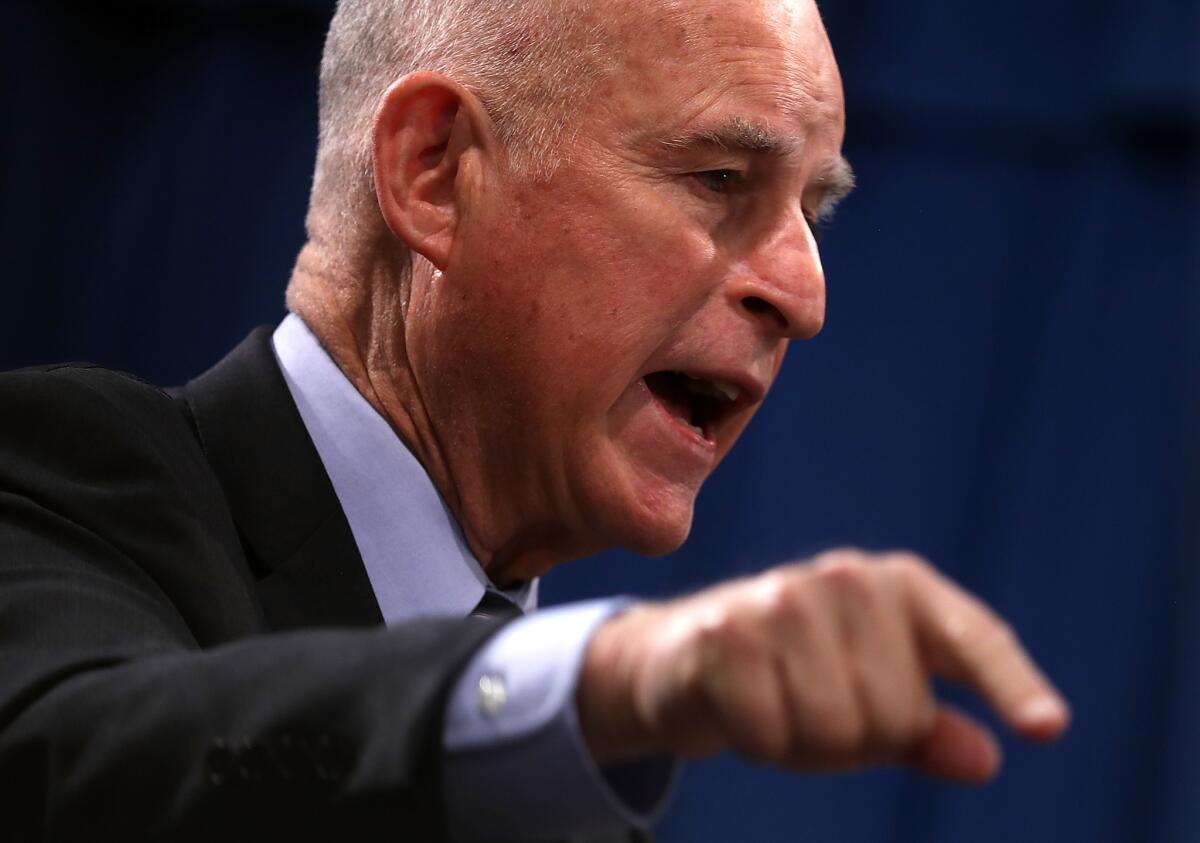
Gov. Jerry Brown said Thursday there‚Äôs ‚Äúa very good chance‚ÄĚ of reaching a deal in the next month to extend California‚Äôs cap-and-trade program for reducing greenhouse gas emissions.
Brown has urged lawmakers to finish negotiations before the June 15 deadline for approving a new state budget.
There are significant disagreements over how the program should operate, but the governor pointed to support from business groups and even some Republicans.
‚ÄúThe constituency is getting bigger, although there are a number of legislators who aren‚Äôt there yet,‚ÄĚ Brown said during a Capitol press conference.
Reaching the two-thirds vote threshold the governor wants to insulate the program from legal challenges could prove difficult -- especially soon after a bruising battle over raising the gas tax to pay for road repairs -- and some legislative leaders have been skeptical of the deadline.
‚ÄúIt‚Äôs a lot to do,‚ÄĚ Assembly Speaker Anthony Rendon (D-Paramount) said Wednesday.
Brown emphasized the money generated by cap-and-trade that is being spent to reduce greenhouse gas emissions in disadvantaged neighborhoods.
‚ÄúI don‚Äôt think we should turn our backs on the low-income communities of California,‚ÄĚ he said.
Brown budget gives attorney general’s office more funding to fight Trump policies
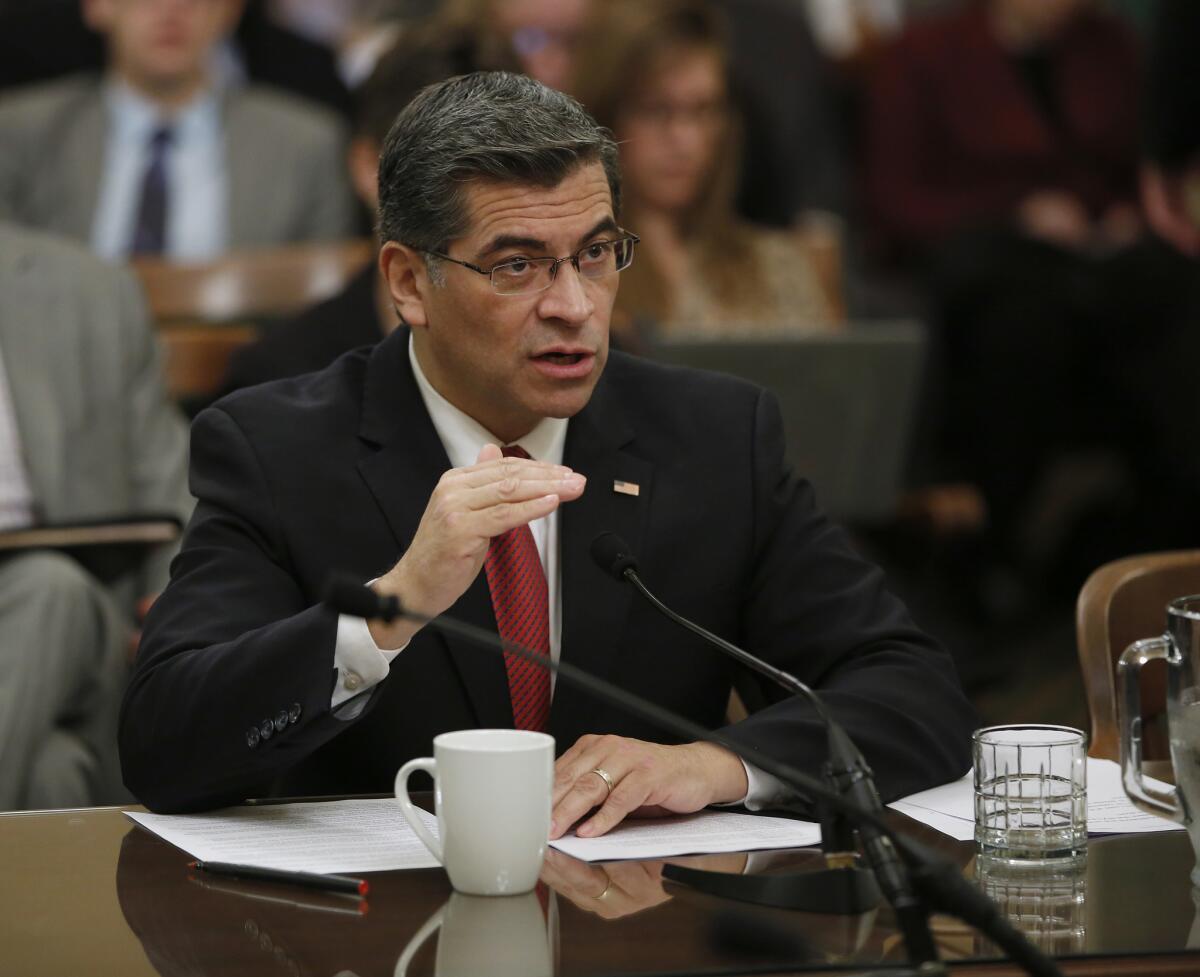
Gov. Jerry Brown proposed Thursday to increase the budget of Atty. Gen. Xavier Becerra to pay for continuing the barrage of lawsuits that have been filed challenging executive orders by President Trump on immigration, the environment and healthcare.
The revised budget adds $6.5 million to provide 19 attorneys and 12 support staff focused primarily on health care, environmental, immigration and consumer protection issues, according to Chris Moyer, a spokesman for Becerra..
‚ÄúThere are unique litigation expenses right now and the attorney general feels that he wants to pursue those and I think he should be given some latitude,‚ÄĚ Brown told reporters. ‚ÄúThere are some real legal issues [raised] by Mr. Trump and his deputies there in Washington. We do have to defend our rights. I think as an initial investment its reasonable but certainly I would be watching it carefully over the next year.‚ÄĚ
Becerra said he would put the additional resources to good use.
‚ÄúI‚Äôm grateful to Gov. Brown for providing the Department of Justice with additional resources in this budget to fight on behalf of Californians in this unprecedented time,‚ÄĚ Becerra said.
Updated at 4 pm to include comment from Becerra.
Gov. Jerry Brown says California‚Äôs tax board is ‚Äėa mess‚Äô and reform is needed
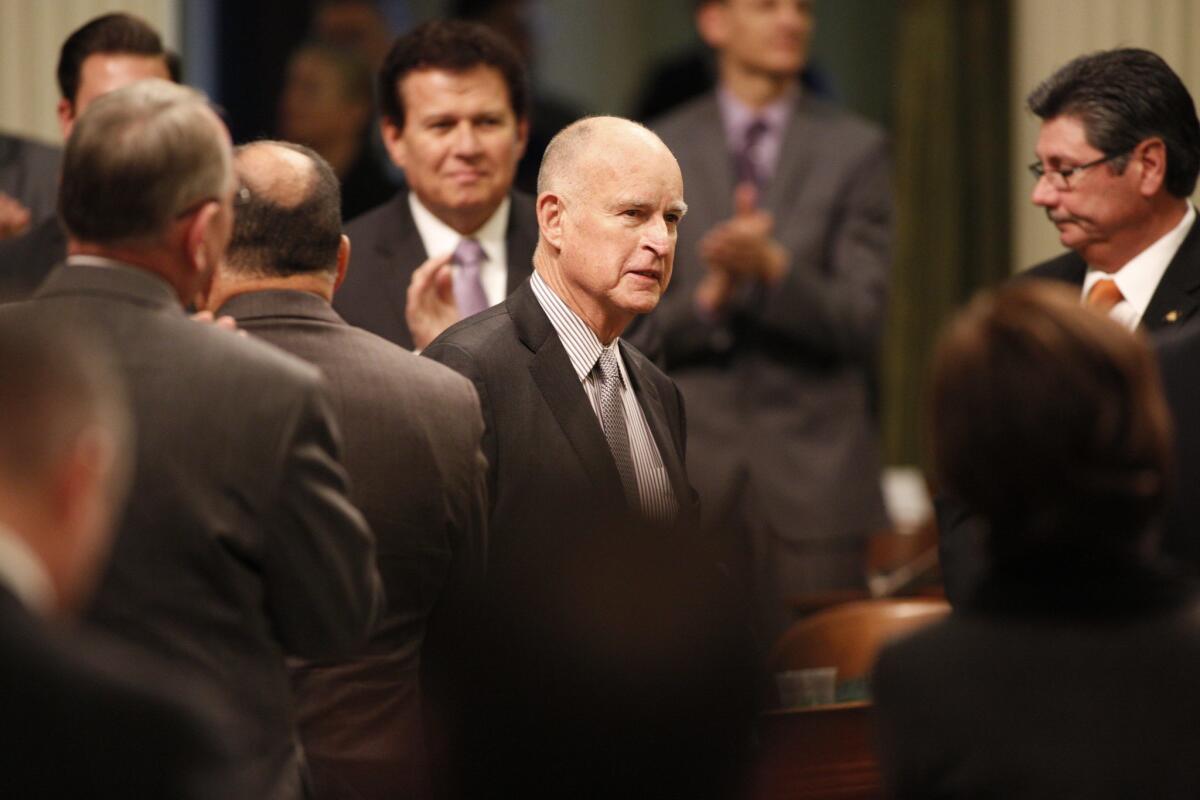
Gov. Jerry Brown said Thursday the state’s scandal-plagued tax board will have to undergo reform, but it is unlikely the panel would be merged with other state financial agencies.
A recent Department of Finance audit found that the state Board of Equalization ‚Äúhad difficulty providing complete and accurate documentation‚ÄĚ in response to basic financial inquiries and could not consistently explain why some tax money was misdirected to the wrong state accounts.
In response, Brown stripped the board of its power to hire and approve contracts and asked for an investigation by the state Department of Justice.
‚ÄúThey‚Äôve got themselves into a mess there,‚ÄĚ Brown told reporters Thursday as he announced a revised state budget. ‚ÄúWe‚Äôve put in some controls, and it‚Äôs up to the Legislature to come up with some changes that will make sense. Those are details to be worked through. We are doing that right now.‚ÄĚ
Some state officials have proposed ending the board’s unique status as the only elected tax board in the country and merging its operations with other state agencies that handle finances.
In 2004, then-Gov. Arnold Schwarzenegger proposed to combine the board’s work with the responsibilities of other nonelected agencies. Brown was skeptical of that idea on Thursday.
‚ÄúWe are always ready to dust off the old idea where we combine the financial institutions into one agency but that has always been a non-starter for decades,‚ÄĚ Brown said. ‚ÄúI think we should reform as much as we can.‚ÄĚ
Gov. Jerry Brown offers more cash in his new budget, jabs lawmakers who follow Trump’s lead
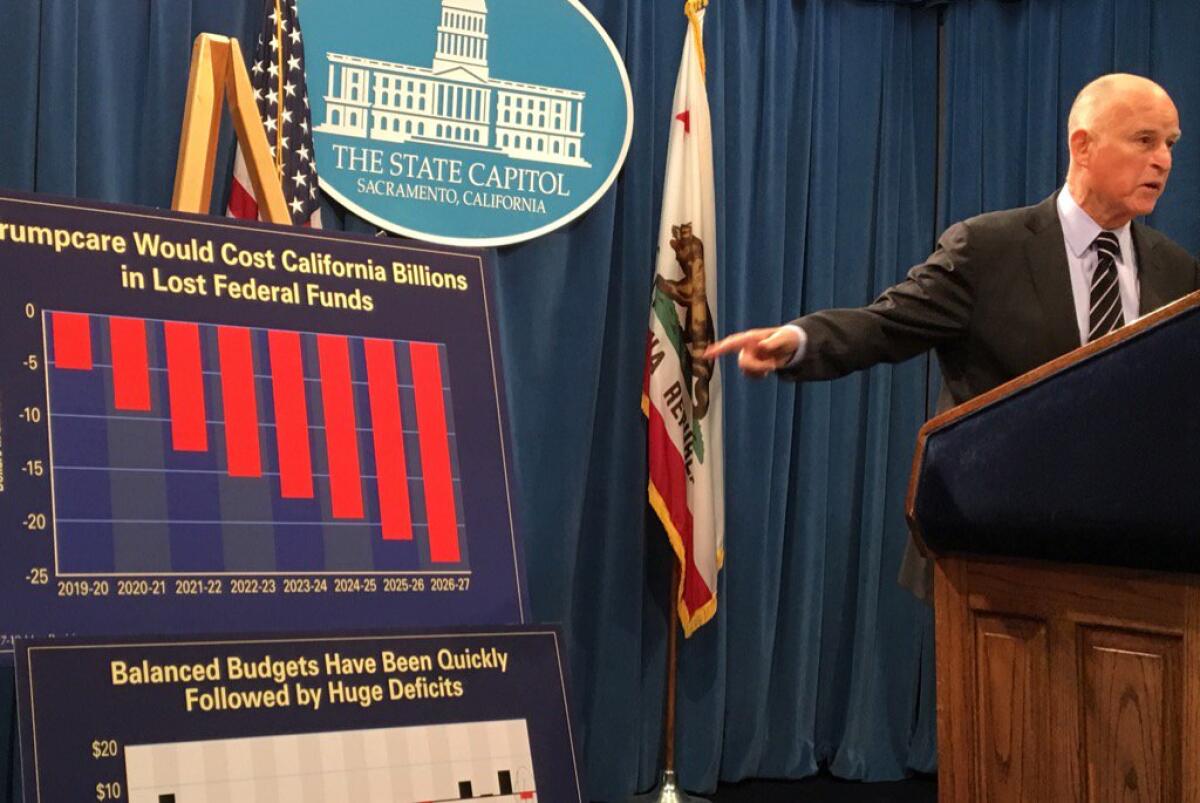
Although California Gov. Jerry Brown sent legislators a budget plan on Thursday with a surprisingly new optimism on tax revenues, he warned of major cuts under national healthcare changes.
And he specifically called out Republican members of Congress from California for voting for a plan that hurt their constituents.
‚ÄúI really don‚Äôt understand why those people in swing districts are following the dictates of Donald Trump,‚ÄĚ Brown told reporters at the state Capitol. ‚ÄúThey‚Äôre going to have to do penance for it.‚ÄĚ
The governor’s revised budget raised revenue projections from his January plan by $2.5 billion, historically the kind of news that has offered a shot of adrenaline into efforts by lawmakers to expand state spending.
Read Gov. Brown’s revised state budget for 2017-18 >>
Where Brown projected a $1.6-billion deficit when he proposed his January budget, the improved tax collection has shrunk the overall shortfall to $400 million, according to the governor’s budget staff.
Still, Brown urged lawmakers not to view the more upbeat forecast as a reason to raise their expectations on what he believes will be a weaker economy in the near future.
‚ÄúMake no doubt about it,‚ÄĚ he said, ‚Äúcuts are coming over the next few years.‚ÄĚ
Even so, the updated budget proposes to fully fund higher salaries for child care providers ‚ÄĒ a shift from Brown‚Äôs winter plan to cancel those new payments. It also scales back his effort to cut state funding for a program that streamlined health services for seniors and low-income families. That change marks a victory for county governments, which otherwise would have had to shoulder almost $600 million in new spending by next summer.
The governor’s January budget sought to cancel the state’s participation in a 2012 program, the Coordinated Care Initiative, which allows Medi-Cal, Medicare and in-home support services to be offered through a single delivery system.
The revised budget will leave $400 million of the program’s cost with the state and gradually shift costs to counties in the future. Local officials said their budgets couldn’t handle the total extra costs in a single year.
The new budget plan assumes repair of the Oroville Dam’s smashed flood spillways, but doesn’t yet provide money. State officials have put repairs at $275 million. Both the main and emergency spillways of the Butte County dam were damaged so severely in February by water rapidly flowing out of the reservoir that there was concern the structures might rupture. That danger led to the brief evacuation of almost 200,000 residents.
State officials told lawmakers last month they intend to finish repairs by Nov. 1, in time for next winter’s rains.
Brown, who stuck to his tradition of relying on a series of large poster-board sized charts to make his point about fiscal caution, said California’s roller-coaster revenue system will undoubtedly again plunge the state budget into deep deficits. And the state’s oldest governor invoked the sweep of time to remind reporters of previous bleak years.
‚ÄúOne of the things you do when you‚Äôre 79 is you think a lot about the past,‚ÄĚ he said.
Gov. Jerry Brown‚Äôs budget holds back $50 million from UC to ‚Äėhold their feet to the fire‚Äô on reform
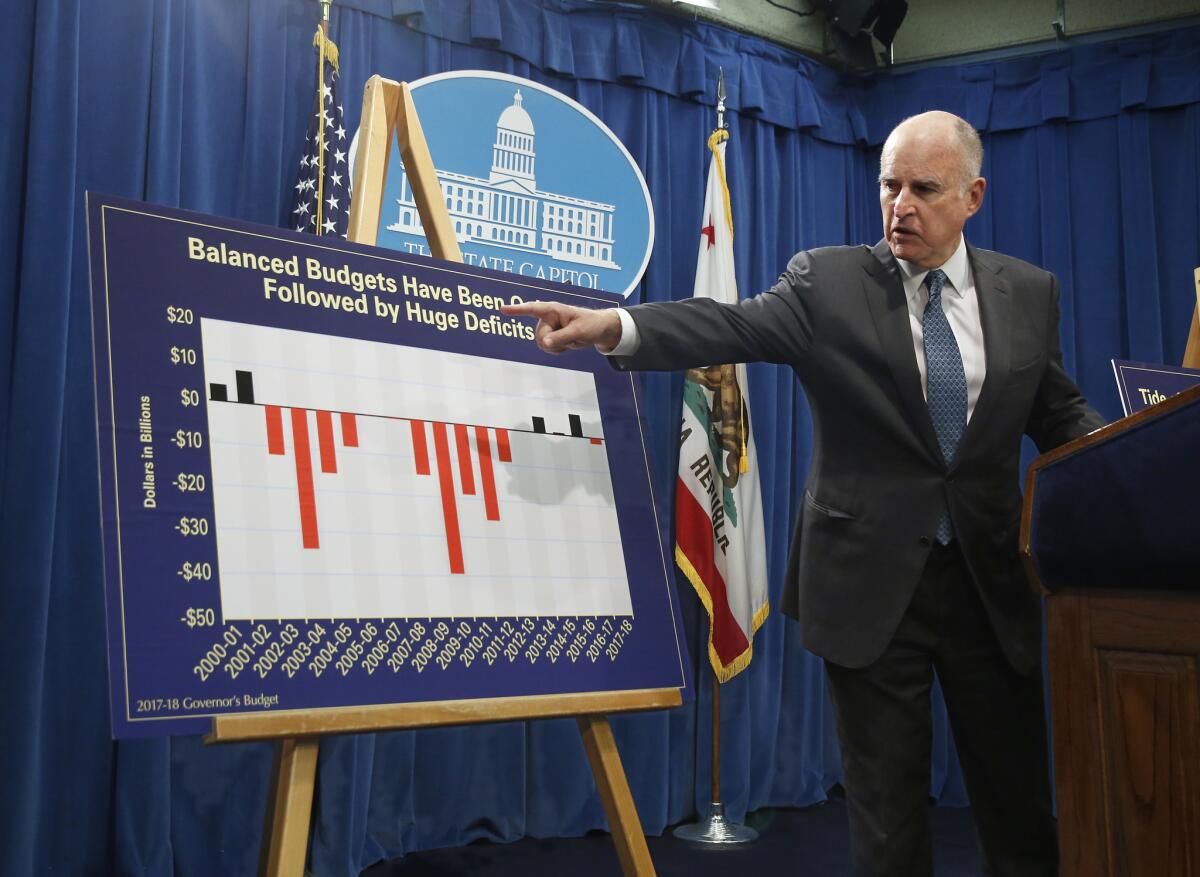
Gov. Jerry Brown’s revised budget holds back $50 million from the University of California until it adopts reforms recommended by a scathing state audit that found the system has tens of millions of dollars in undisclosed reserves and paid excessive salaries to administrators.
‚ÄúI put the $50 million in there so we can hold their feet to the fire,‚ÄĚ Brown told reporters in announcing the May revision to his annual budget. ‚ÄúThat‚Äôs the way we will reinforce the audit. They have to make some reports and create some transparency, and we will keep the money until they perform to the auditor‚Äôs satisfaction.‚ÄĚ
Brown stopped short of calling for the resignation of UC President Janet Napolitano when asked about it by a reporter.
‚ÄúI‚Äôm not in the business of opining on my colleagues,‚ÄĚ Brown said. ‚ÄúMost people think she‚Äôs doing a pretty good job. That‚Äôs certainly the view of the regents and I think a lot of others. I have my issues with the university. I think their salaries are way too high, especially the administrators.‚ÄĚ
Jerry Brown‚Äôs new budget doesn‚Äôt account for potential Obamacare cuts: ‚ÄėWhat we have to do is ugly‚Äô
Republican Rep. Tom McClintock calls for independent prosecutor to take over FBI’s Russia investigation
Rep. Tom McClintock (R-Elk Grove) has called for an independent prosecutor to take over the FBI investigation into Russia’s interference in the 2016 election and the Trump campaign’s possible ties to it.
His comment comes on the heels of President Trump’s firing of FBI Director James Comey.
‚ÄúThe timing of the firing makes it necessary to hand the investigation over to an independent prosecutor so it‚Äôs above reproach,‚ÄĚ McClintock said.
McClintock, who made the statement in an interview on Capital Public Radio (listen below), is the second California Republican to endorse an independent prosecutor, joining Rep. Darrell Issa (R-Vista), who did so months ago. A handful of other Republicans have also asked for an independent prosecutor or something similar.
‚ÄúI don‚Äôt think there is any evidence suggesting that there was collusion between the Trump campaign and the Russians, and certainly none has been produced despite enormous efforts,‚ÄĚ McClintock said, adding that the politics of the situation were coloring public perception. He added repeatedly that a special prosecutor should be appointed to look at other topics, such as Hillary Clinton‚Äôs emails and use of the IRS ‚Äúto intimidate tea party leaders,‚ÄĚ which McClintock said Comey‚Äôs FBI didn‚Äôt investigate thoroughly enough.
McClintock also agreed with colleagues like Rep. Ed Royce (R-Fullerton), who on Wednesday said the timing of Comey‚Äôs firing ‚ÄĒ shortly after he confirmed that the bureau was looking at the Trump campaign and days before he was set to testify before Congress again ‚ÄĒ raised questions.
Still, McClintock dismissed the idea that firing Comey was meant to thwart the FBI investigation into Russia’s interference in the election.
‚ÄúIf it was, it‚Äôs a funny way to impede the investigation, because the firing now puts Andrew McCabe in charge of the FBI, whose wife is a Democratic activist,‚ÄĚ he said.
Acting FBI Director Andrew McCabe’s wife, Jill McCabe, is a Democrat who ran unsuccessfully for the Virginia state Senate in 2015.
Andrew McCabe, who contradicted several White House claims about Comey’s firing during an appearance before the Senate Select Intelligence Committee on Thursday, is thought to be among the potential Comey replacements, along with two Republican lawmakers and at least one law enforcement official.
Listen to Tom McClintock’s interview on Capital Public Radio
UPDATES
12:11 p.m.: This article was updated with audio of Rep. Tom McClintock’s interview and additional comments from McClintock.
10:57 a.m.: This article was updated with additional comments from McClintock and details about acting FBI Director Andrew McCabe.
This article was originally posted at 9:22 a.m.
California Chamber of Commerce leans into fight to preserve cap-and-trade program
When it comes to climate change, the California Chamber of Commerce is best known for suing over the state’s cap-and-trade program, a cornerstone of the state’s efforts to reduce greenhouse gases.
But the lawsuit has faltered, and the powerful business group now wants to work with lawmakers to extend the program, which requires companies to buy permits to release emissions into the atmosphere. The chamber also wants to strike a deal in the next month, a deadline pushed for by Gov. Jerry Brown.
‚ÄúNow is the time,‚ÄĚ Allan Zaremberg, the organization‚Äôs president, said in an interview. ‚ÄúNot a year or two from now. It gets harder, not easier.‚ÄĚ
The stance is further evidence of the shifting political landscape on climate change since Brown signed legislation last year setting a tough new target for reducing emissions by 2030. Business groups, including the Western States Petroleum Assn. and the California Business Roundtable, want to preserve cap-and-trade to prevent the state from turning to more onerous regulations.
They also want to prevent lawmakers from tying the program to air quality goals or making it function more like a tax, two proposals that have been introduced this year. Zaremberg fears the higher costs for companies that could result, saying that would send the wrong signal to other states.
‚ÄúIf you start out with the most expensive [policies], the naysayers are going to have ammunition to say, why would we want to be like California?‚ÄĚ he said. ‚ÄúWe want them to say, let‚Äôs be like California.‚ÄĚ
The chamber may still appeal last month’s court decision rejecting its argument that cap-and-trade has functioned as an unconstitutional tax. Zaremberg said the lawsuit resulted from the chamber’s concern that the program wasn’t approved by the two-thirds vote of the Legislature necessary to raise new revenue, not because it opposed the idea of cap-and-trade.
As lawmakers debate cap-and-trade, the chamber hopes extending the program will be done with a two-thirds vote, ‚Äúallowing revenues to be raised for projects that are important to communities and constituencies around the state,‚ÄĚ according to a letter sent to lawmakers on Wednesday.
‚ÄúCalifornia‚Äôs economy, our residents and consumers deserve our best efforts to keep costs down while meeting this ambitious goal,‚ÄĚ the letter said.
Feinstein goes harder on Comey‚Äôs firing: Justice Department memo appears written to ‚Äėjustify a preordained outcome‚Äô
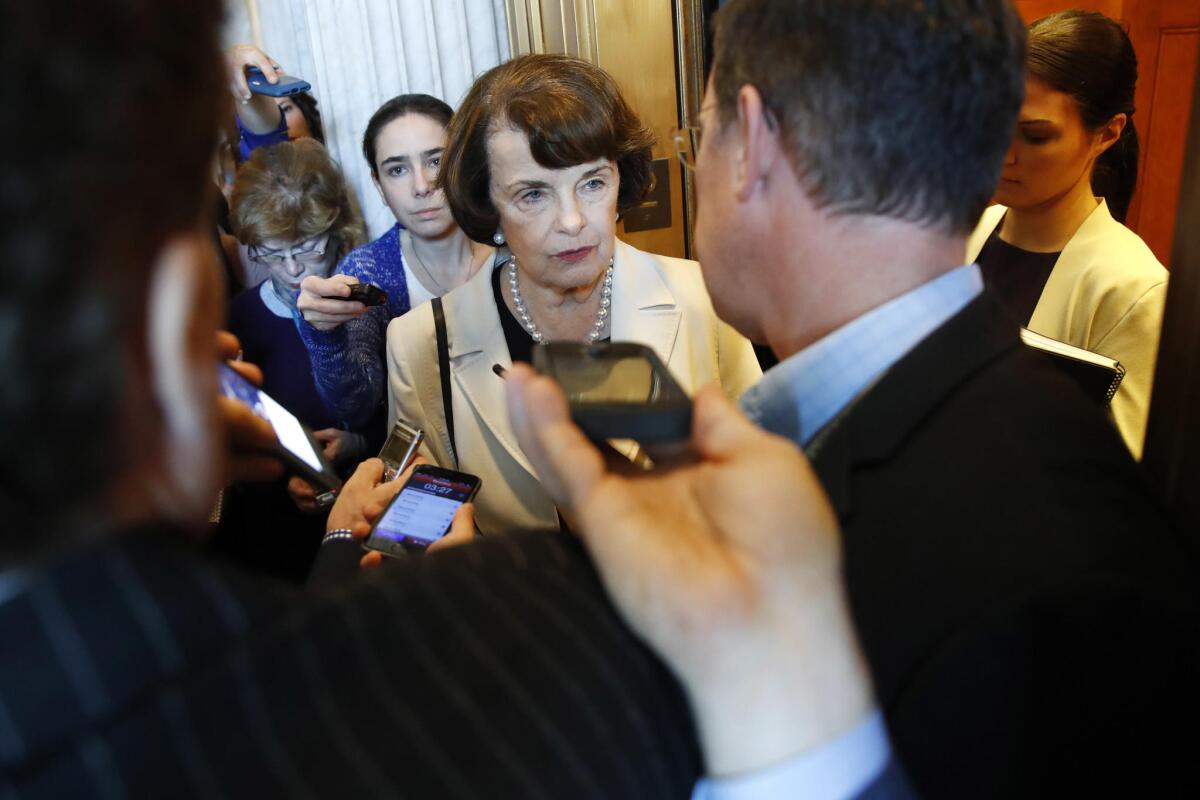
The memo used by the Trump administration to explain the firing of FBI Director James Comey ‚Äúappears to have been hastily assembled to justify a preordained outcome,‚ÄĚ Sen. Dianne Feinstein (D-Calif.) said in a statement Thursday.
Though she initially held back, in keeping with a temperament the long-serving senator is known for, Feinstein’s criticism of Comey’s firing has escalated since Tuesday.
The White House has leaned heavily on a memo written by Deputy Atty. Gen. Rod Rosenstein to push back against an outcry from Democrats and some Republicans over the firing of a man who was leading an investigation involving Trump’s presidential campaign.
Feinstein said in a statement she has read the memo three times and ‚Äúwith each read I‚Äôve become more troubled by the contents of this unusual document.‚ÄĚ
‚ÄúGiven Rosenstein‚Äôs legal expertise and 27-year Justice Department career, I would have expected him to produce a detailed and comprehensive rationale for Director Comey‚Äôs firing including input from the agents and staff who worked with Director Comey,‚ÄĚ she said. ‚ÄúBut instead of a document that provides meaningful analysis, the memo reads like a political document. It includes quotes from op-eds and television appearances that are as old as six months. It doesn‚Äôt include any contemporary insights from inside the FBI.‚ÄĚ
Feinstein has called for a special commission to investigate Russian attempts to influence the 2016 presidential election and its potential ties to the Trump campaign.
She said Thursday that a special counsel should be chosen to lead the investigation, and that Rosenstein and Atty. Gen. Jeff Sessions should recuse themselves from the process.
‚ÄėAre we the party of Wall St. or the party of Occupy?‚Äô: Candidates to lead state Democrats hold testy debate
The contrast between the leading contenders to become the next chairperson of the California Democratic Party was clear at a debate between the hopefuls Wednesday: Longtime party official Eric Bauman said the party must expand on its existing successes, while activist Kimberly Ellis countered that it had lost its way and needs to be fundamentally overhauled.
‚ÄúI‚Äôm running not just to bring a new vision to the party. I‚Äôm running not just to bring new perspective, not just to change the tone, tenor and culture of our politics,‚ÄĚ said Ellis, the candidate who received loudest cheers and applause from the hundreds of delegates at the party gathering in a San Diego union hall. ‚ÄúI‚Äôm running to be chair of the California Democratic Party to redefine what it means to be a Democrat and get this party back to basics.‚ÄĚ
The California Democratic Party, the largest and most liberal in the nation, has enjoyed years of electoral and financial success. But it is at a crossroads: The progressive forces that coalesced behind Bernie Sanders in last year’s presidential primary and railed against the Democratic establishment are now seeking to redefine the state party.
For Bauman, who entered the race viewed as the front-runner and has since seen it tighten, it presents a challenge. He is an establishment candidate who has spent nearly a quarter-century serving in leadership positions in various Democratic groups.
‚ÄúWe‚Äôre the only state party in the country that actually knows how to do it right,‚ÄĚ said Bauman, who is vice chairman of the state party and chairman of its Los Angeles County chapter. ‚ÄúI believe I have the experience and the relationships to raise the California Democratic Party to the next level.‚ÄĚ
The candidates largely agreed on several issues, such as creating a statewide single-payer healthcare system. But as the debate wore on, the exchanges between the candidates grew increasingly snippy.
Orange County attorney Lenore Albert-Sheridan, a lesser-known candidate who entered the race just weeks ago, repeatedly blasted Ellis for raising money from wealthy donors. She accused Ellis of failing to understand party rules and procedures, including how endorsements are awarded or committee appointments are made.
‚ÄúIt‚Äôs important you elect someone who actually understands how this party works,‚ÄĚ she said. ‚ÄúAre we the party of Wall Street or the party of Occupy?‚ÄĚ
When the candidates were asked to describe how their past experiences showed the type of leaders they would be, Bauman touted successes that he said included growing the membership of the Los Angeles County Stonewall Democrats, increasing the county party’s budget from $50,000 to $1.7 million and advising successful state and local political campaigns.
He said there is a reason he had led groups and campaigns for so many years: ‚ÄúThat‚Äôs because I‚Äôm good at them and I keep them going and keep them fresh and keep us winning.‚ÄĚ
Ellis quipped that Bauman sounded like a ‚Äúgreat field director,‚ÄĚ adding that after she won the chairmanship and started to build her team, she ‚Äúwould encourage him to apply.‚ÄĚ
Ellis also took a jab at Bauman for recent low voter turnout in Los Angeles County. In response, Bauman said Ellis was cherry-picking facts and failing to mention turnout in the November general election.
‚ÄúOne thing we should do up here is tell the truth,‚ÄĚ he said.
One topic was conspicuously absent from the debate: Bauman‚Äôs claim earlier this week that political rivals were targeting him with false rumors of ‚Äúengaging in inappropriate behavior with 14- and 16-year-old boys.‚ÄĚ
But after Ellis obliquely questioned Bauman‚Äôs integrity, mentioning pharmaceutical money his consulting firm had taken during a ballot measure fight over prescription drug costs, he appeared to nod to the issue, calling the level of attacks in the race ‚Äúdespicable.‚ÄĚ
‚ÄúIt is shameful, it is unacceptable,‚ÄĚ he said.
Gov. Brown to budget $1.5 million to clean up after illegal pot farming along North Coast
Gov. Jerry Brown‚Äôs amended budget to be released Thursday includes $1.5 million to pay for cleanup of environmental damage caused by illegal marijuana grows in the Emerald Triangle ‚ÄĒ the counties of Humboldt, Trinity and Mendocino, officials said Wednesday.
Brown’s proposal comes just months before the state is expected to begin issuing licenses for growing pot to be sold for recreational and medical uses.
‚ÄúThese illegal grow sites do untold damage to forests and wildlife along the North Coast,‚ÄĚ Brown said in a statement Wednesday, adding that with the help of Assemblyman Jim Wood, ‚Äúwe‚Äôre doing something about it.‚ÄĚ
Wood, a Democrat from Healdsburg, said illegal pot growing operations often use banned rodenticides that also kill Pacific fishers, deer and other smaller animals. The deadly contamination spreads when the smaller animals are eaten by mountain lions, bobcats, hawks and spotted owls.
‚ÄúOur beautiful pristine forests have become havens for these illegal grow sites,‚ÄĚ Wood said. ‚ÄúThese illegitimate growers have continued to ignore not only state laws for farming cannabis, but have left these sites ravaged by lethal chemicals, clear cutting and thousands of pounds of trash.‚ÄĚ
Santa Cruz County sheriff supports ‚Äėsanctuary state‚Äô bill, saying it would improve public safety
Santa Cruz County Sheriff Jim Hart on Wednesday became the first sheriff to endorse the so-called sanctuary state bill, which would prohibit state and local law enforcement agencies from using resources for immigration enforcement.
In a letter to state Senate President Pro Tem Kevin de León (D-Los Angeles), who introduced the legislation, Hart said Senate Bill 54 would improve public safety and provide clear standards for local law enforcement agencies.
‚ÄúThe fear of detention, deportation, and family separation is very real and is having negative impacts for public safety and law enforcement,‚ÄĚ the letter states. ‚ÄúPublic safety is not enhanced when local law enforcement officers enforce immigration laws or act in a manner that causes suspicion within the diverse communities they serve.‚ÄĚ
The support is a boon for De León, who has sought to amend the bill to address law enforcement concerns and is facing increasing fire from opponents. A speaking engagement just this weekend at UC Riverside turned heated as audience members taunted De León, and staff members said university police insisted on escorting him out for his protection.
Law enforcement officials have taken a variety of stances on his bill, and the legislation has drawn fierce opposition from sheriffs across the state, including Los Angeles County Sheriff Jim McDonnell and Sacramento County Sheriff Scott Jones.
But tensions have flared in Santa Cruz between police and Immigration and Customs Enforcement’s Homeland Security Investigations division after a series of joint raids on MS-13 gang members instead resulted in immigration arrests of people in the country illegally.
Court delay sets up potential environmental battle between California and President Trump
A federal court has granted the Trump administration more time to review California regulations for limiting emissions from diesel-powered vehicles such as bulldozers.
It’s a procedural step that could lead to a hotly contested battle over the state’s unique authority to set tighter rules than federal standards, something that’s been questioned by President Trump’s choice to lead the U.S. Environmental Protection Agency.
The 9th U.S. Circuit Court of Appeals agreed to delay a May 18 hearing in a lawsuit over the regulations when federal officials said they ‚Äúwill be closely scrutinizing‚ÄĚ the Obama administration‚Äôs previous decisions in the case.
California has received dozens of waivers to enact its own stricter regulations, and the federal government has never tried to reverse any of them.
California Assembly Speaker Anthony Rendon is ‚Äėfrustrated‚Äô with UC President Janet Napolitano over scathing audit
On the eve of a special meeting of the University of California regents, Assembly Speaker Anthony Rendon (D-Paramount) voiced frustration Wednesday with how UC President Janet Napolitano has dealt with a scathing audit of her office.
Rendon, who is an ex-officio member of the Board of Regents, said he and Assembly Higher Education Committee Chairman Jose Medina (D-Riverside) had tried to help Napolitano deal with lawmakers’ concerns before the audit was released last month.
‚ÄúI‚Äôm very frustrated with the lack of communication coming out of the office of the president,‚ÄĚ Rendon said during a meeting with Times reporters Wednesday in Sacramento. ‚ÄúPersonally, the higher ed chair and I went to great lengths to spend a lot of time with the president and members of our caucus who have been very critical. We went out on a limb and we feel that to an extent it was cut off.‚ÄĚ
Rendon stopped short of saying Napolitano should resign, but said he has a lot of questions to be answered when the regents hold their regular meeting next week. The regents have also called a special closed-door meeting for Thursday to appoint an outside consultant to look at the auditor’s concerns that budget reserves have not been properly handled or disclosed.
‚ÄúI‚Äôm very concerned right now,‚ÄĚ Rendon said when asked if he thought Napolitano should step down. ‚ÄúI will ask my questions next Thursday. I think we have an oversight function that we need to perform as a Legislature. I am suspending judgment until I ask my questions and we continue with our process.‚ÄĚ
Rendon said any review of the UC budget process needs to be ‚Äúindependent and trusted,‚ÄĚ adding there is a ‚Äúneed to dig deep in terms of how that has been done in the past and how it is done in the future.‚ÄĚ
The Speaker said he is open to a recommendation of State Auditor Elaine Howle that the Legislature take a more direct role in approving the budget for the UC Office of the President.
‚ÄúWe don‚Äôt want to manage the UCs, but [the budget role] certainly tends to make a lot of sense,‚ÄĚ he said.
Republican Ed Royce: Timing of FBI director‚Äôs firing ‚Äėraises many questions which deserve answers‚Äô
Rep. Ed Royce (R-Fullerton) has questions about why FBI Director James B. Comey was fired, he said in a statement Wednesday.
‚ÄúThe timing of Director Comey‚Äôs firing raises many questions which deserve answers. We now need a top-notch, independent FBI director put in place to finish the investigation of Russia‚Äôs unacceptable meddling in our election,‚ÄĚ said Royce, chairman of the House Foreign Affairs Committee.
Though he’s so far the only California Republican to appear to break from the White House, Royce joins several Senate Republicans who have voiced concerns about President Trump’s abrupt dismissal of Comey on Tuesday night.
Several of the 14 Republicans in California’s congressional delegation have been silent about Trump’s surprise firing of Comey in the midst of the FBI investigation into Russian interference in the 2016 election.
Notably quiet have been leaders such as House Majority Leader Kevin McCarthy (R-Bakersfield). He is scheduled to be interviewed live by Politico in San Francisco at 4:45 p.m. PDT.
In addition to Royce, six other GOP members made remarks about Comey’s firing. The offices of Reps. Jeff Denham (R-Turlock) and Dana Rohrabacher (R-Costa Mesa) said their members had no comment.
‚ÄĘ Rep. Darrell Issa (R-Vista), one of the few Republicans who has called for a special prosecutor for the Russia investigation, said in a statement that ‚ÄúDirector Comey had lost my confidence long ago. Democrats and Republicans alike have called for his ouster, and new leadership at the FBI will restore confidence in the agency.‚ÄĚ
‚ÄĘ Rep. Steve Knight (R-Palmdale), whose L.A.-area district is a frequent target of Democrats, said in a statement, ‚ÄúThe President has the authority to hire or fire anyone that reports to the Executive Branch of the Federal government. I continue to support current Congressional investigations into this and other matters and I look forward to seeing their findings.‚ÄĚ
‚ÄĘ Staff for Rep. Tom McClintock (R-Elk Grove) said ‚Äúhe believes Comey should have been fired on January 20.‚ÄĚ
‚ÄĘ Rep. Mimi Walters (R-Irvine) said in a statement: ‚ÄúFormer Director Comey‚Äôs removal must not impede or jeopardize any ongoing FBI investigations, including those related to the Clinton emails and foreign meddling in our elections. I look forward to the nomination of a qualified candidate who will uphold the independent investigatory function of the agency.‚ÄĚ
‚ÄĘ Rep. Doug LaMalfa‚Äôs staff said the Richvale Republican thinks firing Comey ‚Äúwas the right decision. Director Comey has lost confidence from both sides of the aisle, and it was the right time to make a change.‚ÄĚ
‚ÄĘ Rep. Ken Calvert (R-Corona) said in a statement: ‚ÄúWhile I understand that there is much speculation about the timing and reasoning, I believe that Deputy AG Rosenstein‚Äôs letter lays out the case for a new FBI Director. It is a new day at the FBI and I look forward to welcoming the next FBI Director.‚ÄĚ
In contrast, California’s 38 House Democrats and two U.S. senators have been leading their party’s response, sending letters to the White House, emailing statements and posting to social media.
4:33 p.m.: This post was updates to include comment from Rep. Mimi Walters (R-Irvine).
2:27 p.m.: This post was updated to include comment from Rep. Ken Calvert (R-Corona).
This post was originally published at 1:46 p.m.
California lawmakers race bullfrogs at annual Capitol event
California lawmakers, staffers and family members kissed and raced bullfrogs at the Capitol on Wednesday to commemorate the start of the annual Calaveras County Fair & Jumping Frog Jubilee.
The fair in Calaveras County began in 1928 in Angels Camp to celebrate the paving of the city’s main street. Legislators have gathered at the Capitol for the annual frog jump for more than 30 years.
The event is based on the 1865 short story by Mark Twain, ‚ÄúThe Celebrated Jumping Frog of Calaveras County,‚ÄĚ and this year it was organized by state Sen. Tom Berryhill (R-Modesto).
California legislator proposes new law to address misuse of disabled parking placards
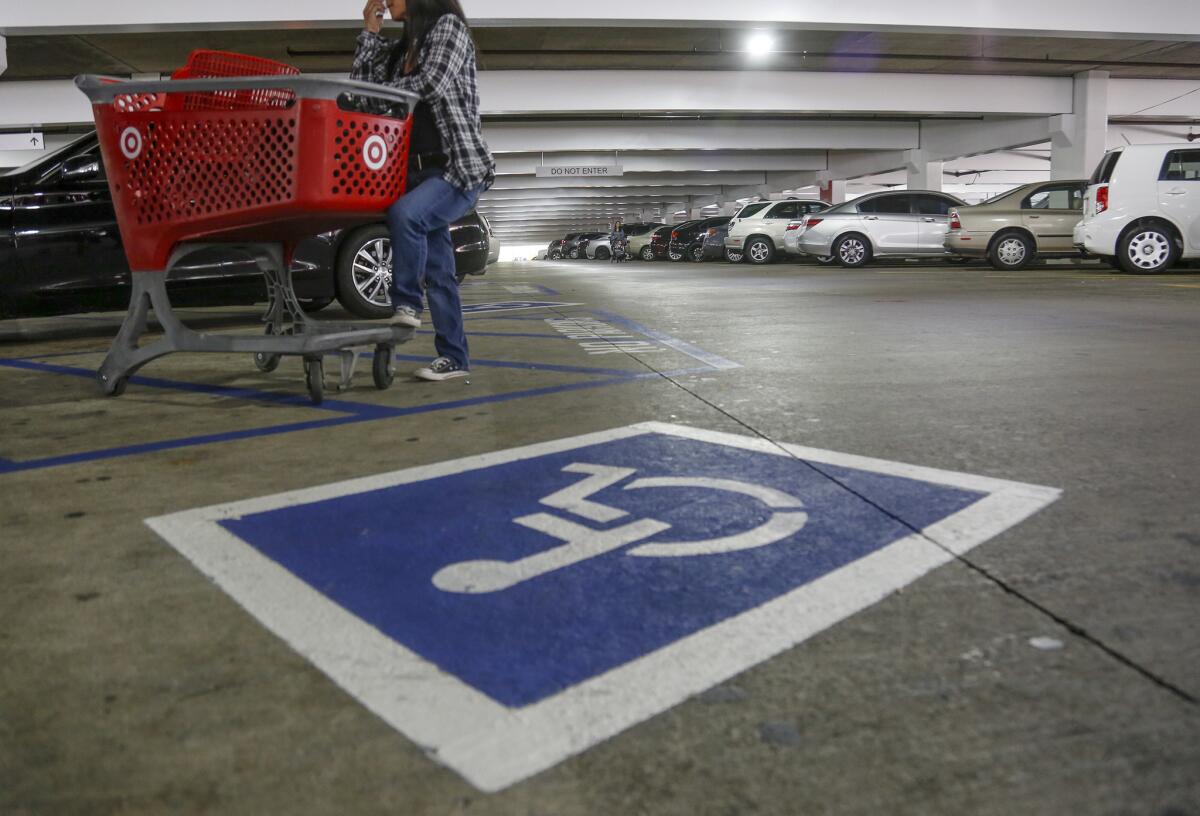
The California Department of Motor Vehicles would be required to do more to confirm that those who use disabled parking placards actually need them, under state legislation proposed Wednesday after an audit warned of possible widespread abuse.
The state audit released April 18 found 70 of 96 approved placard applications in a sample group ‚Äúdid not include sufficient medical information to demonstrate that the applicant qualified.‚ÄĚ In addition, a check of the name and date of birth of active placard holders against the Social Security Administration‚Äôs Death Master File identified nearly 35,000 matches.
‚ÄúTaking unfair advantage of our state‚Äôs disabled placard program is an act of fraud,‚ÄĚ state Sen. Jerry Hill (D-San Mateo) said in a statement introducing the bill. ‚ÄúWe must ensure that the DMV is equipped with the tools to effectively oversee the program so that it properly serves disabled drivers and works to eliminate abuse of the system.‚ÄĚ
Some 2.9 million Californians have disabled parking placards or license plates that allow them to use special parking spots near the entrances of buildings and to park for free at curbs with meters.
Hill said his bill will implement audit recommendations that include:
- Requiring the DMV to conduct quarterly audits of applications and to work with state health boards to analyze applications to ensure that information from medical providers is complete
- Requiring the DMV to use the Social Security Administration’s Death Master File to cancel placards whose permit holders have died
- Requiring all permanent placard holders to reapply every four years
- Requiring applicants to provide proof of their name and date of birth, such as a driver’s license or birth certificate
- Limiting the number of replacement placards that can be obtained within a two-year period to two placards. If more replacements are needed, placard holders would need to reapply for a permit
- Adding podiatrists to the list of medical providers able to certify applications related to disabilities of the foot or ankle
The proposal will be added into an existing bill, Senate Bill 611, later this month, Hill said.
‚ÄúWe must make sure the drivers who need this important program have access to the benefits it provides ‚Äď and block scofflaws and fraudsters from gaming the system,‚ÄĚ he said.
Sen. Dianne Feinstein’s thoughts on Comey firing get far more pointed overnight

Sen. Dianne Feinstein called for a special prosecutor to investigate Russian meddling in the presidential election at Wednesday morning’s Senate Judiciary Committee hearing.
Sen. Dianne Feinstein’s first statement on Tuesday night’s surprise firing of FBI Director James Comey was simple and seemingly accepting of President Trump’s move.
The initial two-sentence statement said Trump had contacted her to tell her the FBI needed a change and pledged that the ‚Äúnext FBI director must be strong and independent and will receive a fair hearing in the Judiciary Committee.‚ÄĚ
Overnight, the California Democrat’s tone changed, and she began questioning Trump’s motives.
In a second statement, and in her opening remarks before a Senate Judiciary Committee hearing Wednesday morning, Feinstein said she was troubled by the firing of the head of an agency conducting an investigation while it is ongoing.
‚ÄúThe real question we face today is whether Director Comey was fired because of the Clinton email investigation ‚ÄĒ which could have happened in January ‚ÄĒ or whether he was fired because of the FBI‚Äôs investigation of Trump connections to Russia,‚ÄĚ she said.
She also backed up the renewed calls of many, including her fellow Californian, Sen. Kamala Harris, for a special prosecutor in the Russia investigation
Feinstein’s more pointed and detailed stance appears to have been spurred by White House explanations of the firing.
‚ÄúAs the night went on, more and more stories began to unfold about the events surrounding Director Comey‚Äôs dismissal,‚ÄĚ Feinstein told the Judiciary Committee on Wednesday.
She pointed to news reports that revealed Comey learned he was fired through television news coverage and that Atty. Gen. Jeff Sessions had been tasked with coming up with reasons to fire Comey. She also cited reports that Trump had grown angry with the ongoing investigation into Russian meddling in the 2016 presidential election, including Comey’s admission to a Senate committee that the FBI was investigating Trump campaign associates.
‚ÄúAs I reflect on the decision to dismiss Director Comey, I become incredulous thinking about the ongoing FBI investigation into Russia‚Äôs interference with our presidential election and possible connections to associates of the Trump campaign and administration,‚ÄĚ she said.
Feinstein, the ranking Democrat on the Judiciary Committee, also told reporters that Democrats would use a procedural move to essentially slow or stop the panel’s scheduled meeting on Wednesday morning
‚ÄúGiven the events of the last 24 hours, I believe members should have the opportunity to speak out about these events,‚ÄĚ she said.
L.A. County Supervisor Sheila Kuehl endorses Katie Hill in 2018 primary for Rep. Steve Knight’s seat
Democrat Katie Hill, one of the challengers seeking to unseat Rep. Steve Knight (R-Palmdale) in 2018, has scored an early endorsement from Los Angeles County Supervisor Sheila Kuehl.
After the recent House vote to roll back provisions of the Affordable Care Act, Knight‚Äôs seat has been deemed a ‚Äútoss-up‚ÄĚ by the nonpartisan Cook Political Report.
Hill, 29, is the executive director and deputy CEO of People Assisting the Homeless, or PATH, a statewide organization that provides homeless services and develops housing.
‚ÄúKatie is a rare find in politics. Her open and straightforward dedication to achieving real progress for her community will make her a force to be reckoned with in Congress,‚ÄĚ Kuehl said in a statement. ‚ÄúI am confident that she will make an excellent representative, which is why I fully support and endorse her campaign.‚ÄĚ
Knight‚Äôs district is almost evenly split between registered Democrats and Republicans, with about a fifth of its voters listing themselves as having ‚Äúno party preference.‚ÄĚ National Democrats have targeted Knight‚Äôs seat as one they want to flip in 2018.
Another political newcomer, geologist Jess Phoenix, is also running in the district. Democrat Bryan Caforio, who lost to Knight last November, has said he is still considering whether to run for the seat again in 2018.
There has been a surge of activism in the district. Knight has held two packed town hall forums this year ‚ÄĒ including one where Hill questioned him ‚ÄĒ and protests outside his office are becoming regular events.
Candidate to lead the California Democratic Party asks supporters for help fighting rumors about him online
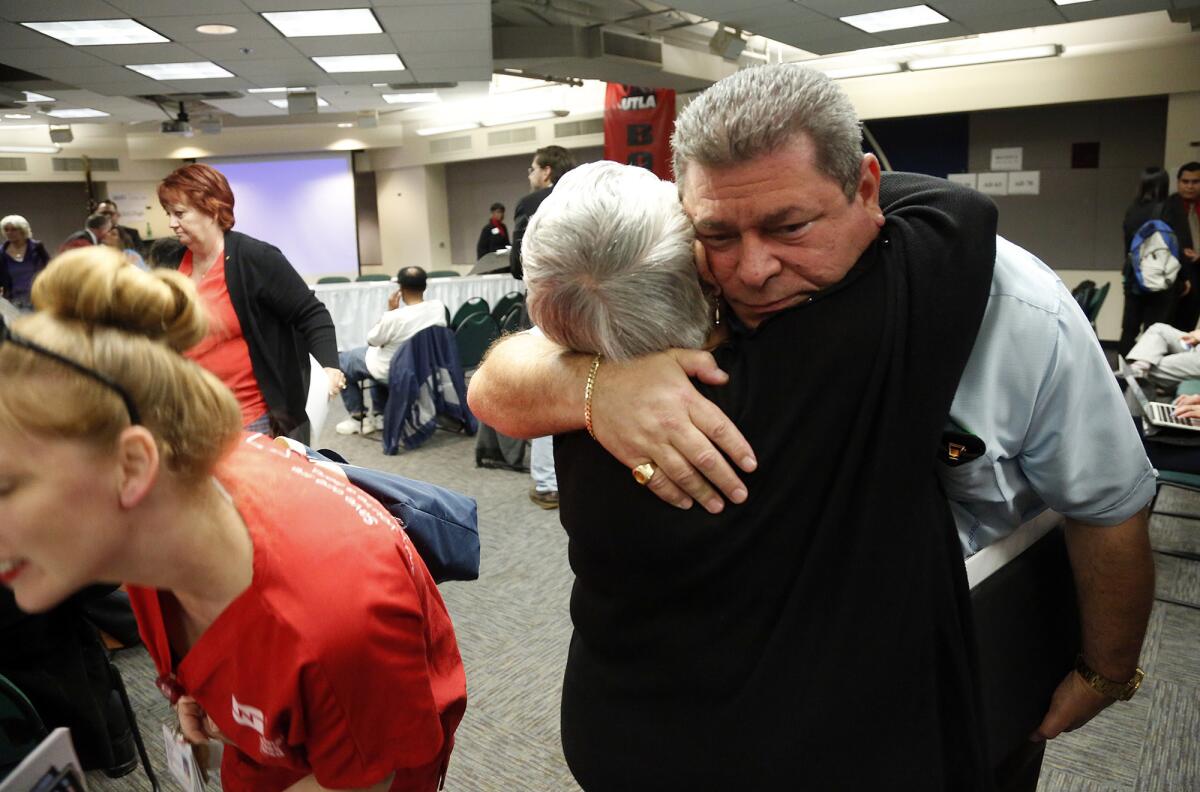
A top candidate running to become chairman of the California Democratic Party on Tuesday urged his supporters to push back at what he said Sunday were false rumors that he is ‚Äúengaging in inappropriate behavior with 14- and 16-year-old boys.‚ÄĚ
‚ÄúThe politics of personal destruction is despicable,‚ÄĚ Los Angeles County Democratic Party Chairman Eric Bauman told party members gathered for their monthly meeting. ‚ÄúIt is one thing to attack someone for their record, for their votes, for their positions, for their donors. This is beyond the pale.‚ÄĚ
Bauman, who is in a fiercely contested race for the chairmanship with activist Kimberly Ellis, said he began to hear the rumors late last week as his supporters phoned delegates ahead of the state party convention later this month, where the election will be held.
He emailed delegates about the rumors on Sunday, saying he felt he needed to speak out. On Tuesday Bauman urged his supporters to help him fight back by countering the rumors in the private internet chat rooms where he said they are being spread.
‚ÄúI want to ask you all to do the following ‚ÄĒ if you see or hear that, please push back,‚ÄĚ Bauman said, urging members of the crowd to write posts with the hashtag #theericiknow. ‚ÄúDon‚Äôt let them get away with it. If this is what takes over our party, if this is what infects our party ‚Ķ then we‚Äôre even more lost than we are right now.‚ÄĚ
Bauman has been chairman of the county party since 2000, and the crowd Tuesday night was full of his supporters. After he finished speaking, many members of the audience delivered a standing ovation and chanted his name.
Ellis has denounced the rumors. Bauman did not blame her for them, but many in the crowd said they believed her campaign was behind an effort to discredit her opponent.
‚ÄúI think she‚Äôs behind the ugly stuff that came out, absolutely,‚ÄĚ said Caro Avanessian, 73, a retired software engineer from Glendale. ‚ÄúI don‚Äôt know Kimberly that well. She‚Äôs not as dynamic. And she has created division. It‚Äôs an ugly election. We don‚Äôt want that. We want to be united rather than divided.‚ÄĚ
Kathy Kensinger, a 67-year-old union organizer, described the rumors as ‚Äúgarbage.‚ÄĚ
‚ÄúI‚Äôm from back in the days of of smoke-filled rooms. Not in years have I ever heard of anything like this,‚ÄĚ she said, adding that she doesn‚Äôt believe the rumors. ‚ÄúHe‚Äôs too decent of a guy.‚ÄĚ
Avanessian and Kensinger said that even before the controversy, they did not support Ellis because they were not familiar with her, adding that they had seen Bauman’s work on behalf of Democrats for decades.
‚ÄúI‚Äôve known Eric for 30 years. He is absolutely ideal. He is passionate about what being a Democrat means,‚ÄĚ Kensinger said. ‚ÄúI don‚Äôt know that much about her.‚ÄĚ
Protesters urge Rep. Mimi Walters to hold an in-person town hall ‚ÄĒ¬†by rallying to host one without her
Assemblywoman Sharon Quirk-Silva calls for UC President Janet Napolitano’s resignation
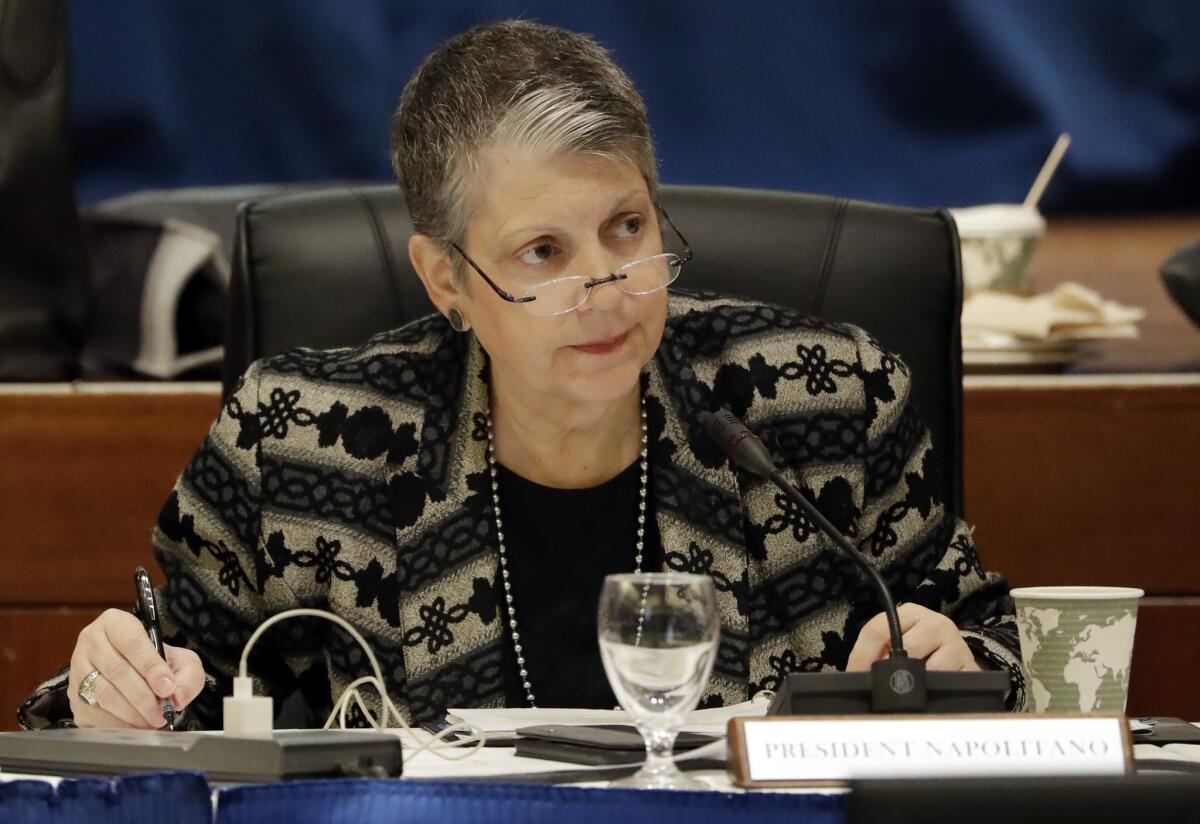
Assemblywoman Sharon Quirk-Silva (D-Fullerton) on Tuesday became the first legislator to call for University of California President Janet Napolitano to resign, saying she has lost confidence in her leadership.
The call by a member of the Assembly Committee on Higher Education came two weeks after a state audit found that the UC Office of the President pays its executives salaries and benefits significantly higher than those given to state employees in similar roles, and failed to disclose up to $175 million in budget reserve funds as it recently proposed a raise in tuition.
‚ÄúThe leaders of our state university systems are duty-bound to maintain the highest levels of transparency, integrity, and accountability to California taxpayers, students, their families, and the Legislature, especially when it comes to public monies,‚ÄĚ Quirk-Silva said in a statement. ‚ÄúPresident Napolitano no longer engenders the public trust required to perform her duties. It‚Äôs time she resigned.‚ÄĚ
Napolitano has agreed to pursue changes in the budget process, but said most of the $175 million is committed to initiatives aimed at improving the University of California system. Monica Lozano, chair of the Board of regents, said Tuesday the panel will independently review the issues raised in the audit
‚ÄúThis does not in any way signify a lack of confidence in President Napolitano‚Äôs ability to continue her leadership of this exceptional public research university,‚ÄĚ Lozano said.
Meanwhile, Quirk-Silva also renewed her request that the UC Board of Regents rescind a planned tuition increase.
Protesters stage ‚Äėdie-in‚Äô at Republican Rep. Steve Knight‚Äôs Simi Valley office
After Comey firing, Harris calls for a special prosecutor while Feinstein calls for a fair hearing for next director
President Trump and California soon could spar over air quality rules

A legal battle over regulations for construction vehicles could become the first test of whether President Trump wants to limit California’s unique ability to limit air pollution.
The issue stems from a 2013 decision by the U.S. Environmental Protection Agency that allowed California to require emission filters on bulldozers, forklifts and other diesel-powered equipment.
The state, the only one in the country allowed to set rules that are tougher than federal standards, has been granted dozens of similar waivers over several decades.
Several companies sued over the waiver, and a court hearing is scheduled for May 18 in the 9th U.S. Circuit Court of Appeals
Now Trump’s EPA wants to delay the hearing, and officials said in a Friday court filing that they weren’t sure whether the waiver should have been granted.
‚ÄúRecently-appointed EPA officials in the new administration will be closely scrutinizing [the decision] to determine whether it should be maintained, modified, or otherwise reconsidered,‚ÄĚ the filing said.
A waiver has never been revoked, but California officials have been on guard for any attempts since Scott Pruitt, Trump’s choice to lead the EPA, questioned the state’s authority during his confirmation hearing.
On Monday, the California Air Resources Board urged the court to reject the request to put off the hearing.
‚ÄúA delayed decision in this case leaves a cloud of uncertainty over California‚Äôs efforts,‚ÄĚ the state‚Äôs filing said.
The case could provide hints as to how the Trump administration will handle a much bigger issue: California’s waiver authority. The state is moving forward with tougher rules on greenhouse gas emissions from tailpipes even though federal officials are preparing to roll back national standards.
Gov. Jerry Brown appoints former Assemblyman V. Manuel Pérez to Riverside County Board of Supervisors
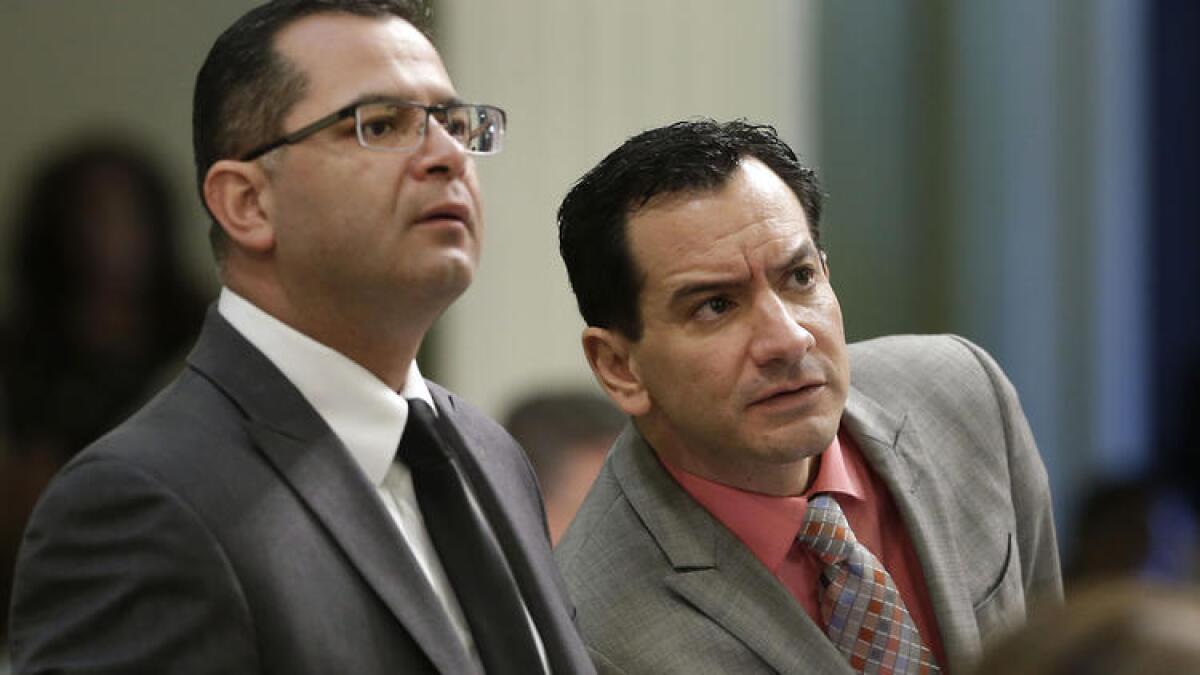
Gov. Jerry Brown has tapped former state Assemblyman V. Manuel Pérez for a seat on the Riverside County Board of Supervisors, filling a months-long vacancy on the board since the death of John Benoit.
Pérez, a Democrat who served in the Assembly from 2008 to 2014, lost a 2014 bid for the supervisor position against Benoit, a Republican. Benoit died Deb. 26 of pancreatic cancer.
Under California law, the governor has the authority to fill vacancies in statewide and county supervisor positions that occur between elections. Pérez will serve out the remainder of Benoit’s term, which ends in 2018.
Prominent Democrats from the region, including Assembly members Eduardo Garcia of Coachella, Sabrina Cervantes of Riverside, Eloise Reyes of Grand Terrace and Jose Medina of Riverside, sent a letter to Brown in January urging the governor to appoint Pérez to the seat.
Senate leader Kevin de L√©on (D-Los Angeles) and Assembly Speaker Anthony Rendon (D-Paramount) also signed on to the request, which described P√©rez as ‚Äúthe most qualified, respected and logical choice to best represent‚ÄĚ the 4th District.
After leaving the Assembly, Pérez was elected to the Coachella City Council and also took a position in government relations for Borrego Health, which provides primary healthcare services in Coachella, San Diego and Riverside.
After UC controversy, a California lawmaker wants to make interfering with state audits a crime
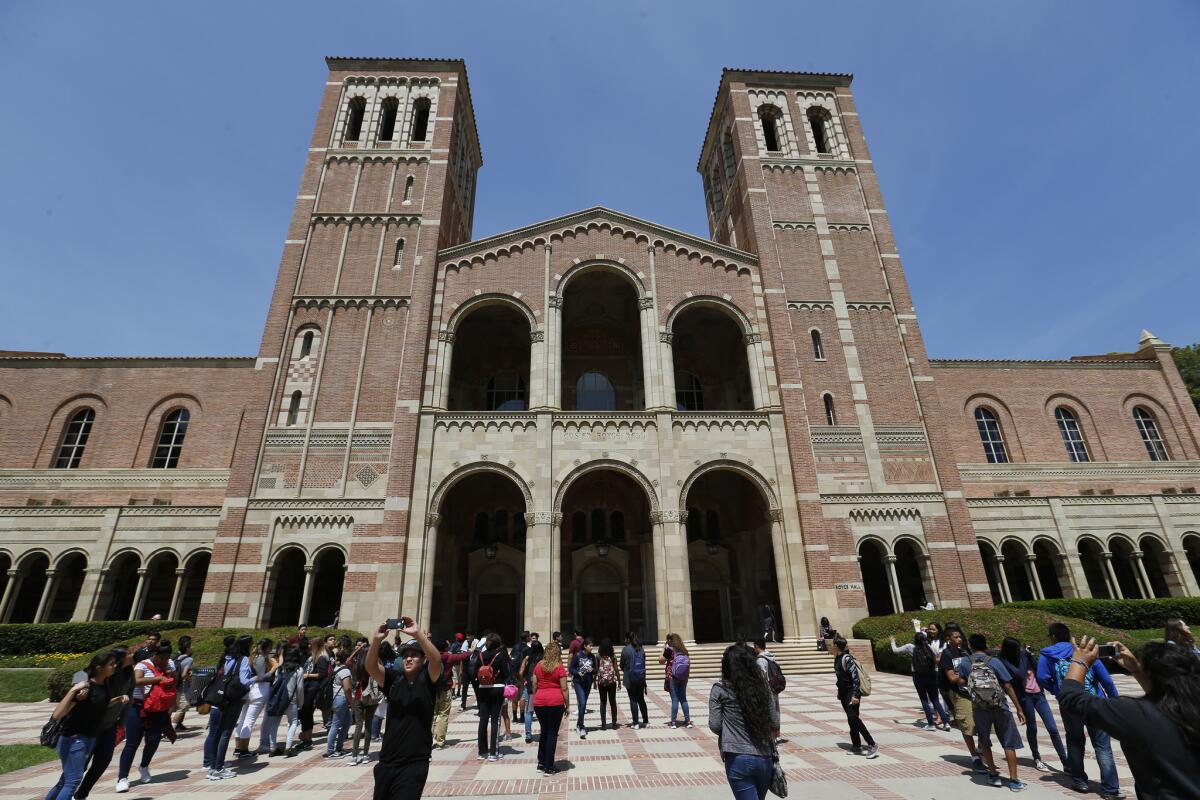
Alarmed at allegations that University of California officials intervened and altered the outcome of a recent state audit, lawmakers proposed Tuesday to make intentional interference of such reviews a crime in the future.
Democratic Assemblyman Al Muratsuchi of Torrance said he plans to introduce the proposal in response to complaints by State Auditor Elaine Howle that the UC office of the president interfered with an attempt by auditors to confidentially survey officials at university campuses about the performance of the office.
‚ÄúThis is to give the state auditor the necessary tools so that we are making sure we are holding all public agencies accountable, that they cooperate with state auditors,‚ÄĚ said Muratsuchi, who is chairman of the state Joint Legislative Audit Committee.
In last month‚Äôs audit and a letter to the governor, Howle wrote that ‚Äúthe Office of the President intentionally interfered with our audit process‚ÄĚ and that, after the office screened the survey results ‚Äúwe found that the responses were changed to make the Office of the President appear more efficient and effective.‚ÄĚ
The legislator said he was ‚Äúdisturbed‚ÄĚ by the allegation.
UC President Janet Napolitano said at a legislative hearing last week that her office got involved in the survey responses because it wanted to make sure the surveys got to the campus officials best able to answer the complicated documents and so they reflected the opinions of each campus’ chancellor. Although she maintained her office acted appropriately, she apologized for how the issue was handled.
Voting rights groups file a new DMV lawsuit, saying it’s still too hard for Californians to register to vote
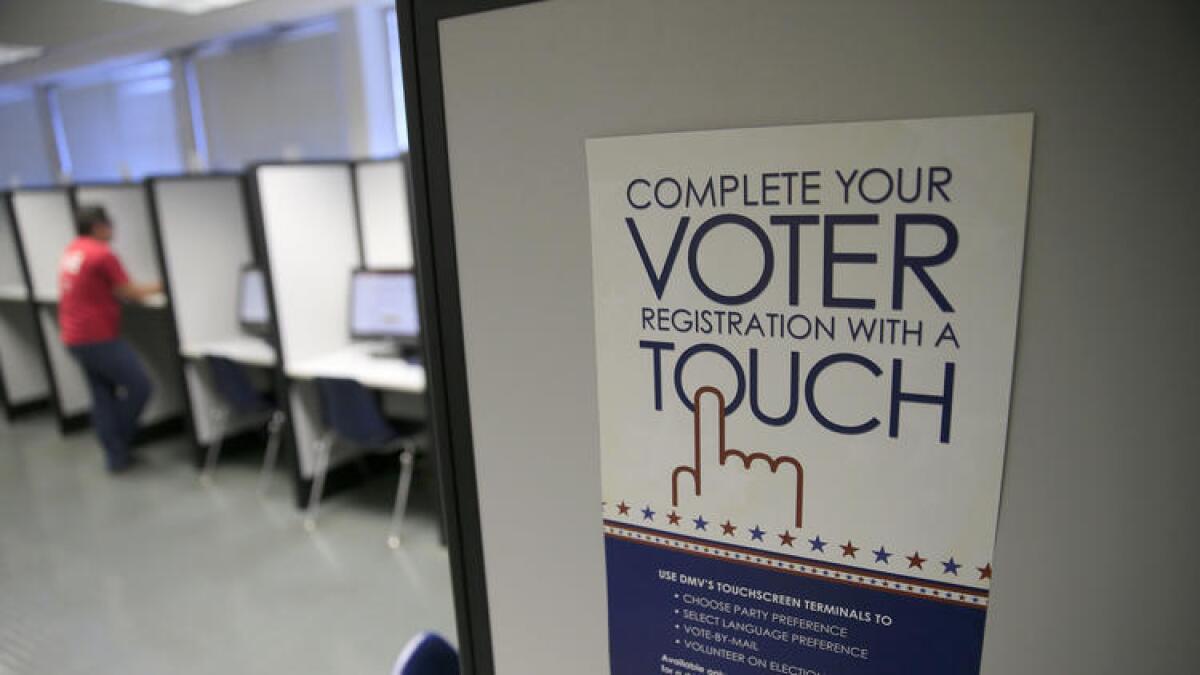
A two-year dispute over California’s Department of Motor Vehicles voter registration procedures has again landed the agency in court.
On Tuesday, a coalition of voting rights groups filed a federal lawsuit alleging DMV officials still require drivers renewing their registration by mail to fill out a separate card if they also want to register to vote. That separate step, the lawsuit said, violates the 1993 ‚ÄúMotor Voter‚ÄĚ law passed by Congress.
‚ÄúIt‚Äôs an embarrassment that in 2017, more than 20 years after the law was enacted, California DMV is still violating the law by making millions of people jump through hoops to become voters,‚ÄĚ said Kathay Feng, executive director of California Common Cause.
The activist groups that filed the lawsuit, including the League of Women Voters of California and the National Council of La Raza, first threatened to sue the DMV in 2015 over its procedures that didn’t integrate voter registration into in-person and online driver’s license registration.
While new voter registration procedures were rolled out last spring, the groups said Tuesday that the DMV has refused to similarly combine the two processes for those who register by mail. The lawsuit said the state has failed ‚Äúto provide eligible voters with the integrated application process required by law.‚ÄĚ
The organizations represented by the lawsuit argued that lack of state action in registering more voters means their own advocates have been having to step in to fill the gap.
The debate comes as California is already expanding the connection between obtaining a license and registering to vote. In 2015, Gov. Jerry Brown signed a law that will register all eligible drivers license holders as voters unless they choose to ‚Äúopt out.‚ÄĚ The law was on hold until state elections officials completed testing of a statewide voter database. That process ended last year, and the automated process for registering voters is expected to be used before next year‚Äôs elections.
Jessica Gonzalez, a DMV spokeswoman, said the state has complied with the federal law for years.
‚ÄúToday‚Äôs lawsuit serves as an unfortunate distraction from ongoing joint efforts by the secretary of state‚Äôs office and the DMV to further improve the voter registration process in California, which already exceeds the voter registration obligations set forth in the National Voter Registration Act,‚ÄĚ Gonzalez said in a statement.
Secretary of State Padilla said in a statement that he ‚Äúwill continue working diligently with stakeholders and the DMV to expand voter registration opportunities.‚ÄĚ
Update 4:50 p.m. The story was updated with a comment from Padilla.
Update 11:30 a.m. The story was updated with a comment from the Dept. of Motor Vehicles
With powerful nurses union behind him, Jimmy Gomez gets more progressive support in L.A. congressional race
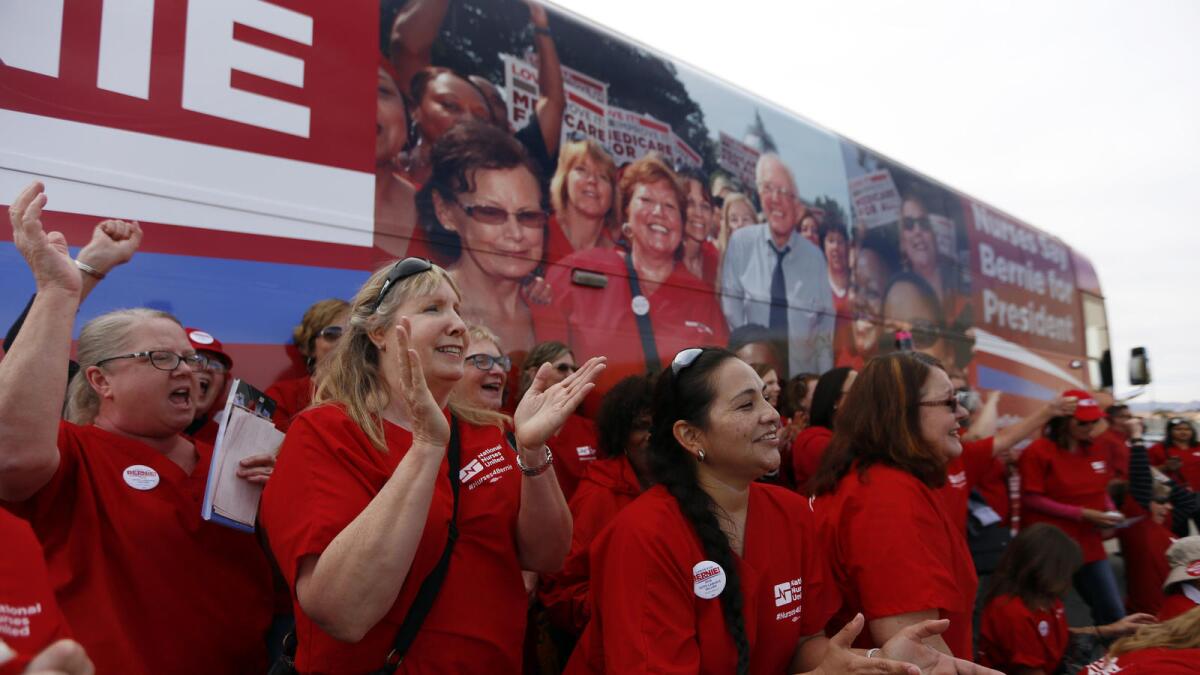
In the race for a Los Angeles congressional seat, Assemblyman Jimmy Gomez is bulking up on support from progressive groups and officials. The California Nurses Assn. on Tuesday endorsed Gomez to replace former Rep. Xavier Becerra, adding to a long list of left-leaning endorsements he’s rolled out in recent weeks.
The nurses union was among the most vocal supporters of Bernie Sanders in California, and campaigned alongside him to support Proposition 61, a failed drug-pricing measure Sanders endorsed. In the April primary for the 34th Congressional District seat, CNA/NNU backed Arturo Carmona, Sanders’ former deputy political director.
While Gomez was often criticized by fellow candidates in the crowded primary as being entrenched in the Democratic Party establishment, many are backing him in his runoff with attorney and businessman Robert Lee Ahn.
Nine of Gomez‚Äôs primary opponents, all Democrats, have endorsed him in the runoff against Ahn. Three of them -- Wendy Carrillo, Vanessa Aramayo and Raymond Meza -- had previously issued a joint statement during the primary decrying what they said was the state Democratic Party‚Äôs ‚Äúcoronation‚ÄĚ of Gomez.
Earlier this week, the Congressional Progressive Caucus, led by Minnesota Rep. Keith Ellison and Arizona Rep. Raul Grijalva, announced it was endorsing Gomez. Democracy for America, a left-leaning group that had previously endorsed Carrillo, has also switched its support to Gomez.
The runoff election is June 6.
The healthcare vote backlash comes to Darrell Issa’s office
U.S. Rep. Darrell Issa of Vista was among the seven California Republicans in vulnerable House districts who voted for the GOP healthcare bill last week.
See how the entire California delegation voted on the bill.
After healthcare vote, California Rep. Jeff Denham hears from angry constituents: ‚ÄėYou voted against me‚Äô
Rep. Jeff Denham (R-Turlock), who voted for the Republican healthcare bill that passed the House last week, flew home this week to face his constituents, meeting with a small crowd Tuesday morning in his Central Valley district.
‚ÄúYou voted against me,‚ÄĚ said one woman who said she depends on Medi-Cal for her healthcare.
‚ÄúI voted for something that I thought would help my district,‚ÄĚ he said.
Denham had previously said that he would vote against the bill, but ended up voting for it, along with the rest of California’s House Republicans.
He said an amendment that added $8 billion to states’ high-risk insurance pools persuaded him to vote for it.
He also said he doesn’t believe California would opt out of requiring insurers to offer certain types of coverage, as the bill allows states to do, and denied accusations that he broke a promise not to support the repeal of the Affordable Care Act.
‚ÄúWhat I said was I cannot support a bill that does not address preexisting conditions,‚ÄĚ Denham told the audience in Riverbank, near Modesto in in Stanislaus County.
He later asked a man who identified himself as a former firefighter, ‚ÄúDo you think California is ever going to opt out? Do you have concerns that Jerry Brown would try to opt out?‚ÄĚ
‚ÄúIt‚Äôs not something I would ever expect California to do,‚ÄĚ Denham said. ‚ÄúWe‚Äôre still talking about universal healthcare.‚ÄĚ
Not everyone was there to heckle Denham about his vote; at least two women were there to thank them for his help with small businesses.
Find out how your California representative voted on the bill.
And watch KQED’s 45-minute video of the event:
Sen. Kamala Harris on Idaho congressman‚Äôs healthcare claim: ‚ÄėWhat the ... is that?‚Äô
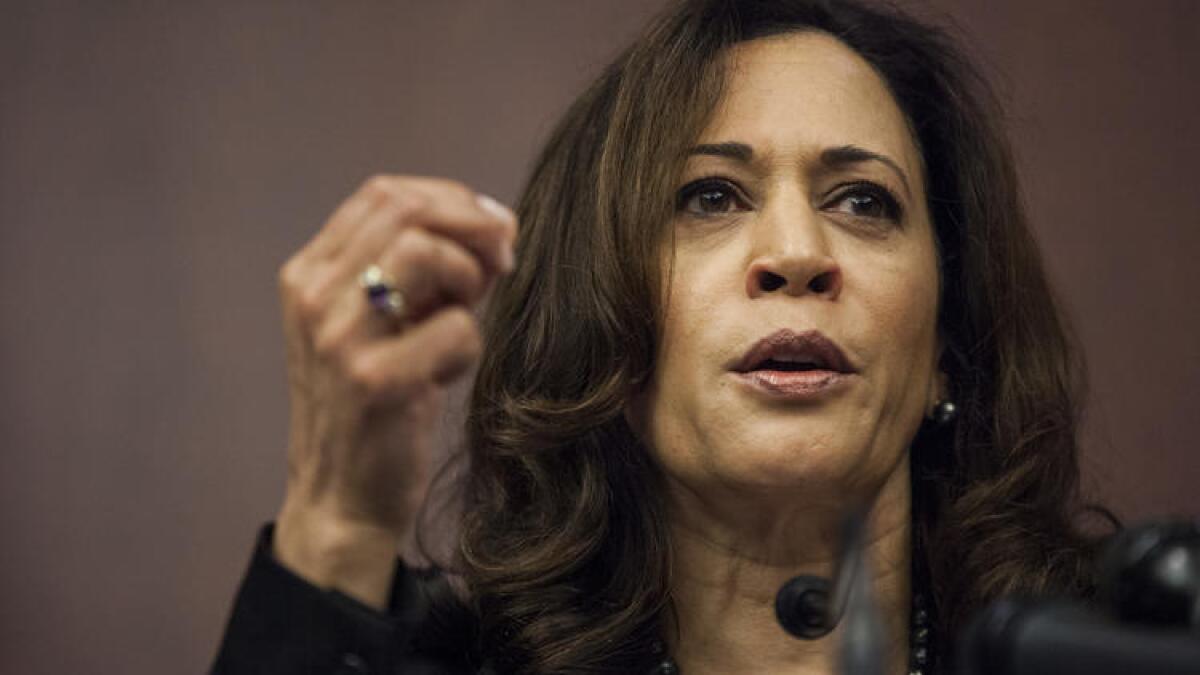
California Sen. Kamala Harris had some heated words this week for an Idaho congressman‚Äôs assertion at a town hall that ‚Äúnobody dies because they don‚Äôt have access to healthcare.‚ÄĚ
‚ÄúLike this guy, this congressman, you might as well say, ‚ÄėPeople don‚Äôt starve because they don‚Äôt have food.‚Äô What the ... is that? What are you saying? How can you say that?‚ÄĚ Harris said during an interview with Pod Save America, a podcast run by former Obama administration staffers. It was recorded live in front of an audience of more than 2,000 people in San Francisco, according to her staff.
You can listen to the podcast here. The Democratic freshman senator’s comments to the friendly crowd begin about 42 minutes in.
Rep. Raul Labrador (R-Idaho) clarified his comment from the town hall by saying it was ‚Äúinelegant‚ÄĚ but that he was pushing back on ‚Äúa false notion that the Republican health care plan will cause people to die in the streets.‚ÄĚ
After clearing the House last week, the bill faces a narrow path to passage in the Senate, where Republicans can lose support from just two GOP senators with Vice President Mike Pence’s tie-breaking vote.
In the interview, Harris said Democrats have to ‚Äúspeak the truth‚ÄĚ if they want to stop the healthcare bill in the Senate.
‚ÄúThe truth is that these folks are playing politics with public health, the truth is that ... if Republicans want people to lose their healthcare then the Republicans needs to lose their job,‚ÄĚ she said.
The senator urged people to campaign in the districts of seven vulnerable California House Republicans, all of whom voted for the healthcare bill.
‚ÄúThe decisions those House members make in districts other than the one that you live in will impact you. So go to those districts and knock on those doors and talk to our neighbors, because their constituents are our neighbors. And remind them of why we are all in this,‚ÄĚ she said.
Lawmakers demand to know more about a proposed medical experiment on dogs at Los Angeles VA
Dogs could be dying as part of a proposed experiment at the VA Greater Los Angeles Healthcare System and members of Congress say they want more information about animal testing at the facility.
In a Monday letter to the Veterans Affairs Inspector General, Nevada Rep. Dina Titus and eight members of Los Angeles’ delegation demanded to know more about the experiment, including how much it could cost and what other experiments the Los Angeles VA is conducting on animals.
The proposed experiment involves giving 18 narcoleptic Dobermans antidepressants or methamphetamine, then killing the dogs and studying how the drugs affect the production of histamines ‚ÄĒ the body‚Äôs response to allergens ‚ÄĒ in their brains. The animal rights group White Coat Waste Project, which obtained a 2016 research application for the experiment through a Freedom of Information Act request, brought the proposed experiment to the attention of lawmakers.
The experiment’s goal is to determine if heightened histamine production in narcoleptics is a response to treatment or a part of the disease itself.
Rep. Ted Lieu (D-Torrance), who represents the area of West L.A. where the VA is located, said he was ‚Äúdeeply troubled‚ÄĚ to learn about the experiment described in the application.
‚ÄúWe were not aware of it, and frankly no one was aware of it,‚ÄĚ Lieu said. ‚ÄúNo federal agency should be doing that. If this is true, these dogs are being abused.‚ÄĚ
It is unclear if the experiment was approved or is underway. Lieu said he plans to push to stop it if the department confirms the experiment is in progress.
The U.S. Department of Veterans Affairs directed questions about the experiment to the agency’s inspector general. An inspector general spokesman said it is reviewing the lawmakers’ letter and will decide how to respond soon.
White Coat Waste Project vice president Justin Goodman said the whole VA experiments on half a million animals a year in 74 facilities, but only four VA facilities conduct medical testing on dogs. It’s not clear how many dogs are tested at those facilities.
The members of Congress were particularly upset about an April 3 VA statement about its animal testing standards. In the statement, the VA appears to describe the Los Angeles experiment as an ‚Äúobservational‚ÄĚ study, which the congressional members say isn‚Äôt accurate.
‚ÄúSuch harmful experiments on dogs cannot reasonably be described as observational,‚ÄĚ the members‚Äô letter states. ‚ÄúWe are also concerned that without access to FOIA documents, we would not have known the VA was providing misleading information or that dogs were even being used in these experiments at the Greater LA VA.‚ÄĚ
California’s members have been pushing to make information about animal testing and its costs available. Late last year, the Government Accountability Office began looking into animal research at the VA and other federal agencies after being prompted by members of Congress, including Rep. Ken Calvert (R-Corona) and others from California.
White Coat Waste Project has long argued there should be more oversight of the costs of federal animal testing.
This nurse plans to challenge California’s Rep. Jeff Denham for his Central Valley seat
Registered nurse Dotty Nygard will challenge Rep. Jeff Denham in the Central Valley’s 10th Congressional District.
‚ÄúI‚Äôve lived and worked within this community for 24 years and feel I can actually lend my voice as a strong voice to my constituents,‚ÄĚ said the 60-year-old who lives in Tracy, Calif.
Nygard, a Democrat, is an emergency room nurse at Sutter Health in Sacramento and a member of the influential, progressive California Nurses Assn.
Nygard said she was drawn to the race because of attempts to repeal the Affordable Care Act (Denham voted for the House GOP repeal bill last week), her concerns about the environment and climate change, and a desire to raise the minimum wage to $15 an hour.
‚ÄúMy advocacy for my patients goes far beyond the bedside,‚ÄĚ she said. ‚ÄúI can‚Äôt idly sit by and watch the things that are happening.‚ÄĚ
Nygard has a nursing degree from Cal State Hayward. She served on the Riverbank City Council from 2010 to 2013.
Denham won reelection by less than 5% in 2016 after Democrats sought to tie him to now-President Trump, who lost the district. Democrats are aiming for him again, but the nonpartisan analysis website Cook Political Report still lists the district as ‚Äúlean Republican.‚ÄĚ
‚ÄúIt is going to be an uphill climb, and I do see the challenge,‚ÄĚ Nygard said.
She does not plan to accept contributions from corporations or political action committees, she said.
‚ÄúThat‚Äôs what our communities are wanting to see, people that stand for them and with them, not bought by corporations, not influenced by big money,‚ÄĚ she said.
Denham also faces investor Josh Harder of Turlock and a few other challengers.
Being a Communist would no longer be cause for losing a state job under bill narrowly approved in Assembly
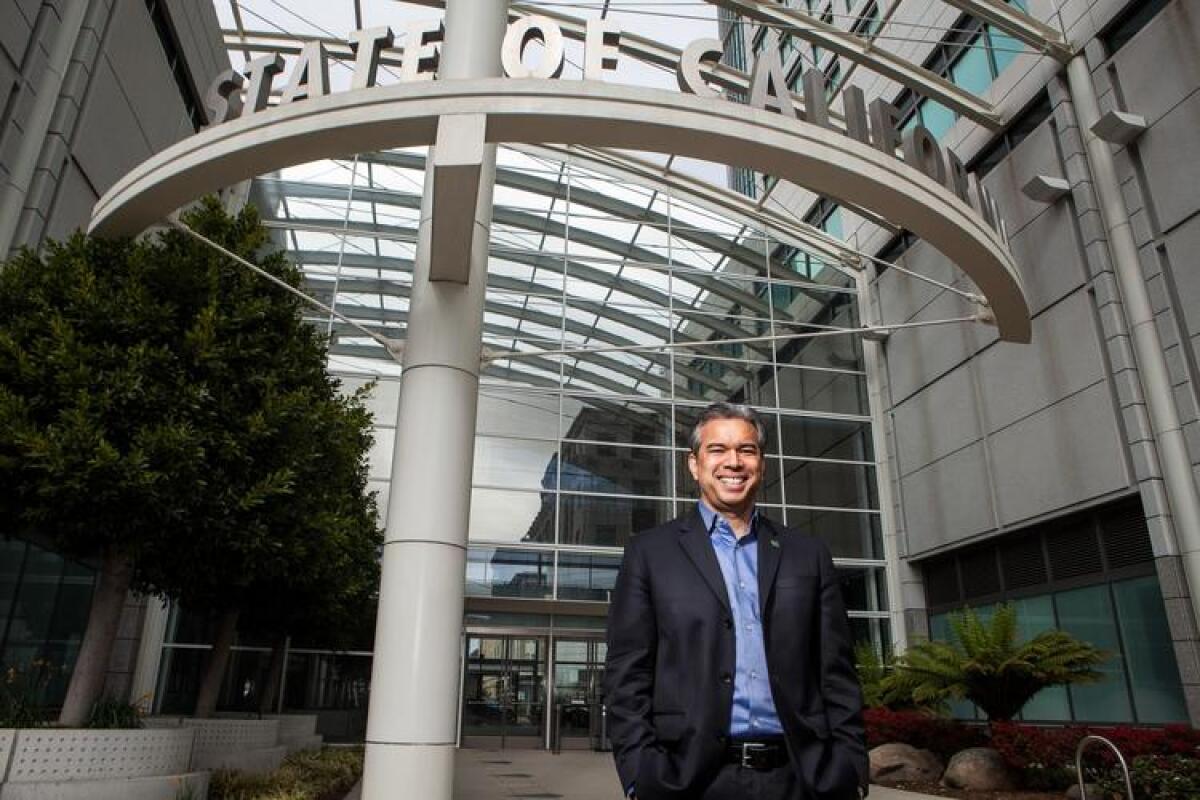
Being a member of the Communist Party would no longer be a fireable offense for state jobs under a measure narrowly approved by the California Assembly on Monday.
The measure by Assemblyman Rob Bonta (D-Oakland) would strike language in California law dating from 1953 that warns of ‚Äúa clear and present danger, which the Legislature of the State of California finds is great and imminent, that in order to advance the program, policies and objectives of the world communism movement, communist organizations in the State of California and their members will engage in concerted effort to hamper, restrict, interfere with, impede, or nullify the efforts of the State...and their members will infiltrate and seek employment by the State and its public agencies.‚ÄĚ
In another section of statute, being a member of the Communist Party is sufficient cause for dismissal for public employees. Bonta’s bill would eliminate the reference to communism. Under his proposal, it would still be a fireable offense to knowingly advocate the violent overthrow of government.
‚ÄúIt‚Äôs an old and archaic reference,‚ÄĚ said Bonta of the specific language about communism. He said his bill was ‚Äúreally just a technical fix to remove that reference to a label that could be misused or abused, and frankly, has been in the past, in some of the darker chapters of our history in this country.‚ÄĚ
Assemblyman Randy Voepel (R-Santee) urged his colleagues to vote no, arguing that military veterans fought wars against communists, a political ideology he said ‚Äúis still a threat.‚ÄĚ
‚ÄúThe whole concept of communism and Communist Party members working for the state of California is against everything we stand for on this floor,‚ÄĚ Voepel said.
The bill, Assembly Bill 22, squeaked through with a 41-vote majority, but not before some hand-wringing from Democrats. The measure initially came up short when the roll was opened, and many members anticipating tight reelection races held off or voted no. Others came from districts with high immigrant populations that fled communist regimes in their own countries, such as Vietnam.
Bonta said he recognized that history, but added that it was important to harmonize that with the value of due process.
‚ÄúPart of having a functioning democracy and a fair and equitable society is to make sure you‚Äôre actually basing your decisions to take someone‚Äôs job away ... based on their actual conduct, their actual behavior and actual proof and evidence, not just some loose label that could be applied overbroadly in a way that is unfair and unjust,‚ÄĚ he said.
The bill now moves to the Senate.
Actor Antonio Sabato Jr. to run for Congress against Rep. Julia Brownley
Actor Antonio Sabato Jr. is running for Congress, challenging Rep. Julia Brownley (D-Westlake Village), who represents the southern central coast and most of Ventura County, according to documents filed with the Federal Election Commission on Monday.
Attempts to reach the Republican candidate were unsuccessful Monday, but GOP strategist Charles Moran, who will serve as Sabato’s fundraiser, confirmed the run. Strategist Jeff Corless will serve as a top adviser.
Sabato is a longtime actor best known for roles in ‚ÄúGeneral Hospital‚ÄĚ and ‚ÄúMelrose Place‚ÄĚ and as a model for Calvin Klein underwear. In recent years he has appeared in several reality television shows, including starring in ‚ÄúMy Antonio,‚ÄĚ a VH1 contest for which women competed for his affection, and ‚ÄúDancing With the Stars.‚ÄĚ
The 45-year-old was a vocal supporter of President Trump during the 2016 presidential campaign and spoke on his behalf at that year’s Republican National Convention. In an interview at the time, he said that that then-President Obama was a Muslim, which is not true. Sabato said afterward that he was blacklisted by Hollywood producers because of his visible support for Trump.
Moran said Sabato has long been interested in politics and public policy, but his experiences at the convention prompted him to consider running for office. Issues he plans to focus on are veterans’ needs and substance abuse, Moran said.
‚ÄúBeing a Republican and with proximity to the White House and Republican leadership, he‚Äôs going to be able to get more done ‚ÄĒ being in the majority, with his notoriety, for the residents of the 26th [Congressional] District,‚ÄĚ Moran said.
Brownley has represented the district since 2013. The 64-year-old previously served in the state Assembly for six years. Sabato is an Italian-born American citizen and Westlake Village resident.
Republicans consistently won the district from 2002 to 2012, the first election after redistricting changed the borders and population of the district. Brownley won that election by six points, but two years later she narrowly hung on to her seat, winning by two points. In 2016, she beat her GOP opponent by 20 points.
Gov. Jerry Brown, lawmakers remember fallen law enforcement officers in Sacramento
Gov. Brown to host fundraiser for senator facing possible recall to show ‚Äėhe‚Äôs got his back‚Äô after tax vote, aide says
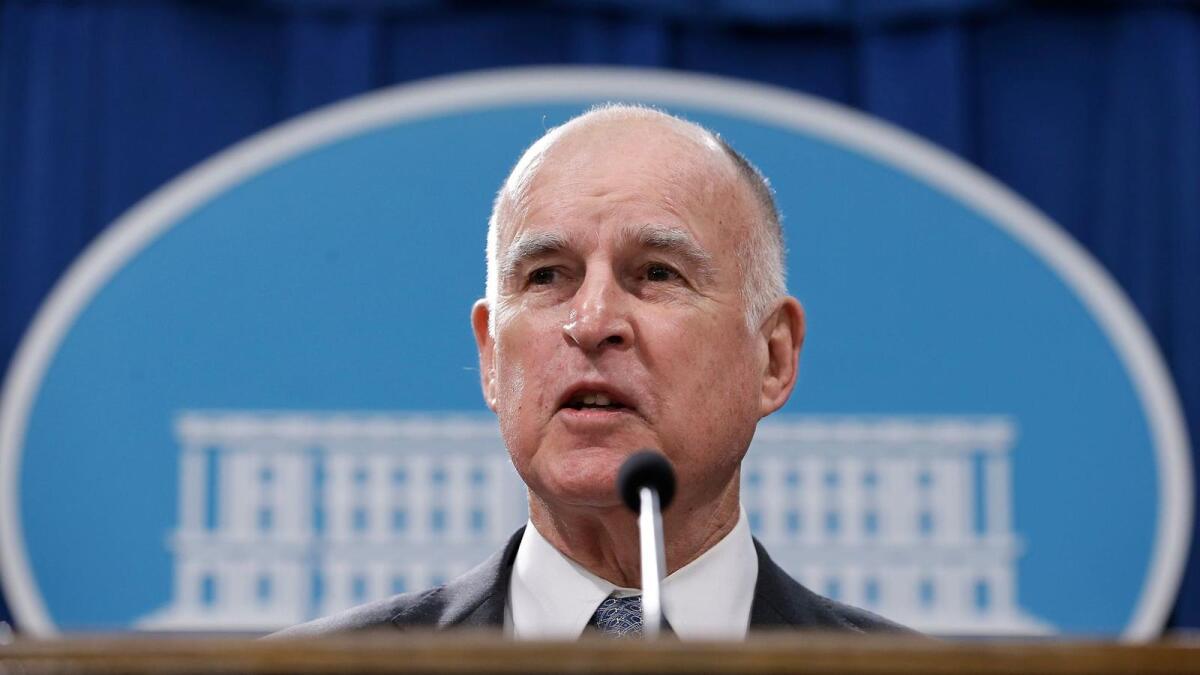
Gov. Jerry Brown is taking the unusual step of hosting a political fundraiser for state Sen. Josh Newman (D-Fullerton) because he thinks it is unfair that some activists are trying to recall Newman for his vote favoring an increase in gas taxes to pay for road repairs, Brown’s top aide said Monday.
The Brown camp also is skeptical that opponents of the gas tax bill will be able to carry out their threat of qualifying an initiative to repeal Senate Bill 1 but are prepared to do battle if it makes the ballot.
The governor was a leading proponent of the legislation, which passed the Legislature with no votes to spare and will raise $5.2 billion annually for road repairs and mass transit through an increase in gas taxes and vehicle fees.
‚ÄúIt is unusual for him to do an individual legislator‚Äôs fundraiser because if he did one he would have do to lots, but Josh is under unfair attack and so the governor wants to make sure he knows that he‚Äôs got his back ‚ÄĒ that‚Äôs why he is stepping out and doing this for him,‚ÄĚ said Nancy McFadden, the governor‚Äôs top aide.
Brown is headlining a fundraiser on May 23 at de Vere’s Irish Pub in Sacramento, billed as an event to support Newman’s reelection campaign. Donors are asked to give up to $4,400 to Newman’s 2020 Senate campaign committee, although the money can be shifted to fighting a recall measure if one qualifies.
Recall papers were filed last month by Elvira Moreno and 59 others, with the aid of conservative radio talk-show host Carl DeMaio. They must collect 63,592 signatures of registered voters in 160 days to qualify the measure for the ballot.
Assemblyman Travis Allen (R-Huntington Beach) and others have also proposed an initiative drive to put a measure on the 2018 ballot to repeal the gas tax.
McFadden was skeptical the measure would make the ballot.
‚ÄúWe have done a number of initiatives over the past six years so we know how hard it is to qualify,‚ÄĚ she said.
If it does qualify?
‚ÄúWe are going to defend the work we did. Absolutely,‚ÄĚ McFadden said.
California state senator’s bill requiring warning labels on sugary drinks is done for the year
Sen. Bill Monning (D-Carmel) has put a hold on his bill that would require warning labels on beverage containers for sugar-sweetened sodas and drinks, acknowledging he lacks the votes to get the measure out of committee.
Monning has been trying for years to either tax or provide warnings on sugary drinks because of health risks they pose, including obesity and diabetes.
‚ÄúSugar-sweetened beverages are the leading sources of sugar in Americans‚Äô diets, according to the Centers for Disease Control and Prevention, and an overwhelming amount of scientific research has linked the consumption of sugary drinks to increases in life-threatening diseases, such as type 2 diabetes and obesity,‚ÄĚ Monning said.
While health groups supported the bill, it had opposition from a coalition of powerful groups, including the American Beverage Assn., the California Chamber of Commerce, the California Grocers Assn., the California Restaurant Assn., the California Retailers Assn. and California Teamsters.
Monning said he ‚Äúwas not confident the bill would receive enough votes to pass out‚ÄĚ of the Senate Health Committee.
He hopes to continue working on the bill for next year.
‚ÄúI am committed to educating Californians about this serious public health issue and to working on SB 300 because consumers have the right to know about the proven harmful effects of sugary drinks,‚ÄĚ he said.
A representative of the beverage industry said the causes of obesity and diabetes are more complicated than a warning label. ``America‚Äôs beverage companies are doing their part by providing consumers with more choices, smaller portions, fewer calories, and clear calorie labels,‚ÄĚ said William M. Dermody Jr., vice president of the American Beverage Assn.
Updated at 4 pm to include comment from American Beverage Assn.
Trump-bashing begins in California’s race for state insurance commissioner
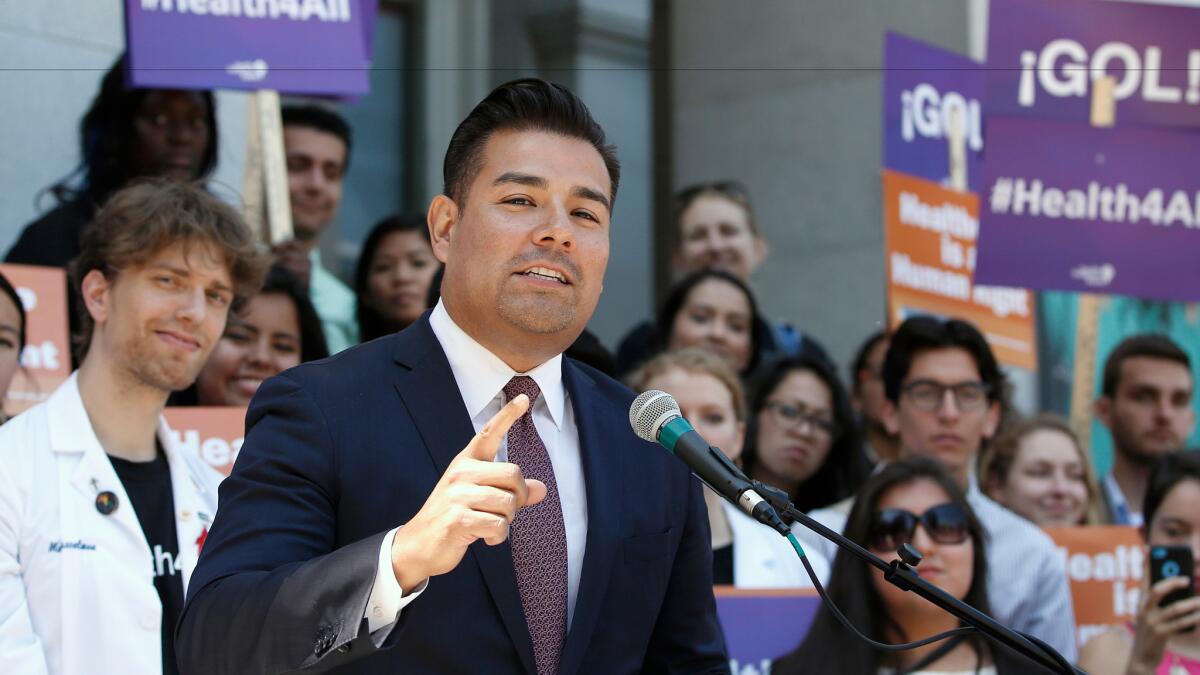
President Trump may not be running for California insurance commissioner but that doesn’t mean he won’t be a political target in the campaign.
State Sen. Ricardo Lara (D-Bell Gardens) devoted his first online ad in the 2018 race to depicting Trump as anti-immigrant, anti-woman, anti-healthcare and a climate change denier. Lara urged voters to support his campaign for insurance commissioner so he can protect California from Trump’s reach.
‚ÄúHis hate has only made me more determined to empower Californians to control their own lives,‚ÄĚ Lara proclaims in the ad, which was released on Monday.
In the ad, Lara walks down the median of Ocean Boulevard in downtown Long Beach while he criticizes the Republican president for continuing to attack immigrants such as his mother and father, a former seamstress and a factory worker.
The ad notes Lara’s support of tough environmental laws, equal pay for women and the Dream Act, which makes immigrants who were brought to the U.S. illegally while they were children eligible for state assistance to pay for college.
Lara is one of three Democrats who has officially declared an intention to run for insurance commissioner, joining Assembly member Henry Perea and Paul Song, a Santa Monica radiation oncologist and former leader of the California progressive group Courage Campaign.
------------
FOR THE RECORD
8:30 a.m.: An earlier version of this post stated that Assembly member Susan Bonilla is running for insurance commissioner. She dropped out of the race in March.
------------
Democrat in state party chairmanship race says he’s been targeted by false rumors that he molested boys
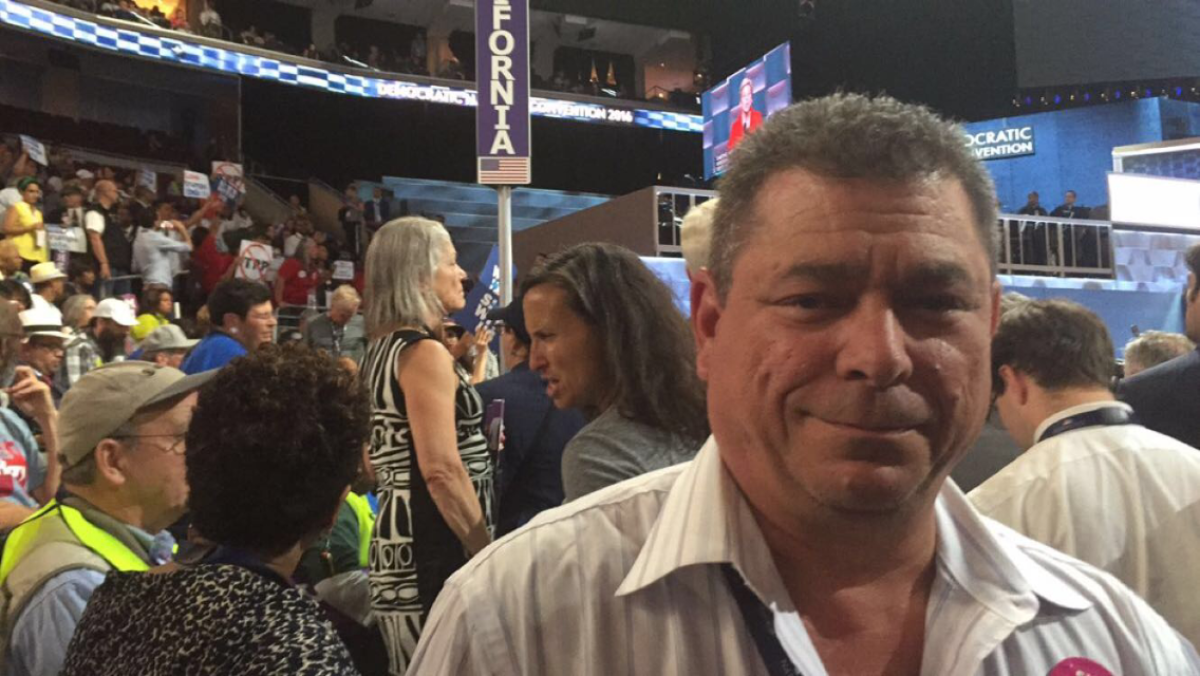
Los Angeles County Democratic Party Chairman Eric Bauman, a front-runner in the race to lead the state party, sent an email Sunday to California Democrats saying he‚Äôs been targeted by false rumors of ‚Äúengaging in inappropriate behavior with 14- and 16-year-old boys.‚ÄĚ
Bauman said he decided to send the email after members of his campaign team, while calling California Democratic Party delegates to ask for their support, reported that at least four people said they had heard the rumor.
‚ÄúI am outraged about the latest tactic in the politics of personal destruction that have infected this race for CDP Chair,‚ÄĚ Bauman, who also serves as a vice chair in the state party, wrote in the email. The subject line read, ‚ÄúI can no longer stay silent.‚ÄĚ
‚ÄúI‚Äôm a pretty tough guy and I can take the attacks, lies, distortions, and mud that has been slung at me pretty well,‚ÄĚ Bauman‚Äôs email said. ‚ÄúBut to accuse me of child abuse, especially of this nature, is beyond the pale and 100% unacceptable.‚ÄĚ
When reached by telephone Sunday, Bauman said he was not accusing any of his opponents of orchestrating or spreading the reports. He said he did not know the origin of the rumors.
Bauman said he was distraught after hearing the reports. In the email to state Democrats, he wrote, ‚ÄúI spent much of my evening sobbing, literally sobbing ‚ÄĒ a 58-year-old man, inconsolable. Finally, my husband Michael convinced me to go with him for a long walk with the dog so we could talk and I‚Äôd be distracted.‚ÄĚ
Bauman told The Times he understands that by addressing the rumor and ‚Äúputting it out there, I sort of in a way spread the thing.‚ÄĚ
‚ÄúI was thinking that the only way to shut it down was to shut it down. So that was the point of the email,‚ÄĚ he said.
His top rival, Kimberly Ellis, quickly denounced the situation.
‚ÄúThese rumors are despicable and there‚Äôs no place in our politics for such outrageous behavior and I denounce any such type of cruel maligning of someone‚Äôs character,‚ÄĚ Ellis said in her own email to state Democrats, sent two hours after Bauman‚Äôs message.
‚ÄúWhile Eric and I have substantive differences, we also have had the opportunity to spend a significant amount of time together on the campaign trail,‚ÄĚ she wrote. ‚ÄúThough there‚Äôs certainly a lot of passion on both sides, I‚Äôm proud of the mutual respect and courtesy we‚Äôve shown each other in our interactions.‚ÄĚ
Former L.A. mayor and current gubernatorial candidate Antonio Villaraigosa, who endorsed Bauman a year ago, also denounced the rumors.
‚ÄúSomeone is spreading vicious and vile rumors about Eric Bauman engaging in illicit activity with underage minors,‚ÄĚ he said. ‚ÄúObviously, it‚Äôs beyond the pale and has no room in Democratic Party politics, in any politics, it‚Äôs outrageous.‚ÄĚ
Ellis is the former director of Emerge California, a Bay Area organization that encourages and trains women to run for political office.
Bauman had been considered the clear front-runner for the state party chairmanship, but supporters of Vermont Sen. Bernie Sanders’ bid for president and other progressive Democrats have rallied behind Ellis in recent months, making it a hotly contested race.
At a fundraiser in Oakland on Sunday, Ellis told supporters she believes she has enough support from delegates to win.
Bauman disputed that and contended he had enough support from delegates to be elected chairman. He said at worst, it‚Äôs a ‚Äú50-50‚ÄĚ race.
UPDATE
May 8, 7:56 p.m.: Updated with a statement from Antonio Villaraigosa.
This post was originally published on May 7.
At a stop in Beverly Hills, Bernie Sanders vows Obamacare repeal bill ‚Äėis never going to pass‚Äô in Senate
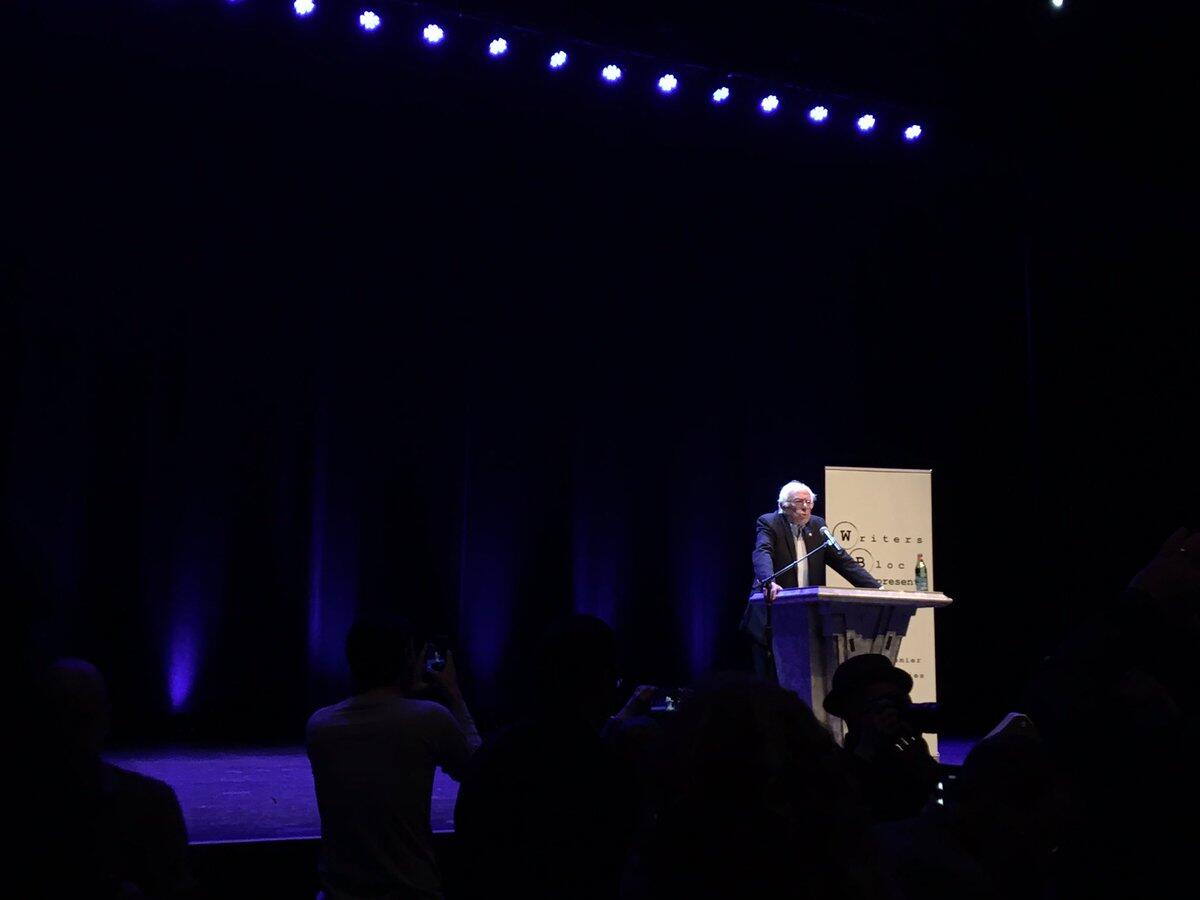
Vermont Sen. Bernie Sanders on Sunday called the GOP-backed Obamacare repeal bill ‚Äúone of the most disgusting pieces of legislation ever passed,‚ÄĚ and called it a ‚Äúdeath sentence for thousands‚ÄĚ of Americans who may not seek medical care when they get sick.
Speaking to a sold-out crowd of more than 1,500 people at the Saban Theatre in Beverly Hills, Sanders vowed to help make sure that the bill, which passed the House on Thursday, is ‚Äúdead in its tracks.‚ÄĚ
‚ÄúLet me tell you,‚ÄĚ he said as the theater erupted in applause. ‚ÄúThat legislation is never going to pass the United States Senate.‚ÄĚ
California Republicans were key to helping narrowly passing the bill in the House. It heads to the Senate next, where it’s expected to face several obstacles.
In the wide-ranging speech, the latest of several appearances the senator has made in the Los Angeles area in recent months, Sanders hit many of his usual key talking points: the social ills of a shrinking middle class, the burden of student debt, and the need to rid politics of corporate money. Like he has in many post-election appearances, Sanders blamed last year’s election results on a Democratic Party and media that he said ignored the economic suffering of those in America’s heartland.
But healthcare dominated much of the talk, with Sanders adding that it‚Äôs important to acknowledge the ‚Äúmany, many problems‚ÄĚ with Obamacare. Some of the most raucous applause from the audience came after Sanders mentioned his so-called ‚ÄúMedicare for All‚ÄĚ single-payer healthcare proposal.
Sanders repeated a call he made at an event Saturday night, urging California to adopt such a measure that is currently being considered in the state Legislature.
‚ÄúYou can help me, you can help this country pass single-payer right here in California,‚ÄĚ Sanders said.
Responding to a question submitted via social media, Sanders also addressed his support of Omaha mayoral candidate Heath Mello, a Democrat who has been criticized by abortion rights group NARAL for his ‚Äúanti-choice‚ÄĚ stances.
After criticizing the GOP healthcare bill for stripping funds from Planned Parenthood, Sanders said the party should not exclude Democrats who don‚Äôt pass a ‚Äúlitmus test‚ÄĚ on abortion rights.
‚ÄúShould the Democratic Party be a strong, vigorous uncompromising pro-choice body? The answer is yes,‚ÄĚ Sanders said. ‚ÄúI would rather be a party in the Senate that‚Äôs 85% pro-choice in the majority rather than being 90% pro-choice in the minority.‚ÄĚ
California Politics Podcast: A tough week for Janet Napolitano
No president of the University of California has ever had the political pedigree of Janet Napolitano, and at no moment of her tenure in the job has she probably ever needed those skills more than now.
On this week’s California Politics Podcast episode, we discuss the UC president’s appearance at a legislative hearing to respond to a state audit’s critical review of her office’s accounting practices.
We also discuss the reaction of state lawmakers to President Trump’s action on future offshore oil drilling. And we take a closer look at the huge political stakes that are now facing Democrats in the Legislature over a proposal to create a new single-payer healthcare system.
I’m joined by Times staff writer Melanie Mason and Marisa Lagos of KQED News.
Bakersfield artist to run against Kevin McCarthy from the right
Democrats have pledged to use the healthcare vote against vulnerable Republicans. The fight also has prompted something unusual in Bakersfield: a Republican is mounting a long-shot challenge to House Majority Leader Kevin McCarthy.
Joe Aleman, a photographer and artist who has never run for office, said that as a Christian he struggled with the details of the House plan to roll back the Affordable Care Act.
Aleman, 41, said he specifically opposes lifting bonus caps for insurance executives and causing an estimated 24 million people to lose health insurance. The measure goes too far, so he feels compelled to challenge the six-term congressman in 2018.
‚ÄúThe whole thing just seems too corrupt, I can‚Äôt sleep because of it,‚ÄĚ Aleman said. ‚ÄúThe injustice of it, just the great injustice of it.‚ÄĚ
The bill, which narrowly passed the House on Thursday and faces an uphill fight in the Senate, phases out federal funding of expanded access to Medicaid, a move expected to knock millions of people off of Medi-Cal, as the program is known in California.
Health Access California, an advocacy group using UC Berkeley data, estimates that nearly 70,000 people in McCarthy’s district alone would lose access to Medi-Cal, and the 23rd District has been a flashpoint for protests about repealing the Affordable Care Act.
‚ÄúHow is this guy throwing his own district under the bus?‚ÄĚ Aleman said. ‚ÄúWho would do this to his own people?‚ÄĚ
Aleman said his wife, Holly, has fibromyalgia, which insurance companies consider a preexisting condition, and could potentially be affected by the bill, even with her employer-sponsored health insurance. Aleman himself is uninsured ‚ÄĒ he says it‚Äôs too expensive.
Aleman acknowledged his candidacy is ‚Äúthe ant against the elephant,‚ÄĚ but added, ‚ÄúI know God is behind opposing Kevin with me.‚ÄĚ He has not yet opened a campaign committee but he has a website.
McCarthy won reelection with 69% against Democrat Wendy Reed last fall. He has easily defeated challenges from the right.
Aleman found religion and studied theology after what he described as a troubled childhood, including a stint in juvenile hall.
He said political leaders have fallen away from their Biblical role as caretaker of widows and orphans.
‚ÄúThe difference between us and the rest of the world is how we treat our poor and those who don‚Äôt have anything,‚ÄĚ he said. ‚ÄúWe‚Äôve lost something in this. This is people, this is people‚Äôs babies. The greater ill is for us to show our lack of humanity.‚ÄĚ
In California book tour stop, Ohio Gov. John Kasich blasts ‚Äėwoefully inadequate‚Äô GOP healthcare bill
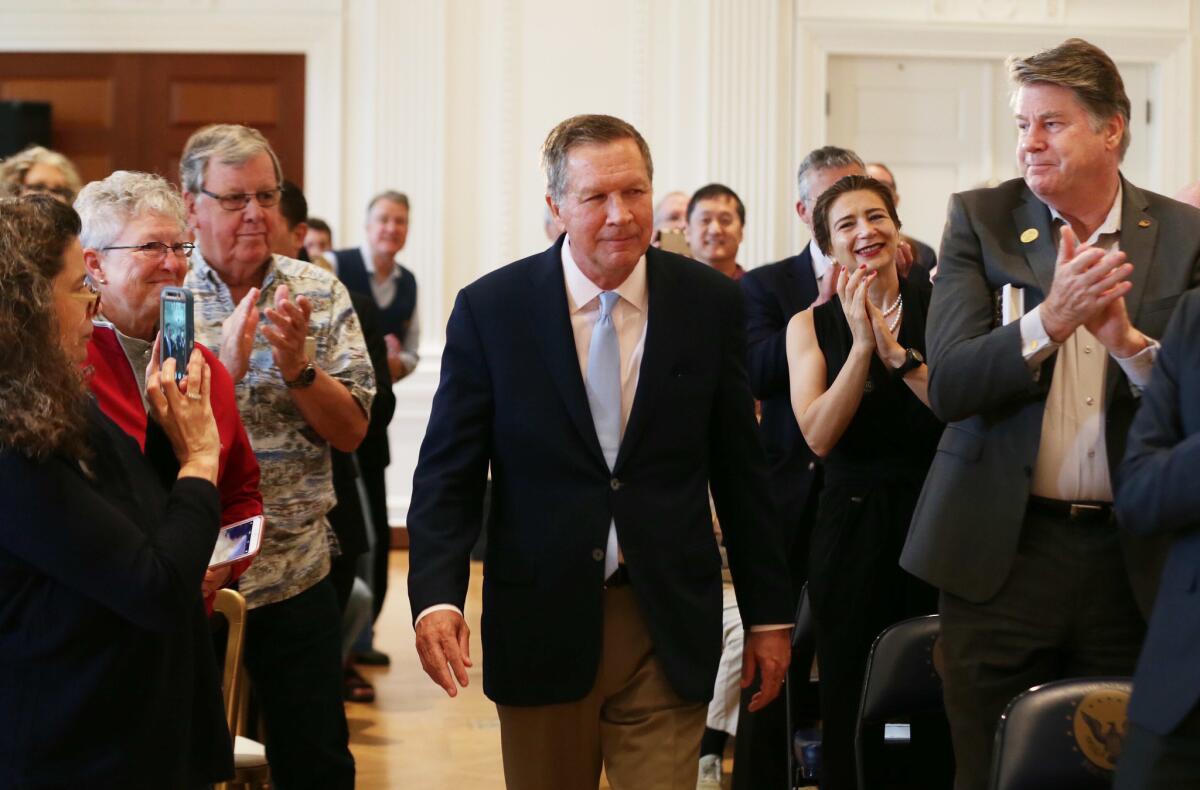
Ohio Gov. John Kasich on Friday blasted the healthcare bill Republicans passed in the U.S. House of Representatives, saying that it fails Americans in need.
‚ÄúThis bill ‚Ķ is woefully inadequate and very disappointing,‚ÄĚ he said during an appearance at the Richard Nixon Presidential Library in Yorba Linda. ‚ÄúPut yourself in somebody else‚Äôs shoes ‚ÄĒ how you would like to not be able to get health insurance because you have a preexisting condition, or you‚Äôre sick or you don‚Äôt have money?‚ÄĚ
Kasich, who ran for president in 2016 and won only his home state of Ohio in the primary, was speaking at the library to promote his new book, ‚ÄúTwo Paths: America Divided or United.‚ÄĚ
A staunch opponent of fellow Republican Donald Trump during the GOP primary, Kasich is the subject of speculation about whether he will challenge Trump for the presidency in 2020.
‚ÄúEveryone goes, are you going to run for office? I‚Äôm not even going to think about it ‚Äėtil you buy my book,‚ÄĚ Kasich said to laughter from a crowd gathered in a replica of the White House‚Äôs East Room.
Former Gov. Arnold Schwarzenegger, a long-time friend of Kasich’s, recently encouraged the Ohio governor to run.
In an interview, Kasich said he was not preparing to run against the president, but did not rule it out.
‚ÄúLook, I‚Äôve got to finish my job in Ohio. I‚Äôm not planning anything like that and I hope the president will do well,‚ÄĚ he said. ‚ÄúI want him to be able to unify the country, and I really don‚Äôt know what my future is going to be, so we‚Äôll see.‚ÄĚ
Trump just marked 100 days in office, and Kasich said he graded the presidency so far as ‚Äúincomplete.‚ÄĚ
‚ÄúI like the fact he said Dreamers ought to rest comfortably. I think the request for burden-sharing on other countries is good. I don‚Äôt like the knock-and-talk policy and I don‚Äôt like this healthcare bill,‚ÄĚ Kasich said, adding that he was confident it would not pass in the Senate.
During his speech, Kasich decried polarization in the nation’s capital, gerrymandering that he said has forced politicians to be extreme partisans, unfettered spending in politics and the method by which the country selects its presidents.
‚ÄúThese debates are the most ridiculous thing I‚Äôve ever seen, because it all gets to be about sound bites and getting on the morning news. Now, as you all know, during the campaign I was the Ugandan swimmer at the Olympics ‚ÄĒ so far in the lane over here you couldn‚Äôt even see me half the time,‚ÄĚ he said. ‚ÄúThere needs to be a better way.‚ÄĚ
He blamed the media, saying the networks profited heavily off the debates, and called for alternate formats such as town halls that allow candidates to discuss issues in greater depth.
‚ÄúNow we are picking a president on the basis of who has the cleverest, most bombastic line so the morning people can put you on television,‚ÄĚ Kasich said. ‚ÄúAnd I mean, c‚Äômon folks, look at where we are. This is not a way to pick leaders for the country.‚ÄĚ
A man in the crowd yelled out, ‚ÄúYou didn‚Äôt insult anybody.‚ÄĚ
‚ÄúThat‚Äôs why I‚Äôm here and not in the White House,‚ÄĚ Kasich replied.
Maria Cabildo, third place finisher in L.A.’s congressional primary, endorses Gomez for the runoff
California proposes new rules and standards for marijuana testing laboratories
Laboratories that test marijuana for medical use in California will have to be licensed and show their employees are properly trained, and will face strict guidelines for how to conduct examinations of samples, according to rules proposed Friday by the state Bureau of Marijuana Control.
The bureau hopes to begin issuing licenses for the cultivation, transportation, testing and sale of medical marijuana in January and has been rolling out proposed regulations for public input.
‚ÄúThe broad objectives of these regulations are to ensure that the medical cannabis goods sold to consumers from licensed dispensaries are safe for consumption,‚ÄĚ the bureau said in a statement Friday.
The rules would set analysis standards for marijuana, including procedures to detect moisture content, residual solvents and processing chemicals, pesticides, microbiological impurities, mycotoxins, filth and foreign material, heavy metals, and terpenes.
Testing labs would issue a certificate of analysis for each sample providing the test results before marijuana can be sold.
Voters in November approved the sale of marijuana for recreational use and the testing guidelines are expected to be similar to those proposed for medical pot.
California lawmakers move to protect the information of immigrants who take the witness stand in court
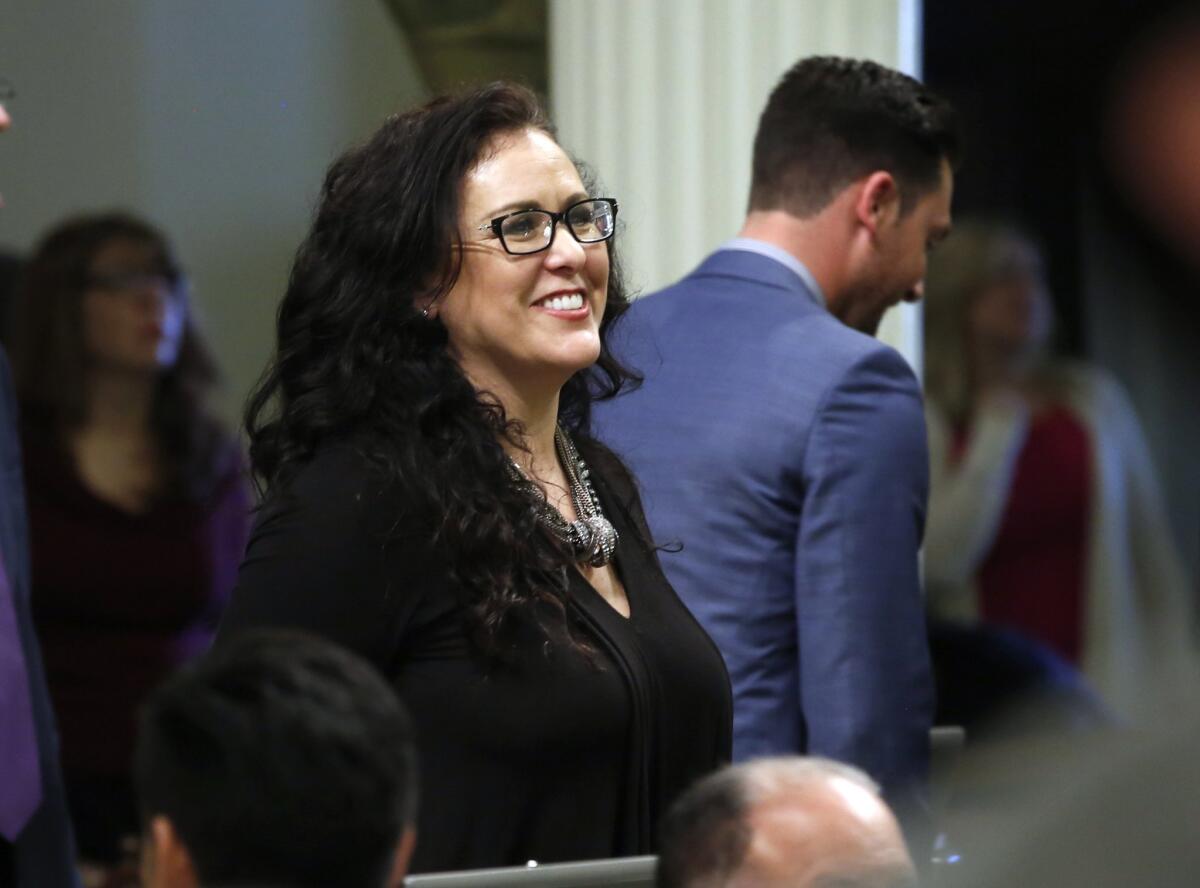
Two state lawmakers announced a bill Friday aimed at protecting immigrants from what they called ‚Äúirrelevant‚ÄĚ disclosures of their immigration status in open court during civil and criminal trials.
The measure by Sen. Scott Wiener (D-San Francisco) and Assemblywoman Lorena Gonzalez Fletcher (D-San Diego) would require that questions about the immigration status of any witness, victim or defendant first be deemed by a judge to be relevant to the subject of pending litigation.
The measure comes amid concern that federal immigration agents are going into courthouses to take immigrants in the U.S. illegally into custody.
‚ÄúPeople should not fear that stepping onto the witness stand could be a first step toward deportation,‚ÄĚ Wiener said in a statement. ‚ÄúThe focus of our justice system should be discovering the truth, not scaring potential witnesses by disclosing their immigration status when it is unrelated to the case.‚ÄĚ
Senate Bill 785 is supported by San Francisco Dist. Atty. George Gascón.
‚ÄúNo one should have to decide between being a witness and being deported,‚ÄĚ Gonzalez Fletcher said.
Atty. Gen. Xavier Becerra brings on Washington and campaign veterans, immigration experts
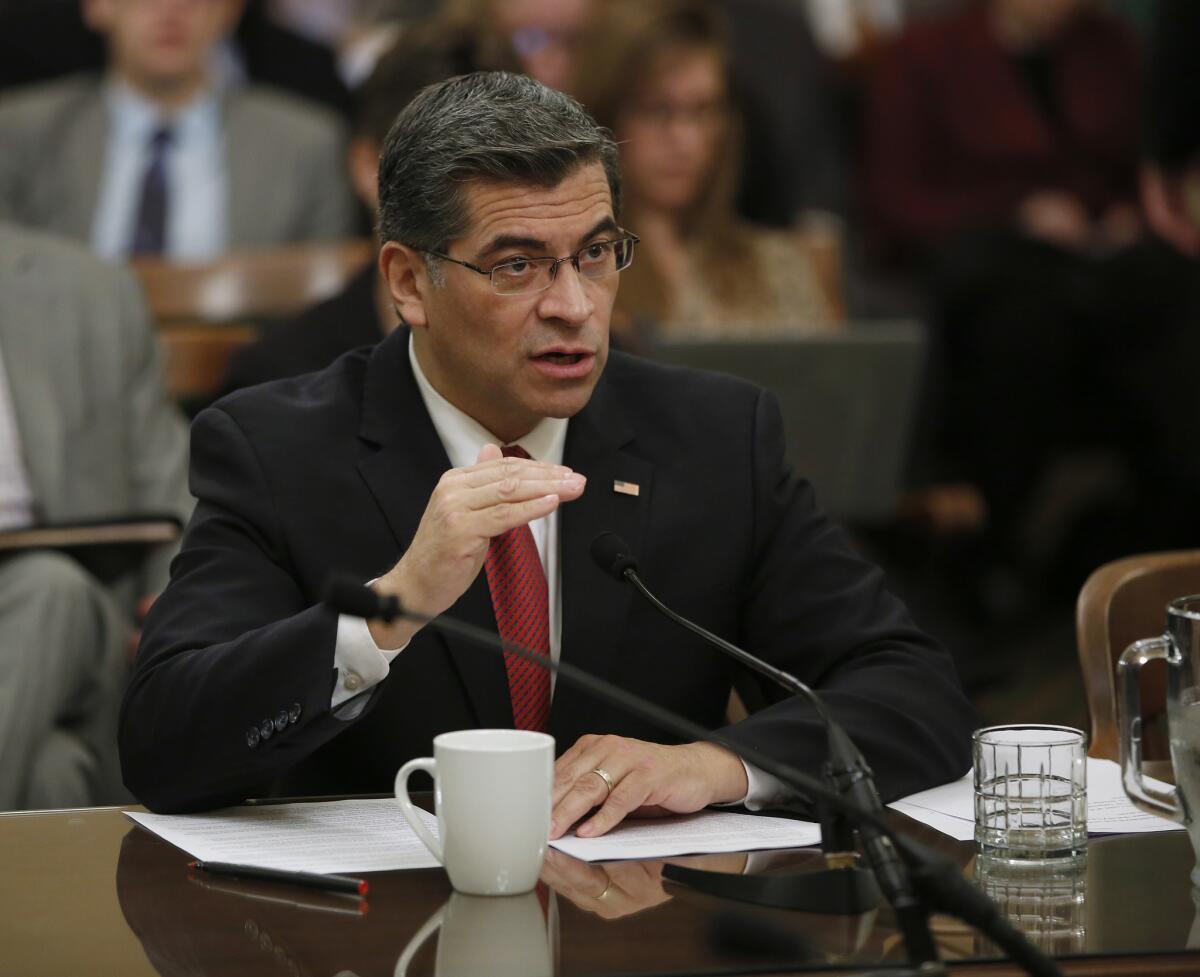
Since taking office in January, California Atty. Gen. Xavier Becerra has remade the executive staff of the state Department of Justice, bringing in a large number of new staffers from Washington with legal expertise to reflect his special interest in immigration, civil justice reform and the environment.
Becerra, who faces an election campaign in 2018, announced 14 executive appointments on Friday. Many of them worked in the federal government while Becerra was in Congress, including some operatives who were involved in Hillary Clinton’s presidential campaign. Most are replacing staffers who left when Kamala Harris was elected to the U.S. Senate.
Becerra said his executive team will ‚Äúhelp pursue an agenda that not just defends the people of California but promotes their best interest. I have brought people on board who are experts in the environment, the safety of consumers, criminal justice reform, health care and immigration.‚ÄĚ
Becerra’s second-in-command is Sean McCluskie, who will serve as chief deputy attorney general. During the last decade, McCluskie worked in Becerra’s congressional office, most recently as chief of staff.
Becerra also has appointed Amanda Renteria, who most recently worked as the national political director for the Clinton campaign. She will be chief of the division of operations, advising Becerra on budget and human resources issues. Another hire, Chris Moyer as deputy communications director, was a senior director of public affairs at the American Gaming Assn. and worked as the regional press secretary for Hillary for America in Ohio.
Becerra told reporters this week that when he took office on Jan. 24, none of the 1,100 attorneys on the staff had been hired as experts on immigration law even though ‚Äúduring my first month most of my attention was on immigration law.‚ÄĚ
That changed with the hiring of Jonathan ‚ÄúJon‚ÄĚ Blazer as special assistant attorney general and advisor on immigration. Blazer recently was an advocacy and policy counsel for immigrants rights at the American Civil Liberties Union, and previously worked at the National Immigration Law Center as a policy attorney.
The appointment of an immigration expert makes sense at a time when the Trump administration is threatening mass deportations and withholding of federal funds from cities and states that don’t cooperate with immigration agents, said Jack Pitney, professor of politics at Claremont McKenna College. That even though immigration enforcement is within the jurisdiction of the federal government.
‚ÄúThe appointment of a specialist in immigration law is not as odd as it sounds,‚ÄĚ Pitney said. ‚ÄúHe is planning to fight in federal court for state interests. The recent ruling on sanctuary cities indicates that the Trump administration is encroaching on Tenth Amendment rights.‚ÄĚ
With the Trump administration threatening to repeal Obamacare, Becerra has appointed two high-level advisors with expertise in healthcare, including Melanie Fontes Rainer as special assistant attorney general. Rainer recently was senior counsel to the U.S. Senate Committee on Health, Education, Labor and Pensions and counsel to the Congressional Budget Committee, where she specialized in issues involving women’s health and rights, gender-based violence and the Affordable Care Act.
Becerra also appointed Laura Stuber as senior special assistant attorney general following her stint at the U.S. Department of Health and Human Services and the U.S. Senate permanent subcommittee on investigations, managing congressional oversight inquiries regarding the Affordable Care Act.
The attorney general is currently working on criminal justice reforms approved by the Legislature, including efforts to make sure a state database of gang members is accurate, and development of new regulations on racial profiling by the police.
To assist him, Becerra has hired Kelli Evans as special assistant attorney general and advisor on criminal justice reform, civil rights and public safety policy. Evans most recently was a senior director leading ‚Äúaccess to justice work‚ÄĚ for the State Bar of California and also has worked for the ACLU of Northern California.
Other appointments announced Friday include:
--Eleanor Blume, special assistant attorney general and legal and policy advisor on consumer protection, financial markets, and state and local partnerships
--David Zonana, special assistant attorney general and legal and policy advisor on environmental law.
-- Alejandro Pérez, special assistant to the attorney general in the new Office of Federal Affairs.
-- Sirat Attapit, director of the Office of Legislative Affairs.
-- Bethany Lesser, communications director.
-- Patricia Moscoso, executive speechwriter.
-- Liz Saldivar, director of external affairs, who previously worked as director of Becerra’s Los Angeles congressional district office.
Meet the liberal who is trying to unseat Nancy Pelosi
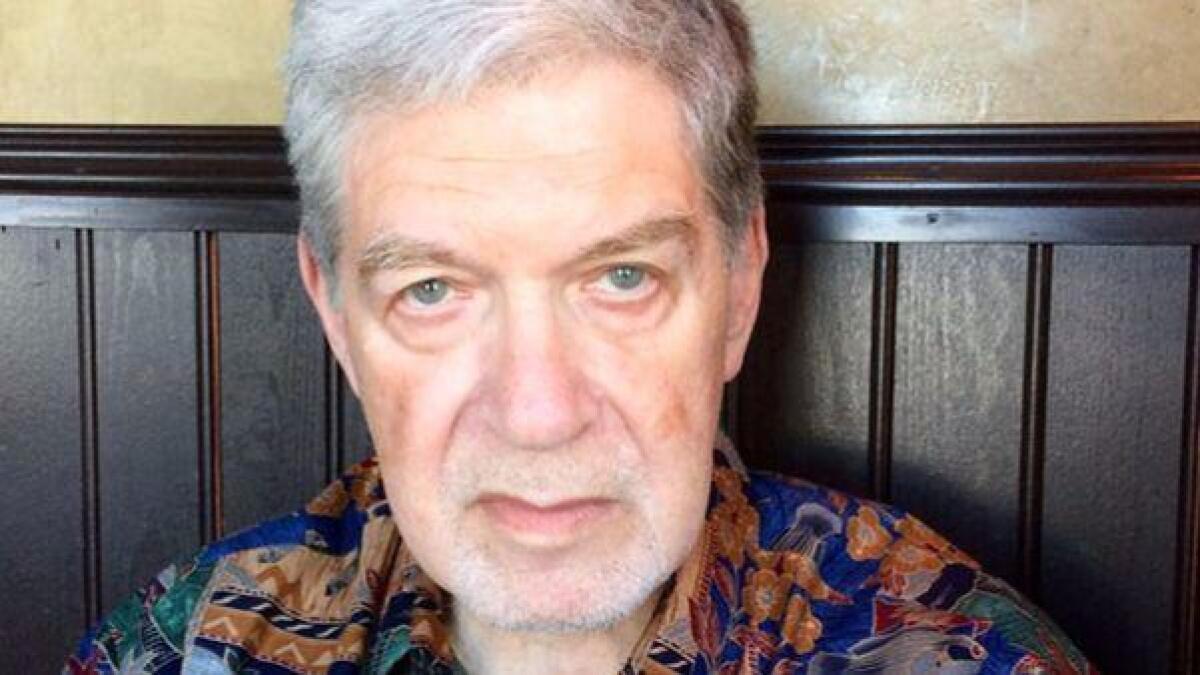
Stephen Jaffe entered the cafe with a small grin, a riotous print shirt and the blithe confidence of someone who doesn’t much care if people think he’s crazy.
The 71-year-old employment attorney, a political novice, was one of many Democrats swept up in the fist-shaking presidential crusade of Vermont Sen. Bernie Sanders. Thus inspired, he’s now fixed his sights on winning a seat in Congress.
But not just any seat.
He hopes to knock off Nancy Pelosi, the former House speaker, the current Democratic minority leader and a political fixture in San Francisco for nigh on 50 years.
Not by portraying her the way a succession of failed Republican challengers have, as the lipsticked embodiment of the ludicrous left.
Rather, Jaffe suggests that Pelosi is not liberal enough or, for that matter, even a true liberal, a proposition that would be dismissed as outlandish anywhere other than San Francisco.
Gov. Jerry Brown to help raise money for Josh Newman, state senator from O.C. facing recall campaign
Political analysts shift California races toward Democrats after healthcare vote
Citing the House vote to roll back the Affordable Care Act, the nonpartisan Cook Political Report has shifted the race ratings evaluating the electoral fortunes of four vulnerable California Republicans toward the Democrats.
While the election is 18 months away, and a lot can and will change in that time, potential challengers and donors consider such rankings when deciding which members of Congress to challenge or where to spend their money. Multiple candidates have already announced bids against incumbent Republicans across California.
Cook political analyst David Wasserman explained the move (which included 20 districts across the country) as happening because Democrats have a new vote to hold against Republicans, much the way the Affordable Care Act was used against Democrats in 2010 when they lost the majority.
‚ÄúAlthough it‚Äôs the first of potentially many explosive votes, House Republicans‚Äô willingness to spend political capital on a proposal that garnered the support of just 17 percent of the public in a March Quinnipiac poll is consistent with past scenarios that have generated a midterm wave,‚ÄĚ Wasserman said.
All 14 of the Golden State’s Republican members joined their House colleagues to pass the bill Thursday afternoon, including the seven California GOP members who became 2018 targets when their House districts picked Hillary Clinton for president.
The Cook Political Report’s May 5 ranking changes are:
- 25th District (toss-up): Democrats have repeatedly challenged Rep. Steve Knight (R-Palmdale) for this seat, and he’s gotten used to running defense. With Knight’s vote for the healthcare bill, the ranking moved from leaning Republican. Announced challengers to Knight include geologist Jess Phoenix and homelessness nonprofit director Katie Hill.
- 39th District (leans Republican): The demographics in Rep. Ed Royce’s Orange County district are shifting away from white suburbanites, but he’s known for his work with the growing Asian population. The ranking moved from likely Republican. Announced challengers include Phil Janowicz, a former chemistry professor at Cal State Fullerton.
- 45th District (leans Republican): Centered on Irvine, Rep. Mimi Walters’ district has had a particularly vocal backlash to Trump. Two UC Irvine law professors, Katie Porter and Dave Min, are among her early challengers.
- 48th District (leans Republican): Rep. Dana Rohrabacher has represented the Orange County coast line for nearly 30 years and hasn’t faced serious Democratic opposition for some time. Democrats, including opponent Laguna Beach real estate businessman Harley Rouda and Laguna Beach developer Boyd Roberts, are already attacking him for how long he’s been in office, and his deferential relationship to Russia.
Holding steady in the rankings were:
- 49th District (toss-up): Rep. Darrell Issa (R-Vista) won reelection in 2018 by less than 2,000 votes, the tightest race he’s had in decades, and has made some not so subtle moves to placate the changing attitudes of his district. Announced opponents include Orange County environmental lawyer Mike Levin and Issa’s 2016 rival Col. Doug Applegate.
- 10th District (leans Republican): Rep. Jeff Denham’s Central Valley district has been a prime pickup target for Democrats repeatedly, but they haven’t had any luck knocking him off. He has a handful of opponents, including investor Josh Harder.
- 21st District: (likely Republican): Like Denham, Rep. David Valadao’s Central Valley district has been a repeated target for Democrats. His majority Latino district went strongly for Clinton.
Veteran lawmaker Mark Leno announces he will run for mayor of San Francisco
Veteran San Francisco politician Mark Leno, who was termed out of the state Legislature in the fall, announced Thursday he would run to become the city’s mayor in 2019.
‚ÄúIt‚Äôs time for a new direction,‚ÄĚ Leno said at a news conference at San Francisco City Hall, according to a statement. ‚ÄúI‚Äôm ready to lead with a progressive vision for our city, grounded in a commitment to affordability and civil rights.‚ÄĚ
San Francisco is booming because of the technology industry, but the successes have come at a cost ‚ÄĒ soaring property prices that make housing unaffordable for a large part of the population, and friction between the city‚Äôs longtime residents and the well-paid recent arrivals.
Leno’s statement announcing he would run to replace termed-out Mayor Ed Lee pointed out the tension.
‚ÄúAt this time of great change, we must preserve a fair living standard for San Francisco‚Äôs middle and working classes while protecting social and economic justice,‚ÄĚ he said. ‚ÄúAs mayor, I‚Äôll fight on behalf of regular San Franciscans ‚ÄĒ immigrants, tenants, homeowners and small businesses. I promise to give a voice to every resident of our city ‚ÄĒ especially to those who feel marginalized or left behind.‚ÄĚ
The Democrat ‚ÄĒ the first candidate to announce his candidacy for mayor ‚ÄĒ boasted several endorsements from prominent San Francisco politicians, including U.S. Sen. Kamala Harris, state Controller Betty Yee and Board of Equalization member Fiona Ma.
Leno, a small business owner, served on the San Francisco County Board of Supervisors for four years before serving in the state Legislature for 14 years. Among his lengthy list of legislative accomplishments is last year’s agreement to increase the state’s minimum wage to $15.
Leno, 65, was also among the first openly gay men to serve in the Legislature.
Here’s how every single California House member voted on the Obamacare repeal bill
Punch in your address here and see how your representative voted. (Spoiler alert: All the Democrats voted against it, and all the Republicans voted for it.)
This assemblyman wants California voters to have a shot at repealing new gas tax and vehicle fee increases
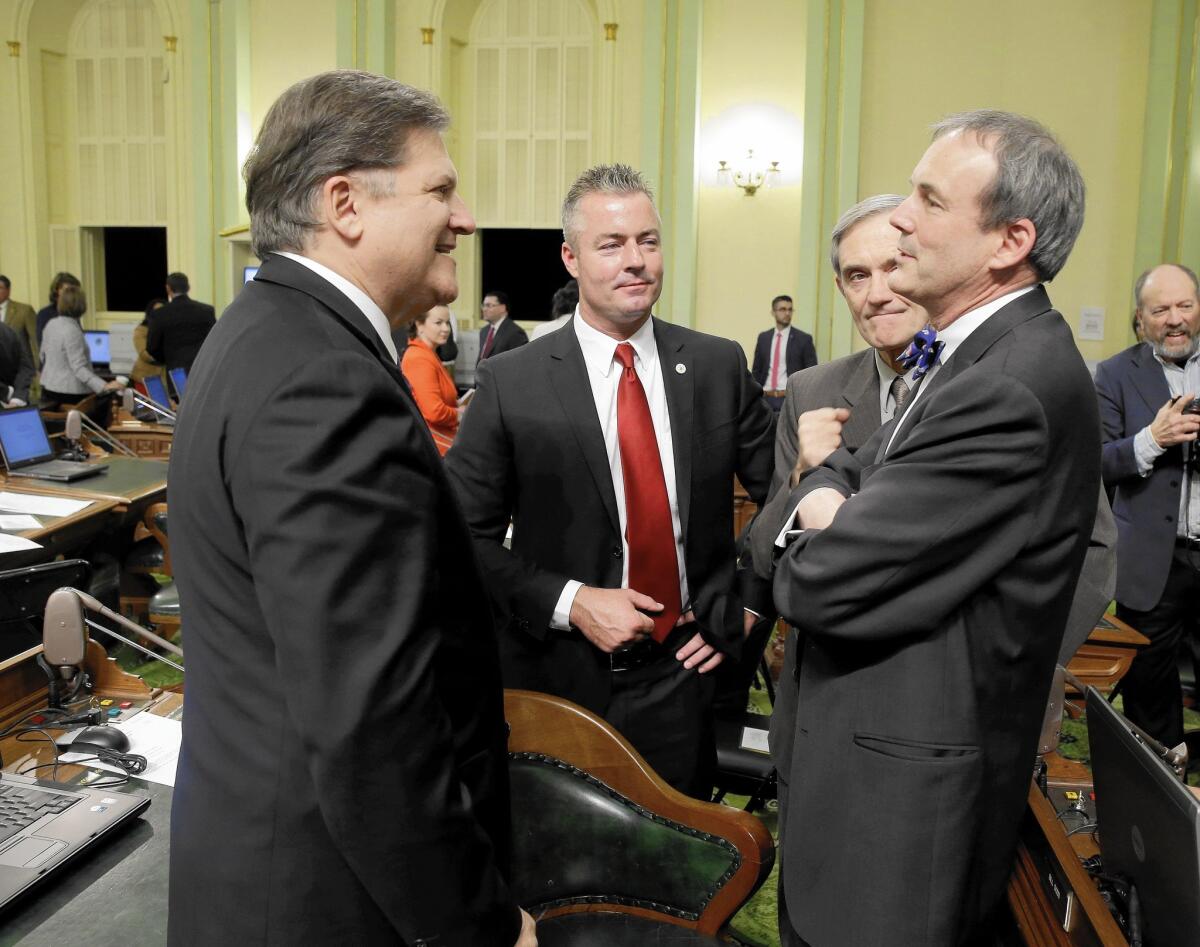
Assemblyman Travis Allen (R-Huntington Beach) is seeking an initiative to repeal gas tax and vehicle fee increases signed into law by Gov. Jerry Brown that will raise $5.2 billion annually for road repairs and mass transit.
Allen filed papers with the state attorney general Thursday to prepare a ballot title and summary so he can work to collect 365,000 signatures from registered voters in 150 days to put the measure on the ballot.
He noted that the bill signed by Gov. Jerry Brown will raise taxes on a gallon of gas by 12 cents on Nov. 1, while adding 20 cents per gallon to the tax on diesel. It also will create new vehicle fees.
‚ÄúJerry Brown‚Äôs decision to push through the largest gas tax increase in California‚Äôs history without the approval of voters demonstrated a complete disregard for ordinary Californians,‚ÄĚ Allen said. ‚ÄúThis ballot initiative will correct Brown‚Äôs failure and allow the people of California to decide for themselves if they want to raise their taxes.‚ÄĚ
Others, including the Howard Jarvis Taxpayers Assn., also have been discussing possible initiatives to repeal the gas tax.
If Allen collects enough signatures, the initiative would be placed on the November 2018 ballot.
The gas tax and vehicle fee increases are supported by a group of labor, business and local governments called the Fix Our Roads Coalition, which said in a statement: ‚ÄúIt‚Äôs hard to view this Initiative as anything more than the same old obstructionist politics that Californians are tired of.‚ÄĚ
Gov. Jerry Brown and two Central Valley GOP congressmen squabble over Obamacare replacement bill
Gov. Jerry Brown landed a last-minute jab at California House Republicans who backed the GOP bill to replace Obamacare, which narrowly passed the House on Thursday.
In a statement released just before the vote, Brown blasted the bill as ‚Äúcruel and ill-conceived,‚ÄĚ and called out three House Republicans who have been at the center of organizing efforts to guard the Affordable Care Act ‚ÄĒ Reps. David Valadao of Hanford, Jeff Denham of Turlock and Steve Knight of Lancaster ‚ÄĒ for leaving constituents‚Äô healthcare at risk.
‚ÄúOur California congressional delegation should vote no on this abomination,‚ÄĚ Brown said.
Valadao and Denham swiftly responded with a counter-punch, accusing Brown of caring more about the healthcare of urban and coastal residents than that of their Central Valley districts.
‚ÄúIf he truly cared about ensuring all Californians had access to healthcare, he would work to improve Medicaid reimbursement rates for the most prosperous state of the nation,‚ÄĚ the congressmen said in a statement.
They continued: ‚ÄúGovernor Brown worsened the problem when he went against the wish of California voters and stole the $1.2 billion from [Proposition 56],‚ÄĚ the tobacco tax passed by voters last year.
Brown is currently engaged in a budget battle with the tobacco tax’s proponents, who wanted that money to go toward increasing reimbursement rates for healthcare providers. His Department of Finance has proposed putting that money toward general Medi-Cal expenses.
Doctors groups have argued low reimbursement rates have led to few physicians taking on new Medi-Cal clients, making it harder for patients to access care.
Bill that would allow cities to mandate more low-income rental housing clears Assembly
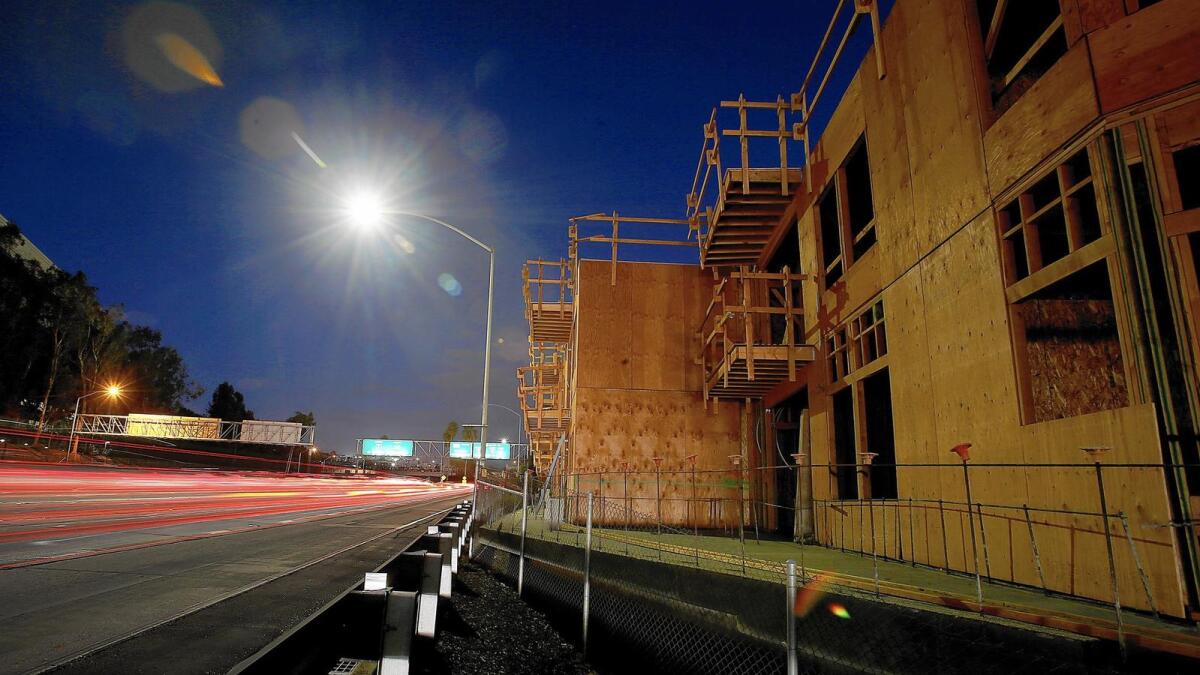
A measure that would allow local governments to force developers to include more low-income housing within their projects passed the Assembly Thursday.
Assemblyman Richard Bloom (D-Santa Monica), the bill’s author, said his legislation would provide more low-income housing at a time when soaring costs have led to a statewide crisis.
‚ÄúGiven our state‚Äôs severe housing crisis it is critical we give our local governments every possibly tool to address affordable housing needs,‚ÄĚ Bloom said.
But Assemblyman Matthew Harper (R-Huntington Beach) argued that the bill would raise costs for developers and therefore reduce their ability to produce the broad housing stock the state needs to control prices.
‚ÄúThe problem is bills like this make it harder for the market to be able to meet supply needs in the state of California,‚ÄĚ Harper said.
The bill would allow cities to create policies that require developers to reserve a certain percentage of their projects for low-income residents or pay a fee. The measure was in response to a court case filed by Los Angeles developer Geoff Palmer who contended that the city of Los Angeles’ housing policy violated state law prohibiting the expansion of rent control.
Should Bloom’s bill become law, cities would be allowed to implement these policies on rental developments.
Gov. Jerry Brown sides with Jimmy Gomez in race for L.A. seat in Congress
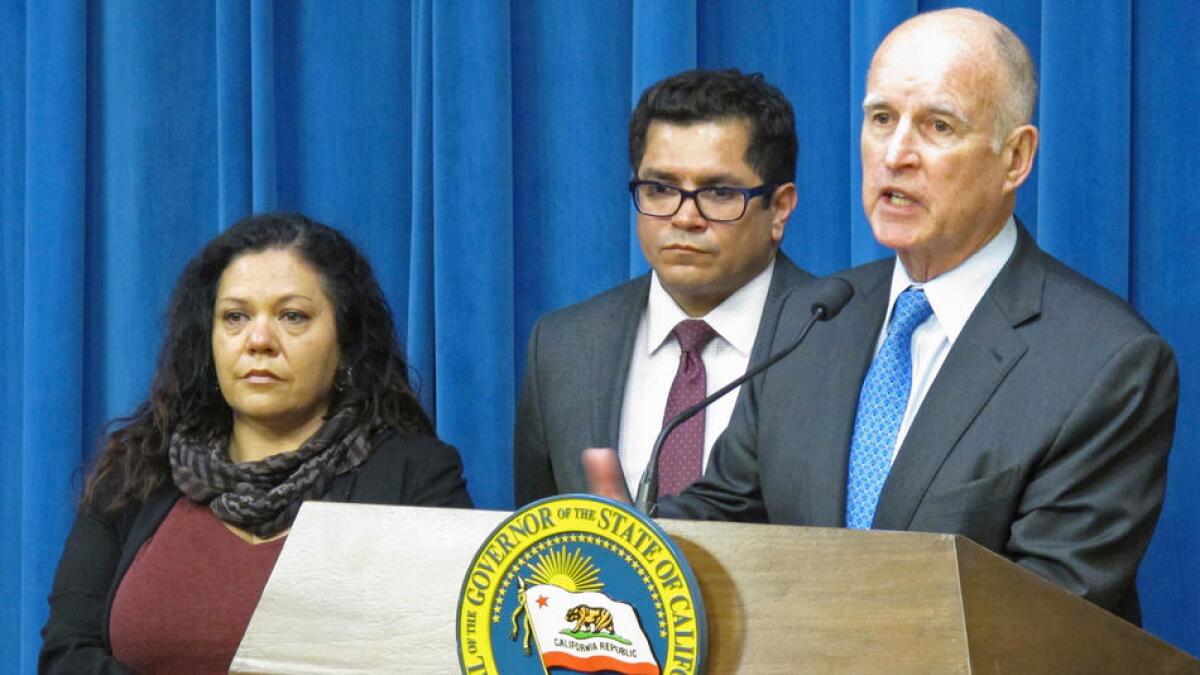
Assemblyman Jimmy Gomez (D-Los Angeles) just got a nod from California‚Äôs top state official in his race for Congress. Gov. Jerry Brown endorsed Gomez on Thursday, saying he has ‚Äúmade a difference for California‚Äôs families.‚ÄĚ
In a statement released by Gomez‚Äôs campaign, Brown lauded Gomez‚Äôs work to expand California‚Äôs paid family leave program, a policy win Gomez often speaks about on the campaign trail. ‚ÄúJimmy will be an outstanding Congressmember and I urge Angelenos to support him on June 6,‚ÄĚ Brown said.
Gomez, who will face attorney Robert Lee Ahn in a June 6 runoff to replace Xavier Becerra, has garnered the lion’s share of endorsements from the Democratic Party establishment, including dozens of local, state and federal elected officials. His other endorsements include L.A. Mayor Eric Garcetti, U.S. Sen. Kamala Harris and Becerra himself.
Pelosi: ‚ÄėMost people don‚Äôt even know¬†who their congressperson¬†is ... now they‚Äôll find out‚Äô
Most people don’t even know who their congressperson is in many places. And now they’ll find out. They will find out that their congressperson voted to take away their healthcare.
— Nancy Pelosi, with a warning to Republicans a couple of hours before a scheduled vote on the Republican healthcare plan to replace Obamacare.
Former assemblyman drops campaign for state’s scandal-plagued tax board, deciding it should not be an elected panel
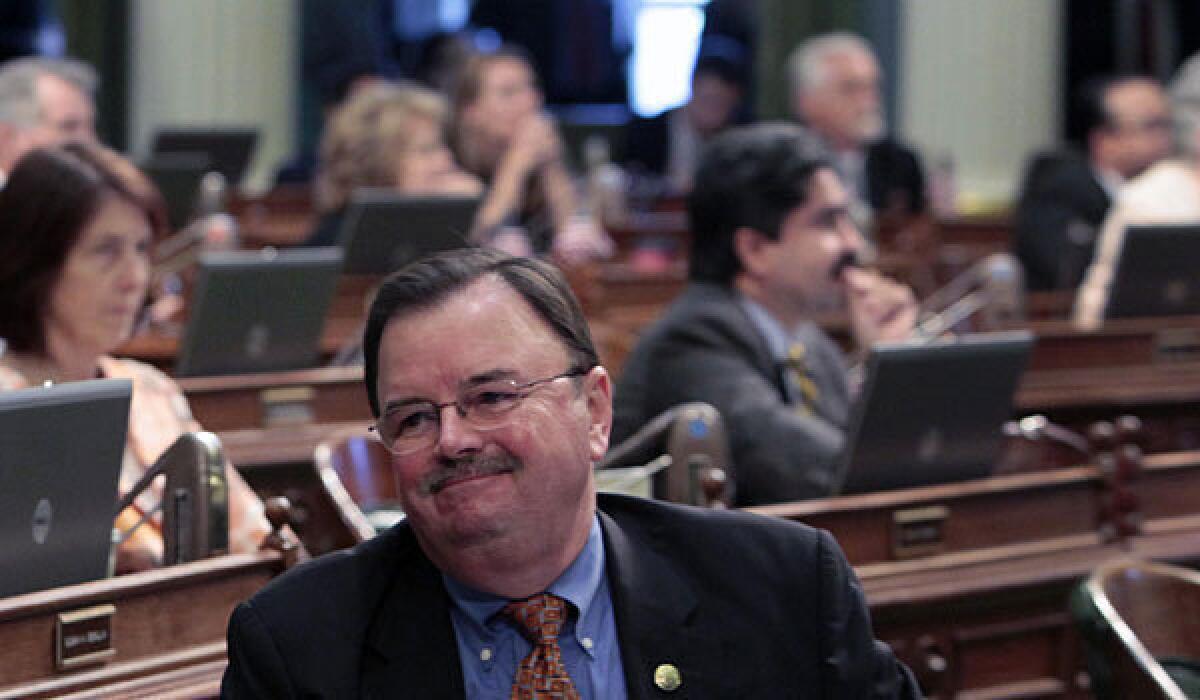
Former California Assemblyman Richard Gordon said Wednesday he is dropping out of the 2018 race for the state’s scandal-plagued tax board because he believes setting it up as an elected panel has contributed to its problems, including multiple investigations.
A Democrat from Menlo Park, Gordon was a high-profile candidate in the field of three vying for the 2nd District seat on the state Board of Equalization.
His decision to end his candidacy comes a few weeks after Gov. Jerry Brown stripped the board of its contracting and hiring powers and asked state Atty. Gen. Xavier Becerra to launch an investigation into allegations that the board misused state resources.
Brown acted after a state audit found elected board members improperly borrowed tax auditors and other employees to help with parking control and reception at events billed as public education conferences. The events instead served to promote the sponsoring elected members.
‚ÄúI have come to the conclusion that fundamentally you can‚Äôt solve the problems that are surfacing at the Board of Equalization as long as the board is elected,‚ÄĚ Gordon said in an interview. ‚ÄúThe political process candidly interferes with the ability of the board to play its role as a quasi-judicial hearing body.‚ÄĚ
Gordon, 68, said it would be better to have the board appointed with a requirement that some of its members be administrative law judges with experience that would help when they hear tax appeals.
‚ÄúClearly there is a confusion between what is public education and outreach and board member promotion,‚ÄĚ Gordon said. ‚ÄúIn a political arena, elected officials and candidates want to promote themselves. In a governance arena, they want to make sure the public has the right information and education.‚ÄĚ
He also said the board members represent districts with nine million people each, requiring a lot of fundraising. Candidates must recuse themselves from acting on matters involving a campaign contributor of $250 or more, but donors circumvent the rule by giving to political action committees, said Gordon, who served in the Assembly for six years ending last year.
The current system ‚Äúleaves the public not knowing whether the actions of the board are being based on good policy and sound regulation, or whether it‚Äôs being made on the basis of a political contribution,‚ÄĚ Gordon said.
Another concern, he said: Each of the four board members has constituent service staff and offices in their districts.
‚ÄúYou are playing a role of helping a constituent solve a problem, and those same people may appear before your board,‚ÄĚ he said.
In addition, Gordon said it is unacceptable that board members may have ex parte communications with those who appear before the board without disclosing it to the public.
Gordon said his campaign has raised about $100,000 since he became a candidate in January. He made his decision known in a letter Thursday to his supporters.
‚ÄúCalifornia must find a new way of managing our tax collection process,‚ÄĚ he wrote. ‚ÄúIn light of my conclusion about the basic structure of the Board of Equalization, it would be hypocritical for me to seek an office which I do not believe should be elected.‚ÄĚ
Other potential candidates for the Northern California district seat include Democrat Malia Cohen and former Republican Assemblywoman Beth Gaines.
California’s senators just proposed a path to legal status and citizenship for farmworkers
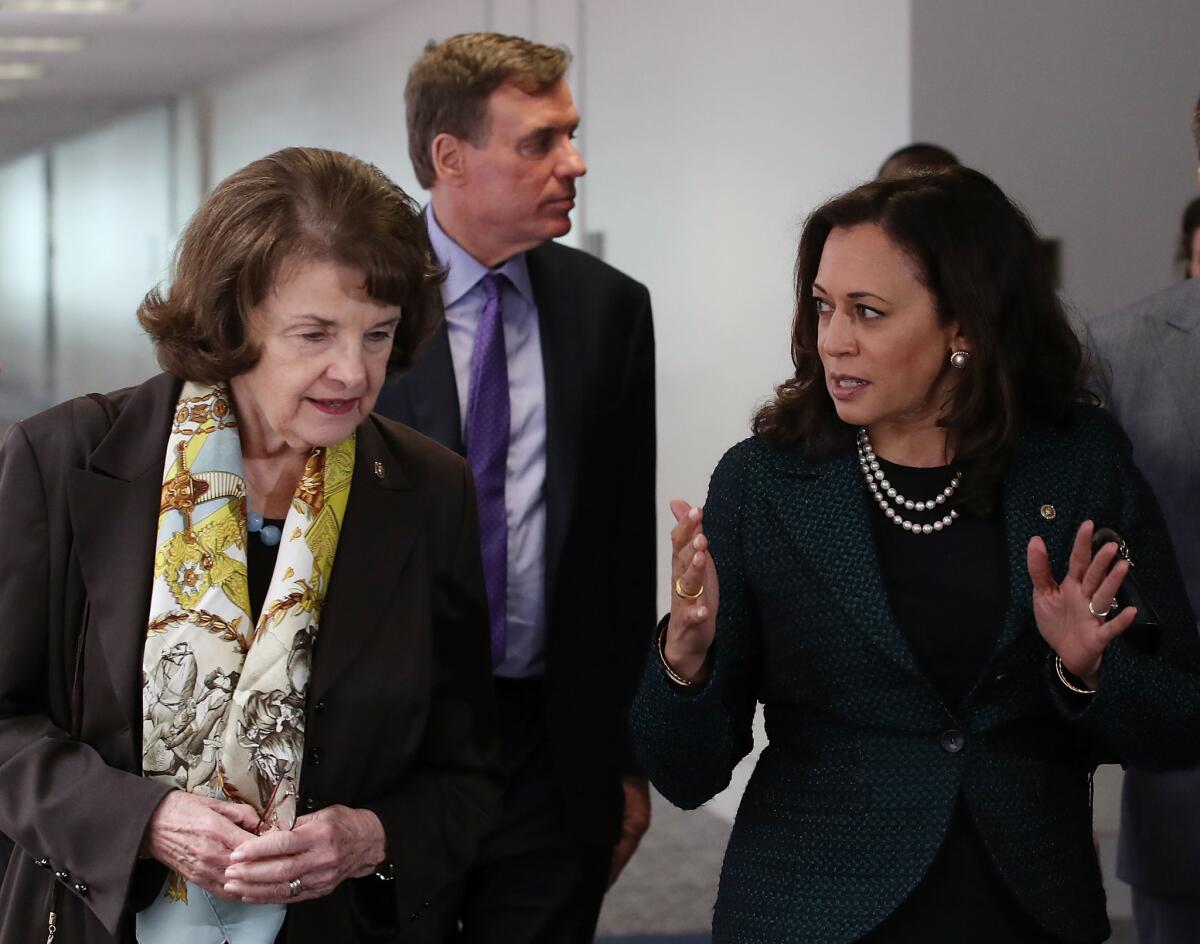
California’s two Democratic senators filed legislation Wednesday that would shield farmworkers who are in the country illegally from deportation and create a path to citizenship.
‚ÄúEverywhere I travel in California, I hear from farmers, growers and producers from all industries ‚ÄĒ wine, citrus, fruit and tree nuts, dairy ‚ÄĒ that there aren‚Äôt enough workers,‚ÄĚ Sen. Dianne Feinstein said in a statement. ‚ÄúFarm labor is performed almost exclusively by undocumented immigrants ‚ÄĒ a fact that should surprise no one.‚ÄĚ
Nine in 10 agriculture workers in California are foreign-born, and more than half are undocumented, according to federal numbers. Despite rising wages, California farmers have said they cannot hire enough native-born workers.
The bill is also backed by senators from Colorado, Vermont and Hawaii, but there’s been no broad talk in Congress of reforming immigration laws this year. With Democrats in the minority and unable to direct when legislation may be considered, the proposed Agricultural Worker Program Act faces an uphill battle.
It would allow undocumented farmworkers who have worked in agriculture for at least 100 days in each of the previous two years to earn a ‚Äúblue card,‚ÄĚ which would allow them to work legally.
They would eventually be eligible for a green card or legal permanent residency, which opens the door to earning citizenship.
‚ÄúIt‚Äôs past time and smart for our economy that we provide them a pathway to citizenship, decent working conditions, and the opportunity to come out of the shadows and more fully contribute to our state and national economy,‚ÄĚ Sen. Kamala Harris said in a statement.
Central Valley’s Jeff Denham gets new 2018 challenger
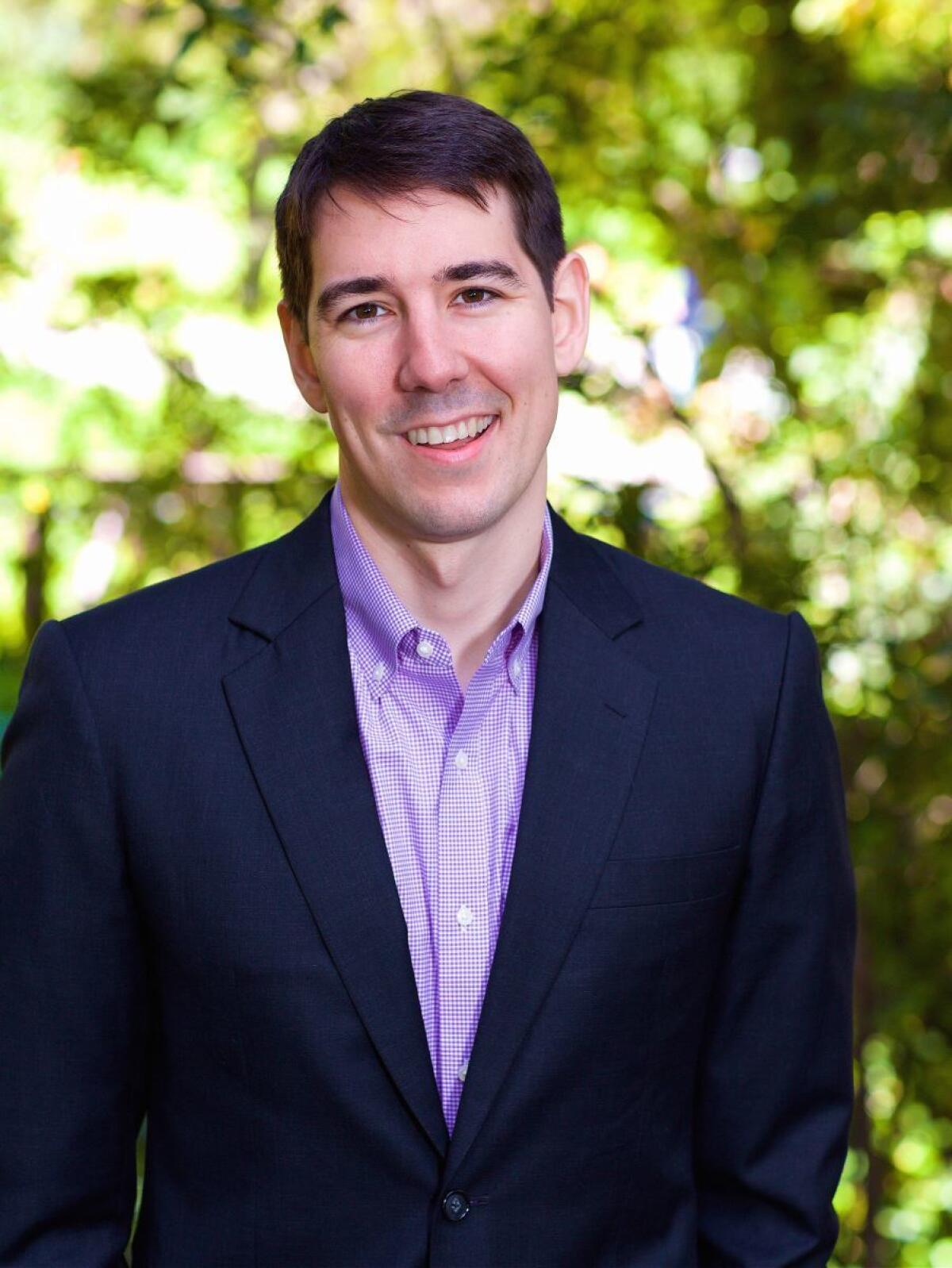
A 30-year-old investor will challenge the Central Valley’s Rep. Jeff Denham (R-Turlock) in 2018.
Turlock native and Democrat Josh Harder announced a bid for the 10th Congressional District on Wednesday.
Harder is a vice president in Bessemer Venture Partners’ San Francisco office, where he focuses on investment in software, mobile and telecommunications. He moved back to the district, where he grew up, a month ago and will step away from his role with the company during the campaign, he said.
Harder has master’s degrees from Harvard Business School and Harvard Kennedy School of Government, and a bachelor in economics and politics from Stanford University.
He wants to focus on job creation and economic opportunity in the Central Valley, pointing to people like his brother, who he said is still looking for a full-time job after five years of searching.
‚ÄúThere‚Äôs just not a lot of opportunities for entry-level positions,‚ÄĚ Harder said. ‚ÄúWhat we need [is] a better, positive vision for what the economic development of the valley can bring.‚ÄĚ
An hour away from an economically successful major city like San Francisco shouldn’t have a majority of local high school students receiving free or reduced-price lunches, he said. Harder said he wants to build off the local agriculture industry to bring in new jobs, and says Denham hasn’t done enough in Congress to help.
Democrats have repeatedly targeted the seat with no luck. Harder said the enthusiasm of local activists at town halls makes him think this time could be different.
‚ÄúIt‚Äôs all about channeling that energy and coming forward with a comprehensive message,‚ÄĚ he said.
The nonpartisan analysis website Cook Political Report lists the district as ‚Äúlean Republican.‚ÄĚ Denham won reelection by less than 5 percentage points in 2016 after Democrats sought to tie him to now-President Trump.
Trump lost the district in November, but Harder said that won’t be his only message.
‚ÄúI don‚Äôt want to make it that simplistic, rooting him to the anchor that is Donald Trump,‚ÄĚ he said.
Three others have announced bids against Denham.
It’s not clear whether Denham’s previous Democratic challenger, beekeeper Michael Eggman, plans to run again, but Harder has hired Eggman’s 2016 campaign manager, Josh Lord.
FOR THE RECORD
May 3, 2:25 p.m.: A previous version of this post incorrectly stated that Harder is Denham’s first declared opponent.
Atty. Gen. Xavier Becerra recaps his first 100 days in office fighting the Trump administration
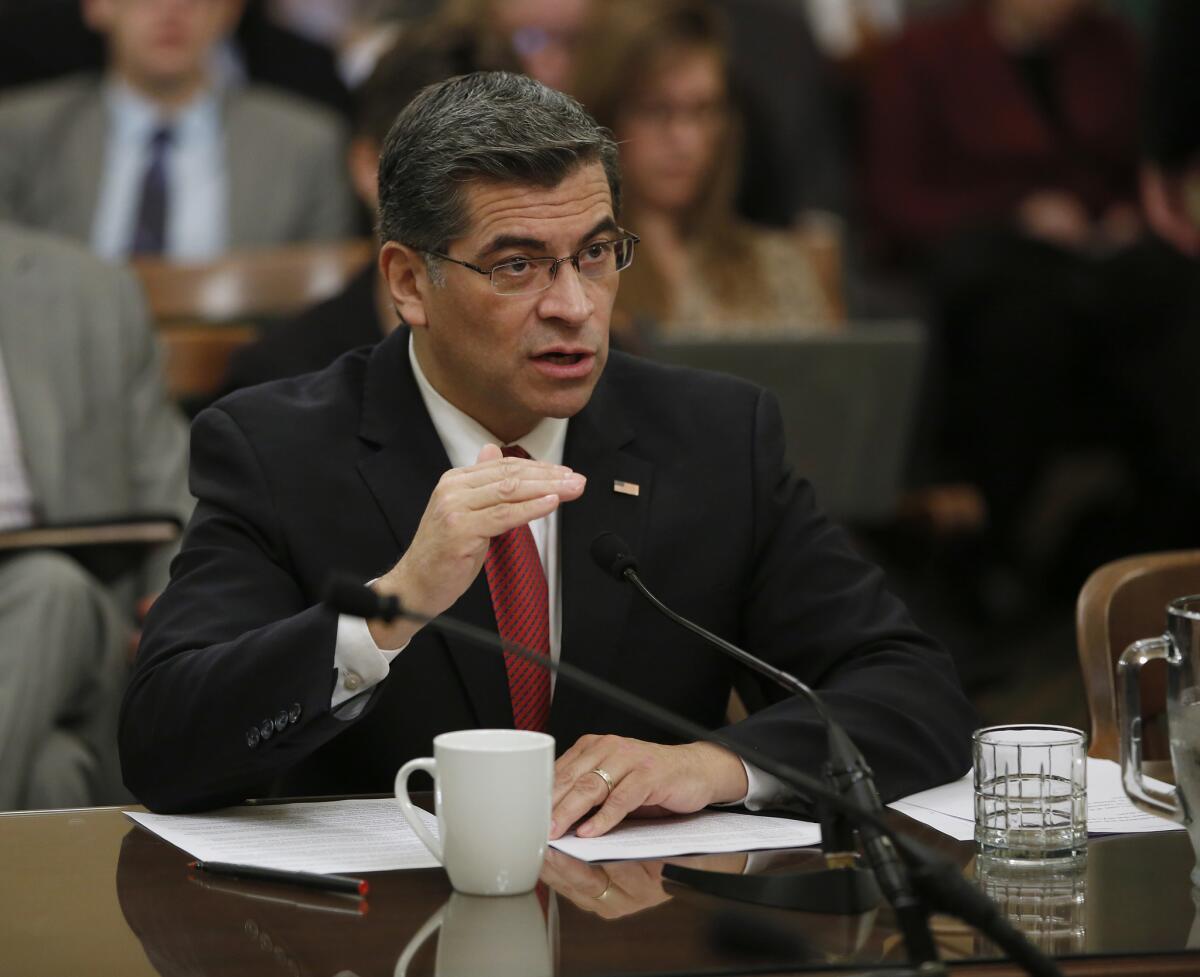
In his first 100 days in office, California Atty. Gen. Xavier Becerra has filed a flood of legal briefs challenging Trump administration orders on immigration, the environment and other issues, and he said Wednesday he expects much of his future to be taken up by fighting new attacks on the state’s policies.
Becerra told reporters during an appearance to mark the completion of 100 days in office that he will also pursue other priorities, including a crackdown on nonprofit groups that scam consumers or improperly spend their money on political campaigns.
‚ÄúI am tired of seeing people abuse the not-for-profit status for their own benefit or for someone‚Äôs benefit except for those they say they are trying to help when they ask you for charitable contributions,‚ÄĚ Becerra said. He condemned ‚Äúveterans organizations that are out there doing anything but helping veterans, or those folks who say give them 15 bucks and they will help you get your Social Security checks in the mail.‚ÄĚ
Becerra, who took office Jan. 24, also noted that some nonprofits have gotten heavily into politics.
The state’s campaign finance agency levied $1 million in fines in 2013 against two secretive nonprofits from Arizona that funneled $15 million from undisclosed donors into initiative campaigns in California.
‚ÄúThe last thing I think most people want to find out is that all these groups that are getting tax breaks because they are not-for-profit are actually going out there and influencing our political system,‚ÄĚ Becerra said.
The attorney general noted he spent much of his first 100 days fighting Trump immigration orders and has had to bring in an expert on immigration law, a resource that didn’t exist in the office before Becerra arrived.
Becerra has filed several legal briefs in lawsuits challenging Trump administration orders involving immigration, including the threat to withhold federal funds from so-called ‚Äúsanctuary cities‚ÄĚ and states that don‚Äôt cooperate with federal immigration agents.
He said police officers and sheriff’s deputies in California want to protect Californians by catching criminals.
‚ÄúThey understand that if you are afraid as an immigrant to step forward to be a witness or report a crime against you as a victim that crime will continue in the neighborhoods,‚ÄĚ Becerra said. ‚ÄúLaw enforcement has made it very clear; they want to enforce our public safety laws. They are not interested in becoming immigration enforcement officers.‚ÄĚ
His future calendar also includes defending several gun control laws approved by the Legislature and governor last year that are facing lawsuits by the National Rifle Assn.
‚ÄúWe have the most farsighted laws and regulations for gun safety,‚ÄĚ Becerra said. ‚ÄúWe know we are going to have to defend those. We will.‚ÄĚ
Don’t scrap Paris deal on global warming, Gov. Jerry Brown and other Democrats write in letter to Trump
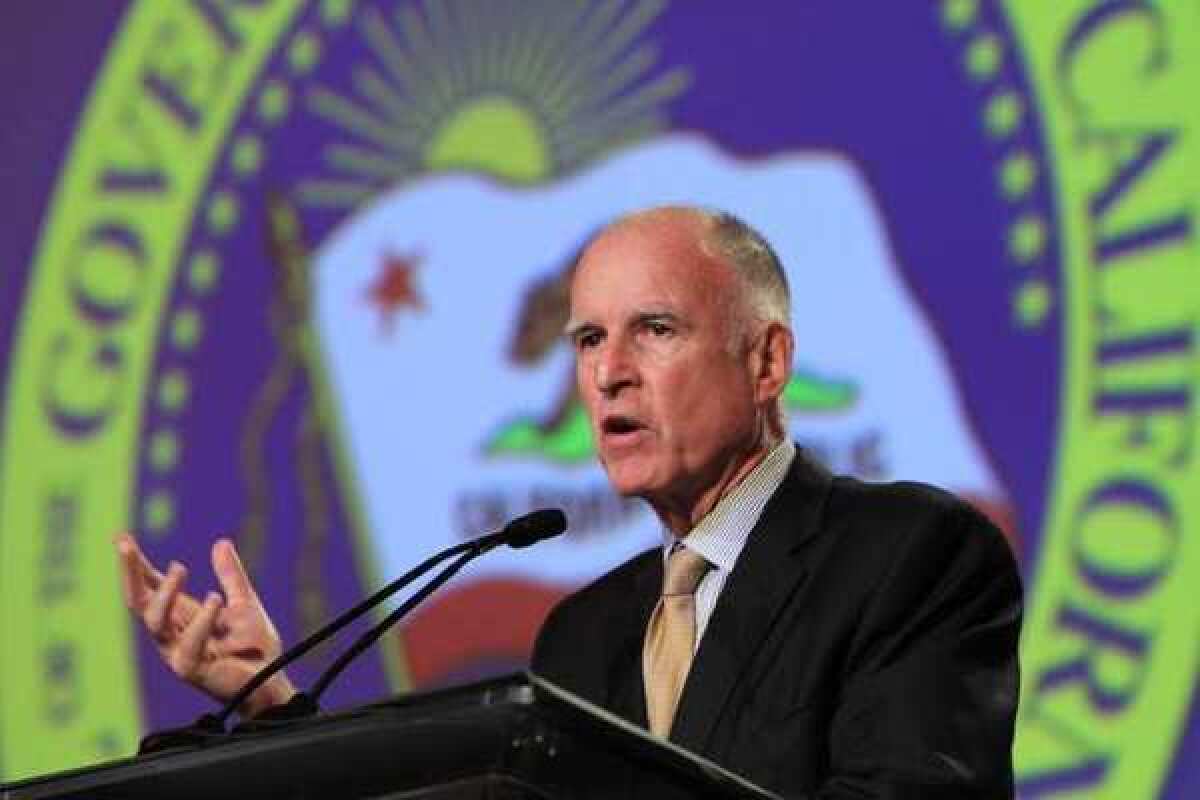
California Gov. Jerry Brown was one of a dozen governors who sent a letter to President Trump on Wednesday urging him not to withdraw from the Paris agreement to fight global warming.
‚ÄúCollective action to limit emissions worldwide is critical; without collaboration, climate change will cost the world‚Äôs nations several trillion dollars in damages,‚ÄĚ the governors wrote.
All of the governors who signed the letter, including Jay Inslee of Washington, Kate Brown of Oregon and Andrew Cuomo of New York, are Democrats.
Trump is currently weighing whether to pull the U.S. out of the deal reached in 2015 to reduce greenhouse gas emissions.
California is trying to anchor climate policies at the state level by pushing forward with ambitious policies on vehicle emissions and carbon pricing.
Where California House Republicans stand on the healthcare bill
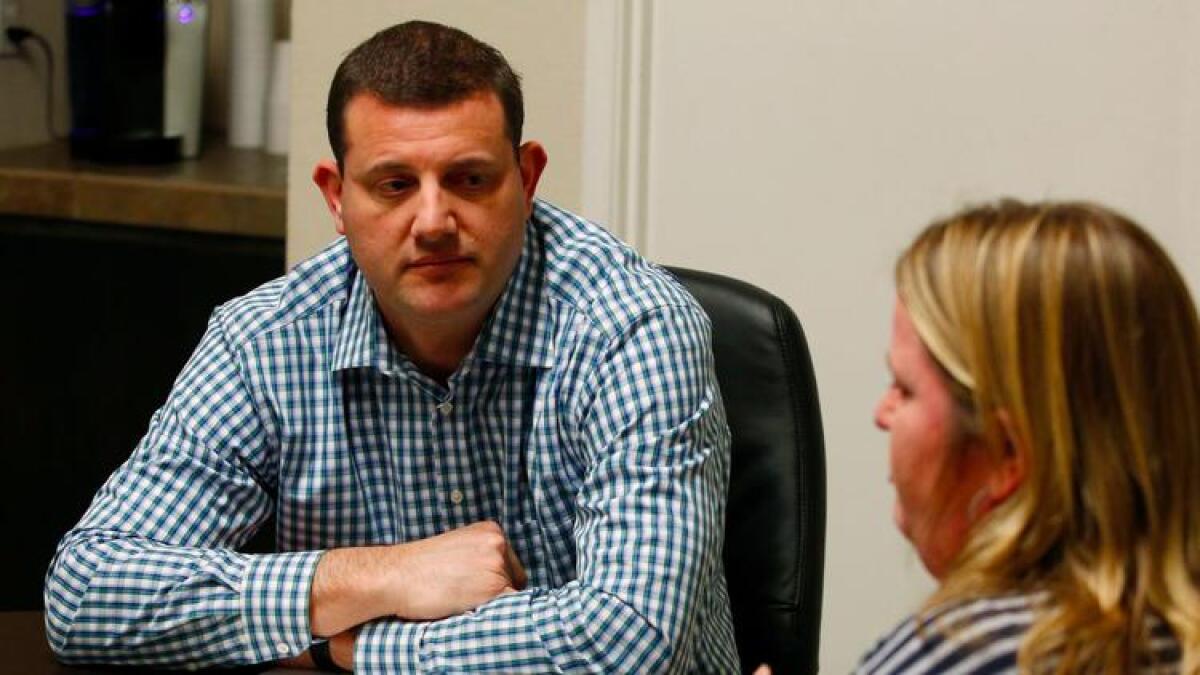
Eight of California’s 14 GOP members of Congress haven’t taken a position on the Republican bill to roll back the Affordable Care Act, making them the target of opponents, supporters and House GOP leaders who need a few more votes.
News outlets that have polled the entire GOP caucus say they’ve found 19 to 22 Republicans who will vote against it. That’s focused attention on roughly two dozen undecided members, including the Californians.
Group backed by wealthy Korean American businessman spends money for Ahn in L.A. congressional runoff
An outside group funded almost exclusively by Korean American entrepreneur Myung Ki ‚ÄúMike‚ÄĚ Hong is backing Robert Lee Ahn in Los Angeles‚Äô 34th Congressional District race.
On Tuesday, it reported spending $8,000 on legal services to support Ahn. It’s the first outside money being spent in hopes of influencing the contest between Ahn and Gomez, who are both competing to replace Xavier Becerra in Congress in the June 6 runoff election.
The group, which calls itself Citizens for a Better Government, was formed before Ahn came in second in the crowded April primary. But it wasn’t until last week that Hong dropped $50,000 into the account. Another donor, accountant Robert L. Hymers, contributed $4,000.
Hong, a South Korean immigrant who founded chemical company Dura Coat, has given more than $80,000 to a variety of federal candidates and committees over the last two decades, including the presidential campaigns of Donald Trump and Barack Obama, national committees of both the Democratic and Republican parties and the congressional campaigns of Republican Ed Royce and Democrats Mark Takano and Mike Honda.
Hymers, Hong and his wife, Lorrie, each contributed $2,700 to Ahn during the primary.
Independent expenditures, which must remain separate from candidate campaigns according to federal law, played a small role in the April primary. Healthcare industry unions spent a combined total of about $44,110 supporting failed candidate Arturo Carmona, while the L.A. County Democratic Central Committee spent $1,880 supporting Gomez.
Former U.S. ambassador to Australia and Obama counsel plans to run for California lieutenant governor
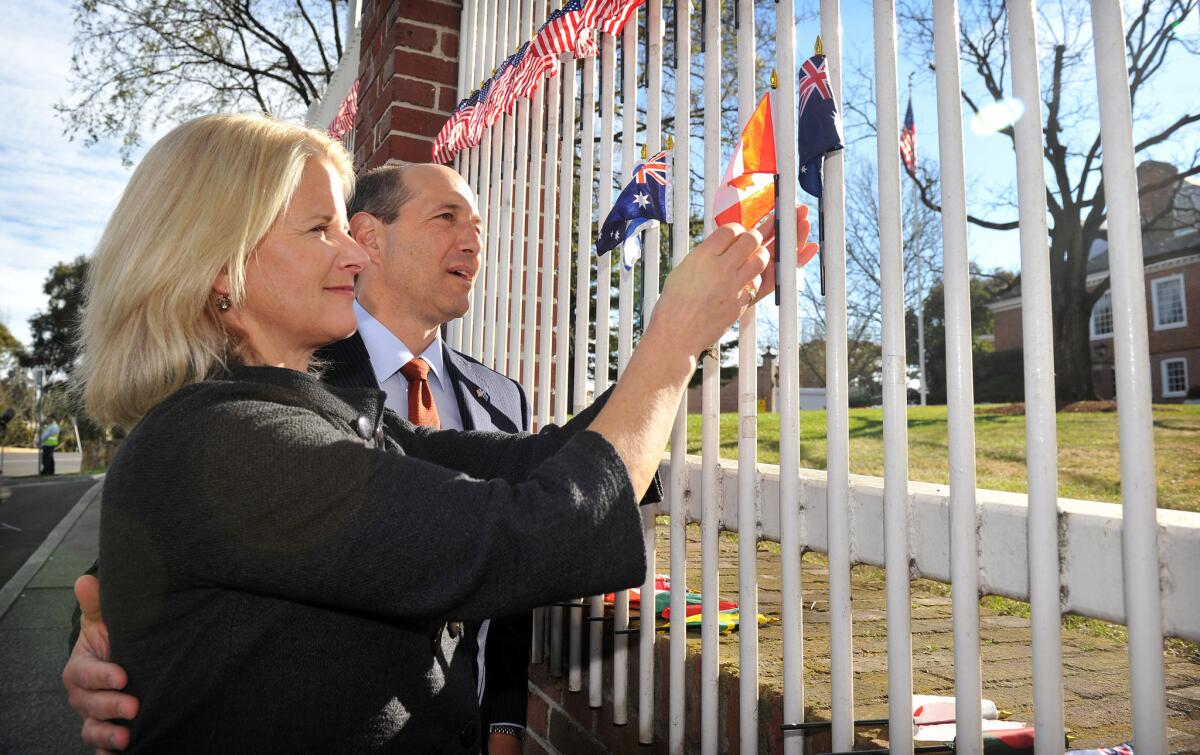
Bay Area attorney Jeff Bleich, former U.S. ambassador to Australia and special counsel to President Obama, plans to run for California lieutenant governor.
Bleich, a Democrat, has formed a campaign committee and is expected to launch an official bid sometime this month.
Bleich, in a statement on a campaign fundraising website, said government leaders have failed to address California’s changing economy and the impact it has had on the workforce.
‚ÄúWe‚Äôre going to have to educate our kids differently, empower workers with new opportunities, and stop doing things that don‚Äôt work,‚ÄĚ he stated. ‚ÄúWe can‚Äôt count on politics as usual to get us there, or to protect our shores from climate change, safeguard our homes from cyber-crime, enable communities to fight the epidemic of addiction, or unite a polarized nation.‚ÄĚ
As a partner in the Dentons law firm, he specializes in public policy and regulation. He served as chairman of the California State University Board of Trustees from 2008 to 2009.
He joins a growing field of Democrats who have entered the race, including West Covina state Sen. Ed Hernandez, former U.S. ambassador to Hungary Eleni Kounalakis and Los Angeles physician Asif Mahmood.
UC President Janet Napolitano questioned by legislators at joint legislative hearing on state auditor’s findings
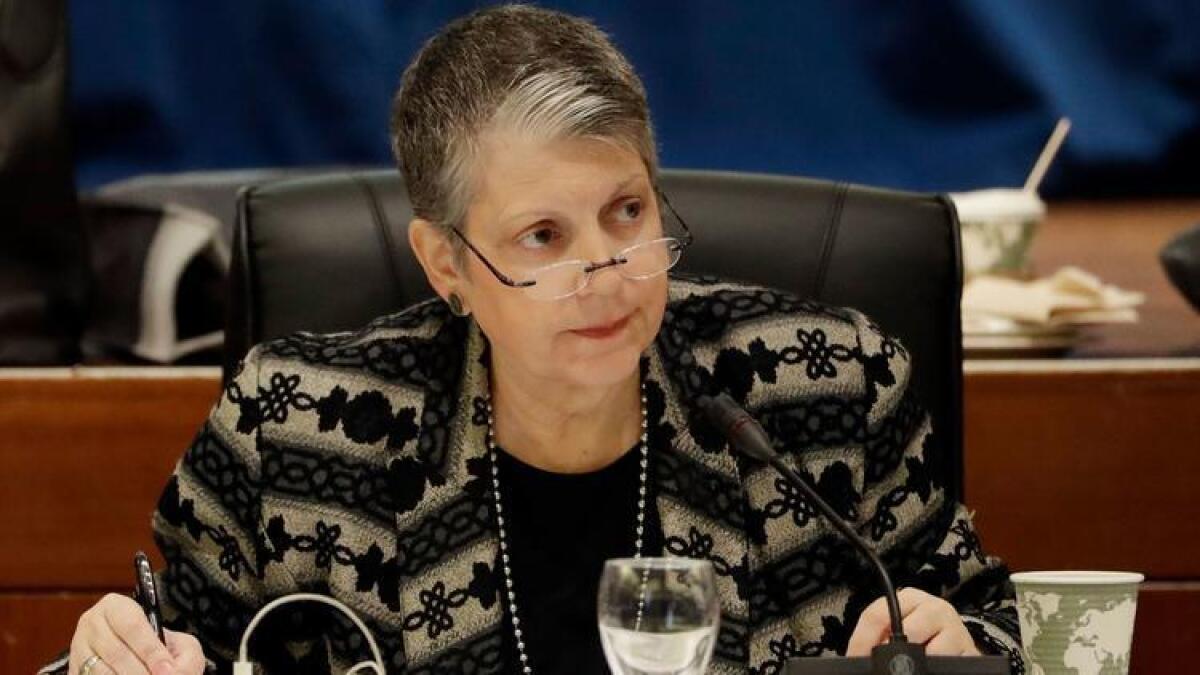
Summoned to a legislative hearing to explain the negative findings of a recent audit, University of California President Janet Napolitano said that the report’s allegations of excessive salaries and tens of millions of dollars in hidden reserves distorted the operations of her administration.
But Napolitano said the the auditors‚Äô 33 recommendations were ‚Äúhelpful and constructive.‚ÄĚ
‚ÄúWe have agreed to implement all of them,‚ÄĚ she told legislators.
The audit accused her office of interfering with auditors’ surveys of the UC system’s 10 campuses. Napolitano said she regretted how the issue was handled, but wanted to make sure the auditors’ surveys of campuses were accurate.
Board of Regents Chair Monica Lozano said she would ask the board to conduct a review of how the surveys were handled by the president’s office to make sure actions were proper.
Meanwhile, UC Board of Regents member John A. Perez on Tuesday joined the growing chorus of officials calling for UC to cancel a 2.5% tuition increase set for this fall in light of the audit findings.
The report last month by State Auditor Elaine Howle concluded that the UC Office of the President did not disclose to the University of California Board of Regents, the Legislature and the public $175 million in budget reserve funds, and paid salaries and benefits higher than the amounts received by comparable public sector workers.
Napolitano told legislators Tuesday that only $38 million of the $175 million identified in the audit is an actual reserve, which she said is a reasonable amount. The rest of the money is committed to various programs to improve the university system, including an effort to reduce its carbon footprint, develop a new medical school and provide internships for law students, she said.
‚ÄúIn fact, UCOP‚Äôs budget and financial approaches reflect strategic, deliberate and transparent spending and investment in UC and state priorities,‚ÄĚ Napolitano said in a letter to state officials when the audit was released.
On Tuesday, she was called on to appear before a hearing convened by the chairmen of the Joint Legislative Audit Committee, the Assembly Budget Subcommittee on Education Finance and the Assembly Higher Education Committee.
The tuition increase, which most students won‚Äôt have to pay, would generate about $74 million annually for the University of California system, an amount that some opponents note is less than half of the $175 million identified as a ‚Äúreserve.‚ÄĚ
As a result, Lt. Gov. Gavin Newsom and Assembly Speaker Anthony Rendon (D-Paramount), both ex officio members of the Board of Regents, have also called for cancellation of the 2.5% tuition increase scheduled to take effect in the fall.
‚ÄúI opposed the tuition increases in the first place,‚ÄĚ Rendon said this week. ‚ÄúThey make even less sense given recent events.‚ÄĚ
Board member Perez, a former Assembly speaker who voted against the tuition increases earlier this year, said Tuesday that the audit ‚Äúreinforces the questions‚ÄĚ he has about the possibility that there are other options in the budget to raising fees.
‚ÄúI support repealing the fee increase, but I don‚Äôt think we should look at the amount found as reserves [by the audit] as a way to pay it down because that is onetime money that we‚Äôve got to figure out the best policy for,‚ÄĚ Perez said.
In addition, Sen. Cathleen Galgiani (D-Stockton) has introduced a ballot measure that would prohibit the University of California from raising tuition in any year that it pays more than 600 employees a salary above $190,103, which is paid to the governor.
In 2015, UC paid 719 managers and administrators more than the governor made that year, according to state records.
‚ÄúUC‚Äôs finances are woefully unbalanced favoring top administrators at the expense of long-time workers and students,‚ÄĚ Galgiani said.
State auditor: UC Office of the President ‚Äėinterfered‚Äô with campus surveys, creating an ‚Äėimmediate chilling effect‚Äô
GOP lawmakers call for subpoenas to be issued after audit finds mishandling of money by University of California
Alarmed by an audit critical of the University of California, a half-dozen Republican Assembly members called Tuesday for the Legislature to issue subpoenas for records as part of an independent forensic audit to determine whether the mishandling of UC resources broke any laws.
The lawmakers sent a letter to the Assembly Rules Committee seeking an independent investigation a week after a state audit alleged the University of California failed to tell the public or lawmakers that it had $175 million in reserve funds and was paying excessive salaries and benefits to UC managers.
‚ÄúCalifornia students have faced rising tuition costs and unfair competition from out-of-state students for years,‚ÄĚ the letter said. ‚ÄúThese students deserve better than $175 million in undisclosed funds, excessive administrative costs, increased tuition and fees and weak budget controls.‚ÄĚ
The letter also said the lawmakers are ‚Äúextremely troubled by the [university‚Äôs office of the president‚Äôs] interference and possible tampering with the audit process.‚ÄĚ
The letter is signed by Republican Assembly members Catharine Baker of San Ramon, Kevin Kiley of Rocklin, Dante Acosta of Santa Clarita, Jay Obernolte of Big Bear, Steven Choi of Irvine and Randy Voepel of Santee.
University of California President Janet Napolitano has said the audit was incorrect and that there is only $38 million in reserve funds, with the rest committed to programs to improve the 10-campus system.
Still, the lawmakers said documents they want subpoenaed include account records, invoices, draft budget records and all correspondence regarding the $175-million fund.
‚ÄúBringing these documents out in the open will allow the Legislature, auditor and the general public to judge accurately the actions of the [president‚Äôs office] and gauge whether or not criminal activity has taken place,‚ÄĚ the letter said.
California Senate leader unveils new proposal to phase out use of fossil fuels to generate electricity
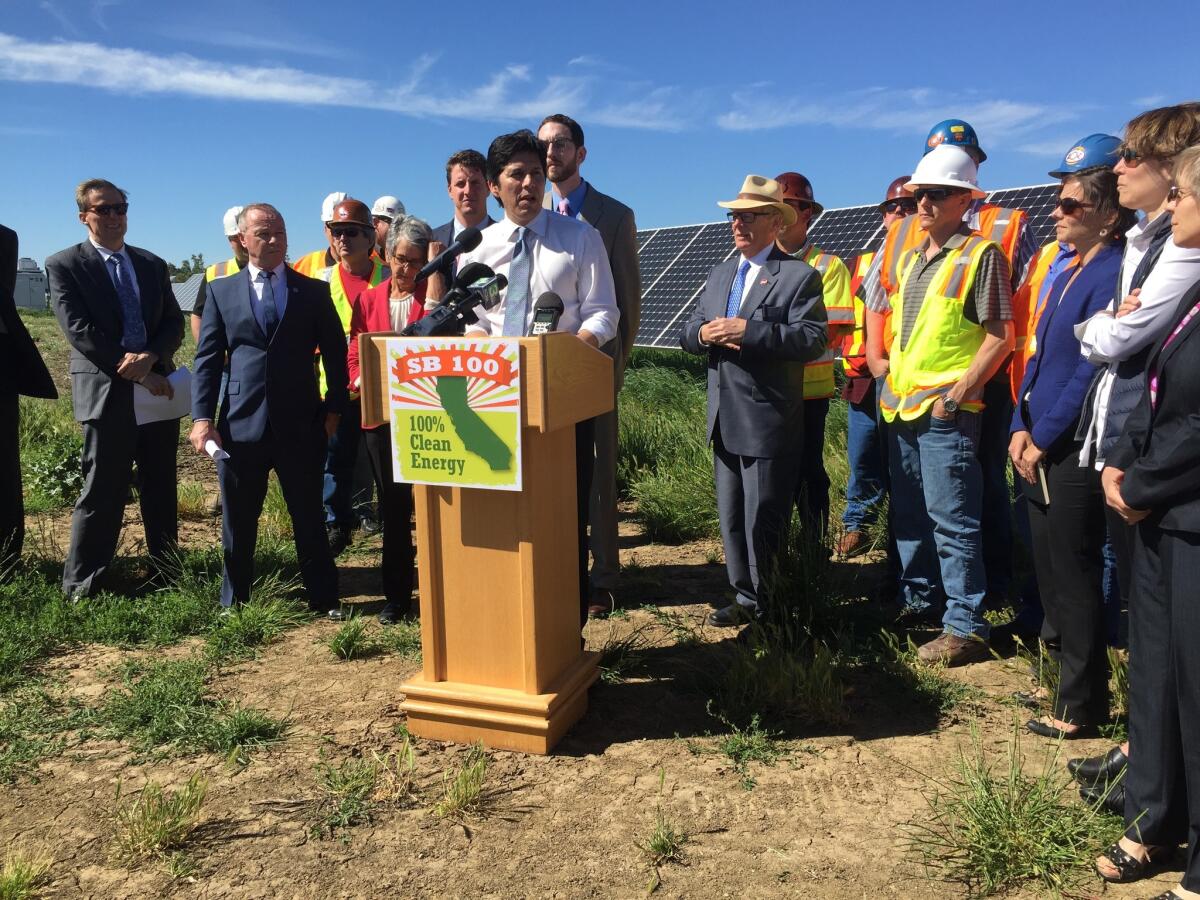
California would completely phase out the use of fossil fuels to generate electricity under a new proposal detailed by Senate President Pro Tem Kevin de León (D-Los Angeles) on Tuesday.
Meeting the goal would require dramatic changes to the state’s electricity infrastructure over the next two decades, including an end to burning natural gas, the source of nearly half of California’s power.
‚ÄúWe can dramatically expand clean energy while also growing our economy,‚ÄĚ De Le√≥n said during a news conference at a solar plant in Davis where he was flanked by colleagues and union workers.
The legislation, Senate Bill 100, would accelerate the state’s plans to increase its reliance on renewable sources such as solar and wind, increasing its 2030 target from 50% to 60%.
More changes would need to come by 2045. California regulators would be in charge of drafting the rules for generating the rest of the state’s electricity. Potential sources include the burning of methane captured at landfills or dairies, as well as existing hydroelectric dams.
Though Hawaii has the country’s first law seeking 100% renewable energy, such a decision by California would have far more weight given the size and complexity of its economy.
About 20% of the state’s electricity came from renewable sources in 2015, the most recent figures available. An additional 44% comes from natural gas.
The natural gas industry signaled their opposition to the new legislation
‚ÄúEven in sunny California, the sun doesn‚Äôt shine every day and the only viable back-up solution to renewables is power generated by clean burning natural gas,‚ÄĚ said a statement from Rock Zierman, chief executive officer of the California Independent Petroleum Assn. ‚ÄúThe pro tem‚Äôs proposal may sound appealing but the impacts of his legislation will put our energy security at risk and drive up costs for consumers.‚ÄĚ
Environmentalists were also worried about some provisions of the legislation.
Annie Notthoff, director of California adocacy for the Natural Resources Defense Council, said in a statement there are ‚Äúconcerns about consumers having to pay entirely for the connection of biogas sources to the pipeline system, which can be prohibitively expensive, particularly considering that cheaper alternatives exist for on-site use or export.‚ÄĚ
This post has been updated with comments from advocacy groups.
California Senate leader pushes 100% renewable energy
Hundreds march for May Day at California‚Äôs Capitol: ‚ÄėThe current presidency has managed to create panic‚Äô

Hundreds of people marched to the Capitol in Sacramento on Monday to protest the Trump administration, overly aggressive policing and corporate influence in politics as part of the worldwide May Day protests.
The march, which was convened by various labor unions, began at a Sacramento park.
Rosalina Garcia, an official with the union representing janitorial workers in Sacramento, told the crowd at the Capitol that she’s heard from many colleagues and friends who say the Trump administration’s immigration policies had made children fear going to school because they’re worried about potential deportation.
‚ÄúThe current presidency has managed to create panic in our immigrant community,‚ÄĚ Garcia said in Spanish.
See all of our May Day coverage here.
This is how much money the candidates running to be California’s next governor have raised
Lt. Gov. Gavin Newsom has raced out to a significant lead in the money race. Altogether, the small field of candidates hoping to succeed Gov. Jerry Brown next year has already raised more than $20 million. See how much the candidates have raised and where their biggest donations are coming from. We’ll be updating the money race until the election in 2018.
Companies would face tighter environmental restrictions in California under new cap-and-trade proposal
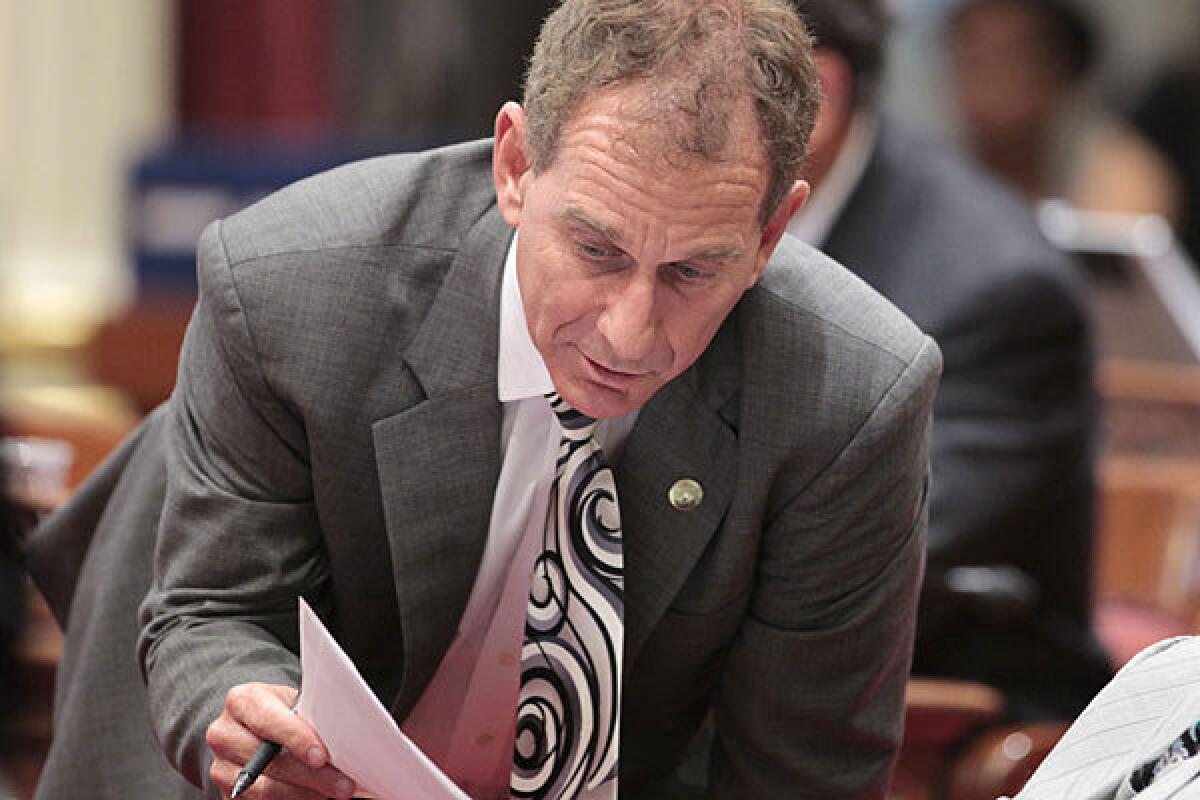
State Senate Democrats on Monday will announce a new proposal to toughen California’s cap-and-trade program in hopes of providing a more dependable revenue stream and greater incentives for industries to clean up their operations.
The legislation, Senate Bill 775, would set a higher price for the permits companies are required to purchase to release greenhouse gas emissions, and it would eliminate the distribution of free permits, which are provided in limited quantities to help companies comply with cap-and-trade’s requirements. In addition, companies would no longer be allowed to pay for offsets, or green projects such as forest preservation, to meet their obligations to reduce emissions.
The changes would likely increase the cost of complying with state regulations, and the new legislation would set aside some cap-and-trade revenue for rebates to Californians to balance out higher costs for consumer goods such as gasoline.
‚ÄúWe feel comfortable where this is threading the needle,‚ÄĚ said Sen. Bob Wieckowski (D-Fremont), the bill‚Äôs author. Also backing the measure is Senate President Pro Tem Kevin de Le√≥n (D-Los Angeles).
The legislation also includes a limit on how expensive emission permits can become, a provision intended to guard against the possibility of price spikes as the state moves toward its ambitious climate goals.
By restricting the potential for sharp fluctuations in the price of permits, companies can ‚Äúplan and make the kind of investments they need to for a low-carbon economy,‚ÄĚ said Michael Wara, a Stanford University environmental law professor who was one of several experts advising senators on their proposal.
Monday’s announcement adds to the ongoing debate over the cap-and-trade program, California’s most high-profile initiative for fighting climate change. Gov. Jerry Brown and supportive lawmakers are aiming for a two-thirds vote to extend the program to eliminate any legal uncertainty surrounding its future.
While the Senate measure deals primarily with how the cap-and-trade market functions, separate legislation from Assembly Democrats would modify the program so it also targets other pollutants besides greenhouse gases and improve public health.
Both bills will be advancing through various committees before reaching votes in the Assembly and the Senate. Brown has expressed interest in wrapping up the issue in June, when the state budget is due.
This post has been updated with an interview with a Stanford professor. The bill number has also been corrected.